Thirty years in the making: Time, growth and resilience

Manager Watch™ Annual Survey
Survey of Retirement Fund Investment Managers
























































Thirty years in the making: Time, growth and resilience

Manager Watch™ Annual Survey
Survey of Retirement Fund Investment Managers























































The Alexforbes Manager Watch™ Series of Surveys, which includes the Alexforbes Annual Retirement Fund Survey, has evolved over the past 30 years, growing alongside South Africa’s investment industry. In the early 1990s, the market was straightforward – retirement funds mainly looked for the best balanced manager, and only a handful of life owned asset management companies dominated the space.
As the industry developed, specialist mandates became more popular in the 2000s, with asset managers focusing on specific areas like equities, bonds, real returns and alternative investments. Over time, the market diversified, with both large financial institutions and boutique investment firms competing to offer innovative solutions.
Today, the scale of the surveys is remarkable.
From a small group of managers, it now includes 92 participating asset managers and covers 797 investment strategies – tracking assets worth an impressive R8.2 trillion. This expansion has made the surveys an essential tool for trustees, financial advisers and investors who need reliable insights in an increasingly complex market. As investment options have multiplied, the demand for clear, transparent and detailed reporting has grown and the Alexforbes series of surveys has adapted to meet these needs.
Participating asset managers across our surveys
Investment strategies across our surveys
Beyond the surveys itself, South Africa’s investment industry has transformed significantly. The shift from a few dominant players to a wide variety of asset managers has created innovation and competition. Regulatory changes have also played a role, pushing for better governance and transparency. The comparison in the graph below is really interesting. In 2014, there were no managers in the top 20 of the June 2014 assets under management (AuM) survey with a Level 1 BEE status. By 2024, nearly the entire top 20 had achieved Level 1 status.

The Alexforbes series of surveys has grown significantly since its launch in 1994. Initially, it covered only a few asset managers and a small number of balanced strategies. As investment needs evolved, the survey expanded to track a wider range of local and global asset classes and strategies, from bonds and equities to alternative investments. Today, the survey is a trusted benchmark for the industry, helping trustees and investors make informed decisions based on the latest data and insights.
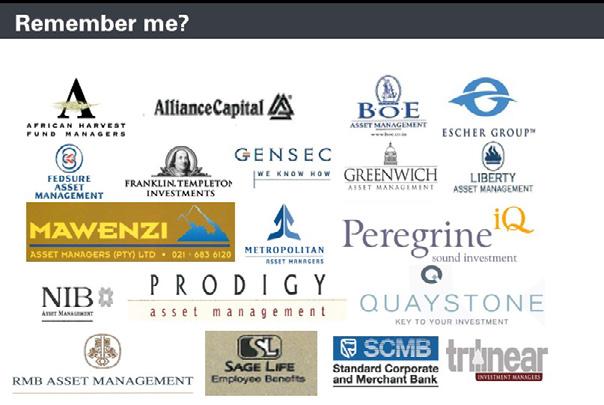

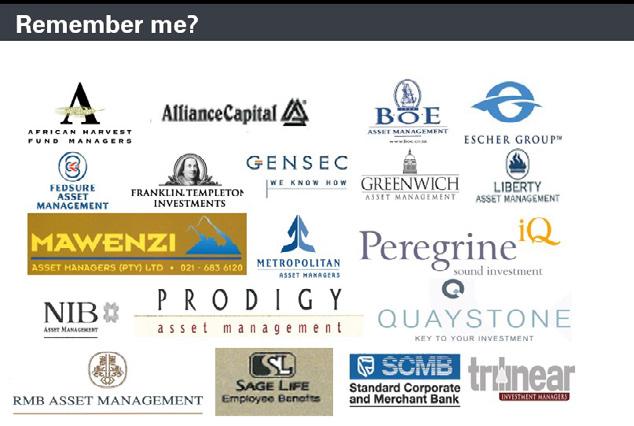




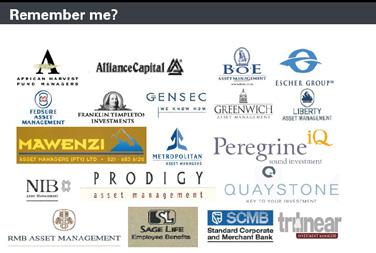




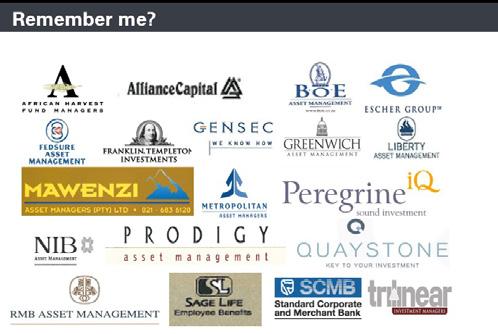




The number of asset managers and investment strategies in the surveys have increased dramatically.
there were just 26 managers and 28 strategies, reflecting a small, concentrated market.
the number of managers had risen slightly to 29, while strategies had surged to 170, showing the rise of specialist investments.
the survey covered 46 managers and 335 strategies as investors looked for greater diversification.
the numbers had increased to 92 managers and 797 strategies, reflecting growing investor demand for tailored, innovative investment solutions.

This rapid growth highlights how the South African investment market has evolved. More firms are offering specialist strategies and alternative asset classes, giving investors more options to choose from.
The movement of funds—new entries and exits—tells a story about market trends.
there were just four fund exits and three new entrants, indicating a stable market.
24 funds exited, but 46 new funds entered, reflecting growing confidence in the industry.
there were 15 exits and 17 new entrants, showing moderate growth as investors sought new risk-return strategies.
the shift is even more dramatic, with 29 funds exiting but 83 new funds entering, a sign that new opportunities are driving the market.
This increase in fund movement suggests that new opportunities are being introduced. The industry is dynamic and constantly evolving, with asset managers introducing new solutions to attract investors.



The total assets under management (AuM) within the survey have grown significantly over the past 30 years.
In the early years, AuM was modest, as the market was still developing.
Over time, as pension contributions increased and markets expanded, the total AuM covered by the survey grew to a staggering R8.2 trillion.
The number of managers has also increased alongside AuM growth, with more players entering the market to compete for investor capital.


This growth reflects the increasing trust in South Africa’s investment industry, as well as the demand for diverse, well-managed portfolios that deliver long-term returns.
The Top 20 Manager rankings have changed significantly over the years.
Some firms, like Ninety One, Sanlam and STANLIB, have consistently ranked among the top managers, with Alexander Forbes Investments the top ranked Multi-Manager, showing their ability to deliver strong, long-term performance.
Others have moved in and out of the rankings, reflecting the competitive nature of the industry.
The rankings also highlight the impact of mergers, acquisitions, and shifting investment strategies, with some firms disappearing while new leaders emerge.
and strong governance, as well as the ability to navigate economic shifts and investor expectations.
Over the past 30 years, the Alexforbes series of surveys have documented remarkable changes in the South African investment industry. The coming years will bring new challenges and opportunities, with transparency, fair fees, and responsible investing becoming key priorities.
Regulations will continue to demand clearer reporting and fairer fees, but forward-thinking asset managers are already adopting these best practices. At Alexforbes, we believe that transparency is what sets industry leaders apart. Our surveys will continue to push for higher standards, better comparisons, and stronger trust in the industry.
As part of this ongoing evolution, we also recognise the growing importance of sustainability. Soon, we plan to incorporate sustainability-focused reporting into the surveys, ensuring that investors and trustees have the tools they need to assess ESG-focused investments.
The future of investing will be shaped by those who embrace transparency, accountability, and sustainability. The next chapter in this journey belongs to asset managers and investors who prioritise these values, ensuring a stronger, more ethical, and more resilient financial future for all.

AMRI is deeply committed to the asset management industry, driving growth and ensuring the long-term success of both firms and individuals. AMRI excels at identifying strategic opportunities and providing insightful decision-making support to business leaders. Through our research-driven and client-centric approach, AMRI empowers asset management firms to achieve sustainable, enduring success.


Asset Management Research Institute (Pty) Ltd
Muitheri Wahome, CEO & Founder Email: Hello@AMRI.group www.AMRI.group


Just as pearl cultivation begins with choosing healthy, high-quality oysters, the investment journey starts with one of its most critical steps: selecting the right fund
A strong beginning sets the foundation for long-term value – whether you are nurturing a pearl or growing an investment.





Alexforbes named Best Investment Survey Provider in Africa for the sixth consecutive year!
Cape Town, 15 November 2024 – Alexforbes is proud to announce that its Investment Survey team has been named the Best Investment Survey Provider in Africa for the sixth consecutive year.
The award was presented at the New York-based Africa Global Funds (AGF) Service Providers Awards, which celebrate excellence in asset management services across the continent.
This recognition reaffirms Alexforbes’ commitment to delivering high-quality, comprehensive investment surveys and data solutions that empower clients across Africa with critical insights. The Alexforbes suite of investment surveys continues to set the standard in its scope, covering all major asset classes and supporting clients in making informed investment decisions.

Don
Andrews, Head of the

Alexforbes Investment Survey Team, John Anderson, Executive of Solutions and Enablement at Alexforbes, added,
expressed his appreciation for this achievement, stating, “Receiving this award for the sixth consecutive year is a tremendous honour. It reflects our unwavering commitment to delivering insightful, accurate and timely survey data, and investment insights to asset managers and other stakeholders. We are dedicated to continually advancing our standards to support the African investment community.”

“This award highlights the exceptional quality of our team’s work and their dedication to empowering clients with robust, data-driven insights. In 2024, we also enhanced our offering to the retail market by leveraging our well-established institutional capability to empower financial advisers. We remain committed to setting new benchmarks in investment research, both in the institutional and retail markets, to help clients navigate an evolving market landscape.”
Alexforbes is honoured by this recognition and remains dedicated to leading the way in investment survey excellence across Africa. This achievement further fuels our commitment to continuously enhancing our services, investment data and insights, while driving innovation in the investment industry.
Access our latest monthly institutional and retail surveys: https://investdata.alexforbes.com/insightspublications/industry-surveys.
The Manager Watch™ Survey of Retirement Fund Investment Managers is an annual survey that showcases the performance of institutional fund managers in South Africa and has been published since 1994.
This edition includes 30 surveys with 92 managers and 797 strategies covering the following:
• 15 balanced surveys
• 14 specialist surveys, and the
• Multi-Manager survey.
The following surveys are included:
• SA Large Manager WatchTM Survey
• SA Manager WatchTM Survey – Best Investment View
• SA Manager WatchTM Survey – Conservative
• Global Large Manager WatchTM Survey
• Global Manager WatchTM Survey – Best Investment View
• Global Manager WatchTM Survey – Conservative
• Global Manager WatchTM Survey – Dynamic
• Manager Watch Effective Asset Allocation Survey
• Absolute Return Manager WatchTM Survey
• Africa Manager WatchTM Survey
• BEE Manager WatchTM Survey
• Bond Manager WatchTM Survey
• Decathlon Manager WatchTM Survey
• Equity Manager WatchTM Survey
• Fund of Hedge Funds Manager WatchTM Survey
• International Manager WatchTM Survey
• LDI Manager WatchTM Survey
• Medical-Aid Manager WatchTM Survey
• Money Market Manager WatchTM Survey
• Multi-Manager WatchTM Survey
• Namibia Manager WatchTM Survey
• Property Manager WatchTM Survey
• Shari’ah Manager WatchTM Survey
• LDI Manager WatchTM Survey
• Targeted Development Investment (TDI) Manager WatchTM Survey
In this year’s publication, we feature a range of articles which focus on how The Alexforbes Manager Watch™ Series of Surveys, which includes the Alexforbes Annual Retirement Fund Survey, has evolved over the past 30 years. The first article featured is Celebrating 30 years with perspectives from three industry leaders. To gain a deeper understanding of this journey, we have sought insights from Asief Mohamed, Natalie Phillips, and Errol Shear.
Section 2 includes the article Future proofing South Africa’s pension funds: The power of sustainability reporting. In this piece, we explore how ESG reporting is a fundamental responsibility for South African pension funds, ensuring that investments remain resilient, ethical, and deliver long-term benefits for both members and society. This section also features a timeline highlighting the most significant events of the past 30 years.
Section 3 provides the 2025 investment outlook for both the global and local economy. It also includes an article titled Thirty years of responsible investing, which explores how, over the past three decades, responsible investing has evolved from a niche approach to a core investment philosophy. This transformation reflects the growing recognition that sustainable and ethical investment practices are essential for long-term financial stability and positive societal impact.
Through the articles featured, we aim to provide a comprehensive view of the past, present, and future of asset management and responsible investing in South Africa.
A glossary of commonly used investment terms is included in Section 5, while a directory of South African asset managers is featured in Section 6.
To access our Manager Watch™ series of surveys: https://investdata.alexforbes.com/ insights-publications/industry-surveys
Benchmark
Risk-adjusted
Survey
SA Manager WatchTM Survey - Best Investment View
SA Manager WatchTM Survey –Conservative
Exits
Aeon Domestic Balanced Fund
Perpetua Domestic Balanced
Entries
Camissa Balanced Fund
ClucasGray SA Balanced Prescient Fund SIM Domestic Balanced Fund
SA Large Manager WatchTM Survey SIM Domestic Balanced Fund
Global Manager Watch™ Survey –Dynamic
Global Manager WatchTM SurveyBest Investment View
Obsidian SCI Balanced Fund
Global Manager WatchTM SurveyConservative
Global Large Manager Watch™ Survey
Absolute Return Manager Watch™ Survey
Africa Manager WatchTM Survey
BEE Manager WatchTM Survey
Balondolozi Absolute Return
Mergence CPI + 4% Fund
Old Mutual Capital Builder
Aeon Domestic Balanced Fund
Aeon Smart Multi-Factor Equity Fund
Mazi CAPI Composite
Old Mutual Capital Builder
Terebinth Enhanced Income
Terebinth Money Market
Terebinth Strategic Income
VFM Domestic Target Return CPI+5%
Aylett Balanced Prescient Fund
Camissa Global Balanced Fund
Nedgroup Bravata Worldwide Flexible Fund (Aylett)
Perpetua Global Balanced
Prescient Defensive Composite
STANLIB Multi-Asset Cautious Fund
Terebinth Low Equity Balanced Composite
Ninety One Cautious Managed Fund
SIM CPI+4% Domestic
Truffle Domestic Flexible
Aeon Balanced Fund (CPI + 5%)
Aluwani Global Balanced
BlueAlpha BCI Balanced Fund
Cannon Capped SWIX fund
CLP Flexible Income Fund
CLP Money Market Fund
Old Mutual SWIX40 Enhanced Index
Perpetua Domestic Core Equity (Capped SWIX)
Prescient Corporate Money Market Composite
Prescient High Yield Bond Composite
Satrix Momentum Index Composite
Satrix Smartcore™ Index Fund
Satrix Value Composite
SIM CPI+4% Domestic
Terebinth Active Bond Composite
Terebinth Aggressive Income Composite
Terebinth Capped ALSI Composite
Terebinth Capped SWIX Composite
Terebinth Cash Plus Composite
Terebinth Enhanced Income Composite
Terebinth Low Equity Balanced Composite
Terebinth Money Market Composite
Terebinth Strategic Income Composite
Volantis Core Money Market fund
Weaver BCI Stable FoF
Bond Manager WatchTM Survey
* No changes
Terebinth Enhanced Income
CLP Flexible Income Fund
Foord Bond Fund
Prescient High Yield Bond Composite
Terebinth Active Bond Composite
Terebinth Aggressive Income Composite
Terebinth Enhanced Income Composite
Terebinth Strategic Income Composite
Survey Exits
Aeon Smart Multi-Factor Equity Fund
Mazi CAPI Composite
Equity Manager WatchTM Survey
Fund of Hedge Funds Manager Watch™ Survey
International Manager WatchTM Survey
STANLIB Multi Factor Core
Visio Absolute Equity Composite
LDI Manager WatchTM Survey
Nedgroup Investments Global Behavioural
STANLIB High Alpha Fund
Medical Aid Manager WatchTM Survey
STANLIB Multi-Strategy Medical Aid Solution fund
Entries
Cachalia Capital C Value Fund
Perpetua Domestic Core Equity (Capped SWIX)
Prescient Core Top 40 Composite
PSG SA Equity Fund
Steyn Capital SA Equity Long Only
Terebinth Capped SWIX Composite
CLP Multi-Asset Global Fund
Excelsia Global Equity Fund
Old Mutual Global ESG Equity Portfolio
Old Mutual Global Islamic Equity
Perpetua Global Core Equity
Prescient China Balanced Composite
Prescient China Equity Composite
Prescient Core Global EM Equity MSCI
Composite
Prescient Global Balanced Multi Asset
Composite
STANLIB Global Multi-Strategy Diversified Growth Fund
STANLIB Global Select
27four Medical Aid CPI + 3% Fund
M&G Money Market Fund
Prescient Income Provider Medical Aid
Composite
Sygnia Medical Absolute Fund
Sygnia Money Market Medical Fund
Terebinth Medical Scheme Income Composite
27four Money Market fund
CLP Money Market Fund
Mianzo Money Market fund
Old Mutual Institutional Money Market Fund
Money Market Manager WatchTM Survey
Multi-Manager WatchTM Survey
Namibia Manager WatchTM Survey
Property Manager Watch™ Survey
STANLIB Namibia Balanced fund
M&G Enhanced Index Tracker Property
Old Mutual Money Market Fund
Prescient Corporate Money Market Composite
Prowess 180 Day Money Market Fund
Terebinth Cash Plus Composite
Volantis Core Money Market
Sygnia InzuzoSA 70 Fund
Arysteq Bond fund
Lebela Money Market fund (Aluwani)
M&G Property Composite
Shari'ah Manager Watch™ Survey * Momentum Investments Shari’ah
TDI Manager Watch™ Survey
* No changes
OMIG Community Growth Gilt
Ninety-One SA Infrastructure Credit Fund
Prescient Infrastructure Composite









































According to the June 2024 Alexforbes Assets under Management (AuM) survey, Ninety One remains the biggest asset manager in South Africa, strengthening its position with a 4% increase in assets compared to last year. STANLIB AM retains second place, showing a strong performance with a 10% rise in assets. This marks an improvement from the previous year.
A shift in rankings occurred in third place, where SIM AM made a major leap, increasing its assets by 20% and overtaking both Coronation and Allan Gray. Coronation now holds fourth place, with a 2% growth in assets over the past year. These changes highlight the dynamic nature of the asset management industry.
Alexander Forbes Investments has strengthened its position as the leading multi-manager in South Africa, moving up to sixth place after a 10% increase in assets over the past year. This jump ahead of OMIG reflects its strong growth and continued appeal in the market.
The proportion of multi-manager growth relative to single managers has steadily increased, indicating a growing investor interest in diversified investment strategies. In 2019, for every R1 managed by single managers, multi-managers held 15 cents. By 2024, this had increased to 29 cents. This steady increase indicates that multi-managers are gradually expanding their presence in the market.
The total assets of the survey participants grew by 6% from June 2023, with the top 10 asset managers still holding the largest share. This group now accounts for 63% of the total assets across the 79 managers in the survey, showing a continued concentration at the top.
The June 2024 survey included 79 investment managers, the same as in 2023. ABSA AM exited following its merger with SIM AM, while 10X Investments entered, keeping the total number unchanged.
The new entry in the survey was:
The manager who exited the survey was: 10X Investments
ABSA AM
The asset distribution in 2024 remains heavily concentrated among level 1 contributors, reinforcing the commitment of asset managers to transformation and Broad-Based Black Economic Empowerment (BEE). In 2023, level 1 and 2 contributors accounted for 91% and 5% of total assets, respectively. This positive trend has continued in 2024, with level 1 contributors rising to 92% and level 2 contributors slightly decreasing to 4%. Encouragingly, the number of asset managers without a rating or deemed non-compliant has also dropped from seven in 2023 to six in 2024, indicating gradual progress in adherence to BEE standards.
The growth of black-owned asset managers has also been remarkable. According to the June 2024 Assets under Management (AuM) survey, the top five blackowned asset managers experienced a 48% increase in total assets compared to their standing in June 2023. A significant milestone was also reached, with five BEE survey participants securing positions in the top 10 of the AuM survey for the first time. These firms include SIM, Coronation, OMIG, Sanlam Multi-Managers, and Taquanta, reflecting a strengthening presence of blackowned asset managers in the industry. This progress underscores the ongoing transformation within the sector, highlighting both the commitment and impact of BEE in shaping a more inclusive financial landscape.
ratings according to Manager Distribution
A notable 52 out of the 79 asset managers in the survey were rated as level 1 contributors, an improvement from 51 in the previous year. This steady increase highlights the industry's continued commitment to transformation.
As in 2023, all of the top 10 asset managers achieved a level 1 rating in 2024, reinforcing their leadership in this area. Among the top 20, only one manager did not meet this benchmark, receiving a level 2 rating.
The AuM survey universe, as at June 2024, summarised according to participant contributor levels is:

John Anderson Alexforbes Executive: Solutions & Enablement
The journey of Alexforbes surveys reflects an impressive evolution, marked by continuous innovation and a commitment to empowering trustees, asset consultants and investors with credible, actionable insights. Over the past 30 years, Alexforbes has transformed from offering straightforward surveys focused on balanced managers to producing comprehensive, data-rich reports that cater to the complexities of today’s investment landscape.
Alexforbes has consistently been recognised for its high standards and impactful contributions to the investment industry. For six consecutive years, the company has been named the best investment survey provider in Africa at the Africa Global Funds Service Providers Awards. This accolade highlights Alexforbes’ dedication to providing accurate, insightful and forward-looking surveys that enable informed decision-making across Africa.
In the early 1990s, Alexforbes surveys were simple, focusing on balanced managers due to the limited range of options available to retirement funds. At that time, funds sought the best-balanced managers from a small pool. The industry’s needs were straightforward as there were few specialised mandates or alternative investment options.
As the industry matured, specialist mandates gained prominence. Managers began specialising in equities, bonds and alternatives such as hedge funds and private markets. This diversification necessitated a more robust survey methodology to reflect the growing complexity. Today, Alexforbes surveys feature 88 participating asset managers, 178 strategies and over R8.2 trillion in assets, demonstrating the extensive range of investment opportunities now available.
The growing search for performance, or alpha, has added layers of complexity to investment strategies. Alexforbes has kept pace, evolving its surveys to assist trustees and advisers in understanding and comparing diverse investment options. This includes tools to evaluate performance over appropriate timeframes, assess risk-return profiles and align strategies with investment objectives.


Historically, Alexforbes surveys focused on institutional investors, particularly retirement funds governed by Regulation 28. Recognising the lack of similar resources for retail investors, the company launched its Retail Surveys. These surveys provide data aligned with ASISA categories, focusing on high-equity, medium-equity and low-equity funds. Additionally, a Discretionary Fund Manager (DFM) survey now helps advisers evaluate and compare DFM performance, addressing a significant gap in the retail market.
Fee transparency is a cornerstone of Alexforbes surveys. While retail surveys report net-of-fee performance to facilitate direct comparisons, institutional surveys use gross-of-fee figures due to variable fee structures. Trustees are encouraged to work with asset consultants to adjust gross figures and ensure value-for-money assessments. This meticulous approach underscores Alexforbes’ commitment to empowering clients with comprehensive insights.
Trustees rely on Alexforbes surveys to benchmark performance, assess strategy alignment and ensure compliance with their investment policy statements. The surveys’ detailed data enables trustees to:
evaluate performance against objectives
compare managers and strategies within categories

monitor risk-return trade-offs
incorporate ESG metrics into decision-making
Trustees are also guided to communicate complex survey findings in simple terms to fund members, focusing on investment objectives, performance outcomes and strategic adjustments.


Alexforbes continues to innovate, preparing for industry shifts such as mandatory sustainability disclosures and enhanced impact reporting. These developments will empower trustees and fund managers to connect investment performance with tangible societal benefits, such as renewable energy projects or housing developments.
The evolution of Alexforbes surveys over the past three decades demonstrates the company’s adaptability and foresight. From simple balanced-manager surveys to comprehensive tools addressing retail, institutional and ESG-focused needs, Alexforbes has cemented its role as a leader in investment survey provision. This legacy of innovation ensures that clients remain equipped to navigate the complexities of the modern investment landscape, delivering value to members and aligning with broader societal goals.
As we mark 30 years of the Annual Retirement Fund Survey, it is an opportune moment to reflect on the evolution of South Africa’s asset management landscape. Over the past three decades, the industry has changed, shaped by economic shifts, regulatory developments, and investment innovation. To gain a deeper understanding of this journey, we have sought insights from three distinguished professionals—Asief Mohamed, Natalie Phillips, and Errol Shear—who have made meaningful contributions to the field. Through their experiences and reflections, we explore the key lessons from the past, the challenges of the present, and the aspirations for the future of asset management in South Africa.



What inspired your journey into asset management, and what keeps you motivated today?
My entry into the investment management industry was serendipitous. In 1990, at the age of 28, I unexpectedly found myself on a career path I had never considered. Frankly, given the traditional recruitment processes and apartheid, I likely would not have been hired as an investment professional. However, the then-CEO of Metropolitan, after learning of my interest, asked the CIO of their investment division to take me on. I restructured my previous role to become redundant.
Today, I find immense satisfaction in delivering value, net of all costs, to the members of retirement funds who have entrusted their hard-earned savings to Aeon Investment Management. Throughout my 34-year career, ESG integration has been a constant driver, fuelling my passion for the investment management industry. The significant ESG awards and asset management industry performance awards and nominations we have received over the years are a testament to the value we have delivered to retirement fund members and savers. We are committed to building on this strong track record in the future.
My 28-year journey in asset management began by chance. As a young university student at Stellenbosch University, I started doing holiday work at Ninety One (previously Investec Asset Management) in 1997. At the time, we were a small firm based in the Cape Town CBD. Looking back, what inspired me in those early days was the excitement of being part of something that felt special— even though I didn’t yet fully understand the industry.
I will never forget the energy with which Hendrik du Toit, our founder and CEO, would dash from one corner of the office to the next. As a young observer, I had the privilege of witnessing investment debates and discussions among industry legends—many of whom remain at Ninety One today, while others have gone on to become leaders, making significant contributions to South Africa’s investment landscape.
I quickly realised how special it was to be part of this journey as our firm grew from strength to strength, always maintaining humility and an unwavering commitment to serving our clients.
I frequently get asked by people in the industry and new colleagues arriving at Ninety One what keeps me motivated. There are many reasons, but first and foremost it’s the people and environment. We have incredible individuals in the firm with the added benefit that many of us have worked together for a long time. This allows for a common purpose and real care for the firm.
Hendrik had the vision (and knack) to bring together people with different strengths and perspectives, all united by a spirit of collaboration and a drive to succeed.
As the only truly globally integrated firm in South Africa, we offer individuals new doors of opportunity and the freedom to create. South Africans can manage assets or serve clients worldwide, while also engaging and positioning multiple investment strategies with our diverse client base—an exciting prospect.
As a young child, I would go to Santos Beach in Mossel Bay after school in summer. At 16:30, a family member would switch on the radio to hear the stock market report and comment on various companies. I was fascinated by these discussions, and this sparked my love for the markets. After university, my dream was fulfilled when I was fortunate enough to be accepted by Liberty Asset Management (LIBAM), then ranked as South Africa’s leading asset manager and led by the illustrious investment gurus Roy McAlpine and Jamie Inglis.
Asset management is an exciting industry, with each day bringing new investment opportunities and risks. A year ago, who could have foreseen that Donald Trump would propose changes to long-established trade rules that could upend industries or that Chinese electric vehicles might potentially disrupt the well-established German motor industry? I certainly never find investment markets boring—each day presents fresh opportunities and challenges. For an asset manager, it is crucial to filter out the popular day-to-day noise and focus on long-term trends.
Looking back, is there a particular investment decision or strategy that shaped your career and what lessons did you take from it?
My career has been punctuated by numerous defining moments, both difficult and rewarding. One particularly memorable experience occurred two years before I left Metropolitan Asset Managers. I had reached a point where I needed a more fulfilling and engaging challenge. Ironically, the group CEO mistakenly sent me an email asking my manager, two levels above me, when he planned to dismiss me.
This was nine months before my departure. I ultimately left Metropolitan on mutually agreed terms, retaining all my benefits. Nine months later, in December 2005, I founded Aeon Investment Management.
Aeon Investment Management experienced a decade of slow growth, reaching approximately R2 billion in assets under management (AuM). Over the subsequent ten years, we have grown that figure to R24 billion.
There were so many milestones but ultimately it comes down to a great deal of luck in joining Ninety One. The firm provides significant freedom for individuals to write their own script and let their voice be heard. Our 34-year history and long tenure of many individuals in the firm mean that there is a lot of institutional memory and wisdom that can be shared. Our culture can live and breathe as a consequence of this.
This firm allows us to be masters of our destiny. We can change roles and work within different parts of the business. This is especially valuable in the early stages, helping individuals discover their strengths—and areas for growth.
I was fortunate to spot a gap and be given an opportunity where I found my passion, which is working with clients. There is also a healthy balance and mutual between the investment team and the client group at Ninety One. The appreciation that clients really come first, makes it possible to solve for our clients.
Early in my career, I managed the Liberty Staff Pension Fund, where one of the trustees was Liberty Life’s founder, Donald Gordon (DG). During a report-back to the trustees, I mentioned that we had taken a bet on a particular company. DG immediately reprimanded me, saying, 'Laddie, don’t take bets with my pension money.' Since then, I have been acutely aware of the fiduciary duty involved in managing other people’s money and the need for extreme diligence. People work hard to earn and save for retirement, and investment managers must be careful not to risk these hard-earned savings on overly risky investments.
In retrospect, the decision to work in London for two years and then return to Cape Town in 1989 was one of the best I ever made. That international experience taught me to think strategically and creatively, from a fresh perspective.
Two investment decisions also stand out. The first was selling at least a third of our holdings in Dimension Data near its peak. The second, while challenging from a gatekeeper perspective (due to their persistent inquiries about our lack of Steinhoff holdings), was our consistent avoidance of Steinhoff in client portfolios for over a decade. Our governance and fundamental analysis kept us out of Steinhoff for more than ten years. In December 2017, we were ultimately vindicated, and our clients benefitted from excellent investment performance.
It is an incredible privilege to be entrusted with the responsibilities I have been given today. I can proudly say that we have delivered for our clients, which is evidenced by the loyal support from them, many of whom have been our clients for more than 30 years.
Listening to our clients, building solutions to meet their specific needs and seeing the results in their support of these investment strategies has given me great satisfaction.
However, I am most proud of the team I have helped build and continue to enjoy working alongside. Plainly speaking, they are just really decent people that share the same value system. By hiring best-in-class individuals, I have become a better leader.
It may sound boring, but the achievement I am most proud of is generating returns for clients over time, helping them retire with sufficient funds to live their post-retirement years in dignity—assuming they invest more than 17% of their gross income into retirement savings over a 40-year working life. In the Sasfin BCI Stable Fund and its predecessor funds, we have consistently exceeded our target of inflation plus 4% per annum, outperforming our peer managers in the same category by 2% to 3% (Sources: Morningstar, SARB). Furthermore, we have successfully avoided most major investment disasters. Looking back, it is likely that steering clear of periodic investment fiascos has been a key factor in achieving these above-average returns.

Mentorship plays a key role in shaping the next generation of investment professionals. How have you contributed to this and what impact have you seen?
Long before it became fashionable, we recruited Black African graduates at Metropolitan Asset Managers, many of whom have since become successful investment professionals. At Aeon Investment Management, our workforce reflects South Africa's demographics. We have achieved strong investment performance by recruiting young, often inexperienced talent and nurturing their development. We believe in growing our own talent pool, complemented by team members with diverse experience. With my active support and funding, our CEO, Tshego Dichabe, has been instrumental in advancing the Fezeka Graduate Programme for highpotential Black South African female graduates.
I view mentorship as a key responsibility of anyone in my position. I feel a duty to ensure that I ‘pay it forward’ so that others are enabled and supported to have the platform to succeed. This always starts with the team I work with and then extends to new joiners, whether they are in our investment team, operations or elsewhere. I also continue to support and guide talent in the rest of our industry, regardless of whether they are working for a competitor. Ultimately, we
can create a better industry by supporting and encouraging talent from diverse backgrounds and skill sets.
Pleasingly, the graduates learnt quickly and developed fast, and many moved on to great careers in finance or industry or became entrepreneurs.
While mentorship can help develop professionals, it must be complemented by the right aptitude, attitude and a commitment to investing 10 000 or more hours to gain true competence. We were fortunate to have individuals with this combination at LIBAM, ABAM and now at Sasfin Asset Managers. Beyond being 'smart,' they were also willing to put in the hard work needed to succeed. We maintained an ongoing programme of recruiting young graduates with the necessary talent and skills, allowing them to learn while working alongside the team. Pleasingly, these graduates learnt quickly, developed rapidly, and many went on to build successful careers in finance, this industry or entrepreneurship. ES
What do you see as the most pressing challenge for asset managers in South Africa today and how should the industry respond?
Many asset management firms in South Africa and elsewhere claim to be committed to ESG principles. However, much of this is simply marketing speak. This is problematic because it means that investment management firms are not doing their part to address the social and environmental issues contributing to inequality and injustice. It may take decades before we see authentic ESG integration in the investment management industry. Awareness that growing inequality and injustice will likely be long-term factors contributing to poor investment returns may eventually evoke a positive response.
I will give two examples:
First, the relaxation of exchange controls has had a significant impact on local asset management firms. Very little of the deployment of capital—up to 45% ex-Africa –has been allocated to South African-based or affiliated managers with global track records. I have been surprised that there has not been a stronger intention by allocators to support South African managers. We have seen an influx of pure global managers registering in South Africa.
We always encourage competition, but there are South African managers committed to investing in talent and jobs in our country who also have offshore capabilities. The decision around offshore allocations is too heavily disintermediated.
If we are really going to give South Africa’s investment talent the room to grow and compete on the global stage, then it is the duty of our clients and allocators to support them. This is not happening.
Secondly, there has been a great deal of discussion over the past three years around infrastructure investment, but the actual investment directed to private markets has been limited. Allocations to infrastructure globally continue to increase among some of the largest pension and sovereign wealth funds. We also see a great deal of corporate activity in this regard as investment managers extend or grow their businesses to position for this.
However, the South African industry is still falling short in making real commitments and allocations, despite the government fully supporting investment by the industry into this. We are a country in dire need of more infrastructure investment. It also makes sound investment sense when considering the risk-adjusted return benefits of including an allocation to infrastructure in portfolios.
The most pressing challenge for asset managers of retirement funds remains the same as it has always been: to generate returns that beat inflation without taking undue risks with clients' money. This must, of course, be done ethically and in full compliance with the laws and regulations of the country.
If you could change one thing about the South African asset management industry to drive meaningful progress, what would it be and why?
The most disappointing and concerning issue is the persistent perception among both White and Black gatekeepers and asset allocators that White investment professionals deliver superior investment performance. While there are exceptions among the gatekeepers, this bias remains a significant hurdle. For Aeon Investment Management to address this perception over the next decade or two is to continue delivering above-average investment performance, coupled with strong ESG integration and excellent client service.
• Improve financial inclusion and accessibility to investment opportunities for all South Africans.
• Short-termism – both in terms of young talent job-hopping in search of the next promotion or salary increase and investors focusing on relatively short-term periods of performance.
• Produce a well-formulated plan, stick to it and you will achieve the long-term positive results you initially set out to achieve.
I believe that the South African asset management industry is world-class. A question is sometimes raised about whether the industry should do more to develop South Africa. My personal view is that the primary goal of asset managers is to be good stewards of clients' funds, allocating capital where risk-adjusted returns are highest to ensure that retirement fund members accumulate sufficient capital for retirement. If we look at the Alexforbes Global Best Investment View category of the Manager Watch™ Survey, the average gross return for the seven years to 31 December 2024 was 9.3% per annum, more than 4% per annum ahead of average inflation, demonstrating that asset managers are generally doing a good job of managing pension fund money.
Should asset managers drive job creation, infrastructural development or ESG initiatives? Of course they should, as long as they deliver on their primary goal while remaining mindful of these other important objectives.
The insights shared by our featured professionals offer a valuable perspective on the past, present, and future of asset management in South Africa. Their reflections highlight the resilience and adaptability that have defined the industry over the past 30 years. As we look ahead, it is clear that mentorship, strategic decision-making, and a commitment to progress will continue to shape the future of asset management. By learning from the past and embracing new opportunities, the industry is well-positioned to navigate the challenges that lie ahead and contribute to a stronger financial future for all South Africans.
The most valuable currency of all.
Pearl formation begins when a small bead and a piece of tissue are gently placed inside the oyster – the first step in creating something beautiful.
Similarly, investing starts by seeding your portfolio. Even a small amount can grow into something meaningful over time.




SA Manager WatchTM – Best Investment View
Camissa Balanced Fund
ClucasGray SA Balanced Prescient Fund
Aeon Domestic Balanced Fund
Perpetua Domestic Balanced
SIM Domestic Balanced Fund
SA Manager WatchTM – Conservative
No changes took place in this survey
SA Large Manager WatchTM
SIM Domestic Balanced Fund
Global Manager WatchTM – Dynamic
No changes took place in this survey
Global Manager WatchTM – Best Investment View
Aylett Balanced Prescient Fund
Camissa Global Balanced Fund
Nedgroup Bravata Worldwide Flexible Fund (Aylett)
Perpetua Global Balanced
Obsidian SCI Balanced Fund
Global Manager WatchTM – Conservative
Prescient Defensive Composite STANLIB Multi-Asset Cautious Fund
Terebinth Low Equity Balanced Composite
Global Large Manager WatchTM Survey
No changes took place in this survey
Multi-asset class portfolios build and implement their investment strategies based on a multitude of methods; the most popular being economic macro research; asset allocation modelling (strategic and tactical); relative asset class valuation; assessment of market risks; security valuation; portfolio construction and market hedging strategies. Its primary driver of return is its asset allocation strategy as it will seek to take advantage of the different expected returns between assets; while sector and/or security selection within the asset seek to provide additional sources of performance. The portfolio manager will also use the asset class exposures to manage an overall risk strategy.





















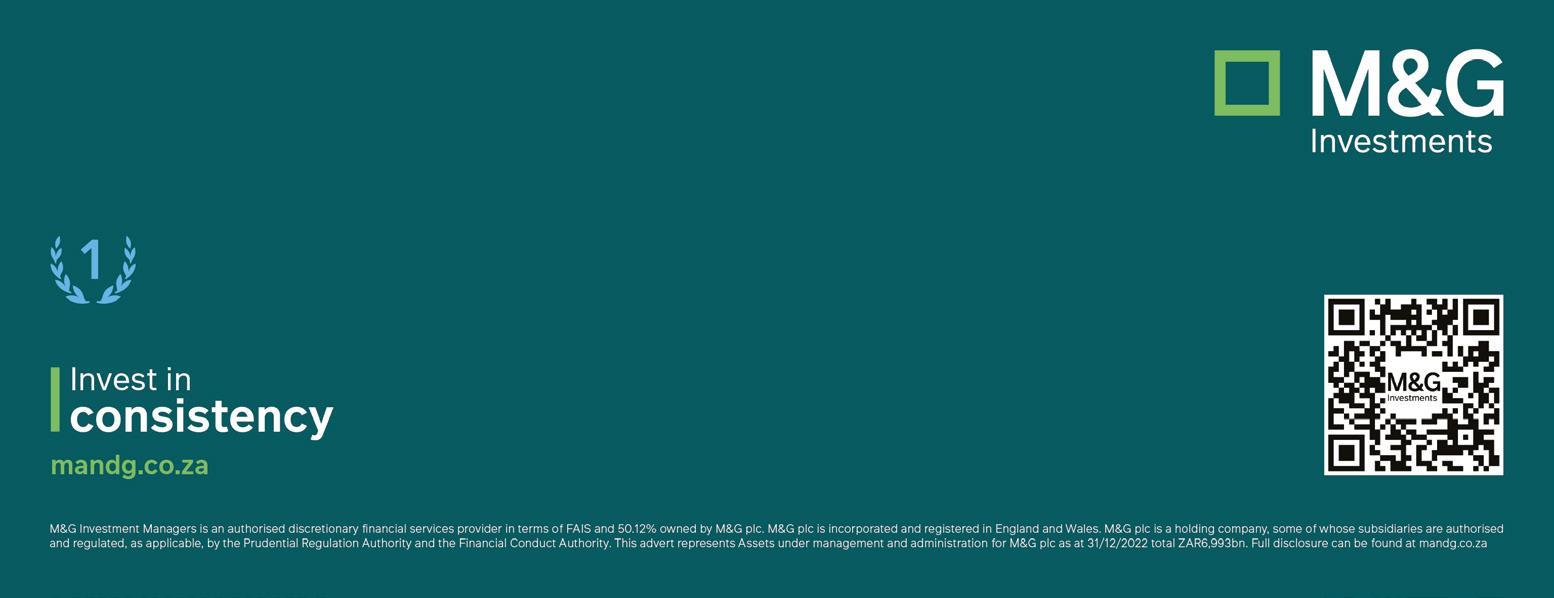

All the managers in the SA Best Investment View (BIV) category had positive returns for the year, with 8 out of the 13 managers beating the BIV median of 15.1%. The best performer in the Domestic BIV category of the survey was ClucasGray who returned 19.4% for the year ended 2024.
The ClucasGray fund actively seeks opportunities in local capital markets to achieve attractive real returns over time. Despite bond yields easing slightly after the election, they remain high relative to expected inflation, presenting an opportunity for real Rand returns, and the portfolio is positioned to take advantage of this.
South African equities continue to offer selective opportunities. Given the diverse makeup of the JSE, forming a broad market view is challenging. The fund invests across different company sizes, focusing on mispriced assets.
Comments relating to the performance of some managers in the SA BIV category:
Allan Gray – the fund underperformed its benchmark for the year ending December 2024. The fund’s underperformance was largely due to certain major holdings, such as AB InBev, not keeping pace with businesses more closely linked to the South African economy. These SA Inc. companies rallied strongly after the national elections and the formation of the government of national unity. While the portfolio had exposure to these companies, the allocation was lower than the index due to concerns over South Africa’s economic risks at the start of 2024. Additionally, a preference for low-duration fixed income instruments detracted from overall returns.

The best performer in the Domestic BIV category of the survey was for the 1-year ended December 2024.
who returned 19.4%
ALUWANI – the portfolio’s performance for the year was held back mainly by its lower exposure to the property sector earlier in the year. However, strong positions in domestic bonds, a gold exchange-traded fund (ETF), and cash compared to estimated peer allocations helped support returns. While the portfolio benefited from these asset class choices, it lagged behind its peers due to the timing of certain investment decisions.
Stock selection in domestic equities was a key factor in underperformance over both the quarter and the full year. After the post-election rally, investments in SA Inc. stocks were reduced as they reached their fair values, but the rally continued longer than expected, impacting returns. On the fixed income side, the fund’s bond holdings contributed positively, with gains driven by strong yields and duration positioning, although the impact of specific yield curve positioning was more limited.
Camissa – the fund delivered strong performance over the year, with all asset classes contributing positively. Local equities made a significant impact, particularly investments in Prosus/Naspers, Brait, Anglo American, Omnia, Quilter, and Pepkor, which performed well. However, the fund faced some pressure from weaker stocks such as Anglo Platinum, Northam Platinum, MTN, Sasol, and Glencore. Despite these challenges, MTN showed strong recovery towards the end of the year. The fund’s bond holdings also added value, benefiting from an overweight position in long-dated fixedrate government bonds, which provided high real yields amid stable inflation expectations.
The portfolio remains heavily weighted towards equities, particularly in the industrials and mining sectors, where diversified opportunities offer strong upside potential. The fund’s bond allocation continues to be positioned for high carry yields and potential capital gains, with a preference for long-duration bonds. Additionally, the fund holds high-yielding, long-dated money market instruments, further supporting returns. Investments in companies like Brait, which owns Premier Foods and Virgin Active, highlight a strategic focus on businesses with strong recovery potential and long-term value creation. This well-balanced positioning aims to capture both equity market growth and stable income opportunities.
Coronation – the strategy performed well over the year, supported by a strong allocation to equities, particularly domestic stocks. Financial and industrial shares delivered robust returns, benefiting from improved market sentiment and economic optimism. A significant underweight position in resources helped performance, as the sector struggled due to weaker commodity prices and concerns over China’s shift towards less infrastructure-heavy growth. Key holdings in OUTsurance, Capitec, Advtech, and WeBuyCars contributed positively, demonstrating solid earnings growth despite challenging economic conditions. While domestic stocks experienced a boost in market valuations, the focus remains on companies with strong fundamentals that can sustain earnings growth over the medium term.
An overweight position in the property sector also added value to the portfolio. Although the sector faces structural challenges, including poor municipal service delivery and rising costs, wellpositioned assets such as Attacq’s Waterfall Estate benefited from offering reliable infrastructure and services. The strategy maintains a cautious stance on resources, with only a small exposure to platinum group metal (PGM) miners, where limited investment in new supply and sustained demand could support future cash flows. SA equities remain the preferred domestic asset class, with attractive valuation opportunities providing a strong foundation for long-term returns.
Foord – South African equity investments were the main drivers of performance, with a preference for industrials and financials proving beneficial compared to the weaker resources sector. A significant allocation to Prosus added value, as Chinese stimulus measures supported the recovery of Tencent, in which Naspers/Prosus holds a large stake. Mid-capped SA Inc. companies, including Premier Group, WBHO, and Omnia, also contributed positively. Premier Group’s share price was lifted by strong earnings growth, improved operational efficiency, and growing confidence in the South African consumer market. However, an allocation to Anheuser-Busch InBev detracted from returns, as weaker beer sales in China and Argentina weighed on the company’s share price.
A moderate allocation to South African bonds also supported returns, as the start of the rate-cutting cycle helped bond prices rise.
However, the preference for inflation-linked bonds over nominal government bonds meant returns were slightly lower than those of peers with a less conservative approach. A modest holding in listed property, particularly in Fortress, provided additional gains. The fund’s gold exposure served as an important diversifier, benefiting from record-high gold prices driven by strong central bank demand and rising geopolitical tensions. Cash holdings also played a role, offering attractive yields while maintaining flexibility to take advantage of new investment opportunities.
Laurium – the fund delivered solid performance over the year, with equities and bonds being the main contributors. Equities provided the largest share of returns, while the fund’s bond positioning also added meaningful gains. A small allocation to cash ensured flexibility without significantly dragging on overall performance. Key stock contributors included Naspers, British American Tobacco, and The Foschini Group, which collectively added strong returns. Other positive contributors included Momentum, longer-dated South African bonds, and AngloGold, which performed well amid rising gold prices.
On the downside, Sasol, AB InBev, and Mondi detracted from returns, with platinum miners also under pressure due to weaker metal prices. From a sector perspective, global consumer stocks, general retailers, banks, and insurers were the biggest contributors, while oil and gas, resources, and telecommunications weighed on performance. Despite economic uncertainties, the fund remains focused on long-term fundamental investment decisions, selecting companies with strong industry positioning and capable management teams to drive future growth.
M&G – the fund experienced a volatile but resilient year in 2024, reflecting the challenges in the South African economy. Persistent load shedding, high inflation, and policy uncertainty weighed on investor sentiment, particularly in the first quarter, where both equities and bonds struggled. However, small positions in property and cash helped offset some losses. Key contributors included Naspers/Prosus, Multichoice, and gold miners, while MTN, banking shares (Standard Bank, FirstRand, and Absa), Exxaro, and Sasol detracted from performance.
Despite a tough start, the fund capitalised on a recovery in mining stocks and periods of risk-on sentiment in global markets to regain momentum.
A strong rebound in Q2 and Q3 was driven by equities, bonds, and cash, supported by holdings in The Foschini Group (TFG), Spar, and banking stocks, as investor confidence improved. Gains continued in Q3, with Prosus and financial shares delivering strong returns. However, Q4 saw a slight decline, as renewed concerns over global interest rates weighed on equities and bonds. Cash and property holdings provided stability during this period, helping to cushion the impact. Through strategic stock selection and asset allocation, the fund navigated market fluctuations effectively, ending the year on a solid note despite short-term challenges.
Ninety One – the strategy delivered performance in line with its benchmark over the past year, benefiting from an underweight cash position as risk assets performed strongly. However, the underweight allocation to property detracted from returns, as the sector experienced a strong rebound. Within bonds, the strategy’s overweight position in longer-duration instruments proved beneficial, as optimism around South Africa’s economic outlook grew. This shift attracted renewed foreign investor interest, strengthening both the rand and bond yields after years of decline.
In the equity portfolio, holdings in SA Inc. stocks, such as Mr Price, Capitec, and Discovery, contributed positively, while avoiding weaker performers like Sasol also added value. However, these gains were partially offset by positions in Mondi, Woolworths, and Glencore, which struggled. Additionally, the lack of exposure to smaller SA Inc. stocks such as RCL Foods, Premier Group, and Pepkor, which saw strong gains, weighed on overall equity selection performance. Despite these challenges, the strategy remained well-diversified, balancing sector opportunities and risk exposure effectively.
Truffle – the fund benefited from strong exposure to South African equities, which rallied following positive post-election sentiment. The SA property sector was the best-performing asset class, while financials and industrials also performed. However, SA resources struggled, declining 8.6% for the year due to weaker commodity prices and concerns over global policy changes. The bond market was volatile, but the fund’s exposure to duration and Tier 1 debt added to performance.
Key stock contributors included Naspers, Prosus, Anglo American, and Pepkor, which benefited from sector re-ratings and improving economic conditions. However, Anheuser-Busch InBev was the biggest detractor, impacted by its emerging market exposure and US dollar strength. Mining stocks such as Sasol, Glencore, Northam Platinum, and BHP also underperformed due to weaker commodity sentiment. As the year ended, the fund trimmed SA Inc. exposure to lock in profits and increased allocation to construction and industrial stocks like Bidcorp, Richemont, and BAT, ensuring a well-balanced portfolio with a focus on risk management.
The Global Best Investment View category of the Manager Watch survey recorded a median return of 14.8%, slightly lower than the 15.1% median return of domestic mandates. While both categories performed well, the difference between global and domestic mandates was smaller than in previous years. Global equity markets played a significant role in shaping returns, with asset managers adopting varied approaches to their global exposures.
Among the 44 asset managers who participated in this category in both years, 24 managers increased their global exposure, while 20 reduced it. Notably, three managers expanded their global allocation by more than 10 percentage points, indicating a strategic shift towards international investments. By December 2024, 39 out of 47 managers held more than 30% of their portfolios in global assets, with 10 exceeding the 40% mark.
The average international exposure of asset managers in the survey increased to 35.2% in December 2024, compared to 34.2% the previous year. This marks a steady rise from 29.9% in December 2022 and 27.3% in December 2021, highlighting an ongoing trend of increasing global allocations. However, five managers had exposure below 30% by a margin greater than 5%, suggesting a more cautious approach. The shifts in allocation demonstrate how managers are balancing global opportunities with domestic risks, adapting their strategies to evolving market conditions.

The best performer in the Global BIV category of the survey was for the year ended 2024. who returned PPS Managed 20.4%
Comments relating to the performance of some managers in the Global BIV category:
Allan Gray – the portfolio underperformed its benchmark for the one-year period ending December 2024. This underperformance was mainly due to weaker returns from domestic equities. Similarly, the domestic fixed interest segment delivered 14.0%, lower than the All Bond Index return of 17.2%.
South African businesses with strong ties to the local economy performed well after the national elections and the formation of the government of national unity. While the portfolio had exposure to these SA Inc. companies, the allocation was lower than both the index and many competing managers. The global portion of the portfolio also underperformed, mainly due to an underweight position in large-cap US technology stocks, which rallied significantly during the year.
ALUWANI – the portfolio performed well over the year, driven by overweight positions in domestic bonds, gold, and equity ETFs. However, the underweight allocation to the property sector earlier in the year held back returns. Stock selection in domestic equities also remained a challenge, limiting overall performance. While the fund benefited from key asset allocation decisions, the impact of certain equity choices offset some of these gains.
After the post-election rally, SA Inc. stocks were trimmed as they reached fair value, but the rally continued longer than expected, contributing to underperformance. Within bonds, rolling yield and duration added value, though yield curve positioning had little impact. Emerging market equity exposure was mostly positive throughout the year, but performance weakened in the final quarter. The China ETF struggled, while other emerging markets, particularly Japan and India, delivered strong returns.
Ashburton – the fund ended the year on a strong note, outperforming its benchmark, with local equities making the biggest contribution to overall performance. The Ashburton Equity Fund performed particularly well, outperforming the market index, while offshore investments also added value. Fixed income holdings were another positive driver, with the Ashburton Bond Fund delivering strong returns, outperforming the broader bond market.
However, exposure to the SA property sector detracted from overall returns, weighing on both allocation and selection performance.
A well-positioned overweight in SA equities, particularly SA Inc. stocks, helped drive outperformance, supported by strong selection choices. Fixed income investments also contributed positively, benefiting from both allocation and selection decisions. In offshore markets, holding more equities relative to fixed income proved beneficial. However, stock selection in global equities detracted from performance, mainly due to an underweight position in the leading US technology stocks, often referred to as the “Mag 7.”
Coronation – the strategy delivered strong performance over the year, supported by a high allocation to equities, both locally and globally. Global equity exposure was a key contributor, particularly from selective stock picks rather than broad market indices. While the S&P 500 Index became increasingly concentrated in a small group of stocks, the strategy focused on undervalued opportunities across different regions. Notable contributions came from companies such as Interactive Brokers in the US and long-term growth stocks like Auto 1, Spotify, and SEA, which gained momentum towards the end of the year. The strategy’s global portfolio remains well-diversified across sectors and geographies, offering strong longterm growth potential while also balancing risks.
Domestically, the strategy favoured local equities, which performed well over the year, particularly financial and industrial stocks. A key advantage was an underweight position in resources, which struggled due to weaker commodity prices. The property sector also contributed positively, with holdings such as Attacq’s Waterfall Estate, which benefited from its strong infrastructure and services. Despite structural challenges in the property market, selective investments added value. The strategy maintains a balanced approach, combining offshore and domestic holdings to capture opportunities in both markets. The combination of a high equity allocation and offshore exposure is expected to support solid returns over the medium term.
Foord – South African equities were the strongest contributors to performance, with a focus on industrials and financials helping to offset weakness in the resources sector. A key driver of returns was the fund’s exposure to Prosus, which benefited from
Chinese stimulus measures that boosted Tencent’s performance. Mid-sized SA Inc. companies such as Premier Group, WBHO, and Omnia also contributed positively, with Premier Group’s share price rising on strong earnings growth and improved sentiment towards the local consumer market. However, an allocation to Anheuser-Busch InBev detracted from performance, as lower beer sales in China and Argentina weighed on the company’s share price.
Global assets also played a meaningful role, although a low exposure to US Big Tech stocks meant global equity returns lagged the broader MSCI World Index. However, a tilt towards Chinese consumer-focused companies, which rallied following government stimulus, helped limit the impact. A moderate allocation to South African bonds contributed positively, as the start of the rate-cutting cycle supported bond prices, though a preference for inflation-linked bonds over nominal government bonds meant returns were more measured compared to peers. The fund’s exposure to listed property, particularly Fortress, added value, while holdings in gold proved to be a valuable diversifier as prices reached record highs, supported by central bank buying and geopolitical uncertainty. Cash holdings also contributed, providing strong returns while maintaining flexibility to take advantage of new opportunities.
Ninety One – the strategy delivered strong outperformance over the past year, driven mainly by effective stock selection in both domestic and offshore equities. Locally, SA Inc. stocks such as Mr Price, Capitec, and Discovery were key contributors, benefiting from improved market sentiment. On the global front, holdings in Taiwan Semiconductor, TKO Group, and Amazon added significant value. In addition, the strategy’s overweight position in longer-duration South African bonds performed well, as growing optimism about the local economy supported bond prices.
Asset allocation had a smaller impact on overall returns, but an underweight position in cash—both locally and offshore—was a key positive. With equities performing strongly across global markets, and both equities and bonds delivering solid returns locally, keeping cash allocations lower allowed the strategy to fully capture market gains. This approach ensured that the portfolio remained wellpositioned to benefit from risk assets, supporting outperformance throughout the year.
Nedgroup Investments Bravata Worldwide Flexible
– the fund delivered a steady performance over the year, navigating volatile global markets effectively. The fund benefited from strong stock selection, with key contributors including WeBuyCars, Victoria’s Secret, Super Group, Bath & Body Works, and Southern Sun. These holdings capitalised on positive momentum and company-specific developments, such as Super Group’s asset sale and special dividend announcement. However, the lack of exposure to major US technology stocks weighed on relative performance, as the Magnificent Seven stocks continued to dominate global equity returns. Foreign currency exposure provided little benefit when measured in rand terms, while holdings in beer, asset managers, and gambling stocks underperformed as investors shifted towards more speculative assets like crypto.
The fund’s local fixed interest and sovereign bond positions were a highlight, providing stability and solid returns amid market fluctuations. While foreign fixed interest holdings typically offer diversification benefits, they did not contribute meaningfully this year. The fund took advantage of market swings, adjusting its bond duration to capture opportunities. Looking ahead, the investment approach remains unchanged—focusing on high-quality assets with strong balance sheets and attractive valuations. The fund continues to favour emerging markets and local assets, believing that current valuations provide a solid foundation for future returns. Despite ongoing economic uncertainties, the portfolio remains positioned to benefit from long-term investment themes while managing short-term risks.
OMIG Balanced – the fund delivered strong absolute returns in 2024, supported by its exposure to risk assets. However, relative performance was slightly lower due to certain positioning choices. A key factor was the allocation to global cash, which was preferred over global bonds but still weighed on returns. The strong rally in global equities during Q1 also impacted performance, as the fund’s global growth and quality stocks underperformed. An underweight position in Nvidia was a major detractor, while the early exit from Tesla meant missing its rebound in the second half of the year. Additionally, Chinese stocks within the global growth portfolio struggled, further dampening returns.
On the positive side, the underweight position in local cash contributed meaningfully to performance. The fund maintained a preference for longerduration assets, expressed through an overweight position in local bonds and a small allocation to property. Stock selection within South African equities was another strong contributor, with overweight positions in SA Inc. stocks like Mr Price and The Foschini Group, as well as long-term holdings in small caps such as Raubex and Rhodes Food Group, adding value. Strategic trading, particularly in Anglo American and retail stocks, further enhanced returns, helping offset some of the challenges faced in global markets.
Sanlam – the fund delivered a strong return for the year, supported by active asset allocation and strategic positioning across asset classes. Throughout 2024, the fund maintained an overweight position in local bonds and foreign equities, which were key drivers of performance. These positions were funded by reducing exposure to foreign cash, foreign bonds, and local cash, allowing the portfolio to benefit from the higher returns offered by risk assets. Compared to peers, the allocation decisions added value, contributing positively to overall returns.
From a performance perspective, foreign equities, local equities, and local nominal bonds were the main contributors to returns. The strong showing in these asset classes helped offset potential risks, and notably, none of the asset classes detracted from performance during the year. This wellbalanced approach ensured that the fund captured growth opportunities while managing downside risks effectively. Looking ahead, the strategy remains focused on optimising asset allocation and stock selection to sustain long-term performance.
Sasfin BCI Balanced – the fund delivered solid returns over the quarter, outperforming its peer category. The fund benefited from strong global asset allocation, with global fixed income and equity holdings making meaningful contributions. Additionally, the weaker rand provided a boost to offshore investments. However, local market conditions remained challenging, with South African equities facing pressure due to ongoing risk-off sentiment, a weaker currency, and concerns over fiscal policy and government debt levels. Despite these headwinds, the fund’s long-term positioning remains aligned with its investment strategy, focusing on value opportunities in local and global markets.
Sasfin BCI Prudential – the fund delivered solid performance over the quarter, outperforming its peer category. The fund benefited from strong contributions from global fixed income and equity holdings, which helped offset weakness in local markets. The decline in the rand also provided a boost to offshore allocations. However, South African equities faced pressure due to a risk-off sentiment, concerns over government debt levels, and a weaker economic outlook. Despite these challenges, the fund’s strategic positioning in local bonds and select equities helped support overall returns, while maintaining a long-term focus on value-driven opportunities.
STANLIB – the fund delivered strong returns over the year, supported by tactical asset allocation and well-selected investments. A high exposure to equities, including both South African and global stocks, was a key driver of performance. The fund maintained a significant allocation to SA equities, alongside a large global equity position, allowing it to capture growth opportunities in both markets. Additionally, a meaningful allocation to SA bonds contributed positively, as local fixed income remained resilient.
Offshore fixed income holdings underperformed, detracting from overall returns, particularly when compared to the strong performance of global equities. While security selection in SA equities and bonds added value, offshore investment strategies in both equities and bonds weighed on relative performance. Despite this, the fund’s well-balanced approach and focus on highquality assets ensured solid returns for the year. Looking ahead, the strategy remains positioned to take advantage of growth opportunities while managing risks effectively.





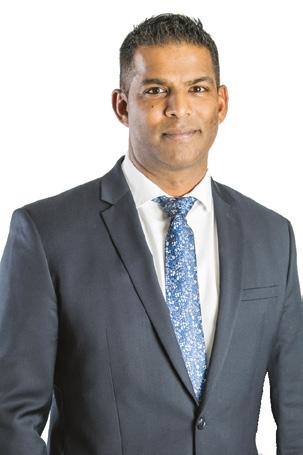
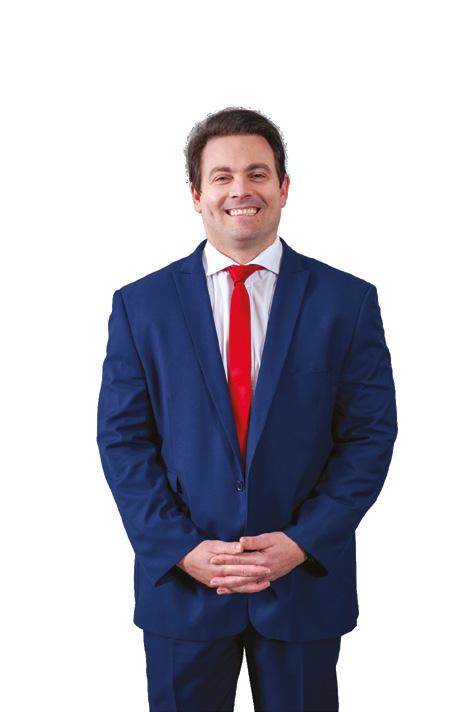







Mpho Molopyane Alexforbes Chief Economist
The year 2024 can be characterised as a year of twists and turns, with election outcomes reflecting a resounding rejection of the status quo.
On the macroeconomic side, growth proved to be resilient, despite concerns earlier in the year that tight monetary policy would weigh on economic activity.
In line with our expectations at the beginning of last year, disinflation continued, which afforded central banks the opportunity to begin easing policy rates in the second half of the year.
Locally, 2024 was a year of positive surprises. The formation of the Government of National Unity (GNU) following the elections and alleviation of electricity constraints contributed to a turn in consumer and business confidence. While growth remains tepid, it is on a clear recovery path.
Meanwhile, inflation moderated and breached the lower bound of the South African Reserve Bank’s (SARB) 3-6% target band in October and November. The benign inflation backdrop afforded the SARB room to lower the policy rate by 50 basis points (bps) in the second half of 2024 (2H24).
The supportive macroeconomic backdrop saw global equities return 18.0% over the year, while global bonds consolidated by 2.9%, despite coordinated monetary policy easing.
SA assets held their own, with equities and bonds returning 13.4% and 17.2% in rand terms for the year.
The year 2024 can be characterised as a year of twists and turns, with election outcomes reflecting a resounding rejection of the status quo (marked by high living costs and rising inequality). The 2024 election-packed calendar culminated with major election upsets and change in governments.

The wave of electoral defeats and change in governing parties will continue to reverberate through 2025 as the policy shift becomes evident. As investors put behind election uncertainty, they will have to contend with policy uncertainty, and rising geo-economic and geo-political fragmentation. The latest World Uncertainty Index shows that uncertainty rose in the third and fourth quarter of last year – highlighting that the macroeconomic environment is becoming increasingly uncertain.
On the macroeconomic side, growth proved to be resilient, despite concerns earlier in the year that tight monetary policy would weigh on economic activity. However, the 2024 growth picture was characterised by wide dispersions, with gross domestic product (GDP) growth in the US averaging 2.9% year on year (y/y) in the first three quarters. This contrasted with averages of 0.7% for both the euro area and the United Kingdom (UK). The exceptional growth performance in the US was supported by robust household consumption. US consumers have not felt the pinch of higher interest rates given the high share (95%) of fixed-rate mortgages. Consumption was also supported by high income growth driven by the tight labour market.
In China, growth and deflation woes came into focus. The ongoing adjustments in the property sector saw growth slow to 4.6% y/y in the third quarter of 2024 from 5.3% in the first quarter. Concerns over a much more pronounced slowdown prompted authorities to announce a mix of monetary and fiscal policy stimulus packages to stabilise growth. Fourth quarter data shows that the pace of economic expansion rose to 5.4% – bringing full year growth to 5.0%. While this was in line with the official target, it was slower than 2023’s 5.4% growth.
Turning to inflation, while the overall trend for the year was disinflation, there were some upward surprises along the way. The decline in inflation was also gradual, in line with our expectations at the beginning of last year.
Headline inflation in the US declined to 2.9% y/y by the end of 2024 from 3.1% in January – a 0.2 percentage point (ppt) decrease. In comparison to 2023, headline inflation eased by 3.0ppts between January (6.4%) and December (3.4%). Similar trends were observed in the euro area and UK, where headline inflation declined by 0.4 and 1.5ppts over the year, from 2.8% and 4.0% to 2.4% and 2.5%, respectively. This compared to decreases of 5.7 and 6.1ppts over 2023. The disinflation trend was also evident across emerging markets.
While inflation remains above target in much of the developed world, ongoing disinflation has allowed central banks to start easing policy rates. The US Federal Reserve (US Fed) and the European Central Bank (ECB) cut their policy rates by 100bps, while the Bank of England (BoE) opted for a 50bps reduction. Monetary policy in key emerging markets varied between 50 to 350bps as central banks responded to growth and inflation dynamics in their respective economies. The two key outliers were the Bank of Japan (BoJ) and the Central Bank of Brazil, where policy rates rose by 35 and 100bps, respectively, in response to a rise in inflation.

Locally, 2024 was a year of positive surprises
The formation of the GNU following the elections and the alleviation of electricity constraints contributed to a turn in consumer and business confidence. Load shedding intensity was 83% y/y lower last year, attributed to a decline in unplanned outages (UCLF). Recently, the energy availability factor (EAF) has decreased, however, this has been driven by an increase in planned outages (PCLF) for maintenance. At the same time, the slide in rail volumes also seems to have bottomed with a gradual recovery underway.
While growth remains tepid, it is on a clear recovery path. The 0.3% quarter on quarter (q/q) contraction in the third quarter 2024 GDP was largely attributed to a steep 28.8% q/q decline in agricultural output. Excluding the volatile agriculture sector, GDP growth was up 0.4% q/q and 1.1% y/y in the third quarter – pointing to some underlying momentum in economic activity.
Inflation moderated and breached the lower bound of the SARB’s 3-6% target band in October and November. For the year, headline inflation fell
significantly to average 4.4% in 2024, down from 5.9% y/y in 2023. The disinflationary process was mainly driven by a sharp deceleration in food inflation, fuel deflation and subdued core inflation. The benign inflation backdrop afforded the SARB room to lower the policy rate by 50bps in the second half of the year. However, the SARB remained hawkish at the last monetary policy committee meeting of 2024, warning about upside risks to the inflation outlook.
A stellar year for risk assets, characterised by US exceptionalism
Despite a tumultuous year in markets, with steep declines in the third quarter, risk assets closed the year in the green. The supportive macroeconomic backdrop saw global equities return 18.0% over the year. Returns were led by developed market (DM) equities that gained 19.2% over the year, primarily driven by US stocks that rose by a stellar 25%, fuelled by the AI rally. Emerging market (EM) equities returned 8% over the year, bolstered by a 19.7% gain in Chinese equities after authorities announced stimulus measures in the third quarter to stabilise growth.
Over the year, global and EM bonds declined by 2.9% and 2.4%, respectively, despite coordinated monetary policy easing in the second half of the year. This was driven by an uptick in yields as market participants scaled back expectations of aggressive interest rate cuts amid mounting fiscal concerns over expansionary fiscal policy.
Locally, the rand weakened by 2.6% against the US dollar but outperformed peer EM currencies, which depreciated by 11.1% against the dollar. SA stocks managed to return 13.4% for the year, in rand terms, with declines in resources (-8.7%) mitigated by returns in financials (+23.1%) and industrials (+18.5%).
Bonds posted a 17.2% return for the year, as yields declined following a compression in the risk premium.
In commodity markets, gold benefitted from increased central bank purchases and geopolitical concerns, surging by 27.2% over the year. The price of Brent crude oil declined by 3.1% in 2024 as growth concerns outweighed supply risks. Industrial commodities struggled due to weak demand, with iron ore down 25.3% over 2024.








Our active Fundamental Equity strategies can help you target alpha come rain or shine by giving exposure to global economic growth and productivity gains from new technologies. We find companies in both developed and emerging markets that offer attractive valuations and premium growth prospects, providing you with the opportunity for long-term returns across the market cycle. Let the numbers light the way.







Discover Robeco’s Fundamental Equity strategies














Kurtney Durgaparsad Technical Investment Specialist, Alexforbes
Have you ever thought about where your retirement savings are actually invested? In a world grappling with climate change, inequality and governance challenges, it is no longer enough for pension funds to focus only on financial returns. It is time for these institutions to also consider how their investments are shaping the future for generations to come, as well as the future of current retirement fund members and the world they will be retiring into. This is where environmental, social and governance (ESG) factors step in.
Globally, ESG reporting is becoming a buzzword, but for South African pension funds, it is much more than a passing trend. It is about ensuring that investments are resilient, ethical and beneficial, not only for members but also for the broader society.
Why does ESG reporting matter for pension funds?

The investment landscape has shifted dramatically in recent years. Investors today are not just concerned with ‘How much will I get?’ but also ‘How is my investment impacting the world around me?’ It is no surprise that pension funds are increasingly under pressure to incorporate ESG principles into their investment strategies.

In a recent research paper, presented at the Actuarial Society of South Africa’s 2024 Convention, we introduced the Sustainability Reporting Index to measure the extent to which pension funds are incorporating sustainable practices into their operational and investment decision-making processes. The overall global average index value was found to be 36% out of 100%. This is well short of the 80% level pension funds should be targeting to leverage the full potential of pension funds.
But why does this matter? Pension funds manage vast amounts of people’s money with long-term horizons and failing to consider ESG factors can expose them to significant risks. Let us take climate change as an example: climate change presents both physical risks (think floods, droughts and rising sea levels) and regulatory risks especially as governments implement stricter environmental laws. On the governance side, poorly run companies with unethical practices can tarnish their reputations and lose value very quickly. Such instances can have a direct and negative impact on the rand value of members’ retirement savings. Social issues like inequality and community relations also impact businesses’ long-term viability and reputations.
So, ignoring ESG is not just an ethical mistake; it can also lead to financial losses. On the flip side, funds that do take a proactive approach to ESG can not only help manage such risks, but also uncover various opportunities – such as investing in renewable energy, sustainable agriculture or companies with strong labour practices. Ultimately, measuring ESG performance helps pension funds understand how ESG considerations are managed and reflected in their investment portfolios, fostering trust, accountability and transparency – all of which align with fiduciary responsibilities. Additionally, ESG performance monitoring and reporting enables them to manage risks, and identify opportunities to create and preserve long-term investment capital.
Pension funds are not just passive investors. With billions of rands under management, they are powerful players in the economy, giving them the influence to drive meaningful change. The way pension funds allocate capital can influence corporate behaviour, promote sustainable practices, and even finance projects that benefit the entire economy and broader society.
But the responsibility goes beyond the boardroom. Trustees managing these funds have a fiduciary duty to make decisions in the best interest of members. Today, that includes ensuring that their investments are aligned with sustainable outcomes. After all, what good is a retirement payout if it comes at the cost of a polluted planet, social unrest or unsustainable businesses?
Pension funds can play a pivotal role in supporting South Africa’s transformation agenda. By integrating ESG principles, they can help address the country’s pressing challenges, be it promoting racial equity, supporting sustainable energy projects or investing in solutions that uplift disadvantaged communities. When pension funds embrace sustainability, they benefit members and the communities around them.
Globally, the push for ESG and sustainability reporting is growing stronger. Countries like the United Kingdom, the European Union and even the United States are moving towards mandatory sustainability disclosures. Why? Because it has become clear that transparency in these areas is not just about doing good; it is about managing risks and creating long-term value.
For South African pension funds, the relevance of ESG reporting is even more pronounced. Our country faces unique challenges such as high levels of inequality, an ongoing energy transition and social justice concerns, which make ESG more than just a box-ticking exercise (which many are guilty of doing). South African investors need to be particularly mindful of how their capital impacts local communities, labour markets and the environment.
By monitoring and reporting on sustainability, pension funds can help tackle some of these challenges head-on. This is not just about regulatory compliance anymore; it is about aligning investments with the goals of a more just, equitable and sustainable future, for all.
Why should pension funds bother with ESG performance monitoring and reporting?

are clear.
First, there is a growing body of evidence showing that integrating ESG into investment decisions can lead to stronger long-term returns. Companies that are more environmentally and socially responsible tend to be better managed, more resilient and more competitive in the marketplace. For pension funds, it means greater financial stability for their members.
Second, ESG reporting brings transparency and accountability to the forefront. Transparency is not just for regulators, it is for members too. People want to know how their money is being used, and ESG reports allow members to see the impact their investments are having on the world. This builds trust and ensures that members feel more connected and informed about their retirement savings.
Lastly, ESG performance monitoring and reporting can help attract a new generation of savers. Millennials and Gen Z, in particular, care deeply about sustainability. They want to invest in funds that align with their values and will most probably choose pension providers that demonstrate a commitment to responsible investing. By embracing sustainability performance monitoring and reporting, pension funds can position themselves as forward-thinking, responsible stewards of their members’ money.
Of course, ESG reporting does not come without its challenges (because everything does). One of the biggest hurdles is the lack of standardisation. Different funds use different frameworks, making it difficult to compare performance. Additionally, some funds may see ESG reporting as costly or burdensome, especially if they lack the expertise to effectively implement it.
But the challenges are not insurmountable. As more global standards emerge, pension funds can adopt best practices and improve their reporting over time. Collaboration with regulators, and industry bodies, such as Alexforbes, can help streamline the process.
The Alexforbes Impact Advisory and Impact Academy offers specialised sustainability insights, advice and solutions tailored to corporate clients, investors and pension funds. They are dedicated to helping clients achieve their sustainability goals, drive long-term success and create value.

By embracing sustainability reporting, South African pension funds are not just preparing for a better future – they are shaping it. ESG factors are no longer optional add-ons but essential components of long-term investment strategies. In a world that is changing rapidly, pension funds have the power, and the responsibility, to drive positive outcomes for both their members and the broader society.
By reporting on sustainability, pension funds can build trust, manage risks and secure stronger financial futures for all. It is time for pension funds, trustees and even members to demand more transparency and accountability.

Over the past three decades, the world has experienced major financial and economic shifts. From stock market milestones and financial crises to regulatory reforms and technological advancements, these events have shaped the global economy. This timeline provides a year-by-year overview of key financial events in both South Africa and the world.


Global: 1994
South Africa:
The introduction of a new survey by Alexander Forbes marked a key development in South Africa’s retirement fund industry. By benchmarking local retirement funds, fund managers were able to assess performance against global standards.
The US Federal Reserve unexpectedly increased interest rates, triggering a global bond market crisis. This resulted in significant losses for investors and highlighted the importance of better risk management practices within financial markets to prevent similar crises in the future.


The Johannesburg Stock Exchange (JSE) underwent a major transformation, changing from a member-owned organisation to a public company. This restructuring modernised the exchange, aligned it with international standards, and made it more attractive to both local and foreign investors, improving South Africa’s financial market.
Global:
The World Trade Organization (WTO) was established, replacing the General Agreement on Tariffs and Trade (GATT). This marked a significant milestone in global trade liberalisation, creating a structured framework for resolving trade disputes and ensuring fairer trade practices worldwide.
Global: 1995 1996


The South African government introduced the Growth, Employment and Redistribution (GEAR) strategy to stimulate economic growth and job creation. This macroeconomic policy focused on fiscal discipline, market liberalisation, and attracting foreign investment, aiming to strengthen South Africa’s economic stability.
The Dow Jones Industrial Average surpassed 6,000 points for the first time, reflecting strong economic growth in the 1990s. This milestone demonstrated growing optimism in global financial markets, particularly driven by the rise of technology stocks.


The introduction of the Medium Term Budget Policy Statement improved transparency in government fiscal planning. This initiative enabled the government to communicate its economic priorities and fiscal projections more clearly, helping investors and the public better understand South Africa’s financial outlook.
The Asian Financial Crisis began when Thailand’s currency, the baht, collapsed. The crisis quickly spread to other Asian economies, causing major currency devaluations and economic downturns.


The Competition Act was introduced, creating a new framework for regulating market competition. This law aimed to promote economic efficiency, prevent monopolies, and encourage fair business practices, making South Africa’s investment environment more attractive to both local and foreign investors.
Long-Term Capital Management (LTCM), a major hedge fund, collapsed due to excessive risk-taking and leverage. The US Federal Reserve had to coordinate a bailout to prevent wider financial instability. This event highlighted the dangers of highly leveraged investment strategies and the systemic risks they pose to global financial markets.


The Financial Services Board Act was amended to strengthen the regulation of non-banking financial services. This reform improved investor protection and helped ensure the stability of South Africa’s financial sector, making it more resilient to external shocks.
The euro was introduced as an accounting currency, marking a key step in European economic integration. This move laid the foundation for the physical introduction of euro banknotes and coins in 2002, creating a major new currency in global financial markets.
The dot-com bubble reached its peak, followed by a sharp decline in technology stock prices. Many internet-based companies, which had been heavily overvalued, suffered significant losses, leading to a broader economic slowdown. This event marked the end of the speculative frenzy surrounding early internet businesses. Global: Global:


The Johannesburg Stock Exchange (JSE) launched an electronic trading platform called SETS, replacing the traditional open-outcry system. This technological advancement improved market efficiency, increased liquidity, and enhanced transparency, making the JSE more competitive internationally.


The Mineral and Petroleum Resources Development Act was introduced to reform South Africa’s mining sector. This legislation aimed to ensure equitable access to mineral resources, encourage foreign investment, and align the industry with new environmental and social policies.
The September 11 terrorist attacks in the United States caused widespread financial disruption. Stock markets temporarily closed, and investor confidence plummeted. The attacks led to a global economic slowdown, increased government spending on security, and a shift in financial markets as investors moved towards safer assets like gold and government bonds.


The Johannesburg Stock Exchange (JSE) officially became a listed public company. This transformation aligned the JSE with international best practices in corporate governance and provided a clearer regulatory structure.
The Sarbanes-Oxley Act was enacted in the United States in response to major corporate fraud scandals involving companies like Enron and WorldCom. This law introduced stricter financial regulations and corporate governance rules to prevent accounting fraud and restore trust in financial markets.


The Financial Intelligence Centre Act came into effect, improving South Africa’s anti-money laundering and counter-terrorism financing measures. This law strengthened financial compliance standards and helped align South Africa with international financial security regulations, increasing investor confidence in the country’s banking system.
Global:
The completion of the Human Genome Project marked a breakthrough in biotechnology and medicine. This scientific milestone led to significant investment opportunities in pharmaceutical companies and personalised medicine, paving the way for advancements in healthcare and biotechnology sectors.


The Black Economic Empowerment (BEE) Act was implemented to promote greater participation of previously disadvantaged groups in the economy. This law significantly impacted corporate ownership structures and investment strategies in South Africa, encouraging businesses to prioritise diversity and inclusivity.
Google’s initial public offering (IPO) raised $1.67 billion, making it one of the largest and most anticipated technology IPOs at the time. This event signalled the growing importance of internet-based companies in global financial markets and set the stage for the dominance of digital platforms.


The National Credit Act was introduced to regulate consumer credit and protect borrowers from excessive debt. This legislation aimed to prevent reckless lending and improve responsible financial behaviour among consumers, strengthening the stability of South Africa’s banking sector.
Global:
The US housing market continued its rapid growth, fuelled by easy credit and speculative investments. While home prices reached record highs, concerns about subprime mortgage lending began to emerge, setting the stage for the global financial crisis of 2008.

The Johannesburg Stock Exchange (JSE) launched the Socially Responsible Investment (SRI) Index to encourage ethical investing. This initiative reflected the global shift towards considering environmental, social, and governance (ESG) factors in financial decision-making.
Global:

The New York Stock Exchange (NYSE) merged with Archipelago Holdings to form NYSE Group, Inc., becoming the world’s largest stock exchange by market capitalisation.


The Co-operative Banks Act was passed to provide a regulatory framework for cooperative financial institutions. This law aimed to improve financial inclusion by supporting community-based banking services and expanding access to credit for smaller enterprises.
Global:
The subprime mortgage crisis in the United States began, with major lenders reporting significant losses due to risky mortgage-backed securities. This marked the start of a financial downturn that would escalate into a global financial crisis.

The Companies Act was revised to modernise corporate law and improve corporate governance standards. These changes aimed to enhance South Africa’s business environment and attract investment by ensuring greater transparency and accountability in company operations.
Global:

The collapse of Lehman Brothers triggered a worldwide financial crisis, leading to massive government interventions, including bailouts and stimulus packages. This event reshaped global financial markets and regulations, with long-lasting economic consequences.


The country officially entered a recession for the first time in 17 years due to the global financial crisis. The economic downturn led to job losses, reduced consumer spending, and a decline in foreign investment.
The G20 summit in London resulted in a $1.1 trillion stimulus package to address the global financial crisis. This international cooperation aimed to stabilise financial markets, reform banking regulations, and stimulate economic recovery.
The European sovereign debt crisis escalated, with Greece receiving its first bailout package from the International Monetary Fund (IMF) and the European Union. This crisis raised concerns about the sustainability of public debt in several European countries. Global:



The country hosted the FIFA World Cup, leading to significant investment in infrastructure and boosting tourism. This event showcased South Africa’s economic potential and improved its international reputation as an investment destination.


The National Treasury introduced a new prudential framework for insurance companies, aligning with international best practices. This regulatory update aimed to improve financial stability and resilience within the insurance sector.
The United States lost its AAA credit rating from Standard & Poor’s for the first time, reflecting concerns about rising government debt and political instability. This downgrade impacted global financial markets and increased borrowing costs for the US government.


The country was included in the Citigroup World Government Bond Index, attracting increased foreign investment in government bonds. This inclusion reflected South Africa’s growing significance in global financial markets and improved access to international capital.
European Central Bank President Mario Draghi pledged to do “whatever it takes” to save the euro, stabilising financial markets. This commitment led to the introduction of new monetary policy measures aimed at addressing the European debt crisis.


The Financial Services Laws General Amendment Act was passed to strengthen financial sector regulation. This legislation improved consumer protection and enhanced financial stability by reinforcing oversight of financial institutions.
Global:
The US Federal Reserve announced plans to reduce its quantitative easing programme, causing market volatility. This shift marked the beginning of a transition away from the ultra-low interest rates implemented after the financial crisis.
Global: 2013 2014


The country issued its first Islamic bond (sukuk), diversifying funding sources and attracting new investors. This move positioned South Africa as a leader in Islamic finance on the African continent.
Alibaba Group’s initial public offering (IPO) became the largest in history, raising $25 billion on the New York Stock Exchange. This event underscored the growing influence of Chinese technology companies in global markets.


The Financial Sector Regulation Act introduced a “twin peaks” model of financial regulation, strengthening oversight of both prudential and market conduct aspects of the financial sector.
The Swiss National Bank unexpectedly removed the Swiss franc’s peg to the euro, leading to significant market volatility. This decision had widespread implications for global currency markets and economic stability.


The country narrowly avoided a credit rating downgrade to junk status, preserving its investment-grade rating. Maintaining this rating was crucial for sustaining investor confidence and access to international capital markets.
The United Kingdom voted to leave the European Union (Brexit), triggering economic uncertainty and market volatility worldwide. The decision raised concerns about global trade and investment flows.


The country’s sovereign credit rating was downgraded to junk status by S&P Global and Fitch Ratings, reflecting political and economic concerns.
Bitcoin and other cryptocurrencies surged in value, with Bitcoin reaching nearly $20,000. This sparked debates about the future of digital currencies and blockchain technology.

The Carbon Tax Act came into effect, encouraging investment in renewable energy and cleaner technologies.
An inverted yield curve in the US bond market triggered fears of a potential recession, causing market volatility.
The pandemic caused a global economic crisis, prompting unprecedented fiscal and monetary stimulus measures worldwide. Global:
President Cyril Ramaphosa launched an investment drive targeting $100 billion in new investments over five years to boost economic growth and job creation.
The US-China trade war escalated, leading to global trade disruptions and economic uncertainty.

The COVID-19 pandemic led to the country’s deepest economic contraction in nearly a century. The government implemented a large stimulus package to support businesses and protect jobs.


The government launched the Economic Reconstruction and Recovery Plan to address the impact of the COVID-19 pandemic. This initiative focused on infrastructure investment, energy security, and job creation to stimulate economic growth and restore stability.
Central banks worldwide, including the US Federal Reserve and the European Central Bank, aggressively raised interest rates to combat surging inflation. This shift marked the end of the low-interest-rate environment that had persisted since the global financial crisis. Global: Global: 2021
Meme stocks and retail investing gained prominence, with GameStop’s stock price soaring due to a short squeeze orchestrated by retail investors on social media. This event highlighted the growing influence of retail traders and the impact of social media on financial markets.


The country was placed on the Financial Action Task Force’s (FATF) grey list due to concerns over money laundering and terrorist financing controls. This move led to increased efforts by the government to strengthen financial regulations and regain investor confidence.

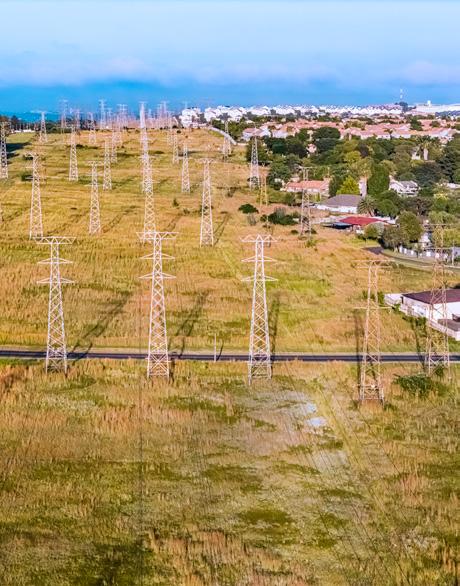
The country faced its worst electricity crisis, with prolonged power outages severely impacting economic growth and business operations. The government announced plans to restructure Eskom, the state-owned power utility, and accelerate private sector participation in electricity generation.
Global:
The collapse of Silicon Valley Bank and Signature Bank triggered concerns about the stability of the banking sector. These failures prompted increased regulatory scrutiny of regional banks and discussions about the resilience of the financial system.


South Africa:
The economic outlook remains uncertain, with ongoing challenges such as power shortages and high unemployment. The government continues to focus on structural reforms and foreign investment to stimulate economic growth and improve long-term stability.
Global:
Geopolitical tensions, including conflicts in Ukraine and the Middle East, continue to affect global financial markets and commodity prices. Central banks are navigating the challenge of balancing inflation control with economic growth in an uncertain global environment.
The past 30 years have been shaped by financial crises, regulatory changes, and technological advancements. From the JSE’s modernisation to global economic shocks and digital revolutions, these events continue to influence investment trends and economic policies worldwide. As financial landscapes evolve, stability, innovation, and adaptability remain crucial for future growth.

Since 2005, Argon Asset Management has grown individual and institutional investor assets. As an active, researchdriven investment manager we believe value emerges over the medium- to long-term. This is why our commitment to build enduring relationships with our clients, grounded in trust and accountability lies at the heart of who we are.
Objective: The portfolios are balanced (i.e. multiple asset class) portfolios subject to the restrictions imposed by Regulation 28 of the Pension Funds Act and are confined to investing in South Africa only.
Objective: The portfolios are balanced (multi-asset class) portfolios subject to the restrictions imposed by Regulation 28 of the Pension Funds Act and are confined to investing in South Africa only. These portfolios represent the managers’ best investment view.
V = Verified C = Compliant
Objective: The portfolios are balanced (i.e. multiple asset class) portfolios subject to the restrictions imposed by Regulation 28 of the Pension Funds Act and are confined to investing in South Africa only. These portfolios represent the managers’ best investment view.
Investment Data to the end of December for the past 5 Calendar years
* No performance history
Objective: The portfolios are balanced (multi-asset class) portfolios subject to the restrictions imposed by Regulation 28 of the Pension Funds Act and aim to maximise long-term (more than 5 years) capital growth. This may lead to volatility of returns in the short term (less than one year).
Range of returns of the Global Dynamic Investable Universe for the periods ending 31 December 2024
Objective: The portfolios are balanced (multi-asset class) portfolios subject to the restrictions imposed by Regulation 28 of the Pension Funds Act and aim to maximise long-term (more than 5 years) capital growth. This may lead to volatility of returns in the short term (less than one year).
V = Verified C = Compliant
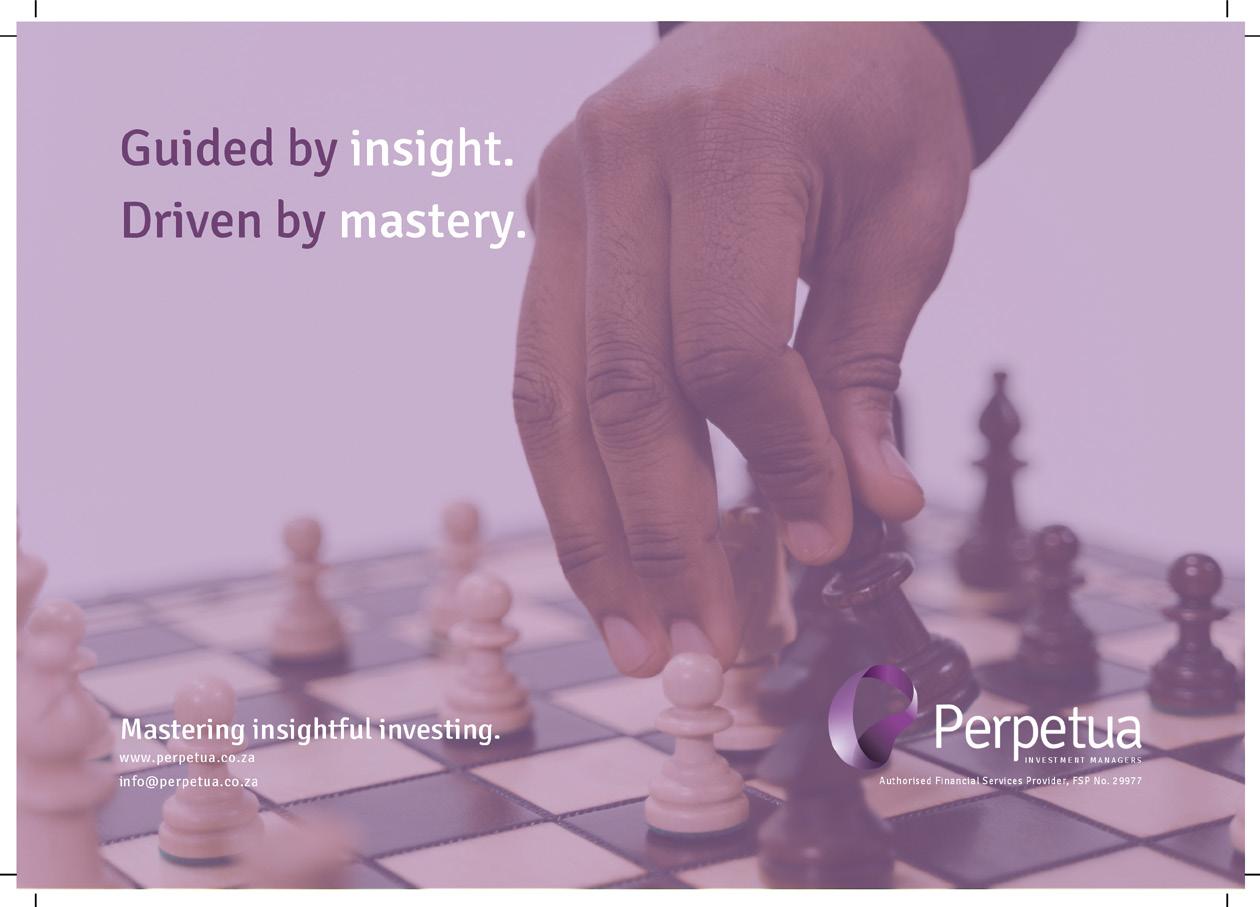
Objective: The portfolios are balanced (i.e. multiple asset class) portfolios subject to the restrictions imposed by Regulation 28 of the Pension Funds Act and are have exposure to both global and local assets. These statistics represent the various categories that portfolios are represented in but only for those managers that are open to new investments.
Investment Data to the end of December 2024 –
Investment Data to the end of December for the past 5 Calendar years
* No performance history
Objective: The portfolios are balanced (multi-asset class) portfolios subject to the restrictions imposed by Regulation 28 of the Pension Funds Act and represent the managers’ best investment view.
of Returns of the Global Best Investment View Investable Universe for the periods ending 31 December 2024
Objective: The portfolios are balanced (multi-asset class) portfolios subject to the restrictions imposed by Regulation 28 of the Pension Funds Act and represent the managers’ best investment view.
Objective: The portfolios are balanced (i.e. multiple asset class) portfolios with exposure to global and local assets. subject to the restrictions imposed by Regulation 28 of the Pension Funds Act and represent the managers’ best investment view.
Objective: The portfolios are balanced (multi-asset class) portfolios with exposure to global and local assets. subject to the restrictions imposed by Regulation 28 of the Pension Funds Act and represent the managers’ best investment view.
Investment Data to the end of December for the past 5 Calendar years
No performance history
Objective: The portfolios are balanced (i.e. multiple asset class) portfolios with exposure to both global and local assets. subject to the restrictions imposed by Regulation 28 of the Pension Funds Act and aim to minimise the probability of short-term (i.e. less than one year) capital loss while targeting long-term (i.e.more than five years) capital return.
Range of Returns of the Global Conservative Investable Universe for the periods ending 31 December 2024
Return Statistics (Investable)
Unlock global markets with South Africa’s ETF powerhouse.
Experience world-class investing with Sygnia – South Africa’s second-largest provider of exchange traded funds (ETFs) and the undisputed leader in international ETFs on the JSE.
The smarter way to invest globally, right from home. Learn



Sygnia Exchange Traded Funds
Sygnia Itrix Top 40 ETF
Sygnia Itrix S&P 500 ETF
Sygnia Itrix Euro Stoxx 50 ETF
Sygnia Itrix FTSE 100 ETF
Sygnia Itrix MSCI USA ETF
Sygnia Itrix MSCI World ETF
Sygnia Itrix MSCI Japan ETF
Sygnia Itrix Global Property ETF
Sygnia Itrix MSCI Emerging Markets 50 ETF
Sygnia Itrix S&P Global 1200 ESG ETF
Sygnia Itrix MSCI China Feeder ETF
Sygnia Itrix Top 40 ETF
Sygnia Itrix S&P 500 ETF
Sygnia Itrix Euro Stoxx 50 ETF
Sygnia Actively Managed Exchange Traded Funds
Sygnia Itrix 4th Industrial Revolution Global Equity Actively Managed ETF
Sygnia Itrix Health Innovation Actively Managed ETF
Sygnia Itrix FANG.AI Actively Managed ETF
Objective: The portfolios are balanced (i.e. multiple asset class) portfolios with exposure to both global and local assets. subject to the restrictions imposed by Regulation 28 of the Pension Funds Act and aim to minimise the probability of short-term (i.e. less than one year) capital loss while targeting long-term (i.e.more than five years) capital return.
Objective: The portfolios are balanced (i.e. multiple asset class) portfolios with exposure to both global and local assets. subject to the restrictions imposed by Regulation 28 of the Pension Funds Act and aim to minimise the probability of short-term (i.e. less than one year) capital loss while targeting long-term (i.e.more than five years) capital return.
Investment Data to the end of December 2024 – Performance Data
Investment Data to the end of December for the past 5 Calendar years
Objective: The portfolios are balanced (i.e. multiple asset class) portfolios subject to the restrictions imposed by Regulation 28 of the Pension Funds Act and are confined to investing in South Africa only. These portfolios represent the managers’ best investment view.
Objective: The portfolios are balanced (i.e. multiple asset class) portfolios with exposure to both global and local assets. subject to the restrictions imposed by Regulation 28 of the Pension Funds Act and aim to maximize long-term (i.e. more than 5 years) capital returns. This may lead to volatility of returns in the short-term (i.e. less than one year).
Objective: The portfolios are balanced (i.e. multiple asset class) portfolios with exposure to global and local assets. subject to the restrictions imposed by Regulation 28 of the Pension Funds Act and represent the managers’ best investment view.
Objective: The portfolios are balanced (i.e. multiple asset class) portfolios subject to the restrictions imposed by Regulation 28 of the Pension Funds Act and aim to minimise the probability of short-term (i.e. less than one year) capital loss while targeting long-term (i.e. more than five years) capital growth.
Return
vs Return Scatterplot – Global Conservative 3 years ended 31 December 2024
vs Return Scatterplot –
SA Best Investment View
* Data not available
After grafting, oysters are placed in a safe environment and cared for while the pearl slowly grows.
Likewise, investments need regular attention and the favourable conditions to grow and succeed over time.




Objective: The portfolios included in this survey represent specialist active equity portfolios with various benchmarks. No carve-outs are reflected.
Range of Returns of the SA Equity Total Investable Universe for the periods ending 31 December 2024
Return Statistics (Investable)
Benchmarks of Portfolios in the equity survey as a percentage of the Survey
Objective: The portfolios included in this survey represent specialist active equity portfolios with various benchmarks. No carve-outs are reflected. General
Objective: The portfolios included in this survey represent specialist active equity portfolios with various benchmarks. No carve-outs are reflected.

Objective: The portfolios included in this survey represent specialist active equity portfolios with various benchmarks. No carve-outs are reflected.
Objective: The portfolios included in this survey represent specialist active equity portfolios with various benchmarks. No carve-outs are reflected.
Investment Data to the end of December 2024 – Performance Data
No performance history
Objective: The portfolios included in this survey represent specialist active equity portfolios with various benchmarks. No carve-outs are reflected.
* No performance history
Objective: The portfolios included in this survey represent specialist active equity portfolios with various benchmarks. No carve-outs are reflected.
No performance history
Objective: The portfolios included in this survey represent specialist active equity portfolios with various benchmarks. No carve-outs are reflected.
Investment Data to the end of December for the past 5 Calendar years
* No performance history
Objective: The portfolios included in this survey represent specialist active equity portfolios with various benchmarks. No carve-outs are reflected.
No performance history
Objective: The portfolios included in this survey represent specialist active equity portfolios with various benchmarks. No carve-outs are reflected.
Investment Data to the end of December for the past 5 Calendar years
* No performance history
Objective: The portfolios included in this survey represent specialist active equity portfolios with various benchmarks. No carve-outs are reflected.
Objective: The portfolios included in this survey represent specialist active actual equity portfolios with various benchmarks. No carve-outs are reflected.
Due to differing benchmarks, the portfolios below are
No performance history
and
Objective: The portfolios included in this survey represent specialist active equity portfolios with various benchmarks. No carve-outs are reflected.
Investment Data to the end of December 2024 – Risk vs Return
S&P
Objective: The portfolios included in this survey represent specialist active equity portfolios with various benchmarks. No carve-outs are reflected.
Objective: The portfolios included in this survey represent specialist active equity portfolios with various benchmarks. No carve-outs are reflected.
Objective: The portfolios included in this survey represent specialist active equity portfolios with various benchmarks. No carve-outs are reflected.






1 Year to 31 December 2024
Vunani Active Capped SWIX
Umthombo Wealth Moderate Equity
STANLIB Enhanced Multi Style Equity
Satrix Momentum Equity
Prescient Core Capped SWIX Equity
OMIG Managed Alpha
Old Mutual Fundamental Equity
Mergence SWIX
Mergence Capped SWIX
Mergence CAPI
Mazi Capi
Matrix Domestic Equity
M&G Select Equity
M&G Houseview Equity
Legacy Africa FM Capped SWIX
Excelsia Capital Core Equity
Camissa Core Equity Capped SWIX
Coronation Core Equity
Argon SA Equity Capped SWIX
ALUWANI Capped SWIX
Aeon Active Equity
36ONE SA Equity
1 Year to 31 December 2024 Not Benchmark Cognisant
Objective: The portfolios included in this survey represent specialist bond portfolios with ALBI as their benchmark and have an effective modified duration mandate of ±2 years around the ALBI. This survey also include the following two categories: inflation linked bonds and flexible bonds-income.
Range of Returns of the Specialist Bond Universe for the periods ending 31 December 2024
Return Statistics (Investable)

Objective: The portfolios included in the specialist bond category of this survey represent portfolios with ALBI as their benchmark and have an effective modified duration mandate of ±2 years around the ALBI. The participants in the flexible bond and inflation linked bond categories represent portfolios with various benchmarks.
Objective: The portfolios included in the specialist bond category of this survey represent portfolios with ALBI as their benchmark and have an effective modified duration mandate of ±2 years around the ALBI. The participants in the flexible bond and inflation linked bond categories represent portfolios with various benchmarks.
performance history.
Objective: The portfolios included in the specialist bond category of this survey represent portfolios with ALBI as their benchmark and have an effective modified duration mandate of ±2 years around the ALBI. The participants in the flexible bond and inflation linked bond categories represent portfolios with various benchmarks.
No performance history
Objective: The portfolios included in the specialist bond category of this survey represent portfolios with ALBI as their benchmark and have an effective modified duration mandate of ±2 years around the ALBI. The participants in the flexible bond and inflation linked bond categories represent portfolios with various benchmarks.
Investment Data to the end of December for the past 5 Calendar years
Objective: The portfolios included in the specialist bond category of this survey represent portfolios with ALBI as their benchmark and have an effective modified duration mandate of ±2 years around the ALBI. The participants in the flexible bond and inflation linked bond categories represent portfolios with various benchmarks.
Investment Data to the end of December 2024
* No performance history
Objective: The portfolios included in the specialist bond category of this survey represent portfolios with ALBI as their benchmark and have an effective modified duration mandate of ±2 years around the ALBI. The participants in the flexible bond and inflation linked bond categories represent portfolios with various benchmarks.
Objective: The portfolios included in the specialist bond category of this survey represent portfolios with ALBI as their benchmark and have an effective modified duration mandate of ±2 years around the ALBI. The participants in the flexible bond and inflation linked bond categories represent portfolios with various benchmarks.
1 Year to 31 December 2024
1 Year to 31 December 2024
Objective: The portfolios in this survey represent short-term debt securities that are highly marketable and trade in large denominations.
Objective: The portfolios in this survey represent short-term debt securities that are highly marketable and trade in large denominations.
Investment Data to the end of December 2024
Objective: The portfolios in this survey represent short-term debt securities that are highly marketable and trade in large denominations.
Investment Data to the end of December 2024
* No performance history
Objective: The portfolios in this survey represent short-term debt securities that are highly marketable and trade in large denominations.
Objective: The portfolios in this survey represent short-term debt securities that are highly marketable and trade in large denominations.
Investment Data to the end of December for the past 5 Calendar years
1 Year to 31 December 2024
Maximum duration up to 90 days
Maximum duration from 91–180 days
Objective: The portfolios in this survey comply with Regulation 28 and represent products targeted at real returns with a CPI objective.
Objective: The portfolios in this survey comply with Regulation 28 and represent products targeted at real returns with a CPI objective.
Objective: The portfolios in this survey comply with Regulation 28 and represent products targeted at real returns with a CPI objective.
Objective: The portfolios in this survey comply with Regulation 28 and represent products targeted at real returns with a CPI objective.
Data to the end of December 2024
* No performance history # Inflation figures in this table are lagged by one month
Objective: The portfolios in this survey comply with Regulation 28 and represent products targeted at real returns with a CPI objective.
Data to the end of December 2024
Inflation figures in this table are lagged by one month
vs Return Scatterplot for Absolute Return Managers – All categories for the 3 Years ended 31 December 2024
vs
Scatterplot for Absolute
Managers – All categories for the 3 Years ended 31 December 2024


1 Year to 31 December 2024
* Data not available
1 Year to 31 December 2024
Objective: The purpose of the TDI Manager WatchTM survey is to provide clients, trustees, consultants and asset managers with objective and meaningful performance and risk comparisons within SA TDI mandates.
Investment data to the end of December 2024 – Performance Data
# Inflation figures in this table are lagged by one month
Objective: The purpose of the TDI Manager WatchTM survey is to provide clients, trustees, consultants and asset managers with objective and meaningful performance and risk comparisons within SA TDI mandates.
Investment Data to the end of December for the past 5 Calendar years
# Inflation figures in this table are lagged by one month
Volatility vs Return – TDI Balanced, Equity, Absolute, Alternative & Property Portfolios 3 years ended 31 December 2024
Volatility vs Return – TDI Fixed Interest Portfolios 3 years ended 31 December 2024
Objective: The portfolios in this survey show the performance of fund of hedge fund managers. FoHF managers select a number of underlying single hedge fund managers to provide diversification across a range of alternative strategies.
Investment Data to the end of December 2024
*No performance history.
# Inflation figures in this table are lagged by one month
Objective: The portfolios in this survey show the performance of fund of hedge fund (FoHF) managers. FoHF managers select a number of underlying single hedge fund managers to provide diversification across a range of alternative strategies.




Building a better world takes action, vision, and commitment. At Sanlam Investments, we’re working towards a future where opportunities grow, inequality fades, and sustainability thrives. Real change starts now. Invest with purpose.


Sanlam Investments. Investing with confidence in the future we need.
















Objective: The purpose of this survey is to provide clients, consultants and asset managers with objective and meaningful performance and risk comparisons across SA property mandates.
Objective: The purpose of this survey is to provide clients, consultants and asset managers with objective and meaningful performance and risk comparisons across SA property mandates.
to the end of December 2024
Objective: The purpose of this survey is to provide clients, consultants and asset managers with objective and meaningful performance and risk comparisons across SA property mandates.
Fixed Asset Allocation: Managers included in the survey typically make use of fixed asset allocations, which means that they balance the asset allocation back to the strategic long-term asset allocation target (from time to time, according to predefined strategies) with no intention to enhance returns from an asset allocation point of view. However, while some of these managers adhere rigidly to these fixed asset allocations, others may allow these allocations to drift slightly within certain margins.
Strategic Asset Allocation: Although managers included in the survey may have long-term strategic asset allocation targets, they actively manage the asset allocation in an attempt to enhance returns. The different categories above (Low Volatility, Best Investment View and Dynamic) represent the different risk profiles of the funds. The Low Volatility category represents the manager’s most conservatively managed portfolio while the Dynamic category represents the manager’s most aggressively managed portfolio, according to the manager’s discretion.
Fixed Asset Allocation: Managers included in the survey typically make use of fixed asset allocations, which means that they balance the asset allocation back to the strategic long-term asset allocation target (from time to time, according to predefined strategies) with no intention to enhance returns from an asset allocation point of view. However, while some of these managers adhere rigidly to these fixed asset allocations, others may allow these allocations to drift slightly within certain margins.
Strategic Asset Allocation: Although managers included in the survey may have long-term strategic asset allocation targets, they actively manage the asset allocation in an attempt to enhance returns. The different categories above (Low Volatility, Best Investment View and Dynamic) represent the different risk profiles of the funds. The Low Volatility category represents the manager’s most conservatively managed portfolio while the Dynamic category represents the manager’s most aggressively managed portfolio, according to the manager’s discretion.
Fixed Asset Allocation: Managers included in the survey typically make use of fixed asset allocations, which mean that they balance the asset allocation back to the strategic long-term asset allocation target (from time to time, according to predefined strategies) with no intention to enhance returns from an asset allocation point of view. However, while some of these managers adhere rigidly to these fixed asset allocations, others may allow these allocations to drift slightly within certain margins.
Strategic Asset Allocation: Although managers included in the survey may have long-term strategic asset allocation targets, they actively manage the asset allocation in an attempt to enhance returns. The different categories above (Low Volatility, Best Investment View and Dynamic) represent the different risk profiles of the funds. The Low Volatility category represents the manager’s most conservatively managed portfolio while the Dynamic category represents the manager’s most aggressively managed portfolio, according to the manager’s discretion.
Volatility vs Return Scatterplot - Multi Managers Equity – 3 Years ended 31 December 2024
Volatility vs Return Scatterplot - Multi Managers Bonds and Money Market – 3 Years ended 31 December 2024
Excess Return vs Tracking Error Scatterplot - Multi Managers Equity 3 Years ended 31 December 2024
Return
Excess Return vs Tracking Error Scatterplot - Multi Managers Bonds and Money Market - 3 Years ended 31 December 2024
Volatility vs Return Scatterplot - Multi Managers Absolute Return funds 3 Years ended 31 December 2024
Excess Return vs Tracking Error Scatterplot - Multi Managers Absolute Return funds 3 Years ended 31 December 2024
No performance history # Inflation figures in this table are lagged by one month.
Inflation figures in this table are lagged by one month.
Objective: The portfolios in this survey are targeted at medical aids and are bound by the restrictions imposed by Regulation 30 of the Medical Schemes Act
Objective: The portfolios in this survey are targeted at medical aids and are bound by the restrictions imposed by Regulation 30 of the Medical Schemes Act
* No performance history # Inflation figures in this table are lagged by one month.
Objective: The purpose of the BEE Manager Watch™ survey is to provide clients, consultants and asset managers with objective and meaningful performance and risk comparisons across SA BEE asset managers.
to the end of December 2024
Objective: The purpose of the BEE Manager Watch™ survey is to provide clients, consultants and asset managers with objective and meaningful performance and risk comparisons across SA BEE asset managers.
Objective: The purpose of the BEE Manager Watch™ survey is to provide clients, consultants and asset managers with objective and meaningful performance and risk comparisons across SA BEE asset managers.
Objective: The purpose of the BEE Manager Watch™ survey is to provide clients, consultants and asset managers with objective and meaningful performance and risk comparisons across SA BEE asset managers.
Objective: The purpose of the BEE Manager Watch™ survey is to provide clients, consultants and asset managers with objective and meaningful performance and risk comparisons across SA BEE asset managers.
No performance history #Inflation figures in this table are lagged by one month.
Objective: The purpose of the BEE Manager Watch™ survey is to provide clients, consultants and asset managers with objective and meaningful performance and risk comparisons across SA BEE asset managers.
Objective: The purpose of the BEE Manager Watch™ survey is to provide clients, consultants and asset managers with objective and meaningful performance and risk comparisons across SA BEE asset managers.
Investment Data to the end of December 2024
No performance history
Objective: The purpose of the BEE Manager Watch™ survey is to provide clients, consultants and asset managers with objective and meaningful performance and risk comparisons across SA BEE asset managers.
Objective: The purpose of the BEE Manager Watch™ survey is to provide clients, consultants and asset managers with objective and meaningful performance and risk comparisons across SA BEE asset managers.

LDI is a complex area of investment. Alexander Forbes strongly recommends that investors obtain professional assistance in determining whether a specific LDI strategy or LDI manager is appropriate for them. The guide below is not sufficiently comprehensive to enable most investors to reliably choose an LDI manager without further assistance. The guide will help investors appreciate the drivers of differential performance between managers and strategies at specific times in the market.
The LDI survey reports on the outperformance LDI asset managers deliver relative to a liability based benchmarks. The survey provides simple numerical measures that encapsulate the risk these managers have exposed clients to as well as the outperformance they have acheived. The survey reports on the performance of ‘composites’, or groups of portfolios with similar characteristics.
Most LDI hedging techniques are based on algorithmic solutions (or rules based mathematical techniques), suggesting that ineffective hedging techniques will very rapidly show up in this survey. The skillset of managers offering low risk solutions, tracking liabilities closely with tight mandate restrictions will generally show up over even short periods such as one year.
However, it is always preferable to evaluate these managers over a longer period if this is available. The period used for analysis should include at least one large shift in yield curves. More than one large shift in yields has occurred during the last twelve months, the short history available in this survey is hence adequate for judging manager’s ability to create effective hedges.
In addition to focusing on tracking liabilities, some managers target outperformance of liabilities by investing in riskier asset classes such as credit (and potentially view taking on the markets). An evaluation of the approach used and the skills of each manager is required to access how likely these managers are to deliver alpha in the future.
The past performance of these managers can be used as part of this evaluation. Longer periods will be required to accurately form a view of how good the manager is at choosing and managing credit. The exact length will depend on the strategy used, but may require five years or longer. Many LDI managers don’t have a track record this long. It is useful in such cases to look at the manager’s performance in ordinary credit portfolios.
Investors also need to consider the time frame over which they measure risk when choosing a manager and more importantly, in setting their mandates, mandate restrictions and portfolio targets. For example, listed companies may need to manage pension fund or other sinking fund risks over a very short period to match their reporting requirements. Pension funds that are valued once every three years, with a larger risk appetite and a desire to target growth could use a longer evaluation period such as three years.
Liability outperformance shows how much value, in excess of the growth in liabilities, the manager was able to add for their client. All else being equal, a larger outperformance is preferable. Investors should consider a sufficiently long performance period to smooth over interest, credit and inflation cycles if they are primarily concerned with the longer term performance of their liability hedging activities. For example, certain investors may require close tracking on a monthly basis, while others may be more concerned with longer term value add. Investors should therefore give adequate attention to manager performance over periods that match their own reporting, risk evaluation and risk tolerance frequency. Consideration should be given to all the stakeholders associated with the liability in reaching this decision.
Liability convexity and duration are technical measures of certain liability characteristics. In general, the larger these quantities are, the more difficult it is to create an effective hedge. These measures can hence be seen as one of the constraining factors governing managers’ efficacy in hedging and adding outperformance. Performance is therefore not necessarily comparable between managers with vastly different liability durations and convexities. A typical defined benefit pensioner liability increasing with full inflation annually has a duration of between nine and twelve years at current yields.
The “% exposure to credit assets” measures the exposure to risky assets, excluding government-linked bonds and some forms of cash. All else equal, the larger this percentage is, the greater one would expect the long-term outperformance of liabilities to be. This figure may also reflect mandate constraints regarding the inclusion of credit.
The “% unlisted exposure” shows the proportion of the portfolio which is invested in unlisted instruments. Unlisted instruments may (but are not necessarily) subject to poor valuations or infrequent valuations by the manager. Many unlisted instruments such as swaps may be valued independently by a counterparty bank, partially mitigating this risk.
A brief description of the benchmark used is given for each composite. Only similar composites should be compared directly. For example, swap based and bond based benchmarks are not directly comparable.
Portfolio as a percentage of liability shows the size of the assets managed by the manager relative to the size of the liability the manager is mandated to hedge. For example, a pension fund with a R100 liability that gives their LDI manager R50 and invests R50 into the equity market would have a proportion of 50%. All else being equal, the larger this portion is, the easier it is to hedge a liability. This is hence an additional constraining factor on managers. Portfolios in the survey have been grouped into bands expected to offer similar hedging efficacy.
The minimum funding level shows the lowest funding level that would have applied over various time periods, assuming the investor’s liabilities and assets were equal at the start of the period. Assuming all else is equal, larger minimum funding levels are preferable. A minimum funding level is an important risk measure in evaluating how well a manager can manage downside risk relative to the investor’s liability.
Tracking error shows the dispersion of portfolio returns relative to the investor’s liability. All else being equal, a lower tracking error is preferable. Unfortunately tracking error captures outperformance (desirable) as well as underperformance (undesirable). Where close liability tracking is not essential, the minimum funding level is a superior measure of risk. For example, a manager providing a high degree of outperformance and high minimum funding levels may be a suitable choice even if this manager has a high tracking error.
Liability outperformance shows how much value, in excess of the growth in liabilities, the manager was able to add for their client.
The risk adjusted outperformance shows the extent to which managers outperform liabilities, adjusted for the tracking error or risk they have introduced. 1 2 3 4 5 6 7 8
Liability convexity and duration are technical measures of certain liability characteristics.
% exposure to credit assets measures the exposure to risky assets, excluding government-linked bonds and some forms of cash.
% unlisted exposure shows the proportion of the portfolio which is invested in unlisted instruments.
Portfolio as a percentage of liability shows the size of the assets managed by the manager relative to the size of the liability the manager is mandated to hedge.
The minimum funding level shows the lowest funding level that would have applied over various time periods, assuming the investor’s liabilities and assets were equal at the start of the period.
Tracking error shows the dispersion of portfolio returns relative to the investor’s liability.
Longer-dated nominal bond yields generally rose during the fourth quarter (“Q4”) of 2024. The increases are partly a result of lower prices, which were driven by low demand for local bonds over the quarter. More details on specific yield curve movements are in their dedicated sections below. The unfolding history of these yields influence Liability Driven Investment (LDI) performance over time. The key news items over the quarter are below:
• The current global economic environment is driven by high global inflation and the decisions made by central banks around the world.
• The year 2024 was a year of elections, with over half the world population being eligible to cast their votes across over 60 countries.
• South Africa’s election, and subsequent formation of the Government of National Unity (GNU), had positive short-term impacts for financial markets.
• Inflation continued to be a major concern for global economies, including in South Africa. The South African Reserve Bank’s (SARB’s) main target is to keep local inflation between 3.0% and 6.0%. South African consumer price inflation (CPI, “inflation”) was 7.2% over 2022, higher than the target band. The inflation rate was lower over 2023, totalling 5.1%.
• The total inflation rate over 2024 was 3.0%, which is at the bottom end of the SARB’s target range. This low annual inflation includes Q4, which had quarterly inflation of zero.
• The SARB first increased interest (repo) rates in November 2021, which was followed by another nine increases, the last of which occurred in May 2023. This increased the repo rate from 3.50% to 8.25% over that time.
• The SARB maintained the elevated interest rate of 8.25% for five consecutive quarters, and their actions had positive consequences, with annual inflation from 31 August 2023 to 31 August 2024 decreasing to 4.4% (on the lower end of their abovementioned target range).
• In response to slowing inflation, the SARB changed its stance from hawkish (where they focus on curbing inflation) to dovish (where they focus on economic growth).
• This change was signalled by the first reduction to repo rates in four years, by 25 basis points to 8.00%. This is still a higher rate of interest than the pre-pandemic rate of 6.50%.
• The SARB continued to reduce rates in November 2024, by implementing a further 25 basis point reduction to 7.75%.
• Inflation has become lower in many global economies because of higher, sustained interest rates. This quarter, many of the world’s major central banks reduced their interest rates in response.
• Consumer Price Inflation in the USA (“US inflation”) was 6.5% over 2022 and 7.0% in 2021. Both are high compared to the US Fed’s target rate of 2.0% per annum.
• The US inflation index reduced in Q4 of 2023, bringing the total inflation to 3.4% over 2023. The large reduction in annual inflation over 2023 resulted from recent US Fed hawkishness.
• The pattern of reducing inflation continued into 2024, with annual inflation of 2.9%.
• The Fed Funds rate was 0.00% in January 2022 before twelve consecutive increases, ending in July 2023 at a rate of 5.50%.
• The Fed maintained their interest rate at 5.50% for over a year.
• In a response to lower levels of inflation, despite it still being higher than their 2.0% target, the Fed reduced its interest rate by 50 basis points to 5.00% in September 2024. This matches the actions and changing intentions of the SARB.
• A second and third decrease followed in November 2024 and December 2024, by 25 basis points each, to 4.75% and 4.50% respectively.
• Consumer Price Inflation (CPI) in the European Union (“EU”) was 9.2% over 2022 and 2.9% in 2023. CPI in the United Kingdom (“UK”) was 10.5% in 2022 and 4.0% in 2023. The progressive reductions to inflation in these areas also triggered reductions in interest rates.
• The Bank of England (“BoE”) decreased its interest rate by 25 basis points from 5.25% to 5.00% in August 2024, before interest rates reduced in the USA and in South Africa.
• The BoE reduced the rate again in November 2024, like the USA and South Africa, by 25 basis points. The interest rate at the end of Q4 was 4.75%.
• The BoE previously increased their rate fourteen consecutive times since December 2021 when it was 0.15% and had maintained the high interest rate of 5.25% for a year.
• The European Central Bank (ECB) began its rating cutting cycle earlier than the UK, the USA, and South Africa.
• The ECB had increased its rates ten times from July 2022 to September 2023, after which it maintained the elevated rate of 4.50% for three consecutive quarters.
• The ECB has since lowered their interest rate four times, first in June 2024 to 4.25%. Then, a further decrease in September brought their interest rate to 3.65%. This quarter, two further decreases followed, first by 25 basis points to 3.40% and then by a further 25 basis points to 3.15%.
• The People’s Bank of China (“PBOC”) acted differently to the abovementioned central banks.
• Contrasting the local and global hawkishness, the PBOC lowered rates after the pandemic, despite rising global inflation.
• Since the global COVID shutdown, the PBOC has only decreased interest rates. With the need to protect future levels of economic growth being more concerning to the PBOC than the need to curb inflation.
• The PBOC reduced its interest rates in October 2024 by a further 25 basis points from 3.35% to 3.10%.
• The looser monetary policy is intended to help ease various short-term pressures in the local market caused by the Zero COVID-related lockdowns and continued challenges in property markets. In the longer term, the government’s plan to achieve “common prosperity” may affect economic growth and markets.
• South African markets had a positive 2024, with 13.4% in returns from the JSE All Share Index and the Capped SWIX Index, and with 17.2% from the All Bond Index.
• Global markets also saw positive returns in Rand terms. The USA region has the highest return on equities at 29.4%, while Europe was more muted at 6.0%. Other noteworthy regions include China and the UK which had equity returns of 23.8% and 10.5% respectively.
• The continued military conflict in Ukraine involving Russia and Ukraine may continue to influence markets over 2024 and into 2025, with volatility in markets being exacerbated by the continued violent conflict in Israel and Palestine.
• Additionally, the return of President Donald Trump may impact markets as he begins to implement new global strategies and to introduce tariffs on trading partners.
Bond managers continue to face the challenges of a volatile market, where developed nation bonds have lower yields and emerging market bonds have higher risks.
Positive performance would be expected to have favourable effects for LDI hedging strategies, since many defined benefit funds have elected to combine interestand inflation-hedging with growth assets (like SA and global equities).
Liabilities and their immunising bond (LDI) portfolios have performed similarly over the quarter, so the rising values of growth assets would, generally, lift funding levels, depending on the relative level of de-risking.
Real yields (I2050) in the long end increased by 5 basis points from 4.85 % at the end of Q3 to 4.90% at the end of Q4 (December 2024). Yields generally increased across the long and short ends of the real yield curve.
High real yields present an opportunity for funds to hedge real liabilities, including those that have not been able to do so in the past.
It may be worth re-visiting this topic if you are a decision-making agent for an entity with defined liabilities (such as a defined benefit retirement fund or an insurer) without existing LDI assets. However, this opportunity would need to contrast against to the potential loss of higher expected returns (due to reduced allocations to growth assets like equities and property). We recommend discussing this with an LDI expert or your valuator.
Higher yields also benefit funds transitioning unhedged active members into a hedged pensioner pool, as the transfer (and subsequent expansion of the LDI hedge) may occur at a higher yield than was previously possible.
Long-dated nominal bond yields increased over the quarter with bond yields of the R2040 rising by 36 basis points from 10.67% at the end of Q3 to 11.03% at the end of Q4 (December 2024).
Considering the 2030 maturity (R2030), the yields in the medium end of the curve also increased. Yields on the R2030 rose by 21 basis points from 8.83% at the end of Q3 to 9.04% at the end of Q4 (December 2024). The increases in yields occurred generally across the curve.
Manager returns were diverse over the quarter. Given the broad range of characteristics seen in the participants’ composites, this is as expected. For example, the levels of allocations to credit and the benchmark durations vary notably.
Participating managers broadly coped well with a challenging and volatile environment, with most delivering positive (or zero) outperformance. However, one can only draw limited conclusions from the small sample of participating LDI managers in the Survey, and we recommend caution when analysing these managers. Investors should seek bespoke advice when considering LDI.
Sources: https://covid19.who.int/region/wpro/country/cn https://tradingeconomics.com/china/gdp-growth-annual https://tradingeconomics.com/south-africa/consumer-price-index-cpi https://tradingeconomics.com/south-africa/interest-rate https://www.forbes.com/advisor/investing/fed-funds-rate-history/ https://tradingeconomics.com/euro-area/interest-rate https://tradingeconomics.com/united-kingdom/interest-rate https://www.ecb.europa.eu/stats/policy_and_exchange_rates/key_ecb_interest_rates/html/index.en.html https://www.bankofengland.co.uk/monetary-policy/the-interest-rate-bank-rate https://www.statssa.gov.za/?cat=33
https://tradingeconomics.com/united-states/consumer-price-index-cpi
Objective: The portfolios included in this survey represent liability-driven investment funds with benchmarks expressly referencing investor liabilities.
Investment Data to the end of December 2024


Objective: The portfolios included in this survey represent Shari’ah compliant portfolios with various benchmarks. No carve-outs are reflected.
Objective: The portfolios included in this survey represent Shari’ah compliant portfolios with various benchmarks. No carve-outs are reflected.
Objective: The portfolios in this survey represent Shari’ah compliant portfolios with various benchmarks. No carve-outs are reflected.
Risk vs Return Scatterplot on Shari’ah Compliant Portfolios – Balanced and Equity mandates 3 Years ended 31 December 2024
Oasis Crescent Balanced Stable
27four Shari'ah Multi-Managed Balanced Fund
Sentio SCI Hikma Shari'ahBalanced
Alexander Forbes Investments Shari'ah Medium Growth
Old Mutual Shari'ah Balanced
SMM Nur Balanced Portfolio
27four Shari'ah Balanced Prescient FoFs
Oasis Crescent Balanced High Equity
Old Mutual Shari'ah Equity
Visio BCI Shari’ah Equity Fund
STANLIB Multi-Manager Shariah Balanced
27four Shari'ah Wealth Builder Fund
Oasis Crescent Equity Fund
Alexander Forbes Investments Shari'ah High Growth
Element Islamic Equity
Oasis Crescent BalancedProgressive
Sentio SCI Hikma Shari'ah General Equity Element Islamic Global Equity
27four Shari'ah Active Equity
Camissa Islamic Balanced Fund Element Islamic Balanced
Momentum Investments Shari’ah
Camissa Islamic Equity Fund
Volatility (p.a.) (Standard Deviation)
Mazi Shari’ah Equity Fund
Excess Return vs Tracking Error Scatterplot – Shariah Compliant Portfolios – Balanced and Equity Mandates 3 Years ended 31 December 2024
Oasis Crescent Balanced Stable
27four Shari'ah Multi-Managed Balanced Fund
Element Islamic Global Equity
Sentio SCI Hikma Shari'ahBalanced
Alexander Forbes Investments Shari'ah Medium Growth
Old Mutual Shari'ah Balanced
SMM Nur Balanced Portfolio
27four Shari'ah Balanced Prescient FoFs
Oasis Crescent Balanced High Equity
Element Islamic Balanced
Old Mutual Shari'ah Equity
Visio BCI Shari’ah Equity Fund
STANLIB Multi-Manager Shariah Balanced
27four Shari'ah Wealth Builder Fund
Oasis Crescent Equity Fund
Alexander Forbes Investments Shari'ah High Growth
Element Islamic Equity
Oasis Crescent BalancedProgressive
Sentio SCI Hikma Shari'ah General Equity
27four Shari'ah Active Equity
Camissa Islamic Balanced Fund
Momentum Investments Shari’ah
Camissa Islamic Equity Fund
Mazi Shari’ah Equity Fund
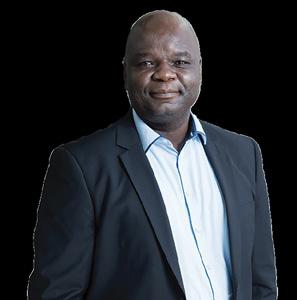
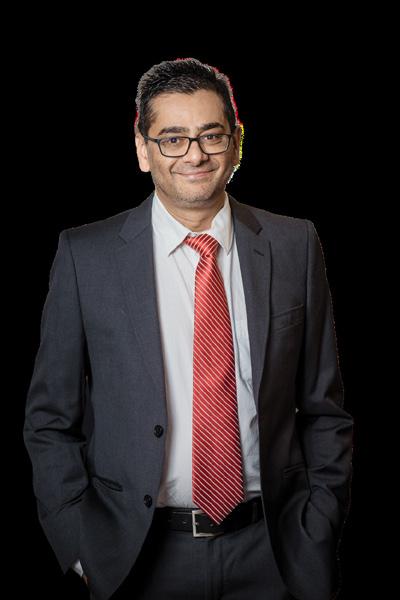




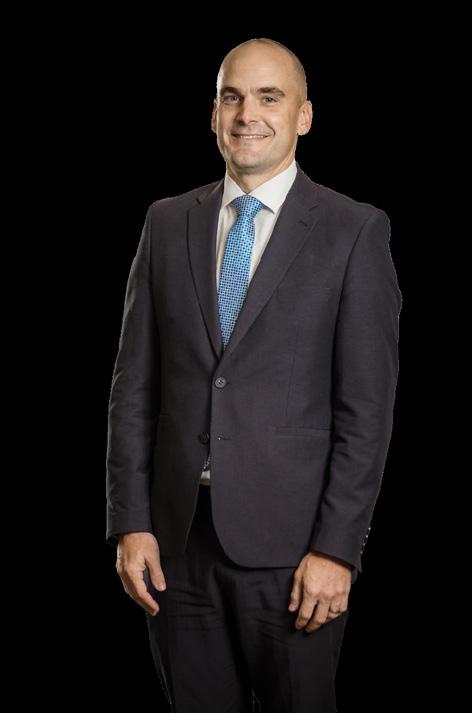






Objective: The funds in this survey are comprised of actively managed global equities, global bonds and global cash. Currently retirement funds are allowed to invest up to 45% offshore, which includes exposure to Africa. Alexforbes use Morningstar monthly close when converting to South Africa Rands (ZAR).
Performance Data In Rands (R) to the end of December 2024
Objective: The funds in this survey are comprised of actively managed global equities, global bonds and global cash. Currently retirement funds are allowed to invest up to 45% offshore, which includes exposure to Africa. Alexforbes use Morningstar monthly close when converting to South Africa Rands (ZAR).
Performance data in Rands (ZAR) to the end of December 2024
Objective: The funds in this survey are comprised of actively managed global equities, global bonds and global cash. Currently retirement funds are allowed to invest up to 45% offshore, which includes exposure to Africa. Alexforbes use Morningstar monthly close when converting to South Africa Rands (ZAR).
Risk vs Return (Calculated on 3 year performance returns)
Objective: The funds in this survey are comprised of actively managed global equities, global bonds and global cash. Currently retirement funds are allowed to invest up to 45% offshore, which includes exposure to Africa.
Alexforbes use Morningstar monthly close when converting to South Africa Rands (ZAR).
Risk vs Return (Calculated on 3 year performance returns)
Volatility vs Return Scatterplot - Global Balanced 3 Years ended 31 December 2024
Return vs Tracking Error Scatterplot - Global Balanced 3 Years ended 31 December
Volatility vs Return Scatterplot - Global Bond 3 Years ended 31 December 2024
Volatility (p.a.) (standard deviation)
Excess Return vs Tracking Error Scatterplot - Global Bond 3 Years ended 31 December 2024
Tracking Error (% p.a.) Excess Return (% p.a.)
Volatility vs Return Scatterplot - Global Property 3 Years ended 31 December 2024
(p.a.) (standard deviation)
Excess Return vs Tracking Error Scatterplot - Global Property 3 Years ended 31 December 2024
Return (% p.a.) Tracking Error (% p.a.)
Objective: The purpose of the Namibia Manager WatchTM survey is to provide clients, trustees, consultants and asset managers with objective and meaningful performance and risk comparisons of portfolios within balanced and specialist mandates.
performance history
Objective: The purpose of the Namibia Manager WatchTM survey is to provide clients, trustees, consultants and asset managers with objective and meaningful performance and risk comparisons of portfolios within balanced and specialist mandates.
Objective: The purpose of the Namibia Manager WatchTM survey is to provide clients, trustees, consultants and asset managers with objective and meaningful performance and risk comparisons of portfolios within balanced and specialist mandates.
*No performance history





Alexforbes Investments Survey — a five-time award-winning team — recognised as the Best Investment Survey Provider in Africa at the 2023 Africa Global Fund (AGF) Service Providers Awards in New York.
Investment intelligence that bridges continents – connect with Alexforbes today!

For more information, contact Don Andrews at andrewsdo@alexforbes.com or managerwatch@alexforbes.com





As the only South African investment survey provider covering all asset classes, we empower you with specialised investment data. Explore our products at https://myapi.alexanderforbes. co.za/content/download/afinvestments/ industrysurveys?path=Alexander%20 Forbes%20Database%20Fees.pdf



Subscribe to our service to receive underlying investment data!





Risk vs Return Scatterplot on Best Investment View Namibia Manager Watch – 3 Years ended 31 December 2024
Objective: The funds in this survey are comprised of actively managed African equity assets. Currently retirement funds are allowed to invest up to 45% offshore, which includes exposure to Africa. Alexforbes use Morningstar monthy close when converting to South Africa Rands (ZAR).
Objective: The funds in this survey are comprised of actively managed African equity assets. Currently retirement funds are allowed to invest up to 45% offshore, which includes exposure to Africa. Alexforbes use Morningstar monthy close when converting to South Africa Rands (ZAR).
Risk vs Return (Calculated on 3 year performance returns)
Volatility vs Return scatterplot - Including
(standard
Excess Return vs Tracking Error scatterplot - Including SA and Excluding SA 3 Years ended 31 December 2024
Excess Return (% p.a.) Tracking Error (% p.a.)

Mpho Molopyane Alexforbes Chief Economist


The 2025 outlook is murky, with significant policy changes on the horizon from the new United States (US) administration.
Nonetheless, we expect slowing but still solid global growth, with wide variations and a non-zero chance of a US recession.
We anticipate the disinflation trend to continue and central banks to ease policy rates gradually towards neutral or below neutral where growth is weaker.
There is a high degree of uncertainty around the outlook, with risks tilted to the downside.
Global equity returns will likely be supported by an improvement in earnings, however, returns could be challenged by rich valuations. Meanwhile, fiscal policy changes under newly-elected governments could push bond yields higher.
The 2025 outlook is murky, with material policy changes on the horizon from the new US administration. While we are clear which policies are likely to be prioritised during Trump’s second term in office, there remains uncertainty over the timing and extent to which his election campaign policies will be implemented.

While the stability of the Government of National Unity (GNU) will likely continue to be tested, we remain of the view that common interest will keep the key central parties working together.
Domestic prospects are looking up, driven by a recovery in private consumption and investment as well as easing supply-side constraints.
With inflation projected to remain around the South African Reserve Bank’s (SARB) 4.5% mid-point target, we expect the repo rate to be reduced by a further 25 basis points (bps) this year, following the 25bps cut at the January Monetary Policy Committee meeting.
Improving fundamentals bode well for local assets, though bond yields are not expected to decline much further following recent strong gains.
Moreover, it is also unclear what retaliatory measures other nations will enforce in response to Trump’s protectionist policies. This makes it challenging to calibrate the impact of the anticipated policy shifts.
Our baseline view is that we are likely to see major policy announcements with tamer policies than those campaigned on being implemented to avert an adverse supply shock. Tariffs are likely to be scaled and scoped on a product-by-product basis, with tight immigration controls aimed at curbing significant flows rather than large-scale deportations. Policy implementation is also expected to be slow, given legislative complexities and the slim majority the Republicans have in Congress.
The rationale for our view is that large-scale and widespread tariffs would also hurt US industries that rely on intermediate imported goods in their production. Moreover, excessive tariffs would increase the price of imported goods and be inflationary, which would go against Trump’s election campaign promises to lower high living costs. However, even in our middleof-the-road scenario, we still expect higher tariffs and tighter immigration controls, which are likely to induce a supply shock and be inflationary. The negative shock is likely to be tempered by expansionary fiscal policies and deregulation.
Overall, this leaves us with slowing but still solid global growth amid wide dispersions in performance, with a non-zero risk of a US recession. In the January World Economic Outlook (WEO), the International Monetary Fund (IMF) said it expects global output to expand by 3.3% in 2025 and 2026, which is more-or-less in line with 2024’s 3.2% growth. However, at 3.3%, the pace of expansion is below the historical 2000- 2019 average of 3.7%.
Among advanced economies, growth in the US is expected to remain robust, averaging 2.7% in 2025, slightly softer than the 2024 estimate of 2.8%. Employment gains remain volatile, though the three-months- moving average (3mma) and wage growth still points to a cooling labour market. This should continue to support growth, albeit with some
softening expected. Growth in the euro area and the UK is expected to gradually increase to 1.0% and 1.6%, respectively, supported by lower inflation and easier financial conditions. In the UK, the fiscal impulse is also expected to be positive, driven by higher government spending as outlined in last year’s October budget.
Growth in emerging markets is expected to be steady just above 4% over 2025-2026 and around 4.5% in China. The overall outlook for China remains relatively unchanged, with growth expected to maintain a downward trajectory due to mounting external headwinds and lacklustre domestic demand as the ongoing correction in the property sector continues to weigh on sentiment. We expect authorities to focus on stabilising growth around 4.5-5%, rather than reflating the economy.
On the inflation side, the disinflation trend is expected to continue as labour markets and wage growth continue to ease. However, the pace of decline is expected to be even slower, with inflation remaining sticky above central bank targets in major advanced economies. Headline inflation in the US is projected to average 2.6% in 2025 and 2026, down from 3.0% in 2024. In the Eurozone and the UK, inflation is expected to average 2.1% and 2.5%, respectively in 2025 before easing further to 2.1% and 2.0%, respectively in 2026.
While inflation is projected to remain sticky above the 2% target, we expect central banks in major economies to continue with monetary policy normalisation,
easing policy rates gradually towards neutral or below neutral where growth is weaker. With the US economy still firing on all cylinders, we expect the US Fed to pause the easing cycle in the first half of 2025 and cut by 50bps in the second half of the year. In Europe, following the 25bps cut in January, we expect the ECB to likely ease rates by an additional 75bps in 2025 to support growth. The BoE on the other hand, is likely to continue cutting gradually, easing by about 50-75bps in 2025 as it balances growth and inflation risks. The BoJ remains an outlier, with a further 75bps worth of tightening expected this year. Emerging market central banks seem to have limited room for further easing, given inflation risks from currency weakness.
Domestic prospects are looking up. While the stability of the GNU will likely continue to be tested, we remain of the view that common interest will keep the key central parties working together. We continue to expect that the multiparty government will lead to increased oversight and a more efficiently run state, with the reform agenda enjoying support.
Improved business sentiment, along with stabilising electricity supply and greater investment prospects due to increased third-party participation in network industries, bodes well for growth. We also expect household consumption to benefit from lower inflation and interest rate cuts amid steady wage growth and employment gains. Moreover, the South African Group of Twenty (G20) presidency is likely to provide a muchneeded lift to the country’s tourism sector.
Overall, we expect real GDP growth to rise from an estimated 0.7% in 2024 to 1.5% in 2025 and further to 1.8% in 2026. Some analysts are more upbeat, expecting growth to rise above 2% this year already.
After averaging 4.4% in 2024, inflation is forecast to average 4.0% in 2025. The benign inflation outlook is premised on an expectation that food prices will remain subdued as agricultural output improves following a change in weather patterns from El Nino to La Nina. With inflation projected to remain around the SARB’s 4.5% mid-point target, we expect the repo rate to be reduced by a further 25bps this year, following the 25bps cut at the January MPC meeting. This would bring the cumulative cuts to 100bps over this easing cycle.
Risks to the inflation outlook are tilted upward. Geopolitical tensions could lead to bouts of currency weakness and oil spikes, which could lift the inflation trajectory. Domestic pressures could also stem from steeper electricity tariffs and water prices as well as municipal rates and taxes. A manifestation of these risks could see the SARB cut by less than we currently anticipate. These concerns are reflected in the current market pricing of just 18bps worth of additional easing this year.
Progress on fiscal consolidation and exiting grey listing encouraging
Turning to the fiscal outlook, debt stabilisation remains in sight, though the unexpected bailouts for state-owned enterprises and municipalities could derail consolidation efforts. The sovereign rating outlook upgrade by Standard & Poor’s (S&P) last year November is encouraging and shows progress in the right direction.
Progress on exiting the grey list has been positive, with 20 of the 22 action items required for exiting the grey list have been deemed largely or fully addressed. This leaves just two action items to resolve. Given this progress, we think there is a chance that the country can be removed from the grey list by end 2025.
Investors have to contend with heightened trade policy uncertainty and geopolitical tensions and thereby market volatility. Extreme policy shifts in the US could induce a much more severe supply and inflation shock on the global economy, while emerging markets remain vulnerable to the risk of a more pronounced economic slowdown in China. Notwithstanding, the macroeconomic outlook points to a still supportive environment for risk assets, with broadening performance opportunities as interest rates further decline.

Global equity returns will likely be supported by an improvement in the level of earnings growth and dividends. However, returns could be challenged by rich valuations (that are above long-term averages) in some regions. The outlook for global fixed-income assets is less optimistic. While declining short-term interest rates could help drive yields lower, recent government changes following elections suggest that some countries may adopt expansionary fiscal policies, which could push yields higher. Improving fundamentals bode well for local assets, though bond yields are not expected to fall by much more following recent strong gains.

US dollar likely facing a year of two halves
On the currency front, the US dollar is expected to experience a year of two halves. It is likely to remain strong in the first half as the US Fed pauses easing, widening interest rate differentials with much of the developed world. This, coupled with trade tensions, is expected to support dollar strength. However, as the US Fed resumes easing in the second half, a declining interest rate environment is likely to be bearish for the US dollar, with mild depreciation anticipated later in the year.
Trade policy uncertainty and geopolitical tensions positive for gold
Industrial commodities are expected to remain flat due to lacklustre demand, while oil prices have to contend with increasing supply. The outlook for gold remains bullish, with the metal likely to benefit from geopolitical tensions and continued central bank buying.
You’re in the right place for your institution’s offshore investing.
Invest with Alexforbes

Every investment is personal, filled with purpose and expectation.
Tremendous time, effort and sacrifice goes into every rand that builds towards your organization’s investment destination, which means that choosing the right investment partner matters just as much.
The right partner who knows how to find, assess and select only the best investment minds, locally and globally. A place where you have no doubt that you’re in safe hands, and where any investment solution is possible.
With Alexforbes, no matter your investment destination, you’re in the right place.




Premal Ranchod Head Alexforbes Investments ESG Research
Over the past three decades, responsible investing has shifted from a niche practice to a core investment philosophy. Initially rooted in exclusionary screening— where investors avoided so-called ‘sin stocks’ like tobacco and firearms—responsible investing has evolved into a sophisticated framework integrating environmental, social and governance (ESG) factors into investment decisions.
By the early 2000s, ESG analysis became more mainstream, bolstered by regulatory frameworks, investor advocacy and landmark initiatives like the United Nations’ Principles for Responsible Investment (PRI). South Africa, a pioneer in responsible investing, introduced key regulations in Pension Fund management, Regulation 28, which emphasised ESG considerations in pension fund allocations.
The past decade has seen a surge in ESG-focused funds and impact investing strategies, along with the risk of window dressing or, as it is aptly termed, greenwashing. Banks have innovated with sustainability-linked finance products as companies gear their balance sheets for a sustainable growth path.
Yet, despite prying its way into mainstream investment finance, responsible investing has faced significant tensions around its implementation. Particularly around the risk-return trade-off and ideological narratives that complicate integration.
From an investment standpoint, the central concern for asset managers remains the risk-return dynamic. Traditional financial theory asserts that markets efficiently price risk by incorporating all available information into asset valuations. However, ESG risks—particularly climate risk and governance failures—often challenge this assumption due to their complex, long-term nature.
For example,
climate transition risks –such as stranded assets in fossil fuel industries –are still not fully priced into markets, leading to potential misallocations of capital.
Hard-nosed investors prefer to continue investing the way they always have, ignoring or even denying such risks. Such an attraction to arbitrage and excesses at all costs has contributed to significant changes in the policy landscape, often rolling back progress on climate change.
The mantra
‘What gets measured, gets managed’
(Peter Drucker) comes to mind.
Similarly, social risks—such as labour disputes or regulatory crackdowns on diversity policies – are difficult to quantify but can have material financial consequences. Proponents argue that this focus on social issues was necessary due to the consequences of late-stage capitalism. Yet, because these risks often manifest over longer horizons, markets tend to discount them in favour of short-term earnings momentum. In fairness, there has been a rollback of diversity and inclusion practices as the terms have been distorted.

The role of ideological narratives in ESG disclosure
A significant headwind to ESG integration has been the increasing politicisation of responsible investing. In the US, for instance, ESG has become a flashpoint in political discourse, with some states outright banning its use in public pension funds, citing concerns over ‘woke capitalism’. When companies promote progressive social causes primarily as a marketing strategy – rather than to remove glass ceilings or barriers to entry—there is often an element of profiteering, benefitting a select elite without meaningful change and sometimes even through discriminatory practices. Ideological pushback often stems from the perception that ESG practices impose non-financial objectives on markets, distorting capital allocation.
Could this be a market correction mechanism at play?

Research suggests that college entry requirements and corporate diversity initiatives have, paradoxically, resulted in discriminatory practices and at the exclusion of merit.
Investors who integrate ESG factors are often accused of compromising returns for ethical considerations, but this overlooks the reality that ESG integration is fundamentally about managing risk-adjusted returns. Evidence suggests that companies with strong ESG credentials demonstrate lower volatility, better risk mitigation and more resilient financial performance in downturns. However, this is not a one-size-fits-all outcome, as sectoral dynamics, policy shifts and market timing all play critical roles.
Critics argue that ESG frameworks are inconsistent, with some rating agencies assigning wildly different scores to the same companies. Additionally, the inclusion of subjective elements—such as board diversity quotas or funding by corporates of political parties—raises concerns about whether ESG criteria reflect material investment factors or broader social engineering efforts.
These ideological debates risk undermining ESG’s core purpose such as enhancing transparency, mitigating financial risk and improving accountability. When ESG discussions veer into culture war territory, investors lose sight of its fundamental role in identifying risks that traditional financial analysis may overlook. The challenge for asset managers is to remove moral hazard narratives from ESG investing and reposition it as a data-driven, financially material investment tool.
Responsible investing is a long-term necessity; while deregulation is a short-term political play—investors must navigate both.
Looking forward, responsible investing must navigate a complex terrain where financial markets, regulatory frameworks and political ideologies intersect. The focus should be on aligning ESG integration with established investment risk mechanisms rather than allowing it to be side-lined as a discretionary moral stance.
To achieve this, investors must advocate for standardised ESG disclosures, clearer materiality assessments and stronger corporate accountability mechanisms. Regulatory clarity – such as South Africa’s evolving stance on ESG disclosures in pension funds – will play a key role in ensuring ESG remains an investment discipline rather than a political battleground.
In the end, responsible investing will sustain its momentum only if it demonstrates its value in managing financial risk and return. While impact investing and values-based exclusions have their place, mainstream ESG integration must focus on market efficiency, resilience and long-term risk management – not ideological positioning or social engineering.

The next decade will determine whether responsible investing becomes ‘investing’! Whether it can maintain its trajectory as a credible investment discipline or it becomes another casualty of market inefficiencies and political manoeuvring is worth the watch.

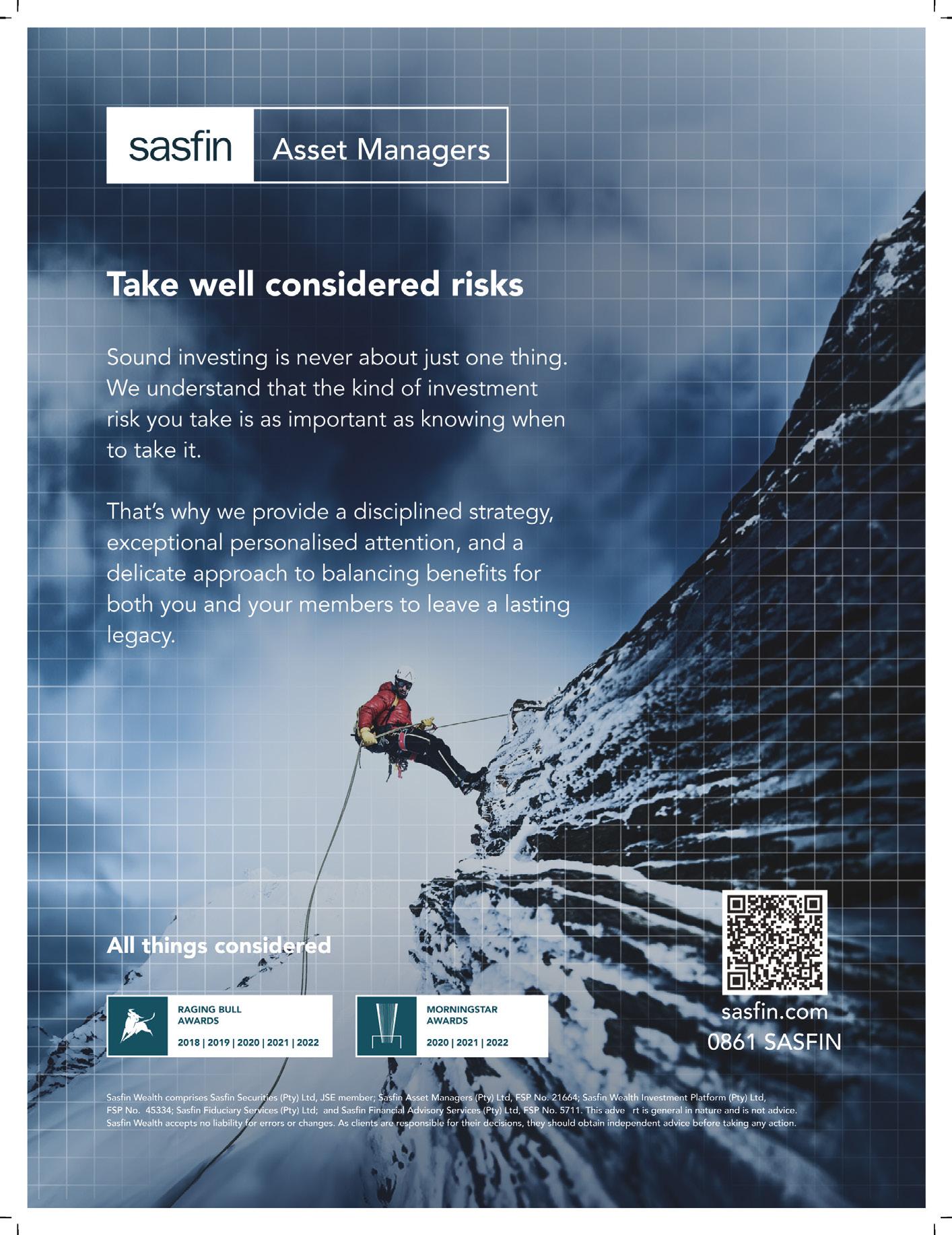

Lee Swan Head of Sustainability, Alexforbes
Sustainability reporting has evolved significantly over the past two decades—from a voluntary corporate social responsibility (CSR) exercise to a global regulatory imperative. This transformation is driven by rising stakeholder demand for transparency, growing environmental and social risks, and the need for alignment with both national and international sustainability goals. The increasing number of global disclosure frameworks marks the emergence of a new era in corporate reporting.
A key milestone was the 2023 release of IFRS S1 and S2 by the International Sustainability Standards Board (ISSB). IFRS S1 outlines general requirements for sustainability-related financial disclosures, while IFRS S2 focuses on climate-related risks, aligning with the Task Force on Climate-related Financial Disclosures (TCFD). Together, these aim to establish a consistent global baseline, improving comparability and reliability of sustainability information.
While ISSB sets a financial materiality baseline, established frameworks like the Global Reporting Initiative (GRI) remain essential. GRI’s focus on double materiality and stakeholder impact ensures a broader view of environmental, social and governance (ESG) issues.
In South Africa, the Johannesburg Stock Exchange (JSE) supports local alignment through its 2022 Sustainability and Climate Disclosure Guidance documents. Tailored to the local context, this guidance complements international standards and promotes practical jurisdiction-specific application.
Broadening the scope: Nature and social disclosures
Beyond climate, new disclosure frameworks are emerging to address wider sustainability issues. The Taskforce on Nature-related Financial Disclosures (TNFD) provides a structure for identifying and managing biodiversity and ecosystem-related risks, supporting integration of nature into financial planning.
The Taskforce on Inequality and Social-related Financial Disclosures (TISFD) is developing guidance to help organisations report on social dependencies, impacts and risks.
These additions to the global landscape highlight the growing recognition that sustainability risks go well beyond climate change, encompassing both environmental and social dimensions.

As of April 2025, many jurisdictions—representing around 55% of global GDP—have taken steps to integrate ISSB standards into their regulatory systems.
Several African jurisdictions are exploring adoption of these standards, including:
Ghana
Authorities are actively exploring integration of the standards.
The Financial Reporting Council (FRC) and Nigerian Exchange (NGX) launched a roadmap supporting voluntary ISSB adoption from 2024–2026, with mandatory adoption set for 2027.
Kenya
The Institute of Certified Public Accountants of Kenya (ICPAK) has expressed support for adopting ISSB standards.
A Regulatory Impact Assessment (RIA), commissioned by the Department of Trade, Industry and Competition (the dtic) and led by Genesis Analytics, is underway to evaluate adoption pathways. Alexforbes in collaboration with the Companies and Intellectual Property Commission (CIPC) has now concluded the Sustainability Reporting Market Sentiment Survey aimed at gathering insight on market readiness, adoption, and implementation costs in South Africa. The findings of this survey will be published by Alexforbes in the coming months.
In February 2025, the EU introduced the Omnibus Simplification Package, aimed at easing regulatory burdens and enhancing competitiveness—especially for SMEs. It proposes amendments to directives such as the Corporate Sustainability Reporting Directive (CSRD) and the Corporate Sustainability Due Diligence Directive (CSDDD), including adjusted timelines and reporting scopes to make compliance more manageable.
Sustainability reporting is maturing rapidly. The rise of ISSB, TNFD and TISFD signals a move towards more consistent, financially relevant disclosures. At the same time, frameworks like GRI ensure that broader stakeholder impacts are addressed. Locally, the JSE guidance offers important support for South African entities seeking to meet both domestic and international expectations.
As the landscape evolves, organisations should adopt integrated reporting strategies that draw on multiple frameworks. Staying proactive and informed is crucial—not only to ensure compliance, but to remain competitive in a sustainability-aware global market.

In a rapidly evolving investment landscape, ESG is no longer just about compliance – it’s about gaining a competitive edge.
By embedding Paragon Impact’s SDG Impact Grading technology into investment strategies, managers gain deeper insights into the real-world impact of their portfolios; enhancing risk management, enhancing reporting, and balancing sustainability impact with financial performance.
Our SDG Grading system transforms complex ESG data into actionable intelligence, enabling investors to optimise returns while aligning with global sustainability goals.

Don Andrews Head of the Alexforbes Investment Survey Team
Alexforbes continues to strengthen its position as a leading provider of investment insights with the launch of its Retail Manager Watch™ and Discretionary Fund Managers (DFM) Manager Watch™ surveys. These initiatives build on the success of the Institutional Manager Watch™ series, reinforcing Alexforbes’ commitment to equipping independent financial advisers (IFAs) and investors with comprehensive, up-to-date performance data.
Launched in July 2024, the Retail Manager Watch™ series of surveys focuses on multi-asset class investments, segmented into low equity, medium equity, and high equity categories, following the Association for Savings and Investment South Africa (ASISA) guidelines. Covering 21 asset managers and 43 portfolios, the June 2024 surveys offer in-depth insights into investment strategies and risk management, helping IFAs and investors make informed decisions.
The surveys’ significance is highlighted by the R574 billion in assets under management (AuM) it represents. Additional surveys on Bonds, Equity, Money Market, and Property are planned for publication.
Announced in January 2025, the DFM Manager Watch™ survey introduces a structured approach to benchmarking Discretionary Fund Managers (DFMs). It categorises multi-asset portfolios into low equity, medium equity, high equity, and global-only balanced groups, with an additional global-only equities category.
The October 2024 survey featured four DFMs managing 41 portfolios with a total AuM of R45 billion. By November 2024, more DFMs will be included, expanding the survey’s coverage and influence.
Strengthening industry transparency
Both surveys address key challenges in the investment industry, including performance measurement, transparency, and benchmarking. By providing detailed, structured data, Alexforbes continues to support better investment decision-making.
To be added to the Alexforbes Institutional, Retail, or DFM Manager Watch™ survey distribution lists, please email managerwatch@alexforbes.com.


After 2-3 years, the oysters are meticulously harvested and the pearls are carefully extracted.
Every investment has a maturity date, where the return is the reward for your patience.




Investment management fees are intended to compensate investment managers for their time and skill to manage the assets of a fund, and are usually in the form of a percentage of the assets managed.
The main types of investment fees are annual base fees, with some funds charging an additional performance fee. Fees can be quoted on a fixed basis or a sliding scale. A fixed fee is a constant percentage fee charged irrespective of the value of the assets being managed. A sliding scale fee is a structure where the percentage fee charged reduces as the value of assets managed increases.
The purpose of the Alexforbes Fee Survey is to create transparency and visibility of fees charged by the investment industry for institutional pension fund mandates. The primary benefit of this survey is to provide trustees, asset consultants, and advisors with a framework to benchmark the fees that they are being charged. The data collection process involved liaising with asset managers to obtain relevant data, which was subsequently validated. The survey was conducted in November 2024 and covered twenty of the most popular pension fund mandates.

They are:
• Global Balanced, BIV, Segregated and Pooled Portfolios
• Global Absolute Return, Pooled Portfolios
• Domestic Balanced, BIV, Segregated and Pooled Portfolios
• Domestic Absolute Return, Segregated and Pooled Portfolios Class
• Domestic Equity, Segregated and Pooled Portfolios
• Domestic Property, Segregated and Pooled Portfolios
• Specialist Domestic Bond, Segregated and Pooled Portfolios
• Domestic Flexible Bond, Segregated and Pooled Portfolios
• Domestic Inflation Linked Bond, Segregated and Pooled Portfolios
• Domestic Money Market, Segregated and Pooled Portfolios
Investment management fees are intended to compensate investment managers for their time and skill to manage the assets of a fund, and are usually in the form of a percentage of the assets managed.
The managers were requested to categorise their fee structure into a standardised, sliding scale format, utilising distinct asset under management (AuM) bands:
• R0-50 million
• R51-100 million
• R101-150 million
• R151-250 million
• R251-500 million
• R500 + million
Where relevant the fee charged for international assets was collected.
Limitations of study:
• The universe was restricted to asset managers who participate in the Alexforbes surveys.
• Participation in the survey was voluntary, and therefore selection may be biased
• Historically, asset managers reported the fees for domestic and international assets within their global balanced funds separately. However, beginning in 2021 and persisting into 2022, the majority of asset managers have shifted towards reporting a total fee for their global balanced portfolios. This change complicates the comparison of international asset fees against those from prior years. The trend of consolidating fees into a total figure by asset managers has continued into 2024.
• We only received one submission for Global Absolute Return Segregated Portfolio.
• The standardisation of fees in AuM categories may not reflect an individual manager’s fee scale.
To access the fee survey: https://investdata.alexforbes. com/insights-publications/industry-surveys
Global BIV, Segregated Portfolios
Global BIV, Pooled Portfolios
Global Absolute Return, Pooled Portfolios
Domestic BIV, Segregated Portfolios
Domestic BIV, Pooled Portfolios
Domestic Absolute Return, Segregated Portfolios
Domestic Absolute Return, Pooled Portfolios
Domestic Flexible Bond, Pooled Portfolios
Single Asset (Specialist) Mandate
Inflation linked Bond, Pooled Portfolios
Domestic Money Market, Segregated Portfolios
Domestic Money Market, Pooled Portfolios

The harvested pearls are sorted and prepared for jewellery or other uses.
A well-managed portfolio, with strong performance and aligned with clients’ investment and financial goals, achieves the desired results.




An actively managed investment objective that seeks consistent, positive returns regardless of whether markets are rising or falling; and without reference to a benchmark index for comparison. While not all absolute return strategies are alike, typically, the goal is to produce returns in excess of the inflation rate and/or cash that can be measured by the consumer price index (CPI) while protecting against capital losses.
An investment approach that relies on the belief that it is possible to outperform the market. Typically an actively managed fund would select asset classes and investment securities that are expected to perform better than the market or benchmark.
The difference in returns between a fund and its benchmark at each point in time.
The New York-based Africa Global Funds organization provides complete coverage and analysis of the biggest players in African investment space. Drawing on an intense dialogue with a constantly expanding group of key decision-makers in the industry, we cover traditional and alternative asset classes of the African asset management space.
A popular index used to benchmark performance for South African fixed income (bond) portfolios. This index represents a weighted basket of the top 20 South African bonds ranked dually by market capitalisation and liquidity.
Alpha
Alpha is a measurement of the performance of an investment portfolio against a benchmark. The alpha is the return the fund or portfolio makes, relative to the return of the benchmark.
A popular index used to benchmark performance for South African equity portfolios. This index represents a weighted basket of 99% of the full market capitalisation of all eligible companies listed on the main board of the JSE subject to free float and liquidity criteria. The index can be divided by size into the Top 40, Mid Cap and Small Cap Indices.
Artificial intelligence
Artificial intelligence is the development of computer systems that can perform tasks normally requiring human intelligence, such as understanding language, recognising images, and making decisions.
Categories of investments that behave similarly and are subject to similar market forces. Major asset classes include equities (shares), fixed income (bonds and cash), commodities and property.
The market value of assets held by an investment manager on behalf of clients.
An actively managed investment framework where the asset allocation, strategies employed and risk assumed to achieve the specified investment objective is delegated to the investment manager.
An independently constructed reference (usually a publicly available index) that sets an objective rate of return (the neutral position) that should be used to test the effective implementation of an investment strategy. A good benchmark will also be representative of the asset class or mandate and is investable itself.
A particular tendency, trend, or opinion, especially one that is preconceived or unreasoned.
A black swan is an unpredictable event that is beyond what is normally expected of a situation and has potentially severe consequences. Black swan events can cause catastrophic damage to an economy by negatively impacting markets and investments, but even the use of robust modelling cannot prevent a black swan event.
Debt issued by a government or a company, typically promising regular payments of coupons (interest) on specified dates with a final capital payment on the maturity date. It can be viewed as a loan given to bond issuers by bond holders.
BSAGI (Barclays SA Government Inflation Linked Index)
A popular index used to benchmark performance for local inflation linked bonds. This index represents a weighted basket of SA Government issued inflation linked bonds calculated by Barclays Capital.
CAPPED SWIX (FTSE JSE CAPPED SWIX ALL SHARE INDEX)
A popular index used to benchmark performance for South African equity portfolios. This index includes 99% of the full market cap of eligible JSE listed companies. The constituents are weighted by applying a SWIX free float which represents the proportion of a constituent’s share capital on the South African share register. In addition each constituent weight is capped at 10% at each quarterly review.
Climate change is a complex, multi-dimensional process that will affect the global environment in many ways. Largely driven by carbon dioxide and other greenhouse gases produced by agriculture and industry, it poses an existential threat to human society. Many governments across the world have announced plans to curb greenhouse gas emissions and reduce their climate footprints.
A group of similarly managed portfolios within a single investment manager and typically defined within the investment managers’ GIPS™ policy.
The extent to which the returns of all portfolios within a composite differ. It can be measured in different ways, including: the difference between the maximum and the minimum return (range); the difference between the 1st and 3rd quartile (inter-quartile range); the standard deviation of returns, or mean absolute deviation.
A compound rate of return that expresses the relationship between the initial investment and the returns earned on that investment, incorporating future returns which are earned on past returns. For most investors, this is the most accurate way to calculate their returns as most investors will leave their returns in an investment.
A bond’s coupon rate is the rate used to calculate the periodic interest payments paid by the issuer of a bond to its owner at the time of payment. It is set when the bond is issued and is usually related to the nominal value of the bond at the time of issuance.
CPI is an estimate of the inflation rate measuring the price of goods and services in the economy.
A type of bond issued by a non-governmental entity. These bonds typically carry a higher risk than government guaranteed bonds, e.g. bonds issued by companies.
Credit risk refers to the risk that a bond issuer will default on any type of debt by failing to make required payments, i.e. probability that the bond issuer will make debt payments late.
The Code for Responsible Investing in South Africa (CRISA) gives guidance on how the institutional investors should execute investment analysis and investment activities and exercise rights so as to promote sound governance.
The CRISA code requires asset managers that adopt it to publicly disclose their policies and methods of incorporating ESG factors into the investment process.
The cumulative return for a portfolio or an asset is the cumulative compound return over the full length of a specified time period. The percentage measure of this return is not annualised and as such represents the actual total return of the portfolio or asset over the period. By annualising the percentage figure, one can calculate the average annual return of the portfolio or asset over the period.
Data analytics is the process of examining datasets to draw conclusions and insights by carefully studying and analysing the data using methodical analysis techniques.
Employer and employee contribute an agreed amount every month. When the employee retires, the accumulated capital amount and growth are used to purchase a pension from a third-party supplier.
A developed or an advanced market in investing terms is a country that is most developed in terms of its economy and financial markets.
A portfolio strategy to reduce exposure to risk by investing in various instruments or asset classes, such as equities, bonds and property that are unlikely to move in the same direction at the same time. In other words, the process of spreading investments among different instruments or markets to reduce the overall risk or loss if one performs poorly.
A drawdown is a peak-to-trough decline during a specific period for an investment, trading account, or fund. A drawdown is usually quoted as the percentage between the peak and the subsequent trough. If a trading account has R10 000 in it, and the funds drop to R9 000 before moving back above R10 000, then the trading account witnessed a 10% drawdown.
The Dow Jones Industrial Average (DJIA) is a stock market index that tracks the performance of 30 major companies listed on US stock exchanges, similar to South Africa’s JSE Top 40 Index, which measures the performance of the 40 largest companies on the Johannesburg Stock Exchange.
Duration is a measure of interest rate risk for a bond or portfolio of bonds. It measures the sensitivity of the value of a bond – or collection of bonds – to a change in interest rates.
The effective rate converts the compounding rate of return into a simple rate of return. This means that the effective rate of return can simply be multiplied by the investment period to calculate the cumulative rate of return.
Emerging markets are economies that show some of the traits of developed economies but aren’t quite at the same level yet.
A major category of asset class, which is a commonly used name for ordinary shares, representing ownership in a company. The owner of the share (shareholder) will generally be able to vote on company issues; and will be entitled to dividends declared.
Environmental, social and governance (ESG) criteria are a set of standards for a company’s operations that socially conscious investors use to screen potential investments. Environmental criteria consider how a company performs as a steward of nature. Social criteria examine how it manages relationships with employees, suppliers, customers, and the communities where it operates. Governance deals with a company’s leadership, executive pay, audits, internal controls, and shareholder rights.
A major category of asset class that includes cash, nominal bonds, inflation linked bonds and credit instruments.
Frontier markets are less advanced capital markets in the developing world. Frontier markets are countries that are more established than the least developed countries (LDCs) but still less established than the emerging markets. Frontier markets are also known as “pre-emerging markets.
Geopolitical risk is the risk an investment’s returns could suffer as a result of political changes or instability in a country. Instability affecting investment returns could stem from a change in government, legislative bodies, other foreign policymakers or military control.
The Global Investment Performance Standards (GIPS) is a set of standardized, industry-wide ethical principles that guide investment firms on how to calculate and present their investment results to prospective clients.
Greylisting essentially means that a country has been recognized as having compliance issues but has committed to address strategic inadequacies to counter money laundering and terrorist financing within a given timeframe.
Greenwashing is when a company or organisation falsely claims to be environmentally friendly to mislead customers or investors, even though its actions do not genuinely help the environment.
Halal refers to something that is permissible according to Islamic law. To be considered acceptable, a business transaction must be based on an Islamic contract form, distribute risk and return among the parties to the contract, and avoid unacceptable activities, including interest and uncertainty. To determine whether a stock is halal, Muslim investors evaluate companies based on levels of debt, interest income, and liquidity, as well as participation in prohibited activities.
Haram describes anything that is unacceptable under Shari’ah law. It is considered inappropriate for a Muslim investor to profit from any activity that violates Islamic principles. Certain industries, including alcohol, pornography, gambling, pork, and conventional financial services, are inherently haram.
When economists speak about headwinds, they refer to factors that might impede or inhibit economic growth or progress.
These are usually absolute return investment strategies that use alternate investment techniques (e.g. short positions, leverage, etc.). The funds can be used in a Regulation 28 strategy but are not compliant as standalone products.
Impact investing refers to a general investment strategy that not only generates financial returns but also creates a positive social or environmental impact.
The increase in the general price level in the economy. The inflation rate is calculated by defining a basket of goods and services that a typical consumer would consume and calculating a weighted average of the prices of those goods to arrive at a single percentage number, e.g. CPI.
An inflation linked bond is a type of bond where the final capital payment is adjusted by the inflation rate for the term of the bond.
Information Ratio
A risk-adjusted measure of return calculated by dividing the active return of a fund by the tracking error of the fund.
A statistical measure representing the difference between the medians of the upper half and the lower half of a ranked set of data.
Established in 1995 and led by investors responsible for assets under management of over $59 trillion, ICGN advances the highest standards of corporate governance and investor stewardship worldwide in pursuit of long-term value creation, contributing to sustainable economies, societies, and the environment.
International Monetary Fund (IMF)
The International Monetary Fund (IMF) is an international organization that aims to promote global economic growth and financial stability, encourage international trade, and reduce poverty.
Investment Manager
An organisation that invests assets on behalf of third parties for a fee.
Investment Philosophy
A framework of principles and way of thinking about markets that underlies the beliefs and approach of an investment manager. It drives which asset classes and investment securities to include in the investment portfolio. It can be used to describe the style of a manager.
Johannesburg Securities Exchange (JSE)
Currently the only South African Exchange which offers a centralised trading platform to capital markets across a diverse set of investment securities, in particular, equities, bonds, and derivatives.
King IV™
King IV™ is structured as a Report that includes a Code, with additional, separate sector supplements for SME’s, NPO’s, State-Owned Entities, Municipalities and Retirement Funds. The King Code™ contains both principles and recommended practices aimed at achieving governance outcomes
Kingmaker
An asset class or factor (such as ESG considerations) which has great influence over others’ succession within the portfolio, without being the most viable or obvious option.
Long position
It is a positive holding in a portfolio that results from buying investments in the portfolio. This is done when the manager believes that the value of this investment security will increase in the future and he will be able to sell it for a higher price and create a profit. This is directly opposite to a short position.
Leverage
It is a holding in a portfolio that results from using complex alternate trading techniques that allows the manager to buy investment securities with money borrowed or by utilising collateral as a means of payment.
Loadshedding
In South Africa, shedding load is done to prevent the failure of the entire system when the demand for electricity strains the capacity of Eskom’s power generating system. Load shedding is characterized by periods of widespread national-level rolling blackouts.
Lower Quartile
A statistical measure representing the bottom 25% of observations in a ranked set of data.
Machine Learning
Machine learning is a branch of artificial intelligence where computers learn and improve from experience without being explicitly programmed for each task.
Market Capitalisation
The value of a company’s issued share capital, i.e. share price multiplied by number of shares on the stock exchange.
Maximum Drawdown
A risk of loss measure that is calculated as the maximum loss incurred by an investment over a stated time horizon.
Mean Absolute Deviation
A measure of dispersion calculated as the average of the absolute differences between each value and the mean in a data set.
Median
A statistical measure representing the midpoint value in a ranked set of data.
Mittelstand
This refers to a group of unique businesses in Germanspeaking countries that are very successful, and are usually capable of surviving economic turbulence. These businesses are generally small and mediumsized enterprises.
Modified Duration
Modified duration is a type of duration measure which measures the approximate sensitivity of the value of a bond – or collection of bonds - to a change in interest rates, assuming the cash flows remain unchanged. As such, it is only appropriate for bonds with no embedded options.
Money Market
Market for short-term loans and deposits with a maturity less than one year.
Money Weighted Return
Measures internal rate of return, to identify when cash flows are entering or exiting an investment by discounting cash flows to the beginning value.
Murabahah
Murabahah refers to an instalment credit agreement for the sale of tangible goods. The seller acquires an asset, which the buyer agrees to purchase at some point in the future. The seller is entitled to a profit, as long as the exact mark-up is disclosed in the contract. Payments may be spread out over time.
MSCI World Index
The Morgan Stanley International World Index is maintained by MSCI Inc., formerly Morgan Stanley Capital International, and is used as a common benchmark for ‘world’ or ‘global’ stock funds intended to represent a broad cross-section of global markets. The index includes a collection of stocks of all the developed markets in the world, as defined by MSCI.
Peer Group
Usually refers to a set of similarly managed investment mandates.
An implementation approach of a specialist fund strategy where the need to outperform the benchmark is not required in order to meet the investment objective. The specialist investment strategy is invested in passive funds. Not to be confused with Passive Fund Management.
An investment approach that seeks to replicate the performance and risk of an investable benchmark/ index. Typically the investment portfolio will mirror the holdings of a market index. Passive managers believe that this is a more efficient and cost effective way of accessing the risk and return profile of an asset class or investment style.
Funds from many individual investors that are aggregated for the purposes of investment, as in the case of a retirement fund. Investors in pooled fund investments benefit from economies of scale, which allow for lower trading costs, diversification and professional fees. Pooled funds are generally backed by a policy of insurance.
Purification in a Shari’ah investing context refers to getting rid of unacceptable profits. Shariah prohibits Muslims from profiting, even indirectly, from unacceptable practices, so investors are expected to account for and give away any income derived from riba or other haram sources.
Purchasing power parity (PPP) is an economic theory that compares different countries’ currencies through a “basket of goods” approach. According to this concept, two currencies are in equilibrium or at par when a basket of goods (taking into account the exchange rate) is priced the same in both countries.
A statistical measure representing the difference between the maximum and minimum values in a ranked set of data.
Realpolitik is a political system that’s not based on beliefs, doctrines, ethics, or morals, but rather on realistic, practical ideas.
An alternate name for a portfolio using an absolute return investment strategy.
Regulation 28
Investment limits set by the Pensions Fund Act on retirement funds to protect against imprudent investment decisions.
Risk is a very generic term used to calculate either variation in returns or as a measure of losses. E.g. Volatility is usually used as a proxy for risk that measures variation. Maximum Drawdown is usually used as a proxy of risk that measures loss.
The return differential between the risk-free asset (cash) and a risky asset.
A time series of a rate of return with the same time horizon for a portfolio, asset class or investment security. It represents a realistic way of reporting returns which takes into account different market and economic environments.
The Sarbanes-Oxley Act (SOX) is a US law passed in 2002 to improve financial transparency and prevent corporate fraud by requiring stricter rules for company financial reporting and internal controls, similar to South Africa’s King IV Report on Corporate Governance, which promotes accountability and ethical business practices.
A diagram illustrating the relationship between two sets of quantities using dots that can be used to generate a line of best fit.
All instruments within a particular area of activity or industry for an asset class. The JSE defines sectors as Financials, Basic Materials, Oil and Gas Producers, Industrials, Consumer Goods, Healthcare, Consumer Services, Telecommunications and Technology. The Bond sectors are Government, Parastatals, State Owned Enterprises, Corporates and Other.
A sell-off occurs when a large volume of shares are sold in a short period of time, causing the price of a share to fall in rapid succession. As more shares are offered than buyers are willing to accept, the decline in price may accelerate as market psychology turns pessimistic.
Shari’ah is the divine law of Islam, derived from the Qur’an and other holy texts, which serves as a moral guide to Muslims. The Shari’ah sets guidelines for what is right and wrong in everyday life, including standards for food, family life, and business transactions.
A simple rate of return that expresses the relationship between the initial investment and the rate at which returns are earned on that investment, ignoring any ability for further returns to be earned on past returns. This is only an accurate reflection of the investor’s return when all returns are paid out from the portfolio when they are earned.
Segregated portfolios are not pooled with those of other investors and so the performance and expenses of an investment account are not affected by the activities of any other investors in the portfolio.
Risk adjusted return ratio of return per unit of risk. It is calculated as excess return (over the risk-free return) divided by volatility.
It is a negative holding in a portfolio that results from using complex alternate trading techniques that allows the sale of an investment security that is not owned. This is done when the manager believes that the value of this investment security will decrease in the future and he will be able to buy it back later for a lower price and create a profit. This is directly opposite to a long position.
A risk adjusted return measure similar to the Sharpe ratio. The Sortino ratio measures risk as the volatility of the returns below a certain target (0% in the case of Capital Loss and inflation in the case of Inflation).
Socially responsible investing is the practice of investing money in companies and funds that have positive social impacts. Investors should keep in mind that socially responsible investments are still investments, and be sure to weigh the potential for return into their decisions.
An investment approach where the asset allocation, investment strategies employed and risk assumed to achieve the specified investment objective are explicitly defined and not delegated to the investment manager. A specialist investment strategy may be implemented actively or passively.
A mandate given to an investment manager to manage specific asset classes (equities, bonds, etc.) or investment strategies (hedge funds, impact investing, etc.) as part of a specialist fund strategy.
Stagflation is an economic cycle characterized by slow growth and a high unemployment rate accompanied by inflation. Economic policymakers find this combination particularly difficult to handle, as attempting to correct one of the factors can exacerbate another.
A popular index used to benchmark performance for South African cash portfolios. This index represents a weighted basket of money market instruments of different investment maturities such as NCDs and Call Deposits.
An investment technique that sets the medium to long term allocation to asset classes which will primarily meet the investment objectives within a defined level of risk. Used primarily in specialist fund strategies.
Sustainability focuses on meeting the needs of the present without compromising the ability of future generations to meet their needs. The concept of sustainability is composed of three pillars: economic, environmental, and social—also known informally as profits, planet, and people.
The Sustainable Development Goals are a collection of 17 global goals designed to be a roadmap to achieve a better and more sustainable future for all”. The SDGs, set in 2015 by the United Nations General Assembly and intended to be achieved by the year 2030, are part of UN Resolution 70/1, the 2030 Agenda.
A popular index used to benchmark performance for South African equity portfolios. This index represents a shareholder weighted basket of companies listed on the main board of the JSE with all constituents down weighted by applying an alternate free float known as the SWIX free float.
Sukuk are asset-backed securities designed to provide a relatively fixed stream of investment income without violating the Islamic prohibition on interest. Instead of interest payments, sukuk investors receive a pass-through of income generated by the underlying assets. Sukuk are a Shari’ah-compliant tool for raising capital and may be structured around a variety of Islamic contracts.
An investment technique that periodically adjusts the SAA to take advantage of opportunities in the market in order to enhance returns in the short term; and maximise risk adjusted returns.
The time remaining on the life of a bond, i.e. time remaining for the bond to be fully repaid.
The compound rate of return over a stated evaluation period of one unit of money initially invested in the portfolio or strategy.
The time period relating to the rate of return measurement calculation. It can also reference the time set to meet a certain investment objective or goal.
A popular index used to benchmark performance for South African large equity portfolios. This index represents a weighted basket of the forty largest companies which are constituents of the FTSE/ JSE All Share Index, ranked by full market capitalization. Interestingly the number of constituents can exceed 40, as some companies issue multiple share types (e.g. Investec, Mondi).
Measure of variability of returns relative to benchmark or index. It is usually expressed as an annualised standard deviation of active returns.
South Africa has introduced a new retirement fund legislation to enhance the financial security of its citizens. The two-pot system in this legislation divides retirement savings into two parts: one for immediate access in emergencies and the other preserved for retirement.
UN Principles for Responsible Investment (UNPRI) are a set of six principles that provide a global standard for responsible investing as it relates to environmental, social and corporate governance (ESG) factors. Organizations follow these principles to meet commitments to beneficiaries while aligning investment activities with the broader interests of society.
The top 25% of observations in a ranked set of data.
The United Nations Global Compact is an initiative that supports global companies that are committed to responsible business practices in the areas of human rights, labour, the environment, and corruption. This UN-led initiative promotes activities that contribute to sustainable development goals to create a better world.
Volatility
Is a proxy for risk and is calculated as the annualised standard deviation of monthly returns.
Yield
Return on a security usually expressed in percentage terms.
Yield Curve
The relationship between time to maturity and yield to maturity of bonds.
Yield to Maturity
An estimate of the rate of return that would be earned on a bond if the bond is held to its maturity date. It assumes that interest earned is reinvested in the bond.
6 Directory of asset managers who have a presence in South Africa
After the pearls are processed, the oysters are analysed to evaluate the conditions that influenced their growth.
A similar review helps identify strengths and areas for improvement, ensuring better decisions for future investments.




www.10x.co.za
Company details
FAIS FSP registration number:
28250
Switchboard: +27 21 412 1010
General email: investment@10x.co.za
Address:
Office 01401, 14th Floor, The Terraces, Cnr Bree and Waterkant Street, Cape Town, 8001
Compliance officer name:
Mandla Hendricks +27 68 570 7261
Investment philosophy
There are 4 pillars to 10X’s investment philosophy that drive an iterative process that continually reviews and evaluates the appropriateness of the portfolio asset allocation. The CIO and Head of Multi Asset Funds are responsible for the decision making.
1) Setting of the strategic asset allocation
The process starts with the evaluation of long-term asset class characteristics covering return, risk and co-variance to determine the long-run average asset allocation that would have delivered the investment objectives with the highest probability over the long-term.
The current market environment and prevailing valuations are then evaluated against the historical norms which produced the long-run average asset allocation in order to account for differences between the current environment and the average over the long-term. These differences systematically adjust the long-term forward-looking estimate of the asset class characteristics, which are used to establish the optimum mix of assets.
2) Implementing asset class exposure
Once the asset allocation is determined, it is implemented, where possible, through thoughtful risk managed index exposure. The focus is on ensuring diversification and risk management at a security level, so that each asset class return can be generated in a manner that minimises idiosyncratic risk.
Where an index does not exist, a representative basket is built which seeks to achieve the same objective of delivering a targeted asset class return whilst minimising idiosyncratic risk.
Low turnover exposure is preferred to high turnover exposure to reduce slippage and transaction costs.
3) Stress testing portfolios
The portfolio is run through different market scenarios which stress test the portfolio to understand how it might react under stress scenarios. Any additional risks that are not being compensated for in terms of excess return are addressed.
4) Monitoring and evaluation
10X consistently monitors and evaluates the portfolios against any chances in the market environment or prevailing valuations. Portfolio changes are not constrained to arbitrary fixed time horizons but are managed in response to significant changes in forwardlooking long-term expected returns.
A monthly asset allocation committee conducts a formal review of the portfolio composition against the current market environment and portfolio objectives to ensure the validity of the asset allocation.
FAIS requirements
Who is your FAIS complaints officer?
Lindsey Bagus
Please provide the link to the complaints policy on your website: https://assets.ctfassets.net/ yqvz0zwovkbq/6XexvDj8qAyXhb43mAoy63/ dc1d47d9ca741d88b782ab74a23cc7ba/ComplaintsPolicy-and-Procedure.pdf
Ownership
What is the ownership structure of the company? Privately Owned Company
Who are the directors of the company?
CEO: Tobias van Heerden, Non-executive chair: Sonja De Bruyn, Director: Samer Salty, Non-executive directors: Marc Balkin, Buchert Johannes, Kelly Ford, Hedrik Beets and Jacob Myburgh
Do staff and management have an interest in ownership?
Please provide the percentage held by staff and management: Yes, 8.3%.
History
When was the company established? 2005/09/21
List of mergers and acquisitions that have taken place since being established: 10X completed the acquisition of 100% of CoreShares Holdings (Pty) Ltd and its subsidiaries on 31 December 2022
B-BBEE credentials
Are you B-BBEE accredited? Yes
What is your B-BBEE status? Level 4
By whom have you been accredited? EVASA (Empowerment Verification Agency of South Africa)
Date of accreditation: 2024-12-09
GIPS
Are you GIPS compliant? No
Are you GIPS verified? No
By whom have you been verified? –
Date of verification: –Expiry date of verification: –
Investment mandates
What are your total assets under management as owned by South African clients only?
R58.8 billion
Please detail the mandates you currently manage and the size of each of these mandates:
Institutional: R30.0 billion
Retail: R28.8 billion
Life: –
Other: -
Key investment personnel
Size of investment team: 12
Anton Eser CIO
BCom, CFA
23 years of industry experience
3 years with the firm
Christopher Eddy
Head: Multi Asset Funds
MCom, CFA
11 years of industry experience
9 years with the firm
www.36one.co.za
Company details
FAIS FSP registration number: 19107
Switchboard: +27 10 501 0250
General email: support@36one.co.za
Address:
140 West Street, Sandton, 2196 Compliance officer name:
External: Outsourced Compliance Services (Pty) Ltd Internal: Grant Mann
Investment philosophy
Our investment approach is centred on the principle that the market does not efficiently price securities at all times. We therefore believe that stock selection through bottomup fundamental analysis can outperform over time. We follow the same investment approach across all our funds. Although we focus primarily on bottom-up fundamental research, macroeconomic views play a supporting role in portfolio construction.
FAIS requirements
Who is your FAIS complaints officer?
Outsourced Compliance Services (Pty) Ltd (“OCS”)
Grant Mann (Internal)
Please provide the link to the complaints policy on your website: https://www.36one.co.za/legal/complaints-resolutionprocedure
What is the ownership structure of the company?
36ONE Asset Management (Pty) Ltd is wholly owned by Cy Jacobs and Steven Liptz. The founders are responsible for the two key areas of the business under which all business activities fall. Cy Jacobs is responsible for investment related matters and Steven Liptz is responsible for all non-investment areas. Who are the directors of the company?
Directors: Cy Jacobs and Steven Liptz Interest in ownership? Please provide the percentage held by staff and management: All team members receive a modest base salary. Majority of compensation is derived from bonuses which are linked to the performance of the funds. Bonuses are paid quarterly.
When was the company established?
2004
List of mergers and acquisitions that have taken place since being established: –
B-BBEE credentials
Are you B-BBEE accredited? No
What is your B-BBEE status? Non-compliant By whom have you been accredited?Date of accreditation: -
Are you GIPS compliant? No
Are you GIPS verified? No By whom have you been verified? –
Date of verification: –
Expiry date of verification: –
What are your total assets under management as owned by South African clients only?
R48.4 billion
Please detail the mandates you currently manage and the size of each of these mandates:
Institutional:R27.2 billion
Retail: R9.6 billion
Life: R2.0 billion
Other: R9.7 billion
Key investment personnel
Size of investment team: 14
Cy Jacobs CIO
BCom (Hons), CA(SA)
28 years of industry experience 20 years with the firm
Steven Liptz Head: Operations BCom
27 years of industry experience 20 years with the firm
Evan Walker
Portfolio Manager
MBA, BCompt (Hons)
25 years of industry experience 12 years with the firm
www.abax.co.za
Company details
FAIS FSP registration number: 856
Switchboard: +27 21 670 8983
General email: matthew@abax.co.za
Address:
The Oval, 1 Oakdale Road, Newlands, 7700
Postnet Suite #255, Private Bag X1005, Claremont Cape Town, South Africa, 7735 Compliance officer name: eComply
Nick Howse +27 82 885 8598
Investment philosophy
We believe that markets are inefficient and that through research we can identify companies that will show superior earnings growth over the longer term which is not reflected in current valuations. Similarly we believe we can identify companies where current valuations overvalue their future earnings growth potential.
FAIS requirements
Who is your FAIS complaints officer?
Tim Howse and Nick Howse (eComply)
Please provide the link to the complaints policy on your website: https://www.abax.co.za/contact/
Ownership
What is the ownership structure of the company?
Abax is a standalone entity and is not part of a bigger group of companies. Abax is, however, an affiliate of Affiliated Managers Group (AMG), a US listed company. Who are the directors of the company?
Executive: Anthony Sedgwick, Marius van Rooyen, Edel Little, Lebo Thubisi
Alternate Directors (Executive): Omri Thomas, Steve Minnaar
Independent Non-executive Director: Estelle Cloete
Do staff and management have an interest in ownership?
Please provide the percentage held by staff and management:
Yes, staff and management own / control 100% of the voting rights and an approximate 75% financial interest.
When was the company established?
2003
List of mergers and acquisitions that have taken place since being established:
None, however,in December 2015 Abax concluded a transaction with AMG (Affiliated Managers Group) who aquired an approximate 25% financial interest in Abax.
B-BBEE credentials
Are you B-BBEE accredited? Yes
What is your B-BBEE status? Level 2
By whom have you been accredited? MSCT BEE Services
Date of accreditation: 2024-09-17
GIPS
Are you GIPS compliant? No. However, Abax uses Confluence (StatPro) to calculate the performance of client portfolios (at the client’s request). Are you GIPS verified? No
By whom have you been verified? –
Date of verification: –
Expiry date of verification: –
Investment mandates
What are your total assets under management as owned by South African clients only?
R78.9 billion
Please detail the mandates you currently manage and the size of each of these mandates:
Institutional: R45.1 billion
Retail: R32.1 billion Life: –
Other: R1.7 billion
Key investment personnel
Size of investment team: 16
Steve Minnaar
CIO, Head: Research PhD (Eng), BCom (Hons), CFA 27 years of industry experience 15 years with the firm
Marius van Rooyen Head: Equities MBA, BEng, BProc 28 years of industry experience 21 years with the firm
Anthony Sedgwick CEO BBusSci 31 years of industry experience 21 years with the firm
Omri Thomas Senior Equity Portfolio Manager CA(SA), CFA 27 years of industry experience 18 years with the firm
Matthew de Wet Head: Product Development BSc (Act Sc), CFP, CFA 26 years of industry experience 9 years with the firm
Philip Liebenberg
Head: Fixed Income and Multi-Asset Strategy PhD (Chem Eng), CFA 25 years of industry experience 7 years with the firm
Company details
FAIS FSP registration number: 27126
Switchboard: +27 21 204 6066/8
General email: funds@aeonim.co.za
Address:
4th Floor, The Citadel, 15 Cavendish Street, Claremont, 7708 PO Box 24020, Claremont, 7735 Compliance officer name: Independent Compliance Services Christelle Granger: +27 21 975 6597
Investment philosophy
Active Equity: Track record of over 15 years. Style is that of Growth At a Reasonable Price (GARP). Their adaptation of the GARP style seeks to combine the best of growth and value investing, by buying companies with long-term sustainable growth rates greater than that implied by the company’s market valuation.
Balanced Fund (Global Exposure): Track record of 10 years. Invests in a range of income and protected equity assets and strategies to protect 90% of capital over a rolling 12-month period and capture as much of the upside of equity and fixed income markets as possible. The fund invests in domestic and global equities, fixed income as well as derivatives instruments. It uses a systematic return modelling process and a disciplined investment methodology.
FAIS requirements
Who is your FAIS complaints officer?
Asief Mohamed
Please provide the link to the complaints policy on your website: https://www.aeonim.co.za/funds/complaints-policy/
Ownership
What is the ownership structure of the company?
70% owned by the ZAR Trust, 30% owned by Aeon IM Staff
Who are the directors of the company?
Asief Mohamed, Tshego Dichabe (née Modise), Nocamagu (Cami) Mbulawa, Thulani Madinginye, Réjane Woodroffe and Rahma Leuner.
Do staff and management have an interest in ownership?
Please provide the percentage held by staff and management:
Staff and management own 44% of the shares. And, up to 30% of pre-tax profits is distributed to all staff every 6 months.
When was the company established?
2005
List of mergers and acquisitions that have taken place since being established: –
Are you B-BBEE accredited? Yes
What is your B-BBEE status? Level 1
By whom have you been accredited?
BDO Verification Services (Pty) Ltd
Date of accreditation: 2025-12-02
Are you GIPS compliant? Yes
Are you GIPS verified? No
By whom have you been verified? –
Date of verification: –
Expiry date of verification: –
Investment mandates
What are your total assets under management as owned by South African clients only?
R23.3 billion
Please detail the mandates you currently manage and the size of each of these mandates:
Institutional: R21.5 billion
Retail: R1.9 billion
Life: –
Other: –
Key investment personnel
Size of investment team: 10
Asief Mohamed CIO
BCom, CA(SA), CFA 36 years of industry experience 19 years with the firm
Jay Vomacka Senior Portfolio Manager MSc (Ind Eng), BSc (Eng), Certified Financial Technician (IFTA, London), CFA 19 years of industry experience 12 years with the firm
Muneer Ahmed Portfolio Manager, Analyst BCom, CA(SA), CFA 13 years of industry experience <1 years with the firm
www.afcinvestment.co.za
Company details
FAIS FSP registration number:
706
Switchboard: +27 82 655 3784
General email: dee@afcinvestment.co.za
Address: 18 Katzenellenbogen Road, Noordhoek 7985
Compliance officer name: Moonstone
Deon Harmse: +27 21 554 5745
Investment philosophy
AFC employs a multi-disciplinary approach to asset management, involving fundamental as well as behavioural (technical) forms of analysis. AFC believes that in excess of 90% of performance is derived from correct asset allocation and industry selection, so the majority of analysis time is spent on understanding the macroenvironment. The investment style is thematic, with stock selection reflecting those themes believed to be impacting the investment environment at any point in time. As thematic investing relies on understanding the changes within economies, its implementation will result in portfolio structures that are not carbon copies of market indices. A by-product of the thematic and behavioural approach is that views will sometimes be taken against market consensus, but resulting in superior performance at lower than average risk.
FAIS requirements
Who is your FAIS complaints officer?
DS Campouroglou
Please provide the link to the complaints policy on your website: www.afcinvestment.co.za
Ownership
What is the ownership structure of the company?
100% owned by IA Mackenzie Family Trust Who are the directors of the company?
DS Campouroglou, IA Mackenzie
Do staff and management have an interest in ownership?
Please provide the percentage held by staff and management: No
When was the company established? 1960s
List of mergers and acquisitions that have taken place since being established: Independent until 1998 when acquired by Appleton/PSG. Independent again in 2005.
B-BBEE credentials
Are you B-BBEE accredited? No
What is your B-BBEE status? None
By whom have you been accredited? –Date of accreditation: –
GIPS
Are you GIPS compliant? No
Are you GIPS verified? No
By whom have you been verified? –
Date of verification: –Expiry date of verification: –
Investment mandates
What are your total assets under management as owned by South African clients only?
R993.0 million
Please detail the mandates you currently manage and the size of each of these mandates:
Institutional: R562.0 million
Retail: R432.0 million
Life: –Other: –
Key investment personnel
Size of investment team: 2
DS Campouroglou
CIO
BSc
45 years of industry experience
28 years with the firm
IA Mackenzie
Head: Equities
BA (Econ)
40 years of industry experience
34 years with the firm
www.alexforbes.com
Company details
FAIS FSP registration number: 711
Switchboard:
+27 11 505 6000
Fax number: +27 11 263 2316
General email:
AFInvestclientservices@alexforbes.com
Address:
115 West Street, Sandown, Sandton, 2196 PO Box, 786055, Sandton, 2146
Compliance officer name:
Amanda Erasmus +27 11 269 2244
Investment philosophy
At Alexander Forbes Investments, our investment solutions have always been built on the foundation of our multimanager proposition. This allows clients to invest in a complementary blend of the smartest strategies and most talented asset managers from one single, competitivelypriced investment solution. This approach aims to ensure that investment portfolios achieve superior returns over time at below-average risk.
FAIS requirements
Who is your FAIS complaints officer?
Amanda Erasmus
Please provide the link to the complaints policy on your website: https://investors.alexforbes.com/governance/
Ownership
What is the ownership structure of the company?
Limited is a wholly owned subsidiary of Alexander Forbes Limited. The ultimate parent company of Alexander Forbes Investments Limited is Alexander Forbes Group Holdings Limited (AFGHL), a public-listed company on the Johannesburg Stock Exchange. Who are the directors of the company?
Executive Director: Mr Dawie de Villiers Directors: Mr Kuseni Dlamini, Mr Bernard Fick Independent Non-executive Directors: Mr Andile Mazwai, Ms Ndumi Medupe
Do staff and management have an interest in ownership? Please provide the percentage held by staff and management:
No – None
When was the company established? 1997
List of mergers and acquisitions that have taken place since being established: –
B-BBEE credentials
Are you B-BBEE accredited? Yes
What is your B-BBEE status? Level 1
By whom have you been accredited? AQRate
Date of accreditation: 30 June 2023
Are you GIPS compliant? No
Are you GIPS verified? No
By whom have you been verified? –
Date of verification: –
Expiry date of verification: –
Investment mandates
What are your total assets under management as owned by South African clients only?
R427.1 billion
Please detail the mandates you currently manage and the size of each of these mandates:
Institutional: R342.0 billion
Retail: R6.0 billion
Life: R52.3 billion
Other: R26.8 billion
Continued
Key investment personnel
Size of investment team: 29
Gyongyi King
CIO
BSc (Econ), CFA
28 years of industry experience 16 years with the firm
Senzo Langa
Deputy CIO: Traditional assets
BCom (Fin), MMFI, CFA
18 years of industry experience
13 years with the firm
Ernest Mabaso
Head: Multi-asset class
Manager BCom (Acc), ACMA
23 years of industry experience
16 years with the firm
Msizi Msomi
Portfolio Manager – Global & Specialist
BCom (Hons) Economics, Adv Dip Investments & Instruments
8 years of industry experience
2 years with the firm
Nkosinathi Manyongwana
Portfolio manager - Retail
PPA
15 years of industry experience 5 years with the firm
Premal Ranchod
Head: ESG research
BCom, HDip Acc, CA(SA)
15 years of industry experience 10 years with the firm
Mpho Molopyane
Chief Economist
MCom (Econometrics & Quant Econ)
11 years of industry experience 2 years with the firm
Mandisa Zavala
Head: Asset Allocation
BSc (Hons)
11 years of industry experience
3 years with the firm
www.allweather.co.za
Company details
FAIS FSP registration number: 36722
Switchboard: +27 11 722 7382
General email: info@allweather.co.za
Address:
9th Floor Katherine Towers, 1 Park Lane Wierda Valley, Sandton, 2196 Compliance officer name: Independent Compliance Services +27 21 975 6597
Investment philosophy
Our philosophy is based on the belief that the market continually and regularly misprices assets. Mispricings occur regularly because investors either underestimate risks or do not recognise potential. We try to understand these risks and appreciate the scale of opportunities better than the market does.
Significant opportunities are created for those few who are diligent with the fundamentals. Our ambition is simply to buy a share where the market has undervalued it relative to intrinsic value or to sell a share when the prevailing price is far in excess of intrinsic value. We determine a company’s intrinsic value by forecasting cash flows through financial modelling. In everything we do we exercise caution and act conservatively. We express this by including a wide margin for error in forecasting and by limiting our exposure to unquantifiable risks.
FAIS requirements
Who is your FAIS complaints officer?
Shane Watkins
Please provide the link to the complaints policy on your website: http://www.allweather.co.za/legal.html
Ownership
What is the ownership structure of the company?
50.4% owned by Zava Financial Services, 34.6% owned by Shane Watkins, 15% Staff scheme
Who are the directors of the company?
Directors: John Oliphant, Shane Watkins Non-executive director: Fulu Makwetla, Vuyokazi Nomvalo and Barbara van Metzinger
Do staff and management have an interest in ownership?
Yes
Please provide the percentage held by staff and management:
49.6% is owned by staff and management
When was the company established? 2014
List of mergers and acquisitions that have taken place since being established:
Are you B-BBEE accredited? Yes
What is your B-BBEE status? Level 1
By whom have you been accredited? Fidelity Date of accreditation: 2024-10-01
Are you GIPS compliant? Yes
Are you GIPS verified? No
By whom have you been verified? –Date of verification: –
Expiry date of verification: –
What are your total assets under management as owned by South African clients only?
R22.5 billion
Please detail the mandates you currently manage and the size of each of these mandates: Institutional: R22.5 billion
Retail: -
Life: –
Other: –
Continued
Key investment personnel
Size of investment team: 14
Shane Watkins
CIO
BBusSc (Fin), PGDA, CA(SA), CFA
28 years of industry experience
10 years with the firm
Patsy David
Head: Research
MBA, FAIS
29 years of industry experience
5 years with the firm
Sanelisiwe Tofile
Deputy CIO, Portfolio Manager
BCom (Hons), CFA
11 years of industry experience 10 years with the firm
Prince Mopai
Equity Analyst
BSc (Min and Eng)
10 years of industry experience 5 years with the firm
Chris Reddy
Portfolio Manager
BBusSc, CFA
19 years of industry experience 3 years with the firm
Cobus Cilliers
Equity Analyst
CA(SA), CAIA, CFA
16 years of industry experience 3 years with the firm
Dumisani Ndlovu
Equity Analyst
BCom (Hons—Inv Man)
9 years of industry experience 6 years with the firm
Jarrod Houston
Equity Analyst
PG Financial Planning, CFA
12 years of industry experience 4years with the firm
Richard Shepherd
Portfolio Manager
BCom (Acc), CA(SA)
23 years of industry experience 4 years with the firm
Neal Smith
Portfolio Manager
BCom (Acc), CA(SA)
25 years of industry experience 4 years with the firm
Kagiso Selolo
Equity Analyst
BCom (Acc), CA(SA)
4 years of industry experience 3 years with the firm
Nomsa Sibanda ESG Analyst
CA(SA)
6 years of industry experience 3 years with the firm
Lwando Ngwane
Equity Analyst
BSc (Hons - Mining & Eng)
6 years of industry experience 2 years with the firm
Kamogelo Mateise GEM Analyst
BCom (Finance)
1.5 years of industry experience 1 year with the firm
https://www.allangray.co.za
Company details
FAIS FSP registration number: 27145
Switchboard: +27 21 415 2300
General email: info@allangray.co.za
Address:
1 Silo Square, V&A Waterfront, Cape Town, 8001 PO Box 51318, V&A Waterfront, Cape Town, 8002 Compliance officers’ names: Ursuline Loubser and Kirk Thomas compliance@allangray.co.za
Investment philosophy
Allan Gray’s investment philosophy is valuation oriented, which means that their research is focused on identifying good-quality assets that are priced below intrinsic value. This investment philosophy is premised on their belief that the market is not always efficient or rational and that, at times, there can be significant disparities between the market price and the intrinsic business value of an investment (where intrinsic value is typically defined as the discounted value of expected future cash flows). Therefore, they buy shares when research and analysis indicate that the intrinsic value of the company exceeds its market price, with a reasonable margin of safety. These purchases are made in anticipation that the price will rise to the intrinsic value. This contrasts the ‘momentum’ approach, where a manager identifies an upward trend and follows this by purchasing the share in the belief that the trend will continue.
FAIS requirements
Who is your FAIS complaints officer?
Darren Maree
Please provide the link to the complaints policy on your website: https://www.allangray.co.za/globalassets/legal/ complaints-process.pdf
Ownership
What is the ownership structure of the company?
Allan Gray is a privately-owned company. Who are the directors of the company?
Duncan Artus, Mahesh Cooper, William Gray*, Ian Liddle (Chairman)*, Nazeem Martin*, Jithen Pillay, Ziphezinhle Sikhakhane* (*Non-Executive Directors)
Do staff and management have an interest in ownership?
Please provide the percentage held by staff and management:
Past and present executive directors are shareholders of Allan Gray Group Proprietary Limited. Additionally, a 14% equity stake in Allan Gray Proprietary Limited has been reserved for current and future staff.
When was the company established? 1973
List of mergers and acquisitions that have taken place since being established: -
B-BBEE credentials
Are you B-BBEE accredited? Yes
What is your B-BBEE status? Level 1
By whom have you been accredited?
AQRate Verification Services
Date of accreditation: 2024-05-08
Are you GIPS compliant? Yes
Are you GIPS verified? Yes
By whom have you been verified? Ernst & Young Inc.
Date of verification: 2024-09-27
Expiry date of verification:
The assurance report confirms compliance with the Global Investment Performance Standards (GIPS) for the period from 1 January 2023 to 31 December 2023.
Investment mandates
What are your total assets under management as owned by South African clients only?
R561.3 billion
Please detail the mandates you currently manage and the size of each of these mandates:
Institutional: R127.0 billion
Retail: R369.9 billion
Life: R64.5 billion
Other: -
Key investment personnel
Size of investment team: 30
Duncan Artus
CIO, Portfolio Manager, Analyst
BBusSc (Hons), CMT, CFA
25 years of industry experience 24 years with the firm
Tim Acker
Portfolio Manager, Analyst MAcc, CA(SA), CFA 12 years of industry experience 12 years with the firm
Pieter Koornhof
Portfolio Manager, Analyst MSc, MBA, CA(SA), CFA 11 years of industry experience 11 years with the firm
Rory Kutisker-Jacobson
Portfolio Manager, Analyst BBusSc, CFA
16 years of industry experience 16 years with the firm
Sean Munsie
Portfolio Manager, Analyst BAcc (Hons), CA(SA), CFA 12 years of industry experience 12 years with the firm
Thalia Petousis
Portfolio Manager, Analyst MCom (Stats), CFA
13 years of industry experience 9 years with the firm
Jithen Pillay
Portfolio Manager, Analyst BBusSc, CA(SA), CFA
9 years of industry experience 9 years with the firm
Siphesihle Zwane
Portfolio Manager, Analyst BCom (Hons)
7 years of industry experience 7 years with the firm
www.aluwani.com
Company details
FAIS FSP registration number:
46196
Switchboard: +27 21 204 3800
General email: info@aluwani.com
Address:
EPPF Office Park, 24 Georgian Crescent East, Bryanston East, Gauteng, 2152 Compliance officer name: Nick Howse, eComply +27 21 204 3800
Investment philosophy
We seek to provide sustainable risk- adjusted returns over the long term. The philosophy is based on three principles:
● Risk-adjusted returns can be maximised by actively extracting value from as many alpha sources as possible
● Focused diversification of risk across these sources should generate consistent performance in all market conditions
● Incremental, consistent alpha that compounds over time ensures a low volatility portfolio that generates competitive active return in a predictable fashion, through all stages of the investment cycle
FAIS requirements
Who is your FAIS complaints officer?
Nick Howse
Please provide the link to the complaints policy on your website: https://www.aluwani.com/compliance
Ownership
What is the ownership structure of the company?
Privately owned investment manager
Who are the directors of the company?
Sibusiso Mabuza, Gillian Raine, Louise Oertel, Alexia Shuenyane, Mologadi Magagane, Bafana Patrick Mathidi
Do staff and management have an interest in ownership?
Please provide the percentage held by staff and management: Yes, 52% of the company is held by management and staff.
History
When was the company established?
2015
List of mergers and acquisitions that have taken place since being established:
ALUWANI Capital Partners acquired 100% shareholding of Afena Capital in February 2023.
B-BBEE credentials
Are you B-BBEE accredited? Yes
What is your B-BBEE status? Level 1
By whom have you been accredited?
Renaissance SA Ratings
Date of accreditation: 2024-01-30
GIPS
Are you GIPS compliant? No
Are you GIPS verified? No
By whom have you been verified? –
Date of verification: –
Expiry date of verification: –
Investment mandates
What are your total assets under management as owned by South African clients only?
R125.7 billion
Please detail the mandates you currently manage and the size of each of these mandates:
Institutional: R119.8 billion
Retail: R5.8 billion
Life: –
Other: R78.0 million
Key investment personnel
Size of investment team: 26
Patrick Mathidi
Head: Multi Asset Class Strategies
MSc (Fin), BCompt (Hons)
27 years of industry experience
9 years with the firm
Mila Mafanya
Head: Equity
BBusSci, CFA
20 years of industry experience 1 year with the firm
Conrad Wood
Head: Fixed Income Strategies
BCom (Econ), CFA
30 years of industry experience
9 years with the firm
Mishnah Seth
Head: Investments
BAcc (Hons), CFA
21 years of industry experience
9 years with the firm
www.argonassetmanagement.co.za
Company details
FAIS FSP registration number: 835
Switchboard: +27 21 670 6570
Fax number: +27 21 671 8252
General email: information@argonasset.co.za
Address:
1st Floor, Colinton House, The Oval, 1 Oakdale Road Newlands, 7700 PO Box 23254, Claremont, 7735
Compliance officer name: eComply
Tim Howse and Nick Howse: +27 21 671 8162
Investment philosophy
Argon Asset Management is an investment management firm that is committed to internationally accepted best practices and global standards. They have a highperformance culture that filters through to the long- term sustainable success of their investment portfolios. They follow a bottom-up, fundamental research, valuation-based equity investment process. Multi-asset class investments follow an active tactical asset allocation approach, with a strong capital protection underpin and volatility-enhancing strategies that generate extra yield. They also follow a multi-strategy fixed income process, diversifying sources or risk and return with a mix of duration, credit and yield curve tactical trades.
FAIS requirements
Who is your FAIS complaints officer?
Tim Howse and Nick Howse
Please provide the link to the complaints policy on your website: http://www.argonassetmanagement.co.za/aboutargon/ regulatory-details/
Ownership
What is the ownership structure of the company?
Independent, no group structure
Who are the directors of the company?
Executive Director: Dr Manas Bapela
Non-Executive Directors: Aziza Galiel, CA(SA), CFA; Tasneem Sulaiman
Do staff and management have an interest in ownership?
Please provide the percentage held by staff and management: Management and staff 82%
When was the company established? 2005
List of mergers and acquisitions that have taken place since being established: –
B-BBEE credentials
Are you B-BBEE accredited? Yes
What is your B-BBEE status? Level 1
By whom have you been accredited?
AQRate Verification Services
Date of accreditation: 2024-11-15
Expiry date of verification: 2025-11-14
GIPS
Are you GIPS compliant? Yes
Are you GIPS verified? Yes
By whom have you been verified? SNG Grant Thornton
Date of verification: 2023-06-05
Expiry date of verification: –
What are your total assets under management as owned by South African clients only?
R31.1 billion
Please detail the mandates you currently manage and the size of each of these mandates:
Institutional: R30.0 billion
Retail: R1.1 million
Life: –
Other:–
Key investment personnel
Size of investment team: 19
Dr Manas Bapela CEO, CIO
PhD (Maths), MSc (Maths—cum laude), Global Investment Risk Mgt
27 years of industry experience 15 years with the firm
Krishna Sathee
Head: Fixed Income
BSc (Hons—Stats)
28 years of industry experience 15 years with the firm
Mark Ansley
Head: Equities
BCom (Hons)
31 years of industry experience 9 years with the firm
Maitse Motsoane
Head: Multi Asset Class
BCom (Hons—Invest Man cum laude), BCom (Fin Man Sc)
9 years of industry experience 6 years with the firm
www.ashburtoninvestments.co.za
Company details
FAIS FSP registration number:
40169
Switchboard: +27 11 282 8800
Fax number: +27 11 282 1619
General email:
InstitutionalDistribution@ashburton.co.za
Address:
3rd Floor, 2 Merchant Place, 1 Fredman Drive, Sandton, 2196 PO Box 650149, Benmore, 2010
Compliance officer name:
Nombulelo Seeco +27 11 685 5573
Investment philosophy
The principal investment philosophy for Ashburton Investments is to provide investors with real returns over the long term, by investing in assets which trade below their intrinsic value while seeking diverse sources of return in order to diversify risk. We use both top-down proprietary macro data and bottom-up valuation data to make decisions on asset allocation.
Our investment approach is built on three key pillars:
Macro
We use global macro-economic factors to identify trends that inform our investment decisions and identify asset classes which are under-priced.
Quality
We invest in quality assets - companies that are of substance and sustainability, robust through economic cycles and best equipped to generate long-term sustainable revenues. We focus on three main factors: high profitability, strong balance sheet and low earnings cyclicality. We prefer market leaders with strong management operating in industries with high barriers to entry and structural growth.
Focused
While diversification is a key tenet at asset class level, at a stock selection level, we would rather own concentrated exposures of quality companies than own diluted exposures of lower quality companies. However, where we don’t have a stock selection edge, we don’t hesitate to incorporate index funds in order to capture market beta.
FAIS requirements
Who is your FAIS complaints officer?
Nombulelo Seeco
Please provide the link to the complaints policy on your website: http://www.ashburtoninvestments.com/docs/defaultsource/documents/legal/fais-complaints-resolutionpolicy.pdf?sfvrsn=2
Ownership
What is the ownership structure of the company?
Ashburton is 100% owned by the FirstRand Group
Who are the directors of the company?
Patrice Rassou, Meghna Ravjee and Mduduzi Ndlovu Do staff and management have an interest in ownership? Please provide the percentage held by staff and management:
Ashburton is 100% owned by the FirstRand Group. Staff ownership is at FirstRand Group level
History
When was the company established?
Ashburton Investments forms the fourth pillar of the FirstRand Group alongside RMB, Wesbank and FNB. Ashburton is 100% owned by FirstRand Limited.
Ashburton’s history dates to the genesis of Ashburton Jersey in 1982. FirstRand is committed to having a prominent asset manager as part of its financial service offering. Therefore, after RMB Asset Management was spun off to Momentum, a process was started to consolidate all remaining Group asset management functions under Ashburton. The businesses that were consolidated under the Ashburton brand are, the investment management arm of RMB Private Bank, BJM Multimanager, Ashburton Jersey and the retail stockbroking business of FNB. The business in its current form has been in operation since 2013.
The investment process for our Houseview Balanced Portfolios was however established in 1999 and has therefore been in existence for 19 years initially as Ansbacher, then as RMB Private Bank and currently as Ashburton Investments. It should be noted that, as a new generation manager, we seek to provide investors with access to more sources of return, the opportunity to achieve greater portfolio diversification and, consequently, to improve overall portfolio efficiency and hence the Balanced Portfolios have evolved over time.
At the end of 2015 Ashburton acquired Atlantic Asset Management, a boutique Fixed Interest house, with a view to expanding on our Fixed Interest capabilities.
The consolidation of Group asset and wealth management functions was completed in October of 2017 with the transfer of the Global Markets Fund Solutions business from RMB to Ashburton. This consolidation resulted in a common investment philosophy and common systems being applied across the various investment solutions.
Ashburton is a pure asset management company managing pooled and segregated, tailor-made mandates for clients across various risk profiles with solutions ranging from secure low risk portfolios to high -risk mandates split across various asset classes.
In September 2024, Ashburton partnered with Morgan Stanley Investment Management (MSIM). The Global Leaders Equity capability will be executed through this partnership.
List of mergers and acquisitions that have taken place since being established: At the end of 2015 Ashburton Investments acquired Atlantic Asset Management.
Continued
B-BBEE credentials
Are you B-BBEE accredited? Yes
What is your B-BBEE status? Level 1
By whom have you been accredited?
Mosela Rating Agency
Date of accreditation: 2024-09-16
GIPS
Are you GIPS compliant? Yes
Are you GIPS verified? No
By whom have you been verified? –
Date of verification: –
Expiry date of verification: –
Investment mandates
What are your total assets under management as owned by South African clients only?
R126.5 billion
Please detail the mandates you currently manage and the size of each of these mandates:
Institutional: R81.2 billion
Retail: R39.0 billion
Life: –
Other: R6.4 billion
Key investment personnel
Size of investment team: 32
Patrice Rassou
CIO
MSc (Econ), MBA, CA
33 years of industry experience
5 years with the firm
Jarred Sullivan
Global Multi-Asset Investment Strategist and Portfolio Manager
MCom Economics, CFA, CQF
10 years of industry experience
4 years with the firm
Albert Botha
Head: Fixed Income Portfolio Management
BCom, AIA
19 years of industry experience
9 years with the firm
Charl de Villers
Head of Equities and Portfolio Manager
MBA, B-Tech (Elect & Electro Eng), CFA
21 years of industry experience
3 years with the firm
Santhuri Thaver
Head of Credit and Portfolio Manager
BAcc, CA (SA), CFA
20 years of industry experience
6 years with the firm
Lesiba Ledwaba
Head of Property and Portfolio Manager
BCom (Accounting)
21 years of industry experience
13 years with the firm
Sydney Matladi
Head of Liability Driven Investments and Portfolio Manager
MFin, MBA, FRM
13 years of industry experience 9 years with the firm
Vicki Tagg
Head of Indexation and Portfolio Manager
BCom (Hons), (CA) SA
25 years of industry experience 8 years with the firm
Robert Nagel
Portfolio Manager
BCom (Hons) CA (SA)
28 years of industry experience 9 years with the firm
Tshepo Shabalala Portfolio Manager
BAccSci, HdipAcc, CA (SA)
9 years of industry experience 3 years with the firm
Tlhohonolofatso Komako Portfolio Manager
BSc(Hons) Maths & Statistics
9 years of industry experience 3 years with the firm
Uma Vijayan Portfolio Manager
MSc in Chemical Engineering, FRM, CFA
9 years of industry experience 2 years with the firm
Mushaathama Motepe Portfolio Manager
BBusSci, MMFI, CFA
13 years of industry experience 11 years with the firm
Tsepo Moteuli Portfolio Manager
BSc(Hons) Actuarial Science & Statistics, MFin (Maths) 15 years of industry experience 6 years with the firm
Daniel Masvosvere Portfolio Manager
MFin & Law, LLM,LLB, CFA
8 years of industry experience 3 years with the firm
Kathy Davey Portfolio Manager
BCom (Accounting and IT), MCom, CFA
18 years of industry experience 12 years with the firm
Mathew John
Head of Quantitative Research and Data Science
MSc Electrical Engineering, CQF
13 years of industry experience
5 years with the firm
https://www.aylett.co.za
Company details
FAIS FSP registration number: 20513
Switchboard: +27 21 673 1460
General email: clientservices@aylett.co.za
Address:
5th Floor Mariendahl House, Newlands on Main Main Road, Newlands, Cape Town, 7708 Compliance officer name: Bert Ellmann +27 21 673 1475
Our philosophy is quite straightforward in that we are rational in our thinking. We follow a bottom-up and benchmark-agnostic approach when investing and this allows us to source prime assets that showcase long-term opportunity and viability. To us, investing wisely when the time is right is a strategy that far surpasses attempting to forecast the economy. We follow this strategy by first seeking successful and sustainable business models and then narrowing them down to those with attractive valuations. This order matters to ensure that we purchase quality assets rather than merely mispriced ones.
In addition, our commitment to our clients is to deliver longterm capital preservation and growth. This requires patience and a forward-looking perspective. Another pivotal factor that we consider is risk which we define as the permanent loss of capital. By investing with an appropriate margin of safety and not overpaying for assets, our goal is to avoid permanent capital damage.
requirements
Who is your FAIS complaints officer?
Bert Ellmann
Please provide the link to the complaints policy on your website: https://static1.squarespace.com/ static/64074ab9d5412b73f46d984a/t/667 abab59a463079e419d91d/1719319225290/ Aylett+%26+Co.+Complaints+Procedures.pdf
What is the ownership structure of the company?
Walter Aylett (66%), Dagon Sachs (15%), and Justin Ritchie (15%) are shareholders of the company through their family trusts and all three are employed as portfolio managers at the company. Lady Mary Clancy (4%) is an external shareholder who is not employed at the company. Who are the directors of the company?
Walter Aylett, Dagon Sachs, Justin Ritchie
Do staff and management have an interest in ownership?
Please provide the percentage held by staff and management:
Yes, the three portfolio managers are owners of the company.
When was the company established?
1 April 05
List of mergers and acquisitions that have taken place since being established: -
B-BBEE credentials
Are you B-BBEE accredited? No
What is your B-BBEE status?By whom have you been accredited?Date of accreditation: -
GIPS
Are you GIPS compliant? Yes
Are you GIPS verified? No By whom have you been verified? –Date of verification: –
Expiry date of verification: –
What are your total assets under management as owned by South African clients only?
R19.80 billion
Please detail the mandates you currently manage and the size of each of these mandates:
Institutional: R5.1 billion
Retail: R14.7 billion Life: –
Other: -
Size of investment team: 8
Walter Aylett
Chief Executive/Investment Officer
BCompt (Hons), CA(SA) 28 years of industry experience 20 years with the firm
Dagon Sachs
Portfolio Manager
BSc (Eng - Mechanical), CFA 23 years of industry experience 20 year with the firm
Justin Ritchie
Portfolio Manager
BAcc, PGDA, CA(SA), CFA 14 years of industry experience 14 years with the firm
www.balondolozi.co.za
Company details
FAIS FSP registration number: 42188
Switchboard: +27 11 484 9023
General email: admin@balondolozi.co.za
Address:
1st Floor Building 1, Glenhove Square 71 4th Street, Houghton Estate, 2198 Compliance officer name: Nobuhle Mhlanga (internal)/Nick Howse(independent) 083 5111 243/ 082 8858 598
Investment philosophy
All investments for their reward are subject to risk. Foremost to deliver on our mandate it is important to understand precisely the clients’ needs and risk tolerance for us to satisfactorily fulfil our obligation. In line with our name, Balondolozi, custodians and preservers of our clients’ investments, our philosophy is to produce superior risk-adjusted investment returns and provide investment solutions customised for our clients.
Thus, all our investment strategies share an investment philosophy that centres on customised solutions where securities chosen for the portfolio can be fundamentally researched and mathematically blended in such a way that risk to the benchmark is reduced and there is good potential for superior returns. Balondolozi offers highly customized investment solutions based on a comprehensive research process and a disciplined and risk-managed investment process. The fundamental capability has been improved over the past few years, and an additional layer for ESG considerations was added as a screen.
FAIS requirements
Who is your FAIS complaints officer?
Nobuhle Mhlanga
Please provide the link to the complaints policy on your website: https://balondolozi.co.za/ about/#disclaimersANDpolicies
Ownership
What is the ownership structure of the company?
The Pedro Samuel Family Trust - 51%
Balondolozi Employee Trust Fund - 49%
Who are the directors of the company?
Directors: Zandie Mlambo, Yolande Mokhantso, Pedro Samuel, Fannuel Tigere, Nobuhle Mhlanga, Masibulele Dem, Zintle Mjali, Zanele Mdlekeza
Interest in ownership? Please provide the percentage held by staff and management: Staff and management owns 51.7% of the company
When was the company established? 2010
List of mergers and acquisitions that have taken place since being established:
Until September 2016, Basebenzi Investments (an external shareholder) owned a 30% stake in Balondolozi. They sold their shares to the Balondolozi Employee Trust Fund through an employee share scheme initiative. A further 2% shares were acquired from the P Samuel Family Trust bringing the total shares held by the Employee Trust to 49%, and the P Samuel Family Trust to 51%.
In December 2017, Royal Investment Managers, an external shareholder acquired a 30% stake in Balondolozi, reducing the employee Trust Fund to 30% and the P Samuel Family Trust to 40%.
In February 2021, Balondolozi concluded a corporate action. Royal Investment Managers exited Balondolozi as a shareholder. The 30% stake held by Royal Investment Managers was allocated to the Balondolozi Employee Trust Fund at no cost to the employees.
B-BBEE credentials
Are you B-BBEE accredited? Yes
What is your B-BBEE status? Level 1 By whom have you been accredited? Renaissance SA Rating (Pty) Ltd
Date of accreditation: 21-05-24
Are you GIPS compliant? Yes
Are you GIPS verified? No By whom have you been verified? –Date of verification: –
Expiry date of verification: –
What are your total assets under management as owned by South African clients only?
R6.4 billion
Please detail the mandates you currently manage and the size of each of these mandates:
Institutional: R7.7 million
Retail: R400 million
Life: -
Other: –
Key investment personnel
Size of investment team:
Fannuel Tigere
CIO
BBusSci
17 years of industry experience 13 years with the firm
www.benguelaglobal.com
Company details
FAIS FSP registration number: 45122
Switchboard: +27 10 596 8500
Fax number: 087 942 6511
General email: info@benguelaglobal.com
Address:
3rd floor Rivonia Village, Cnr Rivonia Boulevard and Mutual Road Rivonia, 2191
Compliance officer name: Nick Howse 082 085 8598
Investment philosophy
Our investment philosophy is premised on the belief that superior risk-adjusted returns can, over the long term, be achieved through investment in: high quality companies with sustainable growth prospects that are purchased at reasonable prices
FAIS requirements
Who is your FAIS complaints officer?
Nick Howse
Please provide the link to the complaints policy on your website: https://benguelaglobal.com/wp-content/ uploads/2023/10/Complaints-Resolution-Procedure2023-Final.pdf
Ownership
What is the ownership structure of the company?
Benguela Global Fund Managers is fully owned by staff Who are the directors of the company? Directors: Zwelakhe Mnguni, Colin Clarke and Lindiwe Magubane, Rentse Tembo, Vuyelwa Masangwana, Boiketlo Serame
Interest in ownership? Please provide the percentage held by staff and management: Staff and management owns 69.9% of the company
History
When was the company established? 2013
List of mergers and acquisitions that have taken place since being established: –
B-BBEE credentials
Are you B-BBEE accredited? Yes
What is your B-BBEE status? Level 1 By whom have you been accredited? SANAS Date of accreditation: 2025-02-27
GIPS
Are you GIPS compliant? Yes Are you GIPS verified? No By whom have you been verified? –Date of verification: –
Expiry date of verification: –
Investment mandates
What are your total assets under management as owned by South African clients only?
R6.1 billion
Please detail the mandates you currently manage and the size of each of these mandates:
Institutional: R5.1 billion
Retail: R78.0 million
Life: R929.0 million
Other: –
Key investment personnel
Size of investment team: 8
Zwelakhe Mnguni CIO
BCom (Hons—Fin Man) 24 years of industry experience 11 years with the firm
Grant Nader
Portfolio Manager
BCom LLB, CA(SA) CFA 25 years industry experience 2 year with the firm
Company details
FAIS FSP registration number: 43755
Switchboard: +27 11 326 6699
General email: info@cachaliacapital.co.za
Address:
Sinosteel Plaza, 12th floor, 159 Rivonia Road
Morningside Ext, Sandton, 2196
Compliance officer name: Mr Jan Scholtz - Compliserve +27 083-631-6570 or 086-127-3783
Investment philosophy
We employ a fundamental based valuation philosophy which combines both top down and bottom up research. We believe fundamentals are important. A top-down strategy is applied in deciding sector emphasis while the bottom up approach is driven by valuation as our primary concern. Our equity selection also considers other crucial risk factors and opportunities such as investment views and themes (secular, cyclical, structural) and quality rankings of companies taking into account the attractiveness of the industry, competitive advantage and financial strength. We employ a disciplined and thorough approach to the research and valuation process.
Also, we believe that rigorous and open minded debate between team members facilitates superior investment decisions. We are long term value investors. We would aim to identify value opportunities from both a top down as well as a bottom up approach. The top down process is initiated by assessing macro-economic variables in order to interpret the investment cycle which is conducted by external strategists.
Based on this research, the expected returns for the different equity sectors are forecast which enables us to determine sector weightings and consolidated themes. A value filter is then implemented in the various sectors in order to establish the best prospective opportunities. Coupled to this we will seek out value situations from a bottom up perspective utilizing Refinitiv by running filters and searching for companies that are trading at a rating lower than its history or companies that are attractively priced relative to its future earnings prospects. Companies that trade at a discount to their net asset value, trade at low free cash flow to price multiples or which have a high dividend yield will also have preference.
Company research is conducted for these various companies which culminate in detailed financial models with the aim of estimating future earnings. In depth consideration is given to both quantitative and qualitative factors. The earnings derived from these models are then further translated into valuations. Three valuation mythologies will be employed for each company in order to cross check valuations derived. This is to create certainty in the portfolio manager’s mind of valuations.
These valuations then allow us to compare different companies and rank the relative value of each stock analysed. The portfolio manager is then able to effectively construct the portfolio.
Who is your FAIS complaints officer?
Ms Mashuda Cassim
Please provide the link to the complaints policy on your website: admin@cachaliacapital.co.za or mashuda@ cachaliacapital.co.za
What is the ownership structure of the company?
100% Black female owner managed
Who are the directors of the company?
Mr Gert Vorster & Ms Mashuda Cassim
Do staff and management have an interest in ownership?
Please provide the percentage held by staff and management:
Ms Mashuda Cassim is the Managing Director and owns 100% of the company at this stage
When was the company established? 2011
List of mergers and acquisitions that have taken place since being established:
2015 Old Mutual Investment Group - 26% stake in Cachalia Capital, this was repurchased in February 2016
Are you B-BBEE accredited? Yes
What is your B-BBEE status? Level 1 By whom have you been accredited? Affidavit Date of accreditation: 2023-07-11
Are you GIPS compliant? Yes
Are you GIPS verified? No
By whom have you been verified? Refinitiv
Date of verification: –
Expiry date of verification: –
What are your total assets under management as owned by South African clients only?
R1.2 billion
Please detail the mandates you currently manage and the size of each of these mandates:
Institutional: R1.2 billion
Retail: -
Life: -
Other: -
Key investment personnel
Size of investment team: 4
Ms Mashuda Cassim
CIO
BCom (Acc)
28 years of industry experience 13 years with the firm
Michelle Kereeditse
Investment Professional BCom (Hons—Inv Man)
5 years of industry experience 4 years with the firm
Salatiso Mqikela
Investment Professional BCom (Hons—Fin)
2 year of industry experience
2 year with the firm
www.camissa-am.com
Company details
FAIS FSP registration number:
784
Switchboard: +27 21 673 6300
Fax number: 086 675 8501
General email: info@camissa-am.com
Address:
5th Floor, MontClare Place, Cnr Main & Campground Roads, Claremont, 7708 PO Box 1016, Cape Town, Compliance officer name: Wajdah Fataar +27 21 673 6326
Investment philosophy
Camissa Asset Management makes investment decisions based on mispricings they observe in the market. Simply put, they buy investments that are priced well below their considered assessment of intrinsic values and avoid those that they believe are overpriced.
Opportunities arise when market prices deviate from intrinsic value.
All investments represent a set of future cash flows, which can be valued with reasonable accuracy. Over time, this intrinsic value progresses at a fairly stable pace. Asset prices, however, fluctuate considerably through time. This is largely due to self-reinforcing cycles of investor enthusiasm or negativity, often fuelled by an excessive focus on near- term data and news flow.
Their aim is to identify and exploit mispricings in the markets. They therefore buy investments at prices well below their estimation of intrinsic value and hold them while they deliver strong cash returns and until they can be sold above this value. Once sold, Camissa Asset Management avoids such overvalued investments for as long as the market price is above the intrinsic value.
The future is never certain
Camissa Asset Management recognises that there is considerable danger in operating with the comfort of a false sense of certainty and the accompanying behavioural reinforcement cycles that lead to a distorted evaluation of new information. As a result, they understand that despite their best efforts, they cannot possibly know all the facts.
This drives them to think more deeply, to work harder and to be more alert. They view the future in terms of probabilities, explore alternative scenarios, diversify their positions, hedge risk and seek out potential asymmetries.
FAIS requirements
Who is your FAIS complaints officer?
Wajdah Fataar
Please provide the link to the complaints policy on your website: http://www.camissa-am.com/legal/
Ownership
What is the ownership structure of the company?
74% owned by Camissa Asset Management and 26% owned by Sinayo
Who are the directors of the company?
Roland Greaver, Gavin Wood, Tracy-Lee Scott, Khumo Shongwe, Polo Radebe
Do staff and management have an interest in ownership?
Please provide the percentage held by staff and management: Yes – 74%
History
When was the company established?
2001
List of mergers and acquisitions that have taken place since being established: –
B-BBEE credentials
Are you B-BBEE accredited? Yes
What is your B-BBEE status? Level 1 By whom have you been accredited? AQRate Date of accreditation: 2024-12-12
GIPS
Are you GIPS compliant? Yes
Are you GIPS verified? Yes
By whom have you been verified? PriceWaterhouseCooper Date of verification: 2023-06-30 Expiry date of verification: 2025-12-11
Investment mandates
What are your total assets under management as owned by South African clients only?
R62.2 billion
Please detail the mandates you currently manage and the size of each of these mandates:
Institutional: R45.3 billion
Retail: R16.9 billion
Life: –
Other: –
Key investment personnel
Size of investment team: 21
Gavin Wood
CIO
BBusSc, FFA, CFA
29 years of industry experience 23 years with the firm
Abdul Davids
Portfolio Manager
BCom, CFA
27 years of industry experience 17 years with the firm
www.cannonassets.co.za
Company details
FAIS FSP registration number: 736
Switchboard: +27 10 141 9391
General email: info@cannonassets.co.za
Address:
18 Rivonia Rd, Illovo, Sandton 2196 PO Box 185 Johannesburg 2000 Compliance officer name:
Johan Jurgens Van Zyl and Zelmari Van Zyl +27 61 4911 585
Investment philosophy
Our investment objective is simply to build the best possible portfolios for our clients utilizing all the skills at our disposal and is guided by four overarching principles:
a) Opportunities: Markets adjust back to their averages and tend towards efficient pricing in the long-term, but provide consistent and identifiable mispricing opportunities in the short- to medium-term. By defining an investment universe as wide as prudently possible we believe that we maximize the potential to capitalize on opportunities that the market presents
b) Valuations: Our assessment of the valuation of a business compared to the prevailing market is the critical assessment in the merits of a particular investment
c) Risk Management: Wealth creation is driven as much by protecting capital value in difficult environments as by growing it in more prosperous times. Risk analysis and management is an important consideration here.
d) Question Everything: We avoid making investment decisions based on rules of thumb. We question management, governance structures and current wisdom in our investment process.
FAIS requirements
Who is your FAIS complaints officer?
Johan Jurgens Van Zyl
Please provide the link to the complaints policy on your website: info@cannonassets.co.za
Ownership
What is the ownership structure of the company?
90% owned by Seriti Capital Partners
Who are the directors of the company?
Tshepo Modiba, Deshan Naidoo
Do staff and management have an interest in ownership?
Please provide the percentage held by staff and management: 0%
When was the company established? 2000 List of mergers and acquisitions that have taken place since being established: 2017 Bidvest Financial Services aquired a 100% stake.
Are you B-BBEE accredited? Yes What is your B-BBEE status? Level 1 By whom have you been accredited? Empowerdex Date of accreditation: 2020-09-10
Are you GIPS compliant? No Are you GIPS verified?By whom have you been verified?Date of verification:Expiry date of verification: –
mandates
What are your total assets under management as owned by South African clients only? R305 million
Please detail the mandates you currently manage and the size of each of these mandates:
Institutional: R171.0 million
Retail: R163 Million Life: –
Other: R11.0 million
Key investment personnel
Size of investment team: 2
Deshan Naidoo
Executive Chairman
BCom
11 years of industry experience 4 years with the firm
Tshepo Modiba
CIO, Portfolio Manager
BSc (Hons—Math Stats)
16 years of industry experience 6 years with the firm
Neo Mokhesi
Assistant Portfolio Manager
MSc (Med), BCom (Hon—FAPM)
7 years of industry experience 1 year with the firm
www.clpsa.co.za
Company details
FAIS FSP registration number:
47485
Switchboard: +27 10 001 0150
General email: sales@clpsa.co.za
Address: Tower 1B, 4th Floor, The Marc 129 Rivonia Rd, Sandown, Sandton , South Africa, 2196 Compliance officer name: Zandile Ngwenya +27 10 001 0150
Investment philosophy
Consistent returns through the application of fundamentals and innovation.
Our investment philosophy and process are based upon four pillars: Macro Environment Analysis, Analysis of Opportunity Sets; Instrument Selection; and Risk Monitoring and Management. The organisation was founded as a fixed income focused investment management company which is where the reliance on fundamentals originates. The founders also have a background in hedge fund management. Over the last few decades, the hedge fund industry has been at the forefront of innovative approach to product development, portfolio construction and research. With this background, our investment philosophy was established. We follow this approach to perform macro environment analysis, analysis of opportunity sets, instrument selection, and risk monitoring and management. Our investment philosophy speaks of fundamentals and innovation. We believe that the market over the long run is driven by fundamental data and the use of the latest technology allows us to remain ahead of our competitors. These fundamentals encompass the analysis of both the financial statements and the macroeconomic environment. The second part of our investment philosophy references innovation. We believe that we remove biases by using the latest developments in technology to analyse the fundamental data to form an unbiased view about a security, asset class or macroeconomic environment.
FAIS requirements
Who is your FAIS complaints officer?
Christelle Granger (ICS Compliance services)
Please provide the link to the complaints policy on your website: https://clpsa.co.za/assets/documents/COMPOL-009%20Complaints%20Management%20 Framework.pdf
What is the ownership structure of the company?
Executive Management Shareholding: 90%
Staff Trust Other: 3%
Shareholding: 7%
Who are the directors of the company?
Sithembele Manyadu, William Ofosu, Koketso Mabe
Do staff and management have an interest in ownership?
Please provide the percentage held by staff and management: 97%
History
When was the company established? 2011
List of mergers and acquisitions that have taken place since being established: –
B-BBEE credentials
Are you B-BBEE accredited? Yes
What is your B-BBEE status? Level 1 By whom have you been accredited? Sworn Affidavit Date of accreditation: 2016
GIPS
Are you GIPS compliant? No
Are you GIPS verified?By whom have you been verified?Date of verification:Expiry date of verification: –
Investment mandates
What are your total assets under management as owned by South African clients only?
R6.1 billion
Please detail the mandates you currently manage and the size of each of these mandates:
Institutional: R5.5 billion
Retail: R346 million Life: –
Other: R232 million
Key investment personnel
Size of investment team: 12
Sithembele Manyadu
Portfolio Manager
MSc (Risk Man), MMan (Fin), BCom 25 years of industry experience 10 years with the firm
Similo Dingile
Portfolio Manager
MMan (Fin), CFA 10 years of industry experience 6 years with the firm
Lindy Diale
Portfolio Manager
BSc (Hon - Geol), CFA 4 years of industry experience 1 years with the firm
William Ofosu
Portfolio Manager
BCom (Acc)
27 years of industry experience 10 years with the firm
Sempitseng Ngoqo
Head: Fund Adminstration
BCom
5 years of industry experience 5 years with the firm
www.catalyst.co.za
Company details
FAIS FSP registration number: 36009
Switchboard: +27 21 657 5500
General email: operations@catalyst.co.za
Address: 4th Floor Protea Place, Claremont, 7708 PO Box 44845, Claremont, 7735 Compliance officer name: eComply
Tim Howse, Nick Howse +27 21 671 8162 / +27 82 885 8598
Investment philosophy
Property – Income – Security Catalyst Fund Managers’ view is that real estate is a separate asset class, providing diversification benefits to a multi-asset class portfolio resulting in enhanced riskadjusted returns. They are strong advocates of listed real estate as a long-term investment and follow a rigorous process in the analysis of listed real estate securities. The team follows a bottom-up approach in assessing the sustainability and growth of income streams by focusing primarily on key underpins, specifically considered to be the quality of property portfolios, management teams and the capital structure of the business.
Their primary consideration in identifying intrinsic value is the total return profile for investors, comprised of capital appreciation as well as an income/yield component from regular dividends, which tend to grow closely with inflation over time.
Their philosophy also drives their independent internal company research capability, which consolidates property knowledge with company-specific features. This, together with consistently applied valuation methodology designed specifically for listed property assessment, differentiates them from their competitors and allows them to add real value to their clients’ portfolios.
FAIS requirements
Who is your FAIS complaints officer?
Michael Arbuthnot
Please provide the link to the complaints policy on your website: https://www.catalyst.co.za/wp-content/ uploads/2023/01/Complaints-Resolution-ProcessJan2023.pdf
What is the ownership structure of the company?
Catalyst Fund Managers 84.9%, Other 5.0% Staff Trust 10.1%
Who are the directors of the company?
Directors: M Arbuthnot, M Seroto
Do staff and management have an interest in ownership? Please provide the percentage held by staff and management: Yes, Staff Trust holds 10.1%
When was the company established? 2006 List of mergers and acquisitions that have taken place since being established:
B-BBEE credentials
Are you B-BBEE accredited? Yes
What is your B-BBEE status? Level 1
By whom have you been accredited?
AQ Rate Verification Services
Date of accreditation: 2024-03-08
Are you GIPS compliant? No
Are you GIPS verified? No By whom have you been verified? –
Date of verification: –
Expiry date of verification: –
mandates
What are your total assets under management as owned by South African clients only? R10.9 billion
Please detail the mandates you currently manage and the size of each of these mandates:
Institutional: R10.9 billion
Retail: –
Life: –
Other: –
Key investment personnel
Size of investment team: 4
Bontle Seema
Investment Analyst
BCom (Hons - BusFin) 5 years of industry experience <1 year with the firm
Mvula Seroto
Portfolio Manager CA(SA), CFA 11 years of industry experience 11 years with the firm
Imdaad Nana
Portfolio Manager, Investment Analyst 13 years of industry experience 7 years with the firm
Ofentse Tlhabi
Investment Analyst
CFA
10 years of industry experience 3 years with the firm
www.cgam.co.za and www.clucasgray.co.za
Company details
FAIS FSP registration number:
21117
Switchboard: +27 11 771 1960
General email:
ClientRelations@ClucasGray.co.za
Address:
Ground Floor, Dunkeld Place, 12 North Road, Dunkeld West, 2196 PO Box 413037, Craighall, 2024
Compliance officer name: Paul Carter
+27 11 771 1960
Investment philosophy
We believe:
● in fundamental, in-depth company analysis
● all investing requires a valuation discipline
● in a collaborative approach to investing, leveraging the insights and diverse experience of the ClucasGray investment team
● that macro analysis is an important supplement to fundamental analysis
● in focused portfolios, expressing conviction in our views
● a patient, long term approach to investing will lead to good returns over time.
FAIS requirements
Who is your FAIS complaints officer?
Paul Carter
Please provide the link to the complaints policy on your website:–
What is the ownership structure of the company?
100% owner managed business
Who are the directors of the company?
Craig Clucas, James Clucas, Grant Morris and Paul Carter
Do staff and management have an interest in ownership? Please provide the percentage held by staff and management:
ClucasGray (Pty) Ltd is a 100% owner managed business. All the key portfolio managers own equity in the business.
History
When was the company established? 2005
List of mergers and acquisitions that have taken place since being established: –
B-BBEE credentials
Are you B-BBEE accredited? No
What is your B-BBEE status? -
By whom have you been accredited?Date of accreditation: -
Are you GIPS compliant?
No, however the unit trusts are deemed to be GIPS compliant through our administrator Prescient, who verify returns and compliance.
Are you GIPS verified? No
By whom have you been verified? –
Date of verification: –
Expiry date of verification: –
Investment mandates
What are your total assets under management as owned by South African clients only?
R3.9 billion
Please detail the mandates you currently manage and the size of each of these mandates:
Institutional: R1.6 billion
Retail: R1.5 billion
Life: R825.0 million
Other: R1.0 billion
Continued
Key investment personnel
Size of investment team: 15
Andrew Vintcent
Defacto CIO, Senior Portfolio Manager, Analyst CA(SA), CFA
25 years of industry experience 9 years with the firm
Grant Morris
Head: Research, Senior Portfolio Manager, Analyst BCom, PDM, CFP
23 years of industry experience 10 years with the firm
Guy MacRobert
Senior Portfolio Manager, Analyst CA(SA)
28 years of industry experience 10 years with the firm
Brendon Hubbard
Senior Portfolio Manager, Analyst MBA
23 years of industry experience 17 years with the firm
Kirsty Savin
Portfolio Manager, Analyst
BBusSci (Hons—Fin), CFP, CFA
9 years of industry experience 12 years with the firm
James Clucas
Senior Portfolio Manager, Analyst BCom
29 years of industry experience 19 years with the firm
Paul Carter
Senior Portfolio Manager, Analyst BSC (Inf Proc)
29 years of industry experience 19 years with the firm
Danie van Zyl
Investment Analyst CA(SA)
9 years of industry experience 9 years with the firm
JP Maritz
Investment Analyst BCom, CFF
11 years of industry experience 6 years with the firm
George Slabbert
Investment Analyst MCom, MBA, BCom, FMVA 11 years of industry experience 5 years with the firm
Siphiwe Ziqubu
Trading and Research BCom (Fin)
5 years of industry experience 5 years with the firm
Lawrence Mosielo
Fixed Income Analyst BCom
3 years of industry experience 3 years with the firm
Christopher Hope Analyst
BEng (Mech)
2 year of industry experience 2 year with the firm
Stuart Hyde
Equity Analyst
BComHons (Economics); CFA; Level 3 Candidate
4 years of industry experience 1 year with the firm
Njabulo Buthelezi
Research Assistant B.com and higher certificate in Business Management
1 year of industry experience 1 year with the firm
www.coronation.com
Company details
FAIS FSP registration number:
548
Switchboard: +27 21 680 2000
Fax number: +27 21 680 2100
General email: clientservice@coronation.co.za
Address:
7th Floor MontClare Place, Cnr Campground and Main Roads Claremont, Cape Town, South Africa PO Box 44684, Claremont, Cape Town, 7735
Compliance officer name: Ms Jamie Rowland +27 21 680 2809
Investment philosophy
All Coronation products are managed according to a single investment philosophy. It is based on two key tenets: using a long-term horizon to establish a company’s fair value and a disciplined valuation-driven approach, which drives buy and sell decisions.
FAIS requirements
Who is your FAIS complaints officer?
Jamie Rowland
Please provide the link to the complaints policy on your website: https://www.coronation.com/en-za/institutional/legal/ complaints-guidelines/
Ownership
What is the ownership structure of the company?
Coronation Asset Management (Pty) Ltd is a wholly owned subsidiary of Coronation Fund Managers Limited which is a public company listed on the Johannesburg Stock Exchange. Coronation staff own 29% of the business and the balance is owned by local and global institutional and individual investors.
Who are the directors of the company?
Anton Pillay and Mary-Anne Musekiwa are the executive directors of the company.
Do staff and management have an interest in ownership?
Please provide the percentage held by staff and management:
Staff members currently own 29% of the shares in issue of the company.
When was the company established?
1993
List of mergers and acquisitions that have taken place since being established: –
B-BBEE credentials
Are you B-BBEE accredited? Yes
What is your B-BBEE status? Level 1
By whom have you been accredited? Empowerdex
Date of accreditation: 2023-12-21
Are you GIPS compliant? Yes
Are you GIPS verified? Yes
By whom have you been verified? KPMG
Date of verification: 2023-04-20
Expiry date of verification: 2022-12-31
Investment mandates
What are your total assets under management as owned by South African clients only?
R572.8 billion
Please detail the mandates you currently manage and the size of each of these mandates:
Institutional: R288.7 billion
Retail: R284.1 billion
Life: –
Other: –
Continued
Key investment personnel
Size of investment team: 54
Karl Leinberger
Chief Investment Officer
BBusSc, CA(SA), CFA
24 years of industry experience
24 years with the firm
Neville Chester
Senior Portfolio Manager
BCom, CA(SA), CFA
28 years of industry experience
24 years with the firm
Pallavi Ambekar
Head: Absolute Return
BBusSc, CA(SA), CFA
22 years of industry experience 22 years with the firm
Quinton Ivan
Head: Core Equity
BCom (Hons), BBusSc, CA(SA), CFA
20 years of industry experience 19 years with the firm
Nishan Maharaj
Head: Fixed Income
MBA, BSc (Hons)
22 years of industry experience 12 years with the firm
Gavin Joubert
Head: Global Emerging Markets
BBusSc, CA(SA), CFA
26 years of industry experience 26 years with the firm
Peter Leger
Head: Global Frontiers
BCom (Hons), BSc (Eng), CFA
27 years of industry experience 20 years with the firm
Neil Padoa
Head: Global Developed Markets
BEconSc, FFA, CFA 17 years of industry experience 13 years with the firm
Nicholas Hops
Head: SA Equity Research
BBusSc, CFA
11 years of industry experience 11 years with the firm
Mauro Longano
Head: Fixed Income Research
BSc (Hons-Eng), CA(SA) 14 years of industry experience 11 years with the firm
Suhail Suleman
Co-Head: Global Emerging Markets Research BBusSc, CFA
23 years of industry experience 17 years with the firm
Iakovos Mekios
Co-Head: Global Emerging Markets Research Ptychion (BSc), MIA, IMC, CFA 11 years of industry experience 11 years with the firm
www.denkercapital.com
Company details
FAIS FSP registration number: 47075
Switchboard: +27 21 950 2603
General email: Investorrelations@denkercapital.com
Address:
4th Floor, South Block, Avanti Office Park, 35 Carl Cronje Drive, Tyger Falls, Bellville 7530, Cape Town, South Africa Compliance officer name: Francis Hitchinson (Outsourced to Sanlam Investments) FrancisH@sanlaminvestments.com / +27 21 950 2695
Investment philosophy
Our intrinsic value philosophy is based on fundamental research and involves looking for three key factors when identifying good businesses that we believe will grow shareholder value over the long term.
Good business economics
We assess a company’s growth opportunities, its ability to generate cash and sustainable returns on invested capital, its capital structure, its sustainable competitive advantage and the strengths and weaknesses of the industry in which it operates.
Quality management
We place significant emphasis on the management team who are responsible for capital allocation decisions. We consider their track record, incentive structure, how they operate the business, their personal traits, and whether or not they are disciplined stewards of shareholder capital.
Favourable valuations
We make sure that we aren’t overpaying for the value we are receiving by understanding the intrinsic value and the range of possible outcomes.
We align a framework of responsible investing with the process above.
Responsible investing
We understand the important role we play as stewards of our investors’ capital and the fine balance that exists between various institutions and stakeholders within the value chain. We aim to drive value for the benefit of consumers, government, society at large as well as ensuring that capital providers (equity and bond investors) are sufficiently rewarded for the capital they have provided.
Our approach to investing:
We focus on company fundamentals. We focus on conducting in-depth research on company fundamentals. This informs our assessment of a company’s intrinsic value. Intrinsic value is the present value of a company’s total expected net cash flows.
We invest in companies when they are attractively priced relative to their long-term return potential.
Our investment process determines whether a company’s current price is too high or low compared to its track record and our assessment of its future potential, as measured by intrinsic value.
We invest with patience and for the long term. It can take time for a company’s share price to reflect its underlying intrinsic value. Our approach therefore requires patience to invest for the long term.
We understand and manage risks.
Returns in financial markets can only be achieved by assuming some risk. We concentrate on understanding the risks companies face so that we invest with a margin of safety and diversify our portfolios.
Who is your FAIS complaints officer?
Francis Hitchinson (Outsourced to Sanlam Investments)
Please provide the link to the complaints policy on your website: https://www.denkercapital.com/complaints-policy/
What is the ownership structure of the company?
Sanlam Investment Holdings (Pty) Ltd 49.9%, Denker Capital Employee Trust 13.3%, Arnhem Littleton Trust 14.5%, Star Fish Trust 12.9%, Cornelis Seakle Kooyman 6.5%, Lubnik Investments (Pty) Ltd 2.95%.
Who are the directors of the company?
Executive directors: Shane Tremeer (CEO), Kokkie Kooyman, Claude van Cuyck, Madalet Sessions (alternate) Non-executive directors: Taskeen Ismail and Khanyile Nzukuma.
Do staff and management have an interest in ownership? Please provide the percentage held by staff and management: 50.1%
Continued
When was the company established?
2015
List of mergers and acquisitions that have taken place since being established: –
B-BBEE credentials
Are you B-BBEE accredited? Yes
What is your B-BBEE status? Level 4 contributor to B-BBEE
By whom have you been accredited? MSCT BEE Services
Date of accreditation: 2024-06-26
Are you GIPS compliant? Yes
Are you GIPS verified? Yes
By whom have you been verified? PwC
Date of verification: 2024-12-02
Expiry date of verification: -
Investment mandates
What are your total assets under management as owned by South African clients only?
R7.9 billion
Please detail the mandates you currently manage and the size of each of these mandates:
Institutional: R609 million
Retail: R7.3 billion
Life: –
Other: –
Key investment personnel
Size of investment team: 13
Claude van Cuyck
Head: Research, Head: SA Equity, Portfolio Manager
BCom (Hons), CFA
32 years of industry experience 14 years with the firm
Madalet Sessions
Head: Research, Head: SA Multi-Asset, Portfolio Manager
MCom
19 years of industry experience 9 years with the firm
Kokkie Kooyman
Head: Research, Head: Global Financials, Portfolio Manager
BCom (Hons), HDip—Edu, CA(SA)
36 years of industry experience 21 years with the firm
Jacobus Oosthuizen
Head: Research, Head: Global Equity, Portfolio Manager
MCompt, CA(SA), CFA
21 years of industry experience 18 years with the firm
Jan Meintjes
Portfolio Manager
BCom (Hons), CA(SA), CFA
30 years of industry experience 14 years with the firm
www.differential.co.za
Company details
FAIS FSP registration number:
49982
Switchboard: +27 10 443 7470
General email: info@differential.co.za
Address:
Worcester House Portion Ground floor, Eton Office Park Cnr Sloane Street & Harrison Avenue
Bryanston, 2191
Compliance officer name: Johan van Zyl +27 11 568 0925
Investment philosophy
Our investment philosophy is based on the view that investors set market prices based on their expectations of cash flow and risk. We believe that mispricing occurs because changes in expectations (and how these changes are incorporated into prices) are imperfect. We focus on three sources of market imperfection:
Information Asymmetry: Although investors are ultimately privy to the same set of information, there are differences in the extent to which different investors make use of the available information.
Processing Asymmetry: There are material differences in the readiness with which different investors can incorporate and act on new information.
Preference Asymmetry: Investors operate with vastly different preferences and mandate restrictions. Examples include the fact that value managers prefer “cheap” stocks and the fact that tracking error limits sometimes mean that investors cannot fully express their views. We believe that these restrictions have the potential to produce mispricing and delayed reaction to information.
FAIS requirements
Who is your FAIS complaints officer?
Vincent Anthonyrajah (CEO)
Please provide the link to the complaints policy on your website: https://www.differential.co.za/policies
Ownership
What is the ownership structure of the company?
Vincent Anthonyrajah: 25.5%
Sam Houlie:18.5%
Musa Malwandla: 16%
Jeremy Naguran: 4.3%
Other Founders: 10.6%
Standard Bank of South Africa: 24.99%
Who are the directors of the company?
Vincent Anthonyrajah, Sam Houlie, Musa Malwandla Do staff and management have an interest in ownership?
Please provide the percentage held by staff and management:
Staff and management collectively own 67%.
History
When was the company established? 2018
List of mergers and acquisitions that have taken place since being established: –
B-BBEE credentials
Are you B-BBEE accredited?
No, we are a QSE with a sworn affidavit. What is your B-BBEE status? Level 2
By whom have you been accredited?Date of accreditation: -
GIPS
Are you GIPS compliant? Yes
Are you GIPS verified? No, but our Manco Prescient is. By whom have you been verified?Date of verification: -
Expiry date of verification: -
Investment mandates
What are your total assets under management as owned by South African clients only?
R3.5 billion
Please detail the mandates you currently manage and the size of each of these mandates:
Institutional: R3.2 billion
Retail: R25.0 million
Life: –
Other: R400.0 million
Continued
Key investment personnel
Size of investment team: 8
Vincent Anthonyrajah
CEO
BSc (Act Sc), BSc (Hons—Stats), AIA, CERA
15 years of industry experience
7 years with the firm
Sam Houlie
Co-CIO (Fundamentals)
CA(SA), CFA
30 years of industry experience
2.5 years with the firm
Musa Malwandla
Co-CIO (AI/Data Science)
PhD (Finance), MSc, BSc (Hons), 14 years of industry experience
6 years with the firm
Louis Loizou
Head: Portfolio Risk, Investment Analyst
BCom (Hons-Inv Man, Econometrics)
13 years of industry experience
6 years with the firm
Sizwe Msomi
Investment Analyst
CA(SA), CFA
9 years of industry experience
6 years with the firm
William Wright
Lead Data Scientist
PhD in Physics
5 years of industry experience
<1 year with the firm
Lehumo Mashishi
Machine Learning Engineer
MSc in Physics (cum laude)
2 years of industry experience
2 years with the firm
Naomi Oba
Data Science Analyst
BCom Honours, Data Science and Statistics
<1 year industry experience
<1 year with the firm
www.elementim.co.za
Company details
FAIS FSP registration number:
663
Switchboard: +27 21 426 1313
General email: info@elementim.co.za
Address:
Block 6, Inanda Greens Business Park 54 Wierda Rd West, Sandton, 2196 Compliance officer name: Independent Compliance Services +27 21 975 6597
Investment philosophy
We are primarily fundamental investors with a quality bias and a focus on valuation. We believe that time is beneficial to good companies and focus on compounding returns. The investment philosophy also considers macroeconomic factors as a portfolio overlay. This all combines as an approach that seeks to maximise long-term returns whilst actively managing risk. We are mindful of benchmarks and mandates, though believe in an active investment approach. Through this focus on quality, value and risk, we construct relatively safer portfolios that can form the core of client portfolios or building blocks of larger portfolios.
FAIS requirements
Who is your FAIS complaints officer?
Independent Compliance Services
Please provide the link to the complaints policy on your website: https://elementim.co.za/regulation-compliancepolicies/
Ownership
What is the ownership structure of the company?
Rockwood Holdings (Pty) Ltd: 89%
Element Directors and other: 11%
Who are the directors of the company?
Dr DF Da Silva, N Hassan, PJG Mason, SM Rose Do staff and management have an interest in ownership? Please provide the percentage held by staff and management: Yes. 6.5%
History
When was the company established? 1998
List of mergers and acquisitions that have taken place since being established: Acquisition: Integral Asset Management (Pty) Ltd in 2023/4
B-BBEE credentials
Are you B-BBEE accredited? Yes
What is your B-BBEE status? Level 4
By whom have you been accredited?Date of accreditation: 2022-04-30
GIPS
Are you GIPS compliant? No
Are you GIPS verified? No
By whom have you been verified? –
Date of verification: –
Expiry date of verification: –
Investment mandates
What are your total assets under management as owned by South African clients only?
R718.0 million
Please detail the mandates you currently manage and the size of each of these mandates: Institutional: R718.0 million
Retail:Life: –
Other: –
Key investment personnel
Size of investment team: 4
Keith McLachlan CEO CASA
20 years of industry experience 1 year with the firm
www.ensemblecapital.co.za
Company details
FAIS FSP registration number:
50887
Switchboard: +27 10 109 6782
General email: info@ensemblecapital.co.za
Address:
Unit 2001A, Bryanston Gate Office Park Cnr Main Road and Homestead Avenue Bryanston 2194
Compliance officer name: Ryno Volschenk
+27 11 602 0200
Investment philosophy
Ensemble Capital adopts a top-down thematic investment approach and believes that absolute focus on long-term investing through macro-thematic analysis offers scope to add long-term investment value in a nonbenchmark cognisant approach.
The top-down aspect refers the parallel anchoring of our core portfolio to the RSA economic sector biases on an absolute basis.
The thematic aspect of our approach aims to identify macro-level trends, and filter them down to underlying investments that stand to benefit from the materialisation of those trends.
This approach is focused and appropriate to identify and interpret changes in macroeconomic developments or themes.
We look at the industry-environment and identify securities that best exploit the changing economic relationships.
Cyclical analysis is furthermore utilized to manage decoupling of these relationships for better risk adjusted return generation through our internally developed cyclicality matrix.
FAIS requirements
Who is your FAIS complaints officer? Ryno Volschenk
Please provide the link to the complaints policy on your website: www.ensemblecapital.co.za
What is the ownership structure of the company?
Wishing Well Horizons 43%, Malogane Investments 17%
Eligert (Pty) Ltd 30%, Young Money Holdings 10%
Who are the directors of the company?
Dineo Modungwa, Aaron Masina, Gregory Mokoena, Letlhogonolo Shai
Do staff and management have an interest in ownership? Please provide the percentage held by staff and management: Yes. 100%
When was the company established? 2019
List of mergers and acquisitions that have taken place since being established: –
B-BBEE credentials
Are you B-BBEE accredited? No
What is your B-BBEE status? Level 1
By whom have you been accredited? Affidavit Date of accreditation: -
Are you GIPS compliant? No
Are you GIPS verified? No
By whom have you been verified? –Date of verification: –Expiry date of verification: Affidavit
Investment mandates
What are your total assets under management as owned by South African clients only?
R937.0 million
Please detail the mandates you currently manage and the size of each of these mandates:
Institutional: R937.0 million
Retail: -
Life: –
Other: –
Key investment personnel
Size of investment team: 4
MA Masina
CIO, Head: Fixed Income, Research, Equities BCom (Stats), CFA
23 years of industry experience 5 years with the firm
Dineo Modungwa
Portfolio Manager, Analyst MMFI, BCom (Acct Sci), CIMA 15 years of industry experience 5 years with the firm
Gregory Mokoena
Portfolio Manager, Analyst BCom (Fin Man)
25 years of industry experience 5 years with the firm
Letlhogonolo Shai
Portfolio Manager, Analyst BCom (Hons—Fin)
10 years of industry experience 5 years with the firm
www.excelsia.co.za
Company details
FAIS FSP registration number:
46756
Switchboard: +27 21 276 1740
General email: info@excelsia.co.za
Address:
3rd Floor, Sunclare Building 21 Dreyer Street, Claremont, Cape Town, South Africa, 7708 Compliance officer name: Independent Compliance Services
Debbie Carse +27 21 975 6597
Investment philosophy
Our investment philosophy is valuation based, focused on long-term thinking and assessing the key variables of what drives value in a business. We invest in businesses that we believe are selling at a discount to our assessment of their intrinsic value. Various valuation methods are used to determine the value of a business and normalisation of earnings forms a key part of assessing through-the-cycle intrinsic value. We also consider the probability of outcomes around our valuation and the possible timeframes over which value can be unlocked. Included in the valuation process are both quantitative and qualitative factors to help evaluate the key revenue drivers of the business, its risks/rewards and the industry dynamics in which the business operates. The key aspects of our philosophy include:
● Taking a business approach;
● Looking for a margin of safety;
● Taking advantage of fear and greed;
● Not basing investments on macro forecasting, and
● Taking a long-term approach.
FAIS requirements
Who is your FAIS complaints officer?
Derek McDonald
Please provide the link to the complaints policy on your website: https://www.excelsia.co.za/legal.html
What is the ownership structure of the company? 91.3% owned by Excelsia Holdings (Pty) Ltd
Who are the directors of the company?
Rajay Ambekar, Lindsay Tolmay, Sharifa Jaffer, Nosiphiwo Balfour (Independent Non-executive)
Do staff and management have an interest in ownership?
Please provide the percentage held by staff and management: Yes. 100%
When was the company established?
2016
List of mergers that have taken place since being established: –
Are you B-BBEE accredited? Yes
What is your B-BBEE status? Level 2
By whom have you been accredited?
Qualifying small enterprise—affidavit
Date of accreditation: 2024-10-04
Are you GIPS compliant? No
Are you GIPS verified? No
By whom have you been verified? –
Date of verification: –
Expiry date of verification: –
What are your total assets under management as owned by South African clients only?
R7.4 billion
Please detail the mandates you currently manage and the size of each of these mandates: Institutional: R6.1 billion
Retail: R78.0 million Life: R1.2 billion
Other: –
Size of investment team: 8
Rajay Ambekar
CIO
CA(SA) CFA
27 years of industry experience 9 years with the firm
Richard Middleton
Portfolio Manager
MBA, BSc (Eng)
27 years of industry experience 6 years with the firm
www.fairtree.com
Company details
FAIS FSP registration number: 25917
Switchboard: 0861 760 760
Fax number: +27 21 914 3103
General email: clientservices@fairtree.com
Address:
Willowbridge Place, Cnr Carl Cronje & Old Oak Road, Bellville, 7530 PO Box 4124, Tygervalley, 7536
Compliance officer name: Independent Compliance Services
Enrique Goosen
Investment philosophy
Fairtree is a leading investment manager that manages alternative and long only investment portfolios across all global asset classes for institutional clients and high net worth individuals. Based in Cape Town, South Africa, our firm commitment to a consistent investment philosophy has continued to deliver high-quality returns to investors since the inception of our first fund in 2003.
We pride ourselves on our acclaimed specialist teams, as well as our tried, tested and proven risk and portfolio management processes.
Meticulous lop-down and bottom-up analyses ensure a diversified selection of investments in each fund. With expertise grounded in South Africa, we have developed a diverse global product portfolio. Our solutions include a variety of equity, fixed income, credit, commodity, property, hospitality, private equity, balanced and multistrategy mandates across multiple global geographies with around Rl45 billion ($8 billion) combined assets under management.
FAIS requirements
Who is your FAIS complaints officer?
Enrique Goosen – Independent Compliance Services
Please provide the link to the complaints policy on your website: www.fairtree.com
What is the ownership structure of the company? 100% owned by staff
Who are the directors of the company?
Andre Malan, Kobus Nel, Bradley Anthony
Do staff and management have an interest in ownership? Please provide the percentage held by staff and management: Yes 100%
When was the company established? 2006
List of mergers and acquisitions that have taken place since being established: –
Are you B-BBEE accredited? Yes
What is your B-BBEE status? Level 2 By whom have you been accredited? AQRate Date of accreditation: 2024-10-16
Are you GIPS compliant? No
Are you GIPS verified? No
By whom have you been verified? –
Date of verification: –
Expiry date of verification: –
What are your total assets under management as owned by South African clients only?
R145.3 billion
Please detail the mandates you currently manage and the size of each of these mandates:
Institutional: R134.0 billion
Retail: -
Life: –
Other: R11.2 billion
Size of investment team: 54
Andre Malan Director MBA, BCom
30 years of industry experience 19 years with the firm
Kobus Nel Director CA(SA), CFA 19 years of industry experience 19 years with the firm
Ian Millard Portfolio Manager BCom
34 years of industry experience 15 years with the firm
www.fairtree.com
Stephen Brown Equity Strategist
MBA, BCom, CFA
28 years of industry experience 14 years with the firm
Jacobus Lacock
Portfolio Manager
BCom (Fin—Econ), CFA 20 years of industry experience 12 years with the firm
Bradley Anthony Director
BA (Econ—Hist), CAIA
31 years of industry experience 13 years with the firm
Cor Booysen
Portfolio Manager
BEng
19 years of industry experience 12 years with the firm
Louis Antelme
Portfolio Manager
CFA
35 years of industry experience 12 years with the firm
Paul Crawford
Portfolio Manager
MBA, BSc (Elec—Eng), CFA
27 years of industry experience 12 years with the firm
Deon Botha
Portfolio Manager
MCom (Econ)
12 years of industry experience 12 years with the firm
Joe Bester
Portfolio Manager CA(SA)
14 years of industry experience 11 years with the firm
Cornelius Zeeman
Portfolio Manager CA(SA), CFA
10 years of industry experience 10 years with the firm
Dane Merrick
Portfolio Manager
MSc, BSc (Hons—Mech Eng), CFA
10 years of industry experience 10 years with the firm
Cephas Dube
Portfolio Manager
MCom, BCom (Hons—Act Sc) 18 years of industry experience 9 years with the firm
Donald Curtayne
Portfolio Manager
BBusSc (Fin—Acc), PGDA, CA(SA), CFA 11 years of industry experience 9 years with the firm
Rob Hart
Portfolio Manager
BBusSci (Fin)
28 years of industry experience 9 years with the firm
Chantelle Baptiste
Head of SA Equity Research & Equity Portfolio Manager
BCom (Hons—Man Acc), ACMA, CIMA 13 years of industry experience 8 years with the firm
Clarissa van der Westhuyzen
Portfolio Manager
BBusSci (Fin), PGDip Acc, CA(SA), CFA 20 years of industry experience 8 years with the firm
Denise van Wyk
Portfolio Manager CA(SA)
16 years of industry experience 7 years with the firm
David Evans
Portfolio Manager
MBA, BSc (Chem Eng) 24 years of industry experience 5 years with the firm
David Rossouw
Portfolio Manager
BCom (Hons—Fin Analysis), CFA 10 years in the industry 7 years with the firm
Jacques Haasbroek
Portfolio Manager CA(SA), CFA 10 years in the industry 2 years with the firm
www.foord.co.za
Company details
FAIS FSP registration number:
578
Switchboard:
+27 21 532 6988
Fax number: +27 21 532 6999
General email: info@foord.co.za
Address:
8 Forest Mews, Forest Drive, Pinelands, 7405 PO Box 135, Howard Place, 7450
Compliance officer name:
Diane Behr +27 21 532 6916
Investment philosophy
How Foord thinks about investments determines how they act. The tenets of their investment philosophy are the lights that guide what they do:
Get the big calls right
Meaningful investment returns are not earned by making incremental decisions. Superior long-term returns are generated by identifying and taking advantage of economic cycles. In the long term, it is never beneficial to invest in the fast hounds of the slow pack.
Buy at the right price
The price at which one purchases an investment dictates future returns: pay too dear, and future returns are compromised. “Cheap” or “dear” are concepts that crystallise with fundamental analysis of the future revenue streams and associated risks of an investment security. Investing with a margin of safety is critical to reducing the future risk of loss.
Take a long-term view and be patient
Speculation is a short-term activity with an inherently uncertain result. Investment is a long-term activity with a more certain result. Like the maturation of a good wine or the growing of a tree, an investment’s full potential realises over time.
Ignore the benchmark when building portfolios
A benchmark is often representative of what is in vogue or what is simply big.Bigger isn’t always better and fashion is fickle. Portfolios should be constructed by applying objective, independent perspectives to their composition. To outperform the herd you have to be different from the herd.
Diversify and manage risk
Diversification offers possibly the only “free lunch” in the market – it affords the investor the chance to manage the risk of being wrong. Diversification should be used often, but not excessively. Where careful analysis gives an investor greater conviction, less diversification is needed –because the risk of being wrong is lower.
FAIS requirements
Who is your FAIS complaints officer?
Diane Behr
Please provide the link to the complaints policy on your website: https://foord.co.za/sites/default/files/2019-05/ Complaints%20resolution_May2019.pdf
What is the ownership structure of the company?
Privately owned company
Who are the directors of the company?
PE Cluer, B Africa, WL Fraser, P Desai
Do staff and management have an interest in ownership?
Please provide the percentage held by staff and management:
80%
When was the company established?
1981
List of mergers and acquisitions that have taken place since being established: –
B-BBEE credentials
Are you B-BBEE accredited? Yes
What is your B-BBEE status? Level 1
By whom have you been accredited? AQ Rate
Date of accreditation: 2024-03-15
Are you GIPS compliant? Yes
Are you GIPS verified? Yes
By whom have you been verified? BDO INC
Date of verification: 2025-02-07
Expiry date of verification: –
Continued
Investment mandates
What are your total assets under management as owned by South African clients only?
R72.0 billion
Please detail the mandates you currently manage and the size of each of these mandates:
Institutional: R27.4 billion
Retail: R44.7 billion
Life: –
Other: –
Key investment personnel
Size of investment team: 18
Dave Foord
Global CIO
BCom, CA(SA)
45 years of industry experience 41 years with the firm
Nick Balkin
SA CIO
BCom (Hons), CFA
21 years of industry experience 18 years with the firm
Nancy Hossack
Portfolio Manager
BBusSci (Hons), CA(SA) 12 years of industry experience 8 years with the firm
Wim Murray
Portfolio Manager, Analyst LLB, CFA
10 years of industry experience 8 years with the firm
Rashaad Tayob
Fixed Income Portfolio Manager
BBusSci (Hons—Fin), CFA
21 years of industry experience 2 year with the firm
Farzana Bayat
Fixed Income Portfolio Manager
BBusSci (Act Sc), CFA 21 years of industry experience 2 year with the firm
Company details
FAIS FSP registration number:
520
Switchboard:
+27 21 659 5300
Fax number:
+27 21 659 5400
General email:
info@futuregrowth.co.za
Address:
3rd Floor, Great Westerford
Main Road Rondebosch, 7700
Private Bag X6, Rondebosch, 7725
Compliance officer name:
Ryan Kieser
+27 21 659 5447
Investment philosophy
Futuregrowth’s fixed interest investment philosophy is to maximise long-term investment returns by identifying, measuring and managing all value-adding components of interest-bearing investments.
This can be broadly broken down into two core areas. Firstly, the interest rate process involves the determination of the most likely future direction of interest rates, followed by the most appropriate allocation to money market, nominal and inflationlinked bonds as well as yield curve positioning across all three of these broad interest rate asset classes.
The interest rate strategy is expressed mainly by utilising the most liquid RSA government bond market. The process endeavours to identify market anomalies by finding balance between economic fundamental analysis (top down) and market valuation (bottom up). They frequently find a mismatch which enables them to express their view, preferably against a well-priced market consensus.
Along with the intense scrutiny they pay to the interest rate process, they channel substantial efforts into asset selection. The core of the asset selection process is the creation of diversified portfolios with substantial yield enhancement through a robust credit/analysis process. As a result the portfolio’s running yield should produce long-term, stable outperformance.
In terms of market anomalies, Futuregrowth believe that they can add alpha through focused exploitation of market inefficiencies. They use well practised quantitative processes to select high credit quality and high yielding assets. They do realise that in the course of earning higher yields the portfolio is exposed to both default risk and widening credit spreads. These risks are minimised in a number of ways that include:
● Using a rigorous fundamental process that screens good assets for inclusion in the portfolio
● Ensuring diversity by credit exposure limits (issuer, credit class, sector)
● Negotiating strong lender covenants, security and protections which reduce the likelihood of default and also increase our estimated recovery rates in an event of default
● Actively monitoring and managing these assets
● Pricing appropriately for credit risk
Who is your FAIS complaints officer?
Ryan Kieser
Please provide the link to the complaints policy on your website: http://www.futuregrowth.co.za/legal-and-policies/ complaints-procedure/
What is the ownership structure of the company?
As of November 2024 the dispersion of Futuregrowth shares was as follows: Old Mutual Investments Holdco 51.5%, AIH Asset Management 21.2%, Futuregrowth Staff SPV 22.0%, Imfundo SPV Holdings 5.3%
Who are the directors of the company?
Andrew Canter, Shaun Harris, Zulfa Abdurahman, Nersan Naidoo, Sindi-Mabaso-Koyana
Interest in ownership? Please provide the percentage held by staff and management: Staff and Management 19.2%
When was the company established?
2000
List of mergers and acquisitions that have taken place since being established: 2008 – OMIGSA became the majority shareholder
B-BBEE credentials
Are you B-BBEE accredited? Yes
What is your B-BBEE status? Level 1
By whom have you been accredited? AQRate
Date of accreditation: 2025-06-10
GIPS
Are you GIPS compliant? Yes
Are you GIPS verified? Yes
By whom have you been verified? KPMG
Date of verification: Covering calendar year 2023, verification letter on 31 May 2024
Expiry date of verification: –
Continued
Investment mandates
What are your total assets under management as owned by South African clients only?
R200.5 billion
Please detail the mandates you currently manage and the size of each of these mandates:
Institutional: R112.5 billion
Retail: R39.4 billion
Life: R37.8 billion
Other: R10.8 billion
Key investment personnel
Size of investment team: 41
Andrew Canter CIO
BSc, CFA
34 years of industry experience 23 years with the firm
Ntuthuzelo Magwentshu
Head: Dealing, Portfolio Manager
BCom (Hons), BSc
17 years of industry experience 2 years with the firm
Daphne Botha
Head: Risk, Portfolio Manager
BCom (Hons), Dip Fin Markets
28 years of industry experience 23 years with the firm
Jason Lightfoot Portfolio Manager, Credit Analyst BCom (Hons), BA
27 years of industry experience 23 years with the firm
Rhandzo Mukansi
Head: Interest Rates, Portfolio Manager BA (Hons)
13 years of industry experience 3 years with the firm
Iqeraam Petersen Head of Private Debt BCom (Hons), BBus Sc (Hons), CA (SA), CFA
13 years of industry experience 1 year with the firm
Olga Constantatos Head of Credit BBusSc (Hons), CA (SA) 24 years of industry experience 15 years with the firm
https://online.hollardinvestments.co.za/
Company details
FAIS FSP registration number: 1997/001696/07
Switchboard: 0860 202 202
Fax: +27 11 351 3816
General email: customercare@hollardinvestments.co.za him@hollard.co.za
Address:
Hollard Villa Arcadia, 22 Oxford Road, Parktown, 2193 PO Box 87419, Houghton, Johannesburg, 2041 Compliance officer name: Nicky Mclure compliance@hollard.co.za
Investment philosophy
The Hollard Investment Philosophy is to compound incremental outperformance over time and to do so by taking less risk than the market. We believe that by controlling the volatility within our solutions, we can smooth returns and provide clients with more consistent outcomes. Our investment philosophy is to avoid unnecessary volatility in delivering our solutions and that helps us avoid what we term the “volatility tax” - the underperformance investors experience in the presence of excess volatility.
FAIS requirements
Who is your FAIS complaints officer?
Michelle Govender
Please provide the link to the complaints policy on your website: https://www.hollard.co.za/binaries/content/assets/ hollardcoza/pages/contact-us/complaints-disclosure/ hollards-committment-to-complaint-handling-july-20.pdf
Ownership
What is the ownership structure of the company?
Hollard Life Assurance Company LTD — 100%
Who are the directors of the company?
B Ruela and SE Smith
Interest in ownership? Please provide the percentage held by staff and management: No
History
When was the company established?
2012
List of mergers and acquisitions that have taken place since being established: None for Hollard Investment Managers
B-BBEE credentials
Are you B-BBEE accredited? Yes
What is your B-BBEE status? B-BBEE Level 1
By whom have you been accredited? Honeycomb BEE ratings
Date of accreditation: 2025-01-31
GIPS
Are you GIPS compliant? No
Are you GIPS verified? No
By whom have you been verified? No
Date of verification: –
Expiry date of verification: –
Investment mandates
What are your total assets under management as owned by South African clients only? R11 billion
Please detail the mandates you currently manage and the size of each of these mandates:
Institutional: R9 billion
Retail: R2 billion
Life: –
Other: –
Key investment personnel
Size of investment team: 10
Ashveena Teeluckdharry Khusial CIO
BBusSc (Hons - Act), CAIA, CFA 17 years of industry experience 9 years with the firm
Conlias Mancuveni
Head: Implemented Portfolio Consulting
MSc, MBA, BCom (Hons - Act), FRM 17 years of industry experience 8 years with the firm
Carl Chetty
Senior Portfolio Manager BBusSci, CFA
3 years of industry experience 12 years with the firm
Arusha Harichund
Investment Operations Analyst 12 years of industry experience 12 years with the firm
Shawn Smith
Managing Director MBA, BCom 23 years of industry experience 10 years with the firm
Jessica Swart
Head: Platform and Business Enablement
BCom, Post Grad Dip in Fin Planning 20 years of industry experience 13 years with the firm
Shannon Zietsman
Head: Operations
Dip: Fin Man & Investments / Invest Man & Bus Law, COP – Retirement Funds I, Dip: Fin Markets
23 years of industry experience 14 years with the firm
Denay Valjee
Head: Distribution
BBusSci (Fin)
16 years of industry experience 4 years with the firm
www.independentalternatives.co.za
Company details
FAIS FSP registration number:
47402
Switchboard: +27 11 234 0187
General email: info@independentalternatives.co.za
Address: 42 Homestead Road, Jupiter House, River Park Rivonia 2191
Compliance officer name: Johan Van Zyl +27 61 491 1585
Investment philosophy
Our investment strategy is predicated on the analysis of the impact of macro-thematic trends, imbalances and inflection points on the risk premium relating to investment strategies. We combine this top-down macro analysis with bottom quantamental analysis to identify opportunities. We believe that in the short to medium term markets are inefficient, and our process identifies these structural inefficiencies and anomalies.
We believe that the macro environment has a huge impact on how investment strategies perform. Some environments are supportive of certain strategies, and other environments are destructive. We undertake extensive macro-thematic analysis through a quantitative nowcasting methodology. We analyse the current and past long-term debt cycle, business cycle, and monetary policy cycle to understand the characteristics of these cycles and how they link to investment opportunities. We also analyse other more bespoke data sets such as Weather and Climate as these are important in understanding cross asset linkages such as commodity price driven inflation.
We uncover investment principles through a quantitative backtesting framework of risk premia performance in past macro regimes. We have created investment principles which are evidence-based market truths of the behaviour of risk premias. This helps us to position correctly for the macro environment. The key is to find macro themes early, so we use our objective quantitative modelling process to pick the right assets to go long and short to profit from the macro regime.
FAIS requirements
Who is your FAIS complaints officer?
Johan Van Zyl
Please provide the link to the complaints policy on your website: https://www.independentalternatives.co.za/legal/
What is the ownership structure of the company?
100% Staff and Management Team
Who are the directors of the company?
Directors: Grant Hogan, Tatenda Chapinduka, Desiree Mpeta, Lufuno Makhari, Thabiso Foto
Interest in ownership? Please provide the percentage held by staff and management:
Yes, 100% of the company is owned by Staff and Management.
History
When was the company established?
2015-08-04
List of mergers and acquisitions that have taken place since being established: –
B-BBEE credentials
Are you B-BBEE accredited? Yes
What is your B-BBEE status? Level 2
By whom have you been accredited?
Commisioner of Oaths
Date of accreditation: 2023-07-10
GIPS
Are you GIPS compliant? Yes
Are you GIPS verified? No
By whom have you been verified? –
Date of verification: –
Expiry date of verification: –
Investment mandates
What are your total assets under management as owned by South African clients only?
R1.6 billion
Please detail the mandates you currently manage and the size of each of these mandates:
Institutional: R1.6 billion
Retail: -
Life: –
Other: R10.0 million
Key investment personnel
Size of investment team: 5
Tatenda Chapinduka
Co-Founder, Portfolio Manager BBusSci (Act Sc), CAIA
15 years of industry experience 9 years with the firm
Grant Hogan
Co-Founder, Portfolio Manager BCom (Hons—Econ Fin) 15 years of industry experience 9 years with the firm
www.lauriumcapital.com
Company details
FAIS FSP registration number: 34142
Switchboard: +27 11 263 7700
General email: ir@lauriumcapital.com
Address:
9th Floor, 90 Grayston, 90 Grayston Drive, Sandown, Johannesburg, 2196 Fourth Floor, The Osborne, 1 Osborne Road Claremont, Cape Town, 7708 Compliance officer name: Independent Compliance Services; Enrique Goosen: +27 21 975 6597
Investment philosophy
With 300 years’ collective professional investment management expertise, the team at Laurium Capital combines on-the-ground research and extensive local market knowledge to seek investment opportunities. We believe that our skills in stock selection, combined with disciplined portfolio construction and risk management processes should deliver superior risk adjusted returns over time.
All of our funds are underpinned by a common investment philosophy.
Bottom-up fundamental research and valuations – the core of our philosophy:
We seek to identify companies whose share prices differ materially from our intrinsic valuations, based on longer term, through-the-cycle cash flows and earnings. However, we acknowledge that there are material deviations of share prices from intrinsic valuations for extended periods, and these must be taken into consideration in the risk management of a valuation-driven stock-picking process.
Top-down views – an important overlay:
Identifying and taking advantage of economic cycles and market trends is an important contributor to the generation of superior long-term investment returns and is complementary to bottom-up research. However, cycles and trends are often unpredictable and are subject to change. Therefore, the risk of being wrong must be acknowledged and managed.
Trading – a part of both bottom-up and top-down research:
The market is right most of the time, but regular inefficiencies arise in the short term. Shorter-term inefficiencies may present trading opportunities, irrespective of a company’s intrinsic value. These opportunities often arise due to large flows of money, news flow and emotions, structural inefficiencies, corporate actions, and other special situations or events.
We believe that our strategy will perform best in times following abnormal market volatility, because during the volatile periods, prices tend to overshoot fundamental valuations, which provides opportunities to take positions in those stocks. During strong bull markets, our performance is likely to lag on a relative basis. During periods of range trading, our performance is likely to be worst on a relative basis.
Who is your FAIS complaints officer?
Mark Preston
Please provide the link to the complaints policy on your website: https://www.lauriumcapital.com/legal/privacy-policy
What is the ownership structure of the company?
Co-founders Murray Winckler and Gavin Vorwerg own 61.1% of the firm between them, with other staff owning 29.4% and charitable trust, the Disa Trust, owning 9.5%.
Who are the directors of the company?
Murray Winckler, Gavin Vorwerg, Mark Preston, Brian Thomas, Zayaan Saban
Do staff and management have an interest in ownership? Please provide the percentage held by staff and management: Yes, 90.5%
When was the company established?
2008
List of mergers and acquisitions that have taken place since being established: Laurium Capital acquired Tantalum Capital in 2020.
B-BBEE credentials
Are you B-BBEE accredited? Yes
What is your B-BBEE status? Level 1
By whom have you been accredited? EVASA (Pty) Ltd Date of accreditation: 2024-11-05
Are you GIPS compliant? Yes
Are you GIPS verified? No
By whom have you been verified?Date of verification: –
Expiry date of verification: –
Continued
Investment mandates
What are your total assets under management as owned by South African clients only?
R28.4 billion
Please detail the mandates you currently manage and the size of each of these mandates:
Institutional: R12 billion
Retail: R15.9 billion
Life: R522.0 million
Other: -
Key investment personnel
Size of investment team: 20
Murray Winckler
CIO and Portfolio Manager (Co-Founder) CA(SA), CFA
36 years of industry experience 16 years with the firm
Gavin Vorwerg
Head: Equities and Portfolio Manager (Co-Founder) CA(SA), CFA
27 years of industry experience 16 years with the firm
Junaid Bray
Co-Portfolio Manager and Research Coordinator
BBusSci (Hons-Fin), CFA
22 years of industry experience 5 years with the firm
Paul Robinson
Head: Africa Research, Portfolio Manager
MBA, BSc
25 years of industry experience 16 years at the firm
Matthew Pouncett
Co-Portfolio Manager
BBusSci (Hon—Fin), CFA
15 years of industry experience 11 years with the firm
Robert Oellerman
Head: Global Equity, Portfolio Manager CA(SA), CFA
31 years of industry experience 4 years with the firm
Brian Thomas Portfolio Manager
BBusSci (Hons) CA(SA), ACA, CFA
25 years of industry experience 7 years with the firm
Melanie Stockigt
Head: Fixed Income, Portfolio Manager MCom, BCom (Hons)
28 years of industry experience 4 years with the firm
www.legacyafrica.co.za
Company details
FAIS FSP registration number: 44651
Switchboard: +27 10 109 3753
General email: info@legacyafrica.co.za
Address:
Oxford & Glenhove, 114 Oxford Road, Building 2 Suite 1, Rosebank, 2196 Compliance officer name:
Tibane Mpalwa +27 11 475 9606
Investment philosophy
We are a style agnostic long- term investor. We believe that Fundamental Research and Engagement, taken together, form the basis of mutually beneficial long-term relationships between shareholders and companies. We adopt rigorous fundamental analysis to identify companies that have the ability to grow profits faster than average over long periods of time. We use ESG research to generate a holistic picture of the enterprise and its operating model, insights that are not considered when you simply look at financial statements. Furthermore, it provides us with an opportunity to benchmark different companies and provides us with a better understanding of why a company’s financial metrics or performance may be substantially different from others. That could lead to a hidden risk that’s uncovered, or a promising opportunity that is unveiled. Hence, ESG integration can be seen as a natural step in the evolution of long-term investment.
We aim to invest in superior economically sustainable companies that have the following characteristics:
● Sustainable competitive advantage(s)
● Good and repeatable business model
● Good operational management
● Management assumptions about their operating environment and their business are realistic
● Well-articulated and sensible business strategy
● Large and/or open ended market opportunity
● Strong balance sheet
● Growing free cash flows
● Higher standards of corporate governance and good corporate citizenship
FAIS requirements
Who is your FAIS complaints officer?
Tibane Mpahlwa
Please provide the link to the complaints policy on your website: https://legacyafrica.co.za/index.php/publications/ policies
What is the ownership structure of the company?
● Legacy Africa Fund Managers PTY LTD (Holdings Company) – Godwin Sepeng’s shareholding is 60%, Lentswe Gopane’s shareholding is 20%, Senzo Hlangu’s shareholding is 7.41%, Malose Sepeng Family Trust’s shareholding is 3.1%. 9.49% are treasury shares.
● Legacy Africa Fund Managers PTY LTD’s shareholding is 76% of Legacy Africa Multi Strategies and Joe Kainja’s shareholding is 24% of Legacy Africa Multi-Strategies.
● Legacy Africa Fund Managers PTY LTD’s shareholding is 60% of Legacy Africa Capital Partners and Legacy Africa Capital Partners Management shareholding is 40%.
Who are the directors of the company?
Godwin Sepeng (Managing Director), Lentswe Gopane (Executive Director) & Senzo Hlangu (Non-Executive Director
Do staff and management have an interest in ownership?
Please provide the percentage held by staff and management: Yes, 89.49% owned by staff
When was the company established?
2012
List of mergers and acquisitions that have taken place since being established: –
B-BBEE credentials
Are you B-BBEE accredited? Yes
What is your B-BBEE status? Level 1
By whom have you been accredited? Affidavit Date of accreditation: 2024-12-1
Are you GIPS compliant? No
Are you GIPS verified? No
By whom have you been verified? –Date of verification: –
Expiry date of verification: –
Investment mandates
What are your total assets under management as owned by South African clients only?
R4.6 billion
Please detail the mandates you currently manage and the size of each of these mandates:
Institutional: R3.9 billion
Retail: –
Life: –
Other: R707.0 million
Continued
Key investment personnel
Size of investment team: 6
Godwin Sepeng CIO
BSc (Stats& Econ), CFA
31 years of industry experience 12 years with the firm
Joe Kainja
Head: Multi – Strategies
(Multi-Asset Class & Interest Bearing)
MSc (Stats), BSc (Math)
31 years of industry experience 5 years with the firm
Kgosi Monametsi
Head: Private Equity
BBusBsc (Hons)
20 years of industry experience 6 years with the firm
Mduduzi Ngobeni
Quantitative & Research Analyst
BCom, BCom (Hons-Econometrics)
11 years of industry experience 6 years with the firm
Kelebantswe Morare
Senior Private Equity Associate
BCom (Accounting), CA(SA)
10 years of industry experience 2 year with the firm
Xolani Mazomba
Research Analyst
MCom (Financial Ecos), BCom (Hons-Econom), BCom (Econ)
3 years of industry experience 6 months with the firm
Tshisikhawe Mafamadi
Research Analyst
BCom (Hons)
3 years of industry experience 3 years with the firm
www.limambeu.co.za
Company details
FAIS FSP registration number: 49018
Switchboard: +27 11 778 6663
Fax: +27 86 415 5280
General email: invest@limambeu.co.za
Address:
11 Alice Lane, Sandhurst, Sandton, 2196
Postnet Suite 189, Private Bag X9 Benmore, 2010 Compliance officer name: James Smalberger +27 21 975 6597
Investment philosophy
We believe that disciplined growth investing is the best way to build wealth and capital in the long term
The four key components of our philosophy are as follows:
Active Management: We believe that although the market is hard to beat consistently, it is still inefficient. There are opportunities for skilled investors to generate excess returns, and it is for this reason that we believe in active management. Therefore, we actively manage our investment portfolios with a benchmark-cognisant mindset.
Growth Investing: We believe that buying companies whose earnings are growing much faster than average leads to the outperformance of the market in the long run. We concentrate on finding companies that have a clear prospect of unusually rapid increases in earnings, as we believe that this presents the best way to outperform the market.
Process: We believe that long-term success comes only from the most rigorous pursuit of disciplines designed to neutralise the emotional pressures that arise when one is responsible for investing other people’s money. We believe that a process that combines human foresight with the discipline of a quantitative framework is likely to generate relatively better investment returns.
Risk Control: We believe in building highly diversified portfolios as this enhances the probability of outperformance through various cycles. The best way to build wealth is through the compounding of consistent absolute and relative investment returns. Therefore, risk management is embedded within our investment processes to create portfolios that have low to moderate active risk.
Who is your FAIS complaints officer? Ndinavhushavhelo Rabali
Please provide the link to the complaints policy on your website: https://www.limambeu.co.za/wp-content/ uploads/2021/03/Conflict-of-Interest-ManagementPolicy-.pdf
What is the ownership structure of the company?
Staff (50%). Sanlam Investment Holdings (Pty) Ltd (49.99%) Who are the directors of the company?
Board of Directors: Ndinavhushavhelo Rabali, Thabo Stanley Seopa, Adv. Lindelani Patience Sigogo, Willem Theron Lategan, Clare Nyama and Taskeen Ismail Do staff and management have an interest in ownership? Please provide the percentage held by staff and management:
50%
When was the company established? 2017 List of mergers and acquisitions that have taken place since being established: –
B-BBEE credentials
Are you B-BBEE accredited? Yes What is your B-BBEE status? Level 2 By whom have you been accredited? Empowerlogic Date of accreditation: 2024-12-06
Are you GIPS compliant? No Are you GIPS verified? No By whom have you been verified? EmpowerLogic Date of verification: 2024-12-06
Expiry date of verification: 2025-12-05
Investment mandates
What are your total assets under management as owned by South African clients only? R3.0 billion
Please detail the mandates you currently manage and the size of each of these mandates: Institutional: R2.9 billion Retail: R72 million
Life: –
Other: –
Key investment personnel
Size of investment team: 3
Ndinavhushavhelo Rabali CIO
MSc (Fin Maths — cum laude) 19 years of industry experience 7 years with the firm
Teboho Tsotetsi Portfolio Manager
MSc (Quant Risk Man)
19 years of industry experience 7 years with the firm
Bhekinkosi Khuzwayo Portfolio Manager
MCom (Stats) (cum laude)
17 years of industry experience 7 years with the firm
www.mandg.co.za
Company details
FAIS FSP registration number: 45199
Switchboard:
+27 21 670 5100
Fax number: +27 21 683 7156
General email: icm@mandg.co.za
Address:
5th Floor, Protea Place, Corner Dreyer Street and Protea Road, Claremont, 7708 PO Box 44813, Claremont, 7735
Compliance officer name:
Ziyaad Bassadien
+27 21 670 5074
Investment philosophy
M&G Investments are prudent, valuation- based investors who place a special emphasis on managing risk in their client portfolios. M&G Investments believe that market prices are broadly efficient over the long term, but can be very inefficient over shorter periods. Therefore, at any point in time, market prices may not reflect intrinsic values. Short-term inefficiencies are essentially driven by repeating behavioural errors by market participants, particularly an alternation between ‘greed and fear’. Prices do not stay at unrealistic levels indefinitely; sooner or later they reflect intrinsic values dictated by fundamental economic factors. Repeating behavioural errors and the eventual convergence of market prices to reflect fundamental values provide sustainable opportunities for active, long-term investors like M&G Investments to earn excess returns by investing in mispriced assets.
FAIS requirements
Who is your FAIS complaints officer?
Ziyaad Bassadien
Please provide the link to the complaints policy on your website: https://www.mandg.co.za/institutional-investor/termsand-conditions/
Ownership
What is the ownership structure of the company?
M&G Investment Managers (Pty) Ltd is 100% owned by M&G Investment Southern Africa (Pty) Ltd [M&G SA]
Who are the directors of the company?
AT Leepile (CEO), N Limbada, DD van Zyl and M Moyle
Interest in ownership? Please provide the percentage held by staff and management:
28.1%
When was the company established?
M&G Investments was founded in 1931. The South African business was opened in 1994.
List of mergers and acquisitions that have taken place since being established: –
B-BBEE credentials
Are you B-BBEE accredited? Yes
What is your B-BBEE status? Level 1
By whom have you been accredited?
AQRate Verification Services
Date of accreditation: 2024-08-20
Are you GIPS compliant? Yes
Are you GIPS verified? Yes
By whom have you been verified? PWC
Date of verification: 2024-05-16
Expiry date of verification: The assurance report confirms compliance with the Global Investment Performance Standards (GIPS) for the period from 1 January 2023 to 31 December 2023.
Investment mandates
What are your total assets under management as owned by South African clients only?
R211.3 billion
Please detail the mandates you currently manage and the size of each of these mandates:
Institutional: R131.7 billion
Retail: R62.6 billion
Life: R14.1 billion
Other: R2.9 billion
Key investment personnel
Size of investment team: 35
Sandile Malinga
CIO: Multi-Asset
BSc (Maths, Stats and Act Sci)
17 years of industry experience 11 years with the firm
Ross Biggs
CIO: Equities
BBusSc (Finance), CA(SA), CFA
23 years of industry experience 23 years with the firm
Gareth Bern
CIO: Fixed Income
BBusSc, Bcom (Hons), CA(SA), CFA
20 years of industry experience 20 years with the firm
www.matrixfundmanagers.co.za
Company details
FAIS FSP registration number: 44663
Switchboard: +27 21 673 7800
General email: info@matrixfm.co.za
Address:
The Terraces, 2nd Floor, 25 Protea Road, Claremont, Cape Town, 7708 Compliance officer name: Faieka Slemming +27 21 673 7829
Investment philosophy
Matrix Fund Managers is an owner-managed, diversified asset manager. We take an agile approach to active investing that draws from our independent thinking and unconstrained style. Our core purpose is to deliver client investment outcomes consistent without mandates along with the high quaility service for our institutional and retail clients.
Matrix Fund Managers was founded in 2006. Managing both long-only and hedge fund portfolios, our key capabilities span across SA fixed income, equity and multi-asset portfolios.
We have a culture of accountability, integrity and honesty. Other notable attributes about us include:
● Strong investment team,
● Fast growing long-only offering with the R25 billion of SA Multi-Asset, Fixed Income and Equity assets under management
● Well established SA hedge fund presence with R6 billion assets under management
FAIS requirements
Who is your FAIS complaints officer? Faieka Slemming
Please provide the link to the complaints policy on your website: www.matrixfundmanagers.co.za/wp-content/ uploads/2021/04/Complaints-Management-FrameworkNovember-2020.pdf
What is the ownership structure of the company?
Matrix Fund Managers is 57% owned by management and 43% by external investors.
Who are the directors of the company?
Lourens Pretorius (Chair and CIO), Robert Coombe (COO), Roushana Dean (CFO), Francois Kellerman (Non-executive Director), Phumelele Makatini (Independent non-executive) and Darryl Moodley (Non-executive Director)
Do staff and management have an interest in ownership?
Please provide the percentage held by staff and management:
57% held by staff and management
When was the company established? 2006
List of mergers and acquisitions that have taken place since being established: –
B-BBEE credentials
Are you B-BBEE accredited? Yes
What is your B-BBEE status? Level 1 By whom have you been accredited?
Renaissance SA Ratings Date of accreditation: 2024-11-08
Are you GIPS compliant? No
Are you GIPS verified? No
By whom have you been verified? –
Date of verification: –
Expiry date of verification: –
Investment mandates
What are your total assets under management as owned by South African clients only?
R31.0 billion
Please detail the mandates you currently manage and the size of each of these mandates:
Institutional: R24.0 billion
Retail: R1.0 billion
Life: –
Other: R6.0 billion
Key investment personnel
Size of investment team: 13
Lourens Pretorius
CIO, Head: Fixed Income
BCom (Hons)
33 years of industry experience 22 years with the firm
Bruce Mommsen
CIO, Head: Equities
BBusSci, CA(SA), CFA
26 years of industry experience 18 years with the firm
Konstantin Egorov
Fixed Income Investment Manager
MSc (Phys)
27 years of industry experience 20 years with the firm
Sollie Van Der Linde
Fixed Income Investment Manager
BCom (Hons)
22 years of industry experience 14 years with the firm
Chris-Sandra Klaasen
Fixed Income Investment Manager
BSc (Hons), BCom (Hons)
26 years of industry experience 7 years with the firm
Dain Winsnes
Fixed Income Investment Manager
BCom (Act Sci), FASA
5 years of industry experience 5 years with the firm
Thato Kola
ESG Analyst
MCom (Fin), BCom (Hons) 12 years of industry 7 years with the firm
Siphelele Mdudu
Equity Analyst
MCom (Fin Man), MBA 21 years of industry experience 3 years with the firm
Leon Michaelides
Equity Investment Manager
BCom (Hons), CA(SA) 24 years of industry experience 9 years with the firm
Anthony de la Cour
Equity Senior Analyst MA, MBA, CFA 18 years of industry experience 6 years with the firm
Ndumiso Ndebele
Equity Investment Manager
MPhil (Fin Maths), BBusSci (Act Sci), CFA 14 years of industry experience 10 years with the firm
Kim Silberman Economist
MA Economics 18 years of industry experience 2 years with the firm
Thando Noganta
Data Scientist
BCom (Act Sci)
6 years of industry experience 1 year with the firm
www.mazi.co.za
Company details
FAIS FSP registration number:
46405
Switchboard:
+27 10 001 8300
Fax: +27 10 001 8599
General email: info@mazi.co.za
Address:
4th Floor, North Wing, 90 Rivonia Road, Sandton, 2196
PO Box 784583, Sandton, 2196
Compliance officer name:
External: CompliServe
Anel Naude: +27 10 001 8322
Internal: Bonolo Boikanyo
Investment philosophy
Our investment objective is two-fold – return of capital and return on capital i.e. to grow the long-term value of our client’s capital. The investment philosophy is therefore founded on thorough understanding of businesses and disciplined research to value such businesses. We employ a longterm fundamental approach to asset valuation. Valuation investing means really asking what is the “real” values of an asset, and not assuming that because a company looks expensive that it is, or assuming that because a stock is down in price and trades at low multiples that it is a bargain. A good investment has the following attributes:
● A sustainable business model.
● Is managed and lead by experience and competent management team including the board of directors;
● Boasts of a healthy financial position; and offers clarity on how the company makes / will make its cash profits – current and future.
● Offers downside characteristics during tough economic periods.
FAIS requirements
Who is your FAIS complaints officer?
Anel Naude, Compliserve
Please provide the link to the complaints policy on your website: http://assets.ctfassets.net huwhedd2onge/68hzq6JiVmg1kazEw2Gi9U/ a40c31a85bee98839e7c85f024d3d7e1/Complaints_ Management_Policy_and_Procedure.pdf
What is the ownership structure of the company?
100% staff owned
Who are the directors of the company?
Directors: Malungelo Zilimbola, Boitumelo Hlongwane, Dr Frank Magwegwe, Ayanda Mngadi
Interest in ownership? Please provide the percentage held by staff and management: Yes staff own 100%
When was the company established?
2006
List of mergers and acquisitions that have taken place since being established:
Are you B-BBEE accredited? Yes
What is your B-BBEE status? Level 1
By whom have you been accredited? Empower Logic
Date of accreditation: 2022-05-06
Are you GIPS compliant? Yes
Are you GIPS verified? No
By whom have you been verified? –
Date of verification: –
Expiry date of verification: –
What are your total assets under management as owned by South African clients only?
R43.1 billion
Please detail the mandates you currently manage and the size of each of these mandates:
Institutional: R40.8 billion
Retail: R1.3 billion
Life: R940 million
Other: –
Continued
Key investment personnel
Size of investment team: 21
Malungelo Zilimbola
CEO
BSc (Hons), BCom (Hons)
24 years of industry experience
18 years with the firm
Jaynesh Bhana
Investment Analyst
BCom (Inv Man)
11 years of industry experience
6 years with the firm
Asanda Notshe
CIO
BBusSc, FIA, FFASSA
19 years of industry experience 15 years with the firm
Francois Olivier Head: Equities
BCom (Hons), CA(SA), CFA
23 years of industry experience 9 years with the firm
Walter Rauch
Business Development Manager
MCom (Fin Man, Inv & Fin)
21 years of industry experience
4 years with the firm
Andreas van der Horst
Portfolio Manager
MPhil, BA, CFA
19 years of industry experience 4 years with the firm
Keonethebe Bosigo
Portfolio Manager for Pan Africa ex SA
BCom (Hons), CAIA, CFA
16 years of industry experience 11 years with the firm
Kgapu Mphahlele
Investment Analyst
BCom (Hons-Acc)
19 years of industry experience 11 years with the firm
Stephen Engelbrecht
Portfolio Manager: AI Hedge Fund
MBA, CFA
19 years of industry experience 3 years with the firm
www.meago.co.za
Company details
FAIS FSP registration number: 24919
Switchboard: +27 11 646 2944
Fax number: 086 644 8909
General email: reception@meago.co.za
Address:
32 Jellicoe Avenue, Oxford Corner, Rosebank, Johannesburg, 2196
Compliance officer name:
Lizel Cumming
Moonstone GroupFAIScomplianceofficer@standardbank.co.za
Investment philosophy
Our investment philosophy follows a Bottom up approach, which encompasses an analysis of fundamentals. This is carried out through indepth company analysis; financial analysis; property specific factors and ESG considerations. This is followed by stock recommendation which are based on company valuation with focus on NAV based Total return and property sector relative to markets. This is suplemented by a top down approach that takes into account property market trends and dynamics both on the local and international level and the impact of economic cycles on the sector.
FAIS requirements
Who is your FAIS complaints officer?
Moonstone
Please provide the link to the complaints policy on your website: https://www.meago.co.za
Ownership
What is the ownership structure of the company?
Meago Founders hold 90% of the company
Jay Padayatchi - 27%
Sharif Hoosen - 27%
Estate of Thabo Ramaswi - 27%
Anas Madhi - 10%
Who are the directors of the company?
Directors: Jay Padayatchi, Anas Madhi, Sharif Hoosen and Tsana Ramatswi
Interest in ownership? Please provide the percentage held by staff and management:
Meago is 100% owned by management and staff (90% management and 10% employees)
When was the company established?
2004
List of mergers and acquisitions that have taken place since being established:
B-BBEE credentials
Are you B-BBEE accredited? Yes
What is your B-BBEE status? Level 1
By whom have you been accredited?
Meago is recognised as a EME in term of the new BBBEE Codes
Date of accreditation: 2023-11-01
Are you GIPS compliant? No
Are you GIPS verified? No
By whom have you been verified? –
Date of verification: –
Expiry date of verification: –
What are your total assets under management as owned by South African clients only?
R17.8 billion
Please detail the mandates you currently manage and the size of each of these mandates:
Institutional: R17.3 billion
Retail: -
Life: -
Other: R519.0 million
Key investment personnel
Size of investment team: 8
Anas Madhi
Chief Investment Officer
MBBCH, MBA(Cum Laude)
23 years of industry experience 18 years with the firm
Jay Padayatchi
Executive Director & Portfolio Manager: Local and Global BSc (Quant Sur) & HDip Acc, CA(SA), HDip Tax 25 years of industry experience 20 years with the firm
Tsana Ramatswi
Executive Director
BCom (Hons), CA(SA) 13 years of industry experience 7 years with the firm
Bongwa Mthembu
Portfolio Manager
BCom (Hons - Fin Man), CFA 10 years of industry experience 10 years with the firm
Zwelakhe Sizwe Mngomezulu
Portfolio Manager: Hedge Fund
MCom (Fin-Eco)
10 years of industry experience 7 years with the firm
Itumeleng Mokwena
Investment Analyst
MCom Taxation, BCom (Hons), CA(SA) 2 years of industry experience 2 years with the firm
www.melvilledouglas.co.za
Company details
FAIS FSP registration number: 595
Switchboard: +27 11 721 7964
General email:
Admin.MelvilleDouglas@standardbank.co.za
Address:
8th Floor, West Wing, Standard Bank, 30 Baker Street, Rosebank, 2196 PO Box 411184, Craighall, 2024
Compliance officer name: Sue Chetti
GroupFAIScomplianceofficer@standardbank.co.za
Investment philosophy
Their investment philosophy is rooted in their mission to preserve the capital entrusted to them and deliver superior risk adjusted investment returns. Only fundamental research aimed at establishing the true intrinsic value of the investment opportunities can provide true insight. They acknowledge the importance of balance:
● Balance between investment returns and the risk associated with delivering those returns. They are long term investors who demand a high margin of safety at the point of investing and maintain a low level of turnover within portfolios.
● Balance between capital growth and cash generation.
● Balance between compound and cyclical price performers. Their philosophy results in the core of the portfolio being invested in businesses with more predictable, less cyclical earnings profiles. Cyclical businesses are not ignored; however, the risk is managed via the weighting.
Melville Douglas’ philosophy is based on the firm belief that long-term investment returns depend on two key investment characteristics:
● the stable compounding ability of the underlying cash stream; and
● the price the investor pays. Investments with no cash streams (return on capital) are usually purely speculative, and are near-impossible to value appropriately.
As the key factor affecting the long term returns of an investment is the price paid, they focus on identifying the intrinsic value of an investment opportunity and then ensuring they invest only when there is an appropriate margin of safety.
This margin of safety allows them to absorb short-term market shifts, strengthens their ability to take a longer term investment view and allows portfolios to benefit from the power of compounding returns. They believe in buying superior businesses with strong cash flows, known integrity and competence of management, at compelling valuations.
Their philosophy has been adopted and carried forward since the inception of the company. It has been a core principle of the firm and its investment professionals. The investment process has been refined and improved over the years, but the core investment approach and philosophy has been unwavering.
Their approach aims at achieving alpha by avoiding investments with high downside risk (or high volatility) and doubtful compounding ability; and by patiently allowing the compounding effect to work.
Who is your FAIS complaints officer? Sue Chetti
Please provide the link to the complaints policy on your website: www.standardbank.co.za
What is the ownership structure of the company? 100% owned by Standard Bank Group Limited
Who are the directors of the company?
Directors: PL Schlebusch* (Chairman), BJ Drotschie, MJ Laws, N Maharaj*, TJ Ngwane, TS Nkanzela* (*Non-executive)
Interest in ownership? Please provide the percentage held by staff and management: None
When was the company established? 1983
List of mergers and acquisitions that have taken place since being established:
Purchased by Standard Bank Group Limited in 2001
B-BBEE credentials
Are you B-BBEE accredited? Yes
What is your B-BBEE status? Level 1
By whom have you been accredited? EmpowerLogic Date of accreditation: 2024-02-21
Are you GIPS compliant? No
Are you GIPS verified? No
By whom have you been verified? –Date of verification: –Expiry date of verification: –
Continued
Investment mandates
What are your total assets under management as owned by South African clients only?
R37.7 billion
Please detail the mandates you currently manage and the size of each of these mandates:
Institutional: R8.1 billion
Retail: R28.5 billion
Life: R1.1 billion
Other: –
Key investment personnel
Size of investment team: 22
Bernard Drotschie CIO
BCom (Hons—Econ), CFA, CFP®
27 years of industry experience 23 years with the firm
Paolo Senatore
Head: South African Equities
MSc (Mech Eng)
27 years of industry experience 6 years with the firm
Mike Laws
Managing Director
BCom, CFA, CFP®, AMP (HBS)
28 years of industry experience 28 years with the firm
Natalie van Rooyen
Head: Diversified SA
BSc (Hons—Econ), CFA
20 years of industry experience 10 years with the firm
Nigel McKenzie COO
MCom (Econ), BCom (Hons cum laude)
27 years of industry experience 12 years with the firm
Oliver Sonnbichler
Head: Commercial
BCom (GDA), HDip Tax
28 years of industry experience 14 years with the firm
Trevor Lukhele
Head: Portfolio Management Gauteng
MBA, BCom (Econ & Fin)
21 years of industry experience 11 years with the firm
Simon Bothner
Head: Portfolio Management W. Cape BBusSci, CFA
23 years of industry experience 16 years with the firm
Mzimasi Mabece
Head: SA Fixed Income BSc
22 years of industry experience 8 years with the firm
Thandi Ngwana
Head: SA
LLM, LLB, BSocSci, CFP®, GMP (HBS) 21 years of industry experience 6 years with the firm
Refilwe Moroka
Head: Domestic Equity Research
BCompt (Hons - Cost Man Acc), BCom (Acc), CFA
17 years of industry experience 7 years with the firm
www.mentenova.co.za
Company details
FAIS FSP registration number: 43937
Switchboard: +27 11 447 7716
Fax: 086 272 1177
General email: info@mentenova.co.za
Address: Oxford and Glenhove Building 3 114 Oxford Road, Johannesburg 2198 PO Box 10499, Johannesburg 2000
Compliance officer name: Francois Viljoen +27 11 447 7716
Investment philosophy
1. ACTIVE VS. PASSIVE MANAGEMENT AND FUNDAMENTAL VS. MARKET WEIGHTED INDICES
The active vs. passive and the fundamental vs. market weighted indexation discussion originates from the perception that these strategies can only be used mutually exclusively. It misses the point that there are multiple active decisions that must be made to generate the outcome clients are interested in attaining. Yes, this includes the decision on where to go active and where to go passive. But a multi-asset solution also requires active decisions in allocating assets, finding the right securities to harvest various risk premiums, hiring the right managers, and dynamically responding to changing market conditions.
A carefully designed portfolio may very well contain passive investments – but only if they make sense in terms of the portfolio goals and an investor’s desired outcome. Basically, our approach employs passive in areas which don’t offer much reward, incorporates quasi-passive tactics or fundamental indices to harvest risk premiums in the marketplace when it makes sense, and then takes advantage of “best-of-breed” active managers to harvest bottom-up issue selection opportunities.
Of course, little is certain in the world of investing. That is why we believe it is now more important than ever for investors to consider combining active and passive strategies within a multi-asset approach. This way an investor can be confident that their total portfolio is well positioned to help manage the downturns and catch the upswings in the years ahead.
We consider the allocation of assets with a dynamic mindset to make sure we’re meeting desired client outcomes as markets and opportunities shift over time. We will for instance increase the allocation to passive equity investments in market conditions where Price/Earnings Ratios (P/E) are expanding, as active managers have notoriously underperformed their passive benchmarks in these market conditions.
In order to select investment managers in each asset class, Mentenova makes use of a proprietary investment manager consistency model to determine which investment portfolio and which investment manager has been able to
produce real returns more consistently across a range of investment objectives that are specific to the asset class being analysed. The process is designed to select those portfolios that historically achieved the asset class specific objective with the highest level of consistency and lowest quantum of failure.
The quantitative investment manager selection process followed is focused on identifying those investment portfolios that have been able to consistently achieve the stated objectives. Only portfolios that have a track record of at least six years are considered, as the average economic cycle is estimated to be between five-anda-half and six years in duration. In order to measure consistency, a fund manager would have to be able to at least demonstrate how he or she performed during one full economic cycle.
To have a track record that looks fantastic but has only been achieved during a three-year period when interest rates were continually cut and with a strong bull market in equities only tells a portion of the story in terms of how the portfolio performs through the cycle. It is important to focus on the through the cycle performance as the exercise of trying to choose the best manager for the expected upcoming economic conditions could prove to be costly both in terms of switching fees and in terms of the expected conditions not manifesting itself as expected.
A Practical Example of the Process:
In order to select the investment managers to use in the equity building block we start with all available investment mandates in the market (over 370 portfolios) and filter these mandates in order to isolate the equity only mandates. We then rank these equity mandates according to three important metrics:
● How successful has the portfolio been in being able to outperform the FTSE/JSE All Share Index +2% (the objective) over each and every rolling six-year period in its existence?
● For every time that the portfolio missed the objective, how severely did it miss?
● Availability of the investment mandate on investment platforms.
If the investment mandates in general were unsuccessful in consistently outperforming the objective, a passive index tracking solution is recommended.
Once we’ve established the most appropriate asset managers from a quantitative point of view, each of the mandates are assessed based on the following qualitative measures:
● Company structure - The company structure should be stable and allow for a focused investment approach
● Personnel - The quality and stability of the investment team should be assessed
● Investment philosophy - An investment philosophy, based on sound investment principles should be in place
● Investment process - The investment process must be able to allow efficient implementation of the investment philosophy
● Risk management - The risk management process and measurements should fit into the investment philosophy
● Assets under management - The trend in assets under management provides an indication of any potential problems within the investment team
● Investment performance – The performance of the manager should be used to verify the qualitative factors with regards to the investment philosophy, process and risk management.
The main objective of going through the qualitative review process is to ascertain whether the people, processes and investment philosophy that were responsible for the consistent return profile that was identified are still in place and is expected to produce the same consistency going forward.
After the quantitative and qualitative investment manager selection process is completed a Buy-List of managers is constructed for each asset class.
The Buy-List managers selected through the quantitative and qualitative investment manager selection process for each asset class are blended by optimising the allocation to each manager against the same Objective that was used to select these managers in the quantitative investment manager selection process.
The optimisation process involves running tens-ofthousands of different combinations of asset manager allocations in order to arrive at an optimal blend in terms of:
● Success rate of outperforming the objective
● Volatility of return around the objective
● Quantum of underperformance in rolling periods where target is missed
● Quantum of outperformance in rolling periods where target is achieved
● Annualised cumulative return
The number of managers to use in each solution / asset class are determined during the blending process. Managers with an allocation of less than 5% in the optimal blend are eliminated after each run and the remaining managers run again until an allocation of at least 5% to each of the remaining managers is achieved.
We maintain the belief that adding additional managers reduces active risk, provided managers can be found that have positive expected returns and low correlation to existing ones. In practice, however, adding managers comes at a cost. Custody, administration, performance measurement and manager monitoring all become more expensive as the number of managers increases and this cost has to be played off against the benefit of adding an additional manager. We believe that the cost outweighs the benefit if less than 5% of any asset class is allocated to a manager. At Mentenova all investment professionals are invested in the products, as we believe these products offer the best absolute return opportunities available to us. We subscribe to a strong client-centric culture and view our clients as partners of our business.”
Who is your FAIS complaints officer?
Francois Viljoen
Please provide the link to the complaints policy on your website: Available upon request from info@mentenova.co.za
What is the ownership structure of the company?
Mentenova is 38% owned by Liberty Group Holdings, 36% owned by Umphumela Private Equity and 26% owned by founders and executives of the business.
Who are the directors of the company?
Directors: F Viljoen, DM Streicher, JF van Dijk, MV Norris, PD Kala, LN Barrath, NN Sangweni
Interest in ownership? Please provide the percentage held by staff and management: Company management has a 26% ownership in the company.
When was the company established? 2012
List of mergers and acquisitions that have taken place since being established: –
B-BBEE credentials
Are you B-BBEE accredited? Yes
What is your B-BBEE status? Level 2 By whom have you been accredited? EmpowerLogic Date of accreditation:2024-04-30
Are you GIPS compliant?Are you GIPS verified?By whom have you been verified? –Date of verification: –Expiry date of verification: –
What are your total assets under management as owned by South African clients only? R20.8 billion
Please detail the mandates you currently manage and the size of each of these mandates:
Institutional: R18.1 billion
Retail: R2.7 billion
Life: –
Other: –
Key investment personnel
Size of investment team: 10
Johannes Francois van Dijk CIO
BCom (Math), CFA 17 years of industry experience 12 years with the firm
www.mergence.co.za
Company details
FAIS FSP registration number: 16134
Switchboard: +27 21 433 2960
General email: info@mergence.co.za
Address:
2nd Floor, Cape Town Cruise Terminal V&A Waterfront, Cape Town, 8002 Compliance officer name: Nadia Verappen +27 82 441 1835
Investment philosophy
Mergence Investment Managers is an independent asset management company founded in 2004. Mergence has a pragmatic approach or philosophy to investing, which means that they attempt to understand how the world really works rather than how they think it should work, especially concerning markets and investing. They manage listed investments, listed equity and multi-asset class portfolios, as well as unlisted equity and debt mandates with a particular bias toward infrastructure and development investing.
FAIS requirements
Who is your FAIS complaints officer?
John Afordofe
Please provide the link to the complaints policy on your website: https://www.mergence.co.za/wp-content/ uploads/2025/02/POL120801-Conflicts-of-InterestPolicy-Conflict-Management-Framework-Jul-2023-v7.pdf
What is the ownership structure of the company?
Mergence Investment Managers is 46% owned by Harith General Partners, 5% by Shandurwa, 28% by the Mergence Group and Mergence Africa Holdings. 21% is held by staff. Who are the directors of the company?
Directors: Masimo Magerman, Sholto Dolamo, Fabian de Beer, Lizeka Matshekga, Sipho Makhubela, Tshepo Mahloele, Nyonga Fofang and Maserame Mouyeme Interest in ownership? Please provide the percentage held by staff and management: Yes, 21% is owned by staff directly.
History
When was the company established?
2004
List of mergers and acquisitions that have taken place since being established: Harith GP transaction in 2023/24.
B-BBEE credentials
Are you B-BBEE accredited? Yes
What is your B-BBEE status? Level 1
By whom have you been accredited?
Authentic Rating Solutions
Date of accreditation: 2024-06-19
GIPS
Are you GIPS compliant? Yes
Are you GIPS verified? Yes
By whom have you been verified? PwC
Date of verification: 2024-07-23
Expiry date of verification: 2025-07-23
Investment mandates
What are your total assets under management as owned by South African clients only?
R29.0 billion
Please detail the mandates you currently manage and the size of each of these mandates:
Institutional: R25.0 billion
Retail:R250.0 million
Life: R1.6 billion
Other: R2.2 billion
Key investment personnel
Size of investment team: 21
Fabian de Beer Chief Risk Officer BCom (Acc and Econ), HDipEd 38 years of industry experience 18 years with the firm
Bradley Preston Chief Investment Officer MSc (Fin Maths), BSc (Hons) 19 years of industry experience 19 years with the firm
Peter Takaendesa Head: Equities MCom (Econ), MCom (Fin and Econ) 18 years of industry experience 11 years with the firm
Izak van Niekerk Co-Portfolio Manager BCom (Hons), CA(SA) 19 years of industry experience 14 years with the firm
Fazila Manjoo Portfolio Manager (Multi-Asset) BSc (Acc Sci), PGDip (Man Acc Sci) 20 years of industry experience 4 years with the firm
Mohamed Ismail Head: Fixed Income MFin, FRM, FAIS Rep, CFA 16 years of industry experience 4 years with the firm
Kasief Isaacs Head: Private Markets BCom (Hons), CA(SA) 20 years of industry experience 10 years with the firm
Chitongwa Siame Investment Principal (Private Markets) BCom (Acc), PGDA (Dev Fin) 18 years of industry experience 14 years with the firm
www.mianzo.co.za
Company details
FAIS FSP registration number: 43114
Switchboard: +27 21 552 3555
General email: info@mianzo.co.za
Address:
4 Century Way, The Colosseum, Foyer 3 2nd Floor, Unit 206, Century City, 7441
Compliance officer name:
External: Moonstone
Deon Harmse: +27 21 554 5745
Internal: Mianzo
Keletso Sekhotla: +27 21 552 3555
Investment philosophy
Equity philosophy
We hold ourselves accountable for the investment decisions we make by being innovative, professional and having a strong sense of integrity and discipline through continuous and consistent excellence.
Our equity philosophy is based on the belief that superior investment performance is achieved by investing in companies that are priced below their intrinsic value with a sufficient margin of safety. Our intrinsic value is calculated by looking at what the company is currently worth based on sustainable earnings or net asset value.
Our equity philosophy is centred on assembling the following:
● VALUATION: The current value of the business.
● QUALITY: The quality of the business.
● MARKET EXPECTATIONS: The market’s expectation on the business.
We blend both fundamental and quantitative investment approaches to gain a more comprehensive perspective of business.
Multi-asset philosophy
Our focus is capital preservation. Achieving real returns while preserving capital, careful attention to potential downside risk and providing asymmetric returns. Key investment tenants:
● Downside risk mitigation
● Yield enhancing strategies
We follow a balanced approach using both quantitative and fundamental investment approaches to gain a more comprehensive view on asset classes. This is achieved by identifying appropriate asset class exposures following a systematic and disciplined investment approach and using protection strategies to risky assets.
Who is your FAIS complaints officer?
Keletso Sekhotla
Please provide the link to the complaints policy on your website: On request at info@mianzo.co.za
What is the ownership structure of the company?
Mianzo Asset Management is a black owned and managed third-party Investment Management Company.
Luvo Tyandela 55%
Mianzo Senior Employees 45%
Who are the directors of the company?
Luvo Tyandela (Executive Director), Thembeka Sobekwa (Executive Director), Pieter Joubert (Independent Non-executive Director) and Nkosinathi Mbatha (Independent Non-executive Director) Do staff and management have an interest in ownership?
Please provide the percentage held by staff and management:
Staff in aggregate hold 45% of the shares being Mianzo Asset Management, being the holding company of Mianzo Asset Management. Staff therefore do, indirectly, have an ownership interest in Mianzo Asset Management.
When was the company established?
2010
List of mergers and acquisitions that have taken place since being established: –
Are you B-BBEE accredited? Yes
What is your B-BBEE status? Level 1
By whom have you been accredited? Sworn Affidavit Date of accreditation: 2024-06-01
Are you GIPS compliant? No
Are you GIPS verified? No
By whom have you been verified? –Date of verification: –Expiry date of verification: –
Investment mandates
What are your total assets under management as owned by South African clients only?
R22.7 billion
Please detail the mandates you currently manage and the size of each of these mandates:
Institutional: R21.2 billion
Retail: R461.0 million
Life: R900 million
Other: R100 million
Key investment personnel
Size of investment team: 11
Luvo Tyandela
CEO, Head: Multi-Assets
MBA, BSc (Stats), BBA (Hons)
21 years of industry experience 14 years with the firm
Mark Lamohr
Head: Equities and Portfolio Manager
BSc (Maths and App Maths)
24 years of industry experience 11 years with the firm
Thembeka Sobekwa
Portfolio Manager
BBusSci (Act Sc)
15 years of industry experience 14 years with the firm
Mohamed Shafee Loonat
Portfolio Manager: Equity Fund
BCom (Hons - Adv Tax), BCom (Econ), PGD (Islamic Banking and Ins), CA(SA), CFA
23 years of industry experience 6 years with the firm
Sifiso Similane
Portfolio Manager: Alternative Funds
BCom (Hons - FAPM), BCom 16 years of industry experience 3 years with the firm
Ayanda Ndlovu
Junior Fixed Income PM and Multi-Asset Analyst
BCom (Acc), SAIFM (RPE)
8 years of industry experience 8 years with the firm
Nkanyezi Mwelase
Senior Analyst: Equity and Multi-Asset Funds
MCom (Fin and Inv), BCom (Hons - Acc Sc), BCom (Acc), CA(SA)
8 years of industry experience 3 years with the firm
Yanga Mxinwa Analyst: Equity Funds
BCom (Acc)
6 years of industry experience 5 years with the firm
Mpho Mashishi Analyst: Equity Funds
BSc (Min Eng)
5 years of industry experience 5 years with the firm
Sibusiso Mahlalela Analyst: Equity Funds
BCom (Hons - Fin & Inv)
6 years of industry experience 4 years with the firm
Simeon Brown Analyst: ESG
BCom (Hons - FAPM)
2 years of industry experience
1 year with the firm
www.momentuminv.co.za
Company details
FAIS FSP registration number: 19840
Switchboard: (012) 671-8911
General email: InvestmentsComms@momentum.co.za
Address:
268 West Avenue, Centurion, 0157 PO Box 7400, Centurion, 0046 Compliance officer name: Daleen Lessing
Investment philosophy
We are in the business of trusted partnerships with retirement funds, asset consultants and advisers in South Africa’s, and we are proud of these strong personal relationships.
Our investment approach means constructing a portfolio that is capable of meeting an investor’s needs. Our outcome-based investing philosophy places the investor’s needs at the centre of the investment process, allowing us to align your investment with your financial goals. Our investment solutions include multi- and single-asset-class solutions, as well as specialist portfolios, offering you a broad range of investment strategies with access to various asset classes.
Momentum Investments was created in December 2010 as a result of Momentum Metropolitan Holdings Limited’s client-centricity strategy, through the consolidation of various investment capabilities. The underlying investment businesses of Momentum Investments include Momentum Asset Management, Momentum Outcome-based Solutions, Momentum Investment Consulting, Momentum Alternative Investments, ERIS Property Group, Momentum SP Reid (now known as Momentum Securities) and Momentum Global Investment Management.
The support and resources of a large group gives you peace of mind. Momentum Metropolitan Holdings is our shareholder, affording us the stability and strength of a listed company. The security of the Momentum Metropolitan Life Limited balance sheet offers protection that few others can.
We understand that your investment isn’t just another investment. It’s unique to you. Through meaningful partnerships, we believe in delivering personal investment goals together.
With us, investing is personal.
Who is your FAIS complaints officer?
Daleen Lessing
Please provide the link to the complaints policy on your website: https://retail.momentum.co.za//documents/invest-andsave/complaints-resolution-policy-and-procedure.pdf
What is the ownership structure of the company?
Momentum Metropolitan Holdings (MMH) Limited
Who are the directors of the company?
Directors of Momentum Outcome-based Solutions (Pty) Ltd: Daleen Lessing and Jannie du Randt
Do staff and management have an interest in ownership? Please provide the percentage held by staff and management: No
When was the company established?
2004
List of mergers that have taken place since being established:
Momentum Investments includes all the investments-related businesses of MMH Limited and offers a wide spectrum of investment services and solutions to individual and institutional investors. Momentum Investments includes the following businesses Momentum Outcome-Based Solutions, Momentum Asset Management, Momentum Alternative Investments, Momentum Global Investment Management and the Eris Property Group.
The investment capabilities are:
● Institutional and Retail Portfolio Solutions
● Fixed Interest
● Listed Property
● Indexation and Smart Beta
● Alternative Investments
● Global Investment Management
● Macro Research and Asset Allocation
Are you B-BBEE accredited? Yes
What is your B-BBEE status? Level 1
By whom have you been accredited?
AQ Rate Rating Agency
Date of accreditation: 2024-10-31
Continued
GIPS
Are you GIPS compliant? No
Are you GIPS verified? No
By whom have you been verified? –
Date of verification: –
Expiry date of verification: –
Investment mandates - Momentum AM
What are your total assets under management as owned by South African clients only?
R173.7 billion
Please detail the mandates you currently manage and the size of each of these mandates:
Institutional: R29.7 billion
Retail: R51.9 billion
Life: R926 billion
Other: -
Investment mandates - Momentum MM
What are your total assets under management as owned by South African clients only?
R238.3 billion
Please detail the mandates you currently manage and the size of each of these mandates:
Institutional: R8.6 billion
Retail: R40.9 billion
Life: R188.8 billion
Other: -
Key investment personnel
Size of investment team: 48
Michael Adsetts
Chief Investment Officer
MBA, BSc (Hons), CFA
21 years of industry experience 17 years with the firm
Kamini Naidoo
Deputy CIO
BSc (Hons), BCom (Hons), CAIA, MMFI
22 years of industry experience 18 years with the firm
Jean Badenhorst
Head: Manager Research
BCom (Hons)
31 years of industry experience
31 years with the firm
Herman van Papendorp
Head: Asset Allocation
MCom (Econ) (cum laude), BCom (Hons—Econ), BCom (Act Sc)
33 years of industry experience
12 years with the firm
Sanisha Packrisamy
Chief Economist
BBusSc (Hons), CFA
17 years of industry experience
17 years with the firm
Loftie Botha
Senior portfolio manager: Systematic strategies
MCom, BEng, BCom (Hons—Inv Man), 32 years of industry experience 16 years with the firm
Pelo Manyeneng
Head: Listed Property
BCom, CAIA, RPE 15 years of industry experience 15 years with the firm
Nina Saad
Head: Institutional Portfolio Solutions
BSc, CFA
26 years of industry experience 8 years with the firm
Jako de Jager
Head: Retail Portfolio Solutions
BCom (Hons)
24 years of industry experience 24 years with the firm
Jana van Rooijen
Head: Responsible Investing
BCom Investment Management
19 years of industry experience 19 years with the firm
Eugene Botha
Head: Research Hive
MSc, BSc (Hons)
20 years of industry experience 20 years with the firm
Rian Smit
Senior Portfolio Manager | Alternative investments
BCom (Hons), CTA, CA (SA)
27 years of industry experience 17 years with the firm
Roberts Grava
CEO: Momentum Asset Management
CFA
30 years of industry experience 1 year with the firm
Andrew Hardy
Director: Global Investment Management
BSc (Econ), CFA
20 years of industry experience 18 years with the firm
www.motswedi.co.za
Company details
FAIS FSP registration number: 46027
Switchboard: +27 (0)11 656 1160
General email: info@motswedi.co.za
Address:
Block C, Country Club Estate Office Park 21 Woodlands Drive, Woodmead, Johannesburg, 2191
Compliance officer name:
Mr. Schalk Burger
Tel: 072 415 7263, Fax: 021 883 8000
Investment philosophy
We believe that economic transformation is a fundamental driver of long-term, sustainable financial performance. Our philosophy is rooted in the conviction that capital investments should generate both competitive financial returns and measurable social impact, in that way fostering an inclusive and thriving South African economy. Economic transformation is about the restructuring of the economy in a way that will make meaningful change in the ownership and allocation of capital. It is a process which will drive changes in the perspectives and common knowledge of asset owners and asset allocators. We recognise that economic growth is strongest when capital is diversified, barriers to entry are reduced, and businesses across all market segments have access to funding and expertise.
This principle informs all our investment decisions—ensuring that we do not merely invest in financial assets, but in the broader economic fabric that supports long-term value creation in South Africa.
FAIS requirements
Who is your FAIS complaints officer?
Mr. Schalk Burger
Please provide the link to the complaints policy on your website: https://www.motswedi.co.za/privacy-paia/
Ownership
What is the ownership structure of the company?
51% Mark Davids; 49% ICTS (Pty) Ltd
Who are the directors of the company?
Mark Davids, David Weil
Do staff and management have an interest in ownership?
Please provide the percentage held by staff and management:
51% Mark Davids; 49% David Weil (beneficial owner)
History
When was the company established?
2019
List of mergers that have taken place since being established:
None
Are you B-BBEE accredited? Yes
What is your B-BBEE status? BEE Level 2
By whom have you been accredited? Affidavit Date of accreditation: 2024-07-16
GIPS
Are you GIPS compliant? No
Are you GIPS verified? No
By whom have you been verified? –Date of verification: –
Expiry date of verification: –
What are your total assets under management as owned by South African clients only?
R409 million
Please detail the mandates you currently manage and the size of each of these mandates:
Institutional: R409 million
Retail: -
Life: -
Other: -
Key investment personnel
Size of investment team: 4
Mark Davids Portfolio Manager BCom
23 years of industry experience 3 years with the firm
Kyle Davids Head of Research BCom
15 years of industry experience 3 years with the firm
Katlego Mthimunye Research analyst BCom
13 years of industry experience 1 year with the firm
Emile Hugo Research analyst Bcom, (CA)SA, CFA
20 years of industry experience 2 years with the firm
www.namasset.com.na
Company details
NAMFISA registration number: 25/12/07
Switchboard:
+264 (0) 61 275 700
Fax number: +264 (0) 61 249 444
General email: clientservices@namasset.com.na
Address:
1st floor, Millennium House, c/o Robert Mugabe Avenue and Dr AB May Street, Windhoek, Namibia
Postal address: PO Box 23329, Windhoek, Namibia
Compliance officer name: Rebekka Tuukondjele +264 61 275 700
Investment philosophy
We has a single investment philosophy on which all products are managed, and it is deeply ingrained within the entire investment team.
Our single investment philosophy is based on two key tenets: using a long-term horizon to establish our assessment of a company’s fair value, and a disciplined valuation-driven approach which drives buy and sell decisions.
The most distinctive aspect of our research approach is the ability to focus on the long term, through the cycle. By concentrating largely on long-term drivers of a business, we are able to make a better assessment of a company’s true worth. It allows us the ability to abstract ourselves from the emotions involved with short-term share price movements. We believe that this long-term focus helps us benefit from short-term mis-pricings in the market – thereby representing an opportunity for better returns than the market.
The focus on valuation and the resulting discipline in portfolio actions also makes us very different from other long-term investors. We are active investors and the portfolio at any time always represents our best investment view. We are not buy-and-hold investors – if a share reaches fair value in a short period and we believe that the fair value remains correct, then we will sell the share.
Other differentiating factors include:
● We do our own detailed proprietary research and modelling on all companies in our coverage list. This includes modelling the revenue, cost, and margins out for at least 5 years (or longer if that is what is needed to capture a more normalized environment). Setting our own assumptions allows us to avoid anchoring off ‘consensus expectations’ and sell-side recommendations.
● Our approach is totally benchmark agnostic. Both our coverage list and our portfolios are not determined or constructed with reference to the benchmark.
● We focus on avoiding errors of commission (what we own in the portfolio) rather than errors of omission (index stocks we don’t own), allowing us to focus our research efforts rather than trying to “cover everything”.
● We incorporate ESG-related factors into all aspects of the investment decision-making process.
● We have a long history of being active shareholders and engage with management on a regular basis. We construct concentrated portfolios of our highest conviction investment ideas, but our portfolios are not built on a single macro view, rather they represent a wide range of investment ideas.”
Who is your FAIS complaints officer? –
Please provide the link to the complaints policy on your website: –
What is the ownership structure of the company?
Staff 21.3%, Public 38.7% and Coronation Fund Managers 40%. Who are the directors of the company?
Llewellyn Smith (Chairperson), Tarah Shaanika (CEO), Janita Breedt (CFO and Company Secretary), Gordon Young, Evat Kandongo, Schalk Walters, Birgit Rossouw, Absalam Kapenda, Nur-Reza Salie and N Marcus
Do staff and management have an interest in ownership?
Please provide the percentage held by staff and management:
Yes, 21.3%
When was the company established? 1996
List of mergers and acquisitions that have taken place since being established: –
B-BBEE credentials
Are you B-BBEE accredited? N/A
What is your B-BBEE status? N/A
By whom have you been accredited? N/A
Date of accreditation: N/A
Are you GIPS compliant? Yes
Are you GIPS verified? Yes
By whom have you been verified? KPMG Date of verification: 2024-04-20 Expiry date of verification: 2023-12-31
Continued
Investment mandates
What are your total assets under management?
N$20.2 billion
Please detail the mandates you currently manage and the size of each of these mandates:
Institutional: N$17.6 billion
Retail: N$2.6 billion
Life: –
Other: –
Key investment personnel
Size of investment team: 54
Karl Leinberger
Chief Investment Officer
BBusSc, CA(SA), CFA
24 years of industry experience
24 years with the firm
Neville Chester
Senior Portfolio Manager
BCom, CA(SA), CFA
28 years of industry experience 24 years with the firm
Pallavi Ambekar
Head: Absolute Return
BBusSc, CA(SA), CFA
22 years of industry experience 22 years with the firm
Quinton Ivan
Head: Core Equity
BCom (Hons), BBusSc, CA(SA), CFA
20 years of industry experience 19 years with the firm
Nishan Maharaj
Head: Fixed Income
MBA, BSc (Hons)
22 years of industry experience 12 years with the firm
Peter Leger
Head: Global Frontiers
BCom (Hons), BScEng, CFA
27 years of industry experience 20 years with the firm
Neil Padoa
Head: Global Developed Markets
BEconSc, FFA, CFA 17 years of industry experience 13 years with the firm
Nicholas Hops
Head: SA Equity Research BBusSc, CFA
11 years of industry experience 11 years with the firm
Mauro Longano
Head: Fixed Income Research
BSc (Hons-Eng), CA(SA) 14 years of industry experience 11 years with the firm
Suhail Suleman
Co-Head: Global Emerging Markets Research BBusSc, CFA
23 years of industry experience 17 years with the firm
Iakovos Mekios
Co-Head: Global Emerging Markets Research Ptychion (BSc), MIA, IMC, CFA
11 years of industry experience 11 years with the firm
Gavin Joubert
Head: Global Emerging Markets
BBusSc, CA(SA), CFA
26 years of industry experience 26 years with the firm
www.nedgroupinvestments.co.za
Company details
FAIS FSP registration number: 1652
Switchboard: +27 86 012 3263
Fax number: +27 86 011 9733
General email:
NedgroupInvestments-Institutional@Nedbank.co.za
Address:
2nd Floor, Nedbank Clocktower Precinct V&A Waterfront Cape Town, 8001 PO Box 1510, Cape Town, 8000
Compliance officer name: Head of compliance: Pierre De Klerk
Investment philosophy
We offer individual and institutional investors access to a range of South African and offshore unit trust portfolios to meet their investment needs. These portfolios are managed by a range of Best of Breed™ investment managers that they actively monitor and review, so that clients don’t have to.
FAIS requirements
Who is your FAIS complaints officer?
Hayley Roux
Please provide the link to the complaints policy on your website: http://www.nedgroupinvestments.co.za
Ownership
What is the ownership structure of the company? Wholly owned subsidiary of Nedbank Group Ltd
Who are the directors of the company?
NA Andrew, R Williams, I Ruggiero
Do staff and management have an interest in ownership?
Please provide the percentage held by staff and management: No
History
When was the company established? 1997
List of mergers and acquisitions that have taken place since being established: 2003 – African Harvest, BoE, FTNIB, NIBi and Nedbank Unit Trusts merged to form Nedcor Collective Investments. Changed to Nedgroup Collective Investments in 2005
B-BBEE credentials
Are you B-BBEE accredited? Yes
What is your B-BBEE status? Level 1
By whom have you been accredited?
Mosela Rating Agency
Date of accreditation: 2024-02-24
GIPS
Are you GIPS compliant? No
Are you GIPS verified? –
By whom have you been verified? –
Date of verification: –
Expiry date of verification: –
Investment mandates
What are your total assets under management as owned by South African clients only?
R401.1 billion
Please detail the mandates you currently manage and the size of each of these mandates:
Institutional: R184.3 billion
Retail: R215.3 billion
Life: –
Other: R1.4 billion
Key investment personnel
Size of investment team: 23
Nic Andrew
Executive Head: Asset Management
BCom, CA(SA), PG Dip (Tax Law), CFA, AMP
30 years of industry experience 27 years with the firm
Trevor Garvin
Head: Investments & Multi-management
MCom (Fin), MBA, BCom (Hons-Econ), Dip FMI (cum laude), SAFEX, ACIBM, CAIA 28 years of industry experience 20 years with the firm
Jannie Leach
Head: Core Investments
PhD (Cosmology) 17 years of industry experience 17 years with the firm
Rob Johnson
Head: Investments Best of Breed BSC, Securities & Futures Authority
Registered Representative (UK), CFA
25 years of industry experience 8 years with the firm
Tom Caddick
Head: Investment London
BA (Hons—Acc & Fin), IAC, Securities & Portfolio Management, IMC
26 years of industry experience
34 years with the firm
https://ninetyone.com/south-africa
Company details
FAIS FSP registration number: 587
Switchboard: +27 21 901 1000
General email: natalie.phillips@ninetyone.com
Address:
36 Hans Strijdom Avenue, Foreshore, Cape Town, 8000 PO Box 1655, Cape Town, 8000 Compliance officer name: Stephan Kemp +27 21 901 1509
Investment philosophy
Ninety One is an active, globally integrated multi-specialist investment manager managing approximately R3.1 trillion.
Ninety One does not have an over-arching house view, but offers active strategies across equities, fixed income, multi-asset and alternatives to institutions, advisors and individual investors around the world. We bring a different perspective to active and sustainable investing.
Our goal is to provide long-term investment returns for our clients while making a positive difference to people and the planet.
FAIS requirements
Who is your FAIS complaints officer?
Keegan Cloete
Please provide the link to the complaints policy on your website:
https://ninetyone.com/-/media/documents/ miscellaneous/91-global-complaints-handlingprocedure-en.pdf
Ownership
What is the ownership structure of the company?
Ninety One is dual listed in JSE and LSE. It is owned by Ninety One staff (circa 32% shareholding), the Investec Group (circa 10% shareholding), and other shareholders (circa 58% shareholding).
Who are the directors of the company?
Gareth Penny - Chairman
Colin Keogh - Senior Independent Director
Hendrik du Toit - Chief Executive Officer
Kim McFarland - Finance Director
Idoya Basterrechea Aranda*, Victoria Cochrane*, Busisiwe Mabuza*, Khumo Shuenyane*
* Non-Executive Director
Do staff and management have an interest in ownership?
Yes
Please provide the percentage held by staff and management:
Employees own 32% of the company.
When was the company established?
Ninety One was established in South Africa in 1991 as Investec Asset Management, an independent business within Investec Group.
List of mergers and acquisitions that have taken place since being established:
In March 2020, Investec Asset Management demerged from the Investec Group, rebranded as Ninety One and independently listed on the London and Johannesburg Stock Exchanges.
On 20 November 2024, we announced a significant agreement regarding the creation of a long-term active asset management relationship between Sanlam and Ninety One. The agreement is subject to regulatory approval and further details will be communicated once finalised.
Are you B-BBEE accredited? Yes
What is your B-BBEE status? Level 1 By whom have you been accredited?
Premier Verification (Pty) Ltd
Date of accreditation: 2024-06-27
Are you GIPS compliant? Yes
Are you GIPS verified? Yes
By whom have you been verified? Spaulding Group
Date of verification: 2019-01-01
Expiry date of verification: 2023-12-31
What are your total assets under management as owned by South African clients only?
R860.2 billion
Please detail the mandates you currently manage and the size of each of these mandates:
Institutional: R556.6 billion
Retail: R303.6 billion
Life: –
Other: -
Key investment personnel
Size of investment team: 238
Duane Cable
CIO South Africa
BCom (Hons - Acc), CA(SA), CFA
19 years of industry experience 7 years with the firm
John McNab
Co-CIO
BEng (Ind—cum laude),
MEng (Ind—cum laude), CFA
30 years of industry experience 30 years with the firm
Mimi Ferrini
Co-CIO
BCom, CFA
36 years of industry experience
33 years with the firm
www.northstar.co.za
Company details
FAIS FSP registration number:
601
Switchboard: +27 21 810 8400
Fax number: +27 21 794 2885
General email: admin@northstar.co.za
Address: Suite 1A, Madison Place, Alphen Office Park Constantia, 7806
Postnet Suite 784, Private Bag x16, Constantia, 7848
Compliance officer name: Independent Compliance Services Enrique Goosen: +27 21 975 6597
Investment philosophy
Northstar’s philosophy centres around long-term exposure to quality assets where value exceeds price. In short, we are Quality Investing at a reasonable price. We identify this by screening for companies which have a strategic competitive advantage, evident in superior and sustainable return on invested capital (ROIC) and free-cash-flow (FCF) measures.
We believe that our proprietary research and portfolio construction process gives us a competitive edge in both the onshore and offshore space. Our highly structured, in-house research model enables us not only to run our own branded funds well, but to apply institutional levels of research to our segregated fund mandates and direct retail clients. Our fixed income portfolios are managed to continually optimise positions, ensuring the highest possible return at a point in time, without incurring the risk of underperforming the benchmark.
Our business principles are:
● Delivery of long-term investment returns to clients
● Focused fundamental research produces consistent long-term returns
● Class-leading client service delivery
● Integrity and honesty as the bedrock of our value system.
FAIS requirements
Who is your FAIS complaints officer?
Enrique Goosen
Please provide the link to the complaints policy on your website: https://northstar.co.za/legal-information/ Ownership
What is the ownership structure of the company?
70% privately owned, 30% RMI Investment Managers
Who are the directors of the company?
A Clayton, M Seymour, M Barbieri, M Bertram, A De Swardt, A Rousseau (Alternate)
Do staff and management have an interest in ownership?
Please provide the percentage held by staff and management: Yes – 63%
History
When was the company established?
1996
List of mergers that have taken place since being established: –
B-BBEE credentials
Are you B-BBEE accredited? Yes
What is your B-BBEE status? Level 4
By whom have you been accredited? Empowerdex Date of accreditation: 2025-01-29
GIPS
Are you GIPS compliant? No
Are you GIPS verified? No
By whom have you been verified?Date of verification: –
Expiry date of verification: –
Investment mandates
What are your total assets under management as owned by South African clients only?
R6.3 billion
Please detail the mandates you currently manage and the size of each of these mandates:
Institutional: R3.4 billion
Retail: R2.9 billion Life: –
Other: –
Key investment personnel
Size of investment team: 8
Adrian Clayton CIO
BSocSc (Econ)
29 years of industry experience 12 years with the firm
Marco Barbieri
Director: South African Equities
BSc (Hons-Chem), BCom (Hons-Fin Acc), CFA
16 years of industry experience 12 years with the firm
Mark Seymour
Director: Fixed Income
BSc (Eng)
23 years of industry experience 12 years with the firm
www.oldmutualinvest.com
Company details
FAIS FSP registration number:
604 and 721
Switchboard:
+27 21 509 5022
Fax number: +27 21 509 5025
General email:
ClientService@oldmutualinvest.com
Address:
Building 1, 1st floor, Riverlands precinct 51 Gogosoa Street, Observatory, Cape Town, 7925
Compliance officer name:
Yvette Govender
+27 67 631 0939
Investment philosophy
To deliver investment excellence across our capabilities, we believe in incorporating independent thinking into managing our portfolios. Our comprehensive range of investments for institutional and retail investors focuses on delivering sustainable long-term returns while being responsible stewards of the assets we manage. We integrate sustainability considerations across all our investment and ownership decision-making processes, irrespective of asset class.
Furthermore, within our fundamental, quantitative and liability driven investment capabilities, we employ rigorous risk management strategies across all investment decisions to actively protect client capital and preserve long-term value.
FAIS requirements
Who is your FAIS complaints officer?
Yvette Govender
Please provide the link to the complaints policy on your website: https:https://www. oldmutualinvest.com/search?search=complain t&referrerPath=%2Finstitutional%2F
Ownership
What is the ownership structure of the company?
Old Mutual Investment Group is owned by three entities: (1) Old Mutual Investments (Pty) Ltd, which is ultimately owned by Old Mutual Ltd, (2) Old Mutual Investment Group Management Equity Scheme, and (3) The Imfundo Trust - a scholarship initiative providing funding to black, especially women, studentsto pursue their tertiary education in the investment industry.
Who are the directors of the company?
Tebogo Naledi, Zulfa Abdurahman
Do staff and management have an interest in ownership?
Please provide the percentage held by staff and management:
11.6% of Old Mutual Investment Group is owned by a majority black-owned management scheme, available to Old Mutual Investment Group’s senior management and investment professionals.
When was the company established? 1993
List of mergers and acquisitions that have taken place since being established: –
Are you B-BBEE accredited? Yes
What is your B-BBEE status? Level 1
By whom have you been accredited? AQRate
Date of accreditation: 2024-07-05
Are you GIPS compliant? Yes
Are you GIPS verified? Yes
By whom have you been verified?
PricewaterhouseCoopers
Date of verification: 2023-12-31
Expiry date of verification: –
What are your total assets under management as owned by South African clients only?
R404.5 billion
Please detail the mandates you currently manage and the size of each of these mandates:
Institutional: R87.8 billion
Retail: R160.1 billion
Life: R156.6 billion
Other: -
Size of investment team: 60
Siboniso Nxumalo
Chief Investment Officer
MBA, BCom (Hons) 20 years of industry experience 19 years with the firm
Trevor Abromowitz
Head: Liability Driven Investments
MSc (Act Sc), FASSA, FIA, CFA 21 years of industry experience 13 years with the firm
www.perpetua.co.za
Company details
FAIS FSP registration number:
29977
Switchboard: +27 21 674 4274
Fax number: +27 21 674 4599
General email: info@perpetuaim.co.za
Address:
5th Floor, The Citadel, 15 Cavendish Street, Claremont, 7708 PO Box 44367, Claremont, 7735
Compliance officer name:
James George +27 86 127 3783
Investment philosophy
The bedrock of Perpetua’s investment philosophy is valueorientation. We invest in assets which offer value and that are trading at a meaningful discount to their intrinsic/ fundamental value. We believe that an asset’s price and its intrinsic/fundamental value are not always in line, as asset prices are more volatile than their underlying fundamental value.
The reason for asset price volatility is largely due to the effect of market sentiment and human emotion on the daily pricing of assets, which often creates mispricing in the short term. This mispricing provides opportunities for those who seek to exploit these anomalies. Taking advantage of this mispricing requires a form of contrarian mindset and an ability to invest based on convictions and not on popularity or herding.
Our key focus at Perpetua therefore is on determining an asset’s intrinsic/fundamental value and we seek to achieve this in a holistic way. Whilst it is difficult to predict precisely when the price of a security and its intrinsic value will converge, by focusing our attention on ensuring our investment research is thorough and up-to-date, and that we as investors remain patient enough for the investment thesis to be fulfilled.
The key tenets of our investment philosophy are that:
● We are valuation-based
● We seek a margin of safety when investing
● We adopt a holistic approach in considering the fundamental qualities of a business
● We employ a long-term view when considering the prospects of a business.
FAIS requirements
Who is your FAIS complaints officer?
Logan Govender
Please provide the link to the complaints policy on your website: https://perpetua.co.za/governance-individual/#policies Ownership
What is the ownership structure of the company?
85% of the shares in the company are held by directors and staff. The remaining 15% is held by IMG Affiliates. Who are the directors of the company?
Executive Directors: Delphine Govender, Logan Govender, Patrick Ntshalintshali
Non-executive Directors: Raymond Ndlovu (Chairman of the Board), Alida de Swardt and Refilwe Moloto
Do staff and management have an interest in ownership?
Please provide the percentage held by staff and management:
85% of Perpetua’s shares are held by management and staff.
When was the company established? 2012 List of mergers and acquisitions that have taken place since being established: –
B-BBEE credentials
Are you B-BBEE accredited? Yes
What is your B-BBEE status? Level 1
By whom have you been accredited? KGB-BBEE Services Date of accreditation: 2024-07-30
GIPS
Are you GIPS compliant? No
Are you GIPS verified? –By whom have you been verified? –Date of verification: –Expiry date of verification: –
Continued
Investment mandates
What are your total assets under management as owned by South African clients only?
R12.8 billion
Please detail the mandates you currently manage and the size of each of these mandates:
Institutional: R11.5 billion
Retail: R1.3 billion
Life: –
Other: –
Key investment personnel
Size of investment team: 14
Delphine Govender
CIO, Portfolio Manager (all asset classes)
CA(SA), CFA
27 years of industry experience
12 years with the firm
Lonwabo Maqubela
Deputy CIO, Portfolio Manager (domestic equity and balanced funds)
CA(SA), CFA
19 years of industry experience
12 years with the firm
Patrick Ntshalintshali
Chair of Investment Risk Committee, Portfolio Manager (domestic equity and balanced funds)
BCom (Hons), EDP
29 years of industry experience
10 years with the firm
Pooja Tanna
Portfolio Manager (fixed income)
BSc (Hons)
19 years of industry experience 2 years with the firm
Ryan van Breda
Portfolio Manager (public and private credit)
M Comm, FRM
19 years of industry experience
<1 year with the firm
www.portfoliometrix.com/za
Company details
FAIS FSP registration number:
42383
Switchboard: +27 10 448 1400
General email: info@portfoliometrix.com
Address:
Cor. Main Office Park, 2 Payne Road, Bryanston, 2191 PO Box 786444, Sandton 2146
Compliance officer name: Andrié Steyn +27 83 280 3756
Investment philosophy
Whilst PortfolioMetrix does believe that markets are good at pricing risk, it does not believe that markets are fully efficient.
PortfolioMetrix thus believes that a rigorous, wellengineered investment process focusing on risk control should ultimately improve long term returns, increasing them on a risk-adjusted basis and making them more consistent.
The key to a well-engineered process is marrying careful research with sound judgement to seek out investment opportunities whilst avoiding uncompensated risks. Avoiding concentration by carefully diversifying across countries, currencies, sectors, securities and outsourced managers is also crucial.
Implementing such a process over the life of a portfolio significantly reduces shortfall risk and increases investor wellbeing, particularly if investor preferences can be incorporated into portfolio construction to enhance composure.
PortfolioMetrix aims to achieve risk-based portfolio efficiency and diversified exposure through:
1. Carefully considered strategic asset allocation as the foundation for all portfolios
2. Modest tactical tilts to long term asset allocation to take account of asymmetries in the risk landscape
3. Judicious funds selection to give effect to the targeted asset allocation, based on rigorous quantitative and qualitative due diligence as well as sound judgement
4. Robust portfolio construction to marry investor preferences with asset allocation and fund selection (and by so doing enhance investor composure over the lifetime of the portfolio)
5. Ongoing monitoring and disciplined rebalancing to help preserve the portfolio’s risk level and capture ‘reversion to the mean’ in markets.”
Who is your FAIS complaints officer?
Sharné Phillips
Please provide the link to the complaints policy on your website: https://www.portfoliometrix.com/en-za/complaints
What is the ownership structure of the company?
The business is owned by 4 shareholders (natural persons) with the following shareholding percentages: Brandon Zietsman: 31%, Paul de Goede: 19%, Mike Roberts: 31%, Ryan Jordan: 19%
Who are the directors of the company?
Directors: Brandon Zietsman, Paul de Goede, Mike Roberts
Ryan Jordan, Brendan de Jongh, Phil Bradford
Interest in ownership? Please provide the percentage held by staff and management:
When was the company established?
2006-08-22
List of mergers and acquisitions that have taken place since being established:
Are you B-BBEE accredited? Yes
What is your B-BBEE status? Non-compliant By whom have you been accredited?
The Legal Verification Team Date of accreditation: 2020-05-11
Are you GIPS compliant? No
Are you GIPS verified?By whom have you been verified? –Date of verification: –
Expiry date of verification: –
Continued
Investment mandates
What are your total assets under management as owned by South African clients only?
R37.4 billion
Please detail the mandates you currently manage and the size of each of these mandates:
Institutional: R36.6 billion
Retail: R854.0 million
Life: –
Other: –
Key investment personnel
Size of investment team: 11
Brandon Zietsman
CEO
BCom (Acc & Law), HDip (Tax), CAIA, IMC, CFA, 30 years of industry experience 14 years with the firm
Brendan de Jongh
Head: Research
BCom (Hons-Fin Plan), BCom (Inv Man), CFP, IMC, CAIA, CFA, 16 years of industry experience 11 years with the firm
Philip Bradford
CIO: South Africa
BSoc (Econ), CFA
24 years of industry experience
4 years with the firm
Liam Dawson
Senior Investment Analyst
BEng (Mech Eng), CAIA, CFA
9 years of industry experience 9 years with the firm
Riccardo Peretti
Investment Analyst
BCom (Hons-FAPM), BCom (Econ), CFA 11 years of industry experience 4 years with the firm
Taahir Ramchandra
Investment Analyst
BCom (Hons—Fin Risk Man), CFA
4 years of industry experience 4 years with the firm
Yaseera Lockhat
Investment Analyst
BSc (Eng)
2 years of industry experience 2 years with the firm
http://www.prescient.co.za
Company details
FAIS FSP registration number:
1998/023640/07
Switchboard: +27 21 700 3600
General email: prescientimclients@prescient.co.za
Address:
Block B, Silverwood, Silverwood Lane, Steenberg Office Park, Tokai 7945
PO Box 31142 Tokai 7966
Compliance officer name: Hilton Netta
+27 21 700 3600
Investment philosophy
We help our clients achieve financial certainty through a systematic, evidence-based approach that is born from human insights and proven by science. We do this by offering data-driven solutions that focus on managing risk, each tailored specifically to our clients’ needs.
We apply statistical models to determine the potential range of outcomes as well as the probability of these outcomes before investing. This ensures that the position taken will on the upside, deliver on client expectation, while in downward markets will not breach the risk objective. The core of Prescient’s investment philosophy is to create certainty by delivering outcomes in a more reliable and predictable way. We achieve our goals by relying on our core strengths of asset allocation, yield generation and risk management.
The investment philosophy has been consistent since inception.
FAIS requirements
Who is your FAIS complaints officer?
Nazley Herandien
https://www.prescient.co.za/media/pfsdr4c3/pim_faisdisclosure-document2.pdfEW%20and%20SP%20edits. pdf
Ownership
What is the ownership structure of the company?
Prescient is a 100% held subsidiary of Prescient South Africa (Pty) Ltd which in turn is wholly owned by Prescient Holdings (Pty) Ltd.
Who are the directors of the company?
Executive Directors: Cheree Dyers - Chief Executive Officer, Guy Toms - Strategist, Letshego Rankin - Head of Institutional, Bastian Teichgreeber - Chief Investment Officer
Non-Executive Directors: Herman Steyn, Bonolo Zwane Thabo Dloti, Rachel Nxele (Independent non-executive director)
Do staff and management have an interest in ownership?
Please provide the percentage held by staff and management:
Strategic staff have a 25% economic stake in the business via an evergreen staff trust structure. We recognise the importance of human capital in building a sustainable business. The staff share scheme bolsters our employee value proposition, which already includes meaningful annual profit share participation by all performing staff. The ownership scheme therefore includes strategic management as equity partners in our business.
When was the company established? 1998 List of mergers and acquisitions that have taken place since being established: -
B-BBEE credentials
Are you B-BBEE accredited? Yes
What is your B-BBEE status? Level 1 By whom have you been accredited?
AQRate Rating Agency
Date of accreditation: 2024-10-31
Are you GIPS compliant? Yes
Are you GIPS verified? Yes By whom have you been verified? EY
Date of verification: 2024/04/01
Expiry date of verification: 2024/03/31
What are your total assets under management as owned by South African clients only?
R141.7 billion
Please detail the mandates you currently manage and the size of each of these mandates:
Institutional: R75.2 billion
Retail: R62.4 billion
Life: R362.0 million
Other: R3.8 billion
Continued
Key investment personnel
Size of investment team: 33
Bastian Teichgreeber
Chief Investment Officer
MSc, BA (Hons), FRM, CFA
19 years of industry experience
9 years with the firm
Odwa Sihlobo
Head: Research
MPhil (Fin Math), BBusSc (Act Sci)
13 years of industry experience
9 years with the firm
Seeiso Matlanyane
Head: Equities
BBusSc (Econ), FRM, CAIA, CFA
10 years of industry experience
10 years with the firm
Guy Toms Strategist
BBusSc (Hons)
39 years of industry experience
26 years with the firm
Henk Kotze
Head: Income and Cash
LLB, BA (Fin Acc, Econ, Ph and Pol)
17 years of industry experience
7 years with the firm
Reza Ismail
Head: Bonds
MBA, BA (Hons), BSc (Maths, Stats), DipMath Modelling of Der, CFA
19 years of industry experience
5 years with the firm
Conway Williams
Head: Credit
MPhil (Dev Fin), CA(SA), CDFA
17 years of industry experience
4 years with the firm
Rupert Hare
Head: Multi Asset
MSc (Inv Man), BCom (Hons - FAPM), CAIA, CFA
10 years of industry experience
7 years with the firm
Jabulani Ngobese
Portfolio Manager (Income)
BCom (Hons—FAPM), BCom (Econ and Fin)
11 years of industry experience 10 years with the firm
Michele van der Berg
Portfolio Manager (Cash)
Money Market RPE SAIFM
22 years of industry experience 6 years with the firm
Luzuko Nomjana
Portfolio Manager (Credit), Credit Structuring Specialist
CA(SA)
15 years of industry experience 4 years with the firm
Martin Hammond
Portfolio Manager (Multi-Asset)
BBusSci (Act Sci), CFA
16 years of industry experience 11 years with the firm
Nabeel Kolia
Portfolio Manager (Multi-Asset)
BCom (Hons - FAPM), CFA 9 years of industry experience 8 years with the firm
Ishma-eel Allie
Portfolio Manager
BCom (Hons - Fin & Invest), BCom FM, JSE Securities Trader, JSE Equity Settlement Officer
16 years of industry experience 7 years with the firm
Romelon Chetty
Portfolio Manager
BBusSc Analytics, FRM
6 years of industry experience 3 years with the firm
Sajjaad Ahmed
Portfolio Manager
BBusSc (Act Sci), CFA
5 years of industry experience 5 years with the firm
www.prowessinvestments.com
Company details
FAIS FSP registration number:
38318
Switchboard: +27 21 565 0200
Fax number: +27 86 614 7173
General email: businessdevelopment@prowessinvestments.com
Address:
The ICON Building, 24 Hans Strijdom Avenue, Foreshore Cape Town 8000
Private Bag 15086, Vlaeberg, 8078
Compliance officer name: Cheryl Wyngaard +27 21 565 0070
Investment philosophy
Our philosophy is to exploit certain anomalies regarding the valuations of the yield curve, be it level and shape. Furthermore, we believe we can add alpha by investing in credit on a continuous basis. These two sources of alpha on a combined basis will provide 100 basis points of performance over ALBI net of fees. Our investment philosophy is thus two-pronged: exploit anomalies on the curve, and invest in credit to earn additional returns. We aim to generate 30% of alpha with curve views, and 70% of alpha by means of investing in credit.
FAIS requirements
Who is your FAIS complaints officer?
Kelebogile Moloko
Please provide the link to the complaints policy on your website:
Available on request
Ownership
What is the ownership structure of the company?
Prowess is 100% owned by Kelebogile Moloko. Who are the directors of the company?
Executive Director: KB Moloko, CG Wyngaard
Non-executive Director: S Ndoga, J De Bruyn, P Ncetezo and A Moloto
Do staff and management have an interest in ownership?
Please provide the percentage held by staff and management:
Yes, the staff has 25% interest in ownership
History
When was the company established?
2008
List of mergers and acquisitions that have taken place since being established:
B-BBEE credentials
Are you B-BBEE accredited? Yes
What is your B-BBEE status? Level 1
By whom have you been accredited? BEE Affidavit
Date of accreditation: 2022-10-20
GIPS
Are you GIPS compliant? No
Are you GIPS verified? No
By whom have you been verified? –
Date of verification: –
Expiry date of verification: –
Investment mandates
What are your total assets under management as owned by South African clients only?
R12.8 billion
Please detail the mandates you currently manage and the size of each of these mandates:
Institutional: R9.2 billion
Retail: R833.0 million
Life: R64.0 million
Other: R2.4 billion
Key investment personnel
Size of investment team: 5
Kelebogile Moloko CIO
BCom (Hons - FAPM), BCom (Econ and Fin)
28 years of industry experience 16 years with the firm
Jacques Simpson
Snr Portfolio Manager: Fixed Income MEcon, BCom (Hons - FAPM) 26 years of industry experience 7 years with the firm
Qhivi Tiva
Head: Fixed Income, Portfolio Manager LDI and FI BSc (EconSc, ActSc and MathStats), FRM, CFA 17 years of industry experience 4 years with the firm
Cyril Tshehla
Senior Quantitative and Investment Analyst
BSc (Act and Fin Math) 10 years of industry experience 3 years with the firm
Takudzwa Makotore
Fixed Income Analyst
BBusSci (Hons - Act Sc) 13 years of industry experience 2 years with the firm
www.psg.co.za/asset-management
Company details
FAIS FSP registration number: 29524
Switchboard: +27 21 799 8000
Fax number: +27 21 799 8182
General email: psgassetmanagement@psg.co.za
Address:
1st Floor, PSG House, Alphen Park Constantia Main Rd, Constantia, Cape Town Compliance officer name: Elana Honiball elana.honiball@psg.co.za
Investment philosophy
At the heart of our investment philosophy is our search for an inherent quality that the overall market is missing (often in uncrowded areas).
To sustainably beat client objectives, we:
● Think independently
● Are mindful of valuations
● Emphasise avoiding permanent capital loss Do our own detailed research
● Take a long-term view
Result: Our funds may look different to competitors, making us an essential part of a diversified portfolio.
FAIS requirements
Who is your FAIS complaints officer?
Elana Honiball
Please provide the link to the complaints policy on your website: https://download.psg.co.za/files/asset-management/ forms/PSG-AMDispute-Resolution-Procedure.pdf
Ownership
What is the ownership structure of the company?
PSG Asset Management is a wholly owned subsidiary of PSG Financial Services (‘the group’), a listed financial services company with 51% of the group’s shares held by institutional shareholders and ii has a shareholder base of over 18 500 shareholders at tile end of February 2023. Who are the directors of the company?
Anet Ahern, John Gilchrist, Arlene Tanta and Terence Collopy
Do staff and management have an interest in ownership?
Please provide the percentage held by staff and management:
Not directly. Staff and management have shares in PSG PSG Financial Services (Ply) Ltd. PSG Asset Management is a wholly owned subsidiary of PSG Financial Services (Pty) Ltd.
When was the company established?
1999
List of mergers and acquisitions that have taken place since being established:
PSG Tanzanite (Pty) Ltd and Alphen Asset Management (Ply) Ltd merged into PSG Asset Management (Ply) Ltd in 2011
Are you B-BBEE accredited? Yes
What is your B-BBEE status? Level 5
By whom have you been accredited? AQRate
Date of accreditation: 2024-05-28
Are you GIPS compliant? No
Are you GIPS verified? No
By whom have you been verified? –
Date of verification: –
Expiry date of verification: –
What are your total assets under management as owned by South African clients only?
R54.4 billion
Please detail the mandates you currently manage and the size of each of these mandates:
Institutional: R25.1 billion
Retail: R29.3 billion
Life: –
Other: –
Continued
Key investment personnel
Size of investment team: 17
John Gilchrist
CIO, Portfolio Manager
MBA, BAcc, BCom, CA(SA)
25 years of industry experience
6 years with the firm
Greg Hopkins
Deputy CIO, Portfolio Manager
BCom, PGDA, CA(SA), CFA
28 years of industry experience 14 years with the firm
Justin Floor
Head: Equities
MPhil, BBusSc (Hons), FASSA, CFA
13 years of industry experience
6 years with the firm
Phillip Worz
Portfolio Manager
BCom (Hons), CFA
18 years of industry experience 18 years with the firm
Kevin Cousins
Head: Research
BCom, CA(SA)
32 years of industry experience 10 years with the firm
Lyle Sankar
Head: Fixed Income
BBusSci (Hons), CA(SA), CFA
11 years of industry experience 12 years with the firm
Shaun Le Roux
Portfolio Manager
BCom, PGDA, CA(SA), CFA
24 years of industry experience 26 years with the firm
Dirk Jooste
Portfolio Manager
MCom, CFA
19 years of industry experience 7 years with the firm
Duayne Le Roux
Portfolio Manager
BCom (Hons), CFA
9 years of industry experience 9 years with the firm
Nomandla Duma Analyst
BBusSci, CFA Level 2
6 years of industry experience 3 years with the firm
Ane Craig
Assistant Portfolio Manager
MSc (App. Economics), CA(SA), CFA
9 years of industry experience 5 years with the firm
Mikhail Motala
Portfolio Manager
BCom, PGDA, CA(SA)
10 years of industry experience 10 years with the firm
Gavin Rabbolini
Analyst
MCom, CFA
10 years of industry experience 13 years with the firm
Felicia Makondo
Assistant Portfolio Manager
BBusSci (Fin & Acc)
2 years of industry experience 2 years with the firm
Siphesihle Mabaso Analyst
BCom (Hons—Invest Man)
2 years of industry experience 2 years with the firm
Pontsho Motene Analyst
BCom (Invest Man)
2 years of industry experience 2 years with the firm
James Mills
Analyst
BA
1 year of industry experience
1 year with the firm
www.rezco.com
Company details
FAIS FSP registration number:
702
Switchboard:
+27 86 173 9468
Fax number:
+27 86 532 8925
Compliance officer name:
Ronald Cape
+27 82 888 7466
Investment philosophy
It is fundamental to their approach that risks must be well managed. Rezco’s objective is to preserve capital during times of market weakness and to outperform the overall index during periods that are positive for equities. Their strategy is to acquire interests in well-managed companies for less than they are intrinsically worth, and to timeously position their clients in the correct asset classes. The Rezco investment philosophy combines the best aspects of value investing with superior sustainable earnings growth, primary trend analysis and measured market timing. They seek companies with attractive price:earnings ratios relative to their long-term growth prospects. Investments are intended for the long term but they recognise the changes in circumstances that can lead to altered risk levels, necessitating earlier adjustments to the portfolios.
FAIS requirements
Who is your FAIS complaints officer?
Ronald Cape
Please provide the link to the complaints policy on your website:
Ownership
What is the ownership structure of the company?
Rezco Foundation NPC owns 51% and Rezco Corporate Investments (Pty) Ltd owns 49%.
Who are the directors of the company?
RB Spanjaard, RR Cape, SC Mathebula and S Sylvester
Do staff and management have an interest in ownership? Please provide the percentage held by staff and management:
85% owned by executive management.
When was the company established?
2004 - CISCA | 1981 - FAIS
List of mergers and acquisitions that have taken place since being established:
B-BBEE credentials
Are you B-BBEE accredited? Yes
What is your B-BBEE status? Level 2
By whom have you been accredited?
Renaissance SA Rating Date of accreditation: 2024-10-07
Are you GIPS compliant? No
Are you GIPS verified? No
By whom have you been verified? -
Date of verification: -
Expiry date of verification: -
What are your total assets under management as owned by South African clients only?
R7.9 billion
Please detail the mandates you currently manage and the size of each of these mandates:
Institutional: R5.9 billion
Retail: R2.0 billion
Life: –
Other: –
Key investment personnel
Size of investment team: 11
Rob Spanjaard
CIO, Portfolio Manager
BCom, CTA
24 years of industry experience
21 years with the firm
Simon Sylvester
CEO, Head: Research, Co-Portfolio Manager
BBusSc (Hons), CIPM, CFA
16 years of industry experience
9 years with the firm
www.sanlaminvestments.com
Company details
FAIS FSP registration number:
579
Switchboard:
+27 21 950 2500
Fax number:
+27 21 950 2555
General email:
SIInstitutional@sanlaminvestments.com
Address:
55 Willie van Schoor Avenue, Bellville, Cape Town, 7530
Compliance officer name:
Warren Young
+27 21 950 2530
Sanlam Investment Management provides a diverse range of investment strategies for individuals, retail, and institutional clients, covering Fixed Interest, Absolute Return, Balanced, and Equity Funds. Our approach to investment is driven by a combination of factors that have consistently delivered strong results across our active investment portfolio.
Our strategy is based on a Pragmatic Value approach, acknowledging that while markets generally allocate capital efficiently, structural and behavioral biases can create exploitable anomalies. We believe our team’s deep expertise and experience across various asset classes, including derivatives, positions us well to take advantage of these opportunities.
We view the market’s over- and under-reactions as opportunities to generate alpha through tactical asset allocation and stock selection. Our investment decisions are informed by fundamental analysis, supported by a team of experienced analysts who focus on identifying securities that are undervalued or overvalued relative to their intrinsic value.
The term “”pragmatic”” reflects our practical approach to investment, considering historical context, rather than relying solely on valuation. This means we might maintain or adjust investment positions based on an asset’s relative value compared to its historical pricing or to other investment alternatives.
Our portfolio construction process combines top-down and bottom-up approaches, guiding our asset allocation and protection strategies through overall asset class evaluations, and informing our stock selection within each asset class through detailed analysis by our asset specialists.
Who is your FAIS complaints officer?
Warren Young
Please provide the link to the complaints policy on your website: https://www.sanlam.co.za/contact/ complimentsandcomplaints/Pages/default.aspx
What is the ownership structure of the company?
Sanlam Investment Management (Pty) Ltd is wholly owned by Sanlam Investment Holdings (Pty) Ltd (SIH), which is a majority owned subsidiary of SIH Capital Holdings (Pty) Ltd (SIH Cap), which owns 87.4% of SIH. Absa Financial Services (Pty) Ltd owns 12.6% of SIH.
Sanlam Ltd owns 75% of SIH Cap and ARC Financial Services Investments (Pty) Ltd owns 25% of SIH Cap. Who are the directors of the company?
Cromwell Mashengete, Paul Hanratty, Renganayagee Kisten, Iqbal Khan, Eugene Speckmann, Johannes van der Merwe, Armien Tyer, Carl Roothman and Taskeen Ismail Do staff and management have an interest in ownership?
Please provide the percentage held by staff and management:
Staff and management have a shareholding in Sanlam Limited in the form of long-term incentives.
When was the company established?
1967
List of mergers and acquisitions that have taken place since being established:
The transaction whereby Sanlam and Absa combined their investment management businesses became effective on 1 December 2022.
B-BBEE credentials
Are you B-BBEE accredited? Yes
What is your B-BBEE status? Level 1
By whom have you been accredited?
AQRate Verification Services
Date of accreditation: 2024-08-30
Expiry date: 2025-08-29
Are you GIPS compliant? Yes
Are you GIPS verified? Yes
By whom have you been verified? PwC
Date of verification: 2024-11-29
Expiry date of verification: –
Investment mandates
What are your total assets under management as owned by South African clients only?
R594.4 billion
Please detail the mandates you currently manage and the size of each of these mandates:
Institutional: R177.0 billion
Retail: R126.2 billion
Life: R291.2 billion
Other: –
Continued
Key investment personnel
Size of investment team: 25
Natasha Narsingh
CEO: Sanlam Investment Management
MBA, BSc
25 years of industry experience
18 years with the firm
Andrew Kingston
Head of Equities
BCom, GDipAcc, CA(SA), CFA
32 years of industry experience
27 years with the firm
Ralph Thomas
Head of Balanced
MBA, BBusSci (Finance)
23 years of industry experience
10 years with the firm
Fernando Durrell
Head of Absolute Return
DPhil (Math and Fin)
24 years of industry experience
8 years with the firm
Mokgatla Madisha
Head of Fixed Interest
BCom (Hons), BSc
26 years of industry experience
9 years with the firm
Marlo Scholtz
Head of Equity Research
BCom (Hons), CFA
21 years of industry experience 19 years with the firm
Ocker Doyer
Head of Credit
BCom, FRM, CFA
19 years of industry experience 13 years with the firm
Melville du Plessis
Fixed Interest Portfolio Manager
MSc (Fin), CAIA, FRM, CFA
19 years of industry experience 13 years with the firm
James Turp
Fixed Interest Portfolio Manager
BCom (Econ), SAIFM, UNISA (Cert in Treasury Man)
33 years of industry experience 2 years with the firm
Donovan van den Heever
Money Market Portfolio Manager
BSc (Hon—Math Sci & Comp Sci), CFA
18 years of industry experience 15 years with the firm
Trevor Ngubane
Money Market Portfolio Manager
BCom (Fin & Econ), PGDip (Fin, Bank & Invest Man)
20 years of industry experience 5 years with the firm
Rehana Rungasamy
Fixed Interest Portfolio Manager
BCom (Econ & Acc), PGDip (Bus Admin and Man) 21 years of industry experience 2 years with the firm
Andrew Snowdowne
Equity Portfolio Manager
BSc (Metallurgical Engineering) 25 years of industry experience 7 years with the firm
Vanessa van Vuuren
Equity Portfolio Manager
BCom (Hons), BBusSci, CFA
21 years of industry experience 18 years with the firm
Dale Hutcheson
Equity Portfolio Manager
BCom, Dip (Acc), HDip (Tax), CA(SA) 23 years of industry experience 2 years with the firm
Roy Mutooni
Equity Portfolio Manager
MBA (Finance), BSc (Hons—Econ), CFA 24 years of industry experience 2 years with the firm
Cornette van Zyl
Equity Portfolio Manager
BCom (Hons—Acc), CA(SA), CFA 15 years of industry experience 2 years with the firm
Kanyisa Ntontela
Absolute Return Portfolio Manager
BCom (Hons)
20 years of industry experience 2 years with the firm
Fred White
Balanced Portfolio Manager
MBA, MEng, BEng, CFA
27 years of industry experience 22 years with the firm
www.sanlaminvestments.com
Company details
FAIS FSP registration number:
845
Switchboard:
+27 21 950 2500
Fax number: +27 21 950 2555
General email:
SIInstitutional@sanlaminvestments.com
Address:
55 Willie van Schoor Avenue, Bellville, Cape Town, 7530
Compliance officer name:
Warren Young
+27 21 950 2530
Investment philosophy
Sanlam Investments Multi-Managers are solutions architects and believe that through an in-depth understanding of its clients’ needs, combined with the ability to construct portfolios which optimally blend multiple investment strategies and sources of risk and return, it enables its clients to achieve their desired investment outcomes.
The Multi-Manager offers clients a convenient and costeffective solution to the portfolio construction challenge, drawing on its extensive investment strategy, manager selection, market research and portfolio construction skills.
The Multi-Manager’s solutions are designed to suit the needs of a variety of investors, ranging from conservative investors to those targeting more aggressive growth strategies. This solutions range uses tactical asset allocation to tailor the portfolio and exploit short-term asset pricing inefficiencies as the economic landscape changes.
For those who prefer to choose from the existing risk profiled solutions, the team offers a range of pre-packaged solutions from a variety of established asset managers.
The Multi-Manager is also able to offer those clients who are constructing their own portfolios access to a range of managers’ style betas as well as consistent alpha in the portfolio construction processes.
FAIS requirements
Who is your FAIS complaints officer?
Warren Young
Please provide the link to the complaints policy on your website: https://www.sanlam.co.za/contact/ complimentsandcomplaints/Pages/default.aspx
What is the ownership structure of the company?
Sanlam Multi Manager International (Pty) Ltd is wholly owned by Sanlam Investment Holdings (Pty) Ltd (SIH), which is a majority owned subsidiary of SIH Capital Holdings (Pty) Ltd (SIH Cap), which owns 87.4% of SIH. Absa Financial Services (Pty) Ltd owns 12.6% of SIH. Sanlam Ltd owns 75% of SIH Cap and ARC Financial Services Investments (Pty) Ltd owns 25% of SIH Cap.
Who are the directors of the company?
Cromwell Mashengete, Paul Hanratty, Renganayagee Kisten, Iqbal Khan, Eugene Speckmann, Johannes van der Merwe, Armien Tyer, Carl Roothman and Taskeen Ismail. Do staff and management have an interest in ownership?
Please provide the percentage held by staff and management:
Staff and management have a shareholding in Sanlam Limited in the form of long-term incentives.
When was the company established?
2002
List of mergers and acquisitions that have taken place since being established: The transaction whereby Sanlam and Absa combined their investment management businesses became effective on 1 December 2022.
B-BBEE credentials
Are you B-BBEE accredited? Yes
What is your B-BBEE status? Level 1
By whom have you been accredited?
AQRate Verification Services
Date of accreditation: 2024-08-30
Expiry date: 2025-08-29
Are you GIPS compliant? Yes
Are you GIPS verified? No
By whom have you been verified? –
Date of verification: –
Expiry date of verification: –
Investment mandates
What are your total assets under management as owned by South African clients only?
R379.2 billion
Please detail the mandates you currently manage and the size of each of these mandates:
Institutional: R123.8 billion
Retail: R163.9 billion
Life: R90.1 billion
Other: R1.4 billion
Continued
Key investment personnel
Size of investment team: 42
Paul Wilson
CIO: Multi Manager
BSc (Hons), BBusSc, BSc, CFA
20 years of industry experience
12 years with the firm
Mothepu Mothae
Head: Domestic Manager Research
MBA, BBA (Fin)
18 years of industry experience
2 years with the firm
Francois van der Merwe
Head: Global
BCom (Hons—Quan, Inv Man), BCom (Inst Inv), CFA
23 years of industry experience
2 years with the firm
David Galloway
Head: Investment Strategy
MCom, BCom (Hons), BBusSc
31 years of industry experience
18 years with the firm
Neville James
Head: Portfolio Enablement
BCom, CFP, CFA
24 years of industry experience 2 years with the firm
Rafiq Taylor
Head: Retail Implemented Consulting
BCom (Hons), BCom, FAIS, FICA
20 years of industry experience 20 years with the firm
Lilian Lerm
Deputy CIO: Multi Manager
BCom (Hons), BCom
15 years of industry experience
12 years with the firm
Sanan Pillay
Head: Private Markets
B.BusSc, FRM
7 years industry experience
7 years with the firm
Rudesh Patel
Head: Sustainable Investing
BSc (Hons - Chem Eng), MAP(Cum laude)
19 years of industry experience
2 years with the firm
Pearlene Govender
Head: Global Manager Research
BCom (Finance & Economics)
14 years of industry experience
2 years with the firm
Willem le Roux
Head: Multi-Asset
BCom (Act Sci)
16 years of industry experience 1 year with the firm
Lethu Zulu
Head: Hedge Funds
MCom (Compt and App Maths), BSc (Hons)
9 years of industry experience 6 years with the firm
Louis Bekker
Portfolio Manager
BCom (Hons - Acc), BCom (Acc), CA, CFA
22 years of industry experience 2 years with the firm
Sheetal Rama Nana
Portfolio Manager
BSc (Act Sci)
20 years of industry experience 2 years with the firm
Niel Hougaard
Portfolio Manager
BCom (Hons), BCom, CFA
16 years of industry experience 6 years with the firm
Lehan Kruger
Portfolio Manager
BCom (Hons), BCom, CFA
9 years of industry experience 3 years with the firm
Dean de Nysschen
Portfolio Manager
BCom (Inv & Fin Man), CFA
9 years of industry experience 2 years with the firm
Jaco-Chris Koorts
Portfolio Manager
BCom (Hons), FASSA, CERA
3 years of industry experience 2 years with the firm
Luke Mcmahon
Portfolio Manager
BCom (Hons), BCom
8 years of industry experience 8 years with the firm
Shawn Phillips
Portfolio Manager
B.Social Science (PPE), Hons (FAPM)
7 years of industry experience 7 years with the firm
Tebogo Moopa
Portfolio Manager
11 years of industry experience
3 months with the firm
Company details
FAIS FSP registration number: 2002/003307/07
Switchboard: +27 11 809 7500
General email: info@sasfin.com
Address:
140 West Street, Sandown, Sandton, 2196
Compliance officer name: Shaun Dhora +27 11 524 9068
Investment philosophy
The core of our investment identity and philosophy is built on an “all things considered” approach integrating active return generation with appropriate risk management in a sustainable manner. It is underpinned by a diligent research-driven process that leverages the collective investment team expertise to ensure that the reward outcomes are sustainable over the long-term.
Sasfin Asset Managers (SAM) is a multi-strategy boutique asset manager and does not prescribe to a specific investment style but is premised on a thematic, scenariodriven approach designed to achieve optimal risk-adjusted returns across different investment cycles. We believe that dominant themes that shape the world are never static, and one needs a process that lends itself to an identity that allows for flexibility which invariably increases investment robustness, responsiveness to evolving market conditions as well as the precision for long-term money management success. Our approach therefore strikes a balance between taking the appropriate risks at the appropriate time in the cycle to generate active returns. This speaks to our focus on not just the return side of the equation, but also a significant focus on risk management, with our belief being that as stewards of capital, avoiding loss of capital is a central requirement from a client objective.
FAIS requirements
Who is your FAIS complaints officer?
Shaun Dhora
Please provide the link to the complaints policy on your website:
Available on request
Ownership
What is the ownership structure of the company?
Sasfin Asset Managers (Pty) Ltd is a wholly owned subsidiary of Sasfin Wealth. Who are the directors of the company?
Erol Zeki; Gugu Dingaan; Murunwa Oni and Noluthando Gosa
Do staff and management have an interest in ownership? Please provide the percentage held by staff and management: –
History
When was the company established? 2002
List of mergers and acquisitions that have taken place since being established: –
B-BBEE credentials
Are you B-BBEE accredited? Yes
What is your B-BBEE status? Level 1
By whom have you been accredited? AQRate
Date of accreditation: 2024-10-31
Expiry date: 2025-10-29
GIPS
Are you GIPS compliant? No
Are you GIPS verified? No
By whom have you been verified? –
Date of verification: –
Expiry date of verification: –
Investment mandates
What are your total assets under management as owned by South African clients only?
R17.4 billion
Please detail the mandates you currently manage and the size of each of these mandates:
Institutional: R10.8 billion
Retail: R6.5 billion
Life: –
Other: –
Key investment personnel
Size of investment team: 8
Arno Lawrenz
CIO
BSc (Hons), CFA
32 years of industry experience 4 years with the firm
Errol Shear
Portfolio Manager
BBusSc, CA(SA), CFA
36 years of industry experience 7 years with the firm
Rephael Rootshtain
Portfolio Manager
BSc
11 years of industry experience 11 years with the firm
Ringetani Ndlovu
Head of Credit
CA(SA)
15 years of industry experience 2 years with the firm
Siphesihle Siswana
Senior Equity Analyst
BCom, CFA
10 years of industry experience 2 years with the firm
Veenesh Dhayalam
Head: Asset Management Research
MBA, BSc, HED
24 years of industry experience
6 years with the firm
Company details
FAIS FSP registration number:
579
Switchboard:
+27 21 950 2500
Fax:
+27 21 950 2555
General email:
SIInstitutional@sanlaminvestments.com
Address:
55 Willie van Schoor Avenue, Bellville, Cape Town, 7530
Compliance officer name:
Warren Young
+27 21 950 2530
Investment philosophy
The Satrix team believes that investments should be entered into being conscious of costs, risks and the best interests of the investor. We believe that the value-add of alpha seeking in most investment portfolios is overstated, and that an investment philosophy should focus on market and risk premium exposure management. We believe alpha is best achieved by combining uncorrelated sources (or drivers) of excess return, which we do by combining multiple factors into a single portfolio. Furthermore, approaching this in a cost-effective manner ensures that the net management fee and transaction cost returns accrue directly to the end investor.
Factor investing
Before an investment strategy can be considered a “factor”, it must go through academic rigour and scrutiny, which involves validating the originally published findings using different datasets, across different regions and even across different asset classes. Furthermore, there must be a sound theoretical or economic explanation for the existence of a factor. These explanations fall into three broad categories, namely, Compensation for Risk, Behavioural Biases and Structural Impediments. In the same way investors expect higher returns in the long-term by investing in more risky assets like the equity market, so too can investors expect higher long-term equity returns by targeting factors within their equity investments.
An example of the risk premium associated with the Value factor is that these companies are more sensitive to undiversifiable economic downturns and are less able to resize their businesses. Investors sensitive to these risks provide the value premium. A well-known behavioural bias is evident within the Momentum factor, where investors underreact to new information concerning a company’s stock. Structural impediments could exist for large institutional investors who may be unable to access sufficient liquidity in smaller companies, which gives rise to the Size factor, or the inability to leverage, which provides an explanation for the Low Volatility factor.
As long as one or more of these explanations explains the existence of a factor and these explanations are expected to persist into the future, so too will factors be expected to deliver long-term excess returns.
While factors deliver excess returns over long periods of time, our competitive advantage is based on the following:
1. Utilising metrics to effectively capture the premium of a particular factor, which may vary depending on the sector or industry that particular business operates within;
2. Determining which factors to incorporate into a multifactor portfolio;
3. Understanding the nature and source of risks so that intended factor exposure can be maximised within a given risk budget, while limiting unintended risks. Furthermore, we limit turnover so as not to erode the available premium through unnecessary transaction costs.
Our factor investing portfolios are captured in indices (also known as smart beta), which we then systematically rebalance and efficiently track to provide clients with certainty that their portfolio remains consistent with the original philosophy and investment strategy, as well as removing any emotion from the investment decision making process. This allows us to report on both the efficiency of our implementation, as well as the effectiveness of the overall strategy relative to a broad market capitalisation weighted index.
The Satrix Investment team’s goal is to consistently add value in a disciplined manner. In the context of index tracking, this is passed onto clients in the form of a highly efficient process which has allowed us to price our capabilities in a cost effective, yet sustainable way. We also have the most experienced index team in the country, which allows Satrix to partner with clients to serve a wider range of their needs.
By combining our market knowledge, fundamental experience and best practice in global quantitative techniques and cutting-edge portfolio construction systems, allows us to combine the best attributes of stock selection and unbiased portfolio modelling. All of this gives us an insight few others can afford.”
Who is your FAIS complaints officer?
Warren Young
Please provide the link to the complaints policy on your website: https://www.sanlam.co.za/contact/ complimentsandcomplaints/Pages/default.aspx
What is the ownership structure of the company?
Satrix, a division of Sanlam Investment Management (Pty) Ltd, is wholly owned by Sanlam Investment Holdings (Pty) Ltd (SIH), which is a majority owned subsidiary of SIH Capital Holdings (Pty) Ltd (SIH Cap), which owns 87.4% of SIH. Absa Financial Services (Pty) Ltd owns 12.6% of SIH. Sanlam Ltd owns 75% of SIH Cap and ARC Financial Services Investments (Pty) Ltd owns 25% of SIH Cap. Who are the directors of the company?
Cromwell Mashengete, Paul Hanratty, Renganayagee Kisten, Iqbal Khan, Eugene Speckmann, Johannes van der Merwe, Armien Tyer, Carl Roothman and Taskeen Ismail Do staff and management have an interest in ownership?
Please provide the percentage held by staff and management:
Staff and management have a shareholding in Sanlam Limited in the form of long-term incentives.
When was the company established?
Sanlam was established in 1918. Satrix is the indextracking of Sanlam Investments, was incorporated in 1967. Satrix has more than two decades of experience in tracking market indices, having launched the very first exchange d fund (ETF), our flagship Satrix 40 ETF, in 2000. List of mergers and acquisitions that have taken place since being established:
The transaction whereby Sanlam and Absa combined their investment management businesses became effective on 1 December 2022.
B-BBEE credentials
Are you B-BBEE accredited? Yes
What is your B-BBEE status? Level 1
By whom have you been accredited?
AQRate Verification Services
Date of accreditation: 2024-08-30
Expiry date: 2025-08-29
GIPS
Are you GIPS compliant? Yes
Are you GIPS verified? Yes
By whom have you been verified? PWC
Date of verification: 2024-11-29
Expiry date of verification: –
Investment mandates
What are your total assets under management as owned by South African clients only?
R217.3 billion
Please detail the mandates you currently manage and the size of each of these mandates:
Institutional: R92.9 billion
Retail: R94.6 billion
Life: R29.8 billion
Other: –
Key investment personnel
Size of investment team: 10
Fikile Mbhokota
CEO
MCom (Fin), BCom (Hons—Fin Man)
21 years of industry experience 3 years with the firm
Kingsley Williams
CIO
MBA, BSc (Hons), BSc 25 years of industry experience 8 years with the firm
Nico Katzke
Head of Portfolio Solutions
MCom (cum laude), BCom (Hons—Math Stats & Econ), ICCSSA
12 years of industry experience 5 years with the firm
Henriqueco Visser
Chief Technology Officer
BSc (Math Stats)
25 years of industry experience 25 years with the firm
Yusuf Wadee
Head: Exchange Traded Products
BSc (Hons—Math), BEconSc (Act Math)
24 years of industry experience 7 years with the firm
Duma Mxenge
Business Development Manager
BCom (Hons— FAPM)
20 years of industry experience 20 years with the firm
Lauren Jacobs
Senior Portfolio Manager
BBusSc (Finance)
19 years with the firm 16 years of experience
Nonhlanhla Mphelo
Senior Portfolio Manager
BCom (Hons) 18 years with the firm 8 years of experience
Siyabulela Nomoyi
Quantitative Portfolio Manager
MPhil (Math of Fin), BSc (Hons—Maths of Stats & Pure Math)
15 years with the firm 6 years of experience
Rekha Bawa
Portfolio Manager
BCom (Inv Man)
17 years with the firm 3 years of experience
www.schroders.com
Company details
FAIS FSP registration number: 48998
Switchboard: +27 21 003 9100
General email:
tanya.faber@Schroders.com
Address:
Sunclare Building, 21 Dreyer Street, Claremont Cape Town, 7708
Compliance officer name: Jan Scholtz +27 87 897 6970
Investment philosophy
We are a leading provider of active asset management, advisory and wealth management services. Recognised widely as a leader in sustainability, few investment managers can match the combination of capabilities and global reach that we offer. This breadth of services across public and private markets allows us to design distinctive solutions for the diverse needs of clients. They look to us to provide excellent long-term investment outcomes, and it is our duty always to act in their best interests. That is a responsibility we take seriously – and we believe that when we succeed for clients, society and the wider world benefit too.
FAIS requirements
Who is your FAIS complaints officer?
Jan Scholtz
Please provide the link to the complaints policy on your website: Available upon request
Ownership
What is the ownership structure of the company?
Schroder Investment Management is a wholly owned, indirectly held subsidiary of Schroders plc. Within South Africa, Schroder Investment Management Ltd is an authorised financial services provider with a Category II licence. We have numerous funds approved by the FSCA with both Category I and Category II licences for distribution and have office presence in both Cape Town and Sandton.
Who are the directors of the company?
As at January 2025: Richard Oldfield, Dame Elizabeth Corley, Rakhi Goss-Custard, Ian King, Iain Mackay, Leonie Schroder, Annette Thomas, Frederic Wakeman, Deborah Waterhouse, Claire Fitzalan-Howard, Matthew Westerman, Johanna Kyrklund, Meagen Burnett.
Interest in ownership? Please provide the percentage held by staff and management: Yes. Employees own and have rights to 4.0% of the company as at 30 September 2024.
When was the company established? 1804
List of mergers and acquisitions that have taken place since being established: Schroders regularly evaluates acquisition opportunities to supplement organic growth and address capability gaps. We continue to execute on our strategy by investing for strong, diversified growth, and pivot into higher growth areas of Wealth Management, Private Assets and Alternatives.
Are you B-BBEE accredited? No
What is your B-BBEE status?By whom have you been accredited?Date of accreditation: -
Are you GIPS compliant? Yes
Are you GIPS verified? Yes By whom have you been verified? Ernst & Young LLP
Date of verification: 2023-12-13
Expiry date of verification: -
What are your SA only total assets under management? R29.0 billion
Please detail the mandates you currently manage and the size of each of these mandates:
Institutional: R6.0 billion
Retail: R23.0 billion
Life: –
Other: -
Continued
Key investment personnel
Size of investment team: 917
Johanna Kyrklund
Group Chief Investment Officer
MA (Phil, Politics and Econ), CFA
28 years of industry experience
18 years with the firm
Kondi Nkosi
Country Head: South Africa
MA (Fin and Econ), BCom
18 years of industry experience 6 years with the firm
Alex Tedder
Co-Head of Equities, Portfolio Manager MA (Econ), BAdmin
35 years of industry experience 10 years with the firm
Charles Somers
Fund Manager, Global Equities
BA (Classics), CFA
26 years in industry 23 years with the firm
John Bowler
Global Sector Specialist, Healthcare
PhD, BA (Biology)
30 years in industry 21 years with the firm
Dan McFetrich
Co-Head of Research, Global Sector Specialist
Industrials MA (Econ), CFA, ACA
24 years in industry 10 years with the firm
Martin Skanberg
Fund Manager, European Equity
MSc (Fin Econ)
30 years in industry 21 years with the firm
Simon Adler
Fund Manager, Global Value MA (Politics), CFA 16 years in industry 16 years with the firm
Juan Torres
Fund Manager, Global Value MBA, BA (Fin & Foreign Affairs)
18 years of industry experience 8 years with the firm
Luke Biermann
Fund Manager US Cap Equities
BSc (Comp Sc), CFA, IMC
18 years of industry experience 18 years with the firm
Stephen Langford
Co-Head QEP Investment Team
DPhil (Chem Physics), BSc, CFA
26 years of industry experience 21 years with the firm
Louisa Lo
Deputy Head Asia ex Japan Equities
Head Greater China Equity Investment
MA (Applied Fin), BCom, CFA
32 years of industry experience 29 years with the firm
King Fuei Lee
Co-Head Asian Equity Alternative Investments
MPhil (Econ), BSc (Econ), CFA, IMC
26 years of industry experience
26 years with the firm
Tom Walker
Co-Head Global Listed Real Assets
BA, Grad Dip (RE), Member of the Royal Institute of Chartered Surveyors
25 years of industry experience 10 years with the firm
Mark Lacey
Head Thematic Equities
Fund Manager (Global Resource Equities)
BA (Bus Studies with Law)
28 years of industry experience 11 years with the firm
Neil Sutherland
Fund Manager, Fixed Income
MA (Pol & Econ), CFA
25 years of industry experience 12 years with the firm
James Luke
Fund Manager, Commodities
MA (Mod History), IMC
18 years of industry experience 10 years with the firm
Benjamin Alt
Head Global Private Equity Portfolios
Member of Private Equity Investment Committee
MSc (Econ & Bus Admin)
17 years of industry experience 17 years with the firm
https://seic.com/south-africa
Company details
FAIS FSP registration number:
(South Africa) (PTY) Limited (SISAL): 13186
SEI Investments (Europe) Limited (SIEL): 9796
Switchboard: +27 11 994 4200
General email: sjugmohun@seic.com
Address:
Unit 8A 1st Floor 3 Melrose Boulevard Melrose Arch, 2196 Compliance officer name:
Mr Jan Scholtz 087 897 6970
Investment philosophy
SEI utilises a multi-manager investment platform in which we recommend hiring multiple specialised investment managers, with clearly differentiated investment processes within each asset class and combining them to achieve maximum diversification and potential risk managed for growth. Our investment professionals assume the responsibilities of portfolio structure, manager selection, manager evaluation and manager replacement.
SEI’s philosophy and process reflect strategies geared towards achieving long-term investment goals in various financial climates.
We believe:
● Trustee time is better spent on strategic issues such asgoal setting and monitoring success – as an investmentmanager, SEI is best placed to manage the day-to-dayaspects of the investment strategy
● In a strategic asset allocation framework customised to the financial objectives of each client
● In a proactive, dynamic de-risking framework that is customised to the needs of each client
● Short-term market inefficiencies create opportunities toadd value across and within asset classes
● Skilled specialised managers with a determinablecompetitive edge do exist
● A multi-manager framework provides tangible benefits
● In an active risk management approach andcontinual oversight
In order to actively manage a client’s asset allocation in an effective manner, SEI first establishes a point of view. The point of view is developed by combining both a top down, macroeconomic perspective with a bottom-up, underlying investment management perspective. SEI holds a bi-weekly roundtable meeting to integrate the views of our Investment Management Unit and Fund Managers, which we then implement across client portfolios.
Who is your FAIS complaints officer?
Mr Jan Scholtz, Compliserve Please provide the link to the complaints policy on your website:
Available on request.
What is the ownership structure of the company?
SEIC is a publicly traded diversified financial services firm. Approximately 25% of outstanding SEIC shares are held by employees, officers, and directors of the company.
SEI is one of the first global investment management businesses to open a local office in South Africa and the first global multi-manager to conclude a B-BBEE transaction introducing black ownership into its South African operations.
Who are the directors of the company?
Directors: Santoshi Jugmohun, Paul Klauder, Ian Love, Michael Petersen, Leapeetswe Molotsane, Patrick Disney Interest in ownership? Please provide the percentage held by staff and management:
SEIC is a publicly traded firm, and many employees participate in our stock option and stock purchase programs.
When was the company established?
1968
List of mergers and acquisitions that have taken place since being established:
1983: Acquired A.G. Becker Paribas, Inc.’s Funds Evaluation Division.
Are you B-BBEE accredited?
SEI (SA) has been operating in SA since 1996. We have had clients in SA for over 20 years. During that time, we have shown our long-term commitment to this country by maintaining a fully staffed office in Johannesburg, to look after the interests of our South African clients. Over the years, we have demonstrated our ambition to align the business objectives of SEI (SA) with those of the SA government, especially in the areas of Employment Equity and BBBEE (Broad Based Black Economic Empowerment):
1. SEI acquires office supplies from black-owned companies.
2. We are currently developing some of our Emerging suppliers with grant contributions.
3. We pay (EME and QSE) suppliers within 15 days to help them with their cash flow.
4. SEI has created an internship program, to empower young black graduates with work experience.
5. SEI employees are awarded scholarships to further their studies at universities and other tertiary institutions.
6. SEI has engaged in a number of Socio- Economic Development Initiatives.
7. In June 2018, SEI concluded a BEE transaction that delivered ownership in the company’s South African business to black staff members. The transaction does not rely on debt funding, and local staff members immediately took up an equity stake of that size in SEI Investments South Africa (Pty) Ltd. The funding mechanism allows the beneficiaries, which include black women to immediately earn a return from the transaction through receipt of dividends over the transactions 10year vesting period, as well as a potential increase in share value over the time. The funding mechanism allows the beneficiaries, which include black women to immediately earn a return from the transaction through receipt of dividends over the transactions 10 year vesting period, as well as a potential increase in share value over the time. SEI is one of the first global investment management businesses to open a local office in South Africa and the first global multi-manager to conclude a B-BBEE transaction introducing black ownership into its South African operations.
What is your B-BBEE status? TBC
By whom have you been accredited?
Date of accreditation:
Are you GIPS compliant? Yes
Are you GIPS verified? Yes
By whom have you been verified? ACA
Date of verification: 2020-12-30
Expiry date of verification: –
What are your total assets under management as owned by South African clients only?
Not available
Please detail the mandates you currently manage and the size of each of these mandates:
Institutional: -
Retail: -
Life: –
Other: –
Key investment personnel Size of investment team: 127
James Smigiel
Head: Investment Strategy and Portfolio Strategies
32 years of industry experience 24 years with the firm
Jason Collins Head: Global Equities 28 years of industry experience 15 years with the firm
Eugene Barbaneagra Portfolio Manager MBA, CFA 25 years of industry experience 23 years with the firm
Anthony Karaminas
Head: Fixed Income & Multi- Asset 21 years of industry experience 6 years with the firm
www.sesfikilecapital.com
Company details
FAIS FSP registration number:
39946
Switchboard: +27 11 684 1200
Fax number: +27 86 619 5265
General email: Sescap@sescap.co.za
Address:
2nd Floor, 18 The High Street, Melrose Arch, 2076 Suite 334, Private Bag X1, Melrose Arch, 2076 Compliance officer name: Enrique Goosen +27 21 975 6597
Investment philosophy
Our investment philosophy is that long-term returns in listed property investment are driven by the underlying fundamentals of the property assets and management, considering systematic and unsystematic risks associated with those fundamentals. We also believe that earnings growth is a key driver to total returns over the medium term, but due regard should be given to the quality of those earnings. We summarise our philosophy as fundamentals at a reasonable price (FARP).
FAIS requirements
Who is your FAIS complaints officer?
Evan Jankelowitz
Please provide the link to the complaints policy on your website:
Available on request
Ownership
What is the ownership structure of the company?
Ukukhlua Sibanye En Commandite Partnership: 34.29%, Evan Jankelowitz: 13.21%, Mohammed Kalla: 13.74%, Kundayi Munzara: 13.74% and Royal Investment Managers: 25.03%
Who are the directors of the company?
Executive director: Evan Jankelowitz, Kundayi Munzara and Mohamed Kalla
Non-executive director: Rahab Matebane, Nomthandazo Zulu and Carlo Dickson
Alternate director: Andries Rousseau
Do staff and management have an interest in ownership?
Please provide the percentage held by staff and management:
Staff and management hold a 40.69% ownership interest in the company.
When was the company established?
2010
List of mergers and acquisitions that have taken place since being established: –
B-BBEE credentials
Are you B-BBEE accredited? Yes
What is your B-BBEE status? Level 1 By whom have you been accredited?
Renaissance SA rating (Pty) Ltd
Date of accreditation: 2024-08-19
GIPS
Are you GIPS compliant? No
Are you GIPS verified? No
By whom have you been verified? –
Date of verification: –
Expiry date of verification: –
Investment mandates
What are your total assets under management as owned by South African clients only?
R15.6 billion
Please detail the mandates you currently manage and the size of each of these mandates:
Institutional: R11.3 billion
Retail: R4.3 billion
Life: –
Other: –
Key investment personnel
Size of investment team: 6
Evan Jankelowitz, Portfolio Manager
BCom (Hons—Inv Man), BCom (Fin Man), CFA 21 years of industry experience 14 years with the firm
Mohamed Kalla
Portfolio Manager
BCom (Inv Man), CFA 20 years of industry experience 14 years with the firm
Kundayi Munzara
Portfolio Manager
BSc (Hons—Prop Stud), PLD (HBS), CFA 19 years of industry experience 14 years with the firm
Naeem Tilly
Head: Research, Portfolio Manager
BAcc, CA(SA), CFA
17 years of industry experience 6 years with the firm
Anil Ramjee
Global REIT Analyst, Portfolio Manager
MCom (Econ Sci), MSc (Prop Stud), BEconSci 13 years of industry experience 9 years with the firm
Zinhle Simelane
Investment Analyst
BSc Property Studies
4 years industry experience 1 month with the firm
www.stanlib.com
Company details
FAIS FSP registration number: 719
Switchboard: +27 11 448 5000
General email: stanlibinstitutional@stanlib.com
Address:
17 Melrose Boulevard, Melrose Arch Johannesburg, 2196 PO Box 202, Melrose Arch, 2076 Compliance officer name: Karabo Shole +27 11 448 5751
At STANLIB, our investment team is made up of focused teams (franchises) of investment professionals who are specialists in their discipline and responsible for managing clients’ assets in their areas of expertise. Each specialist investment team has developed its own investment philosophy and approach to investing. This allows STANLIB to deliver tailored investment solutions to meet diverse client needs.
STANLIB’s specialist approach to managing investments encourages accountability and independent thinking by each investment team with the benefit of collaboration with the broader investment team.
Oversight and governance are provided by experienced professionals, with alignment to our clients’ interests, need for protection and outcome.
The investment teams to include:
Multi-Asset, Fixed Income, Infrastructure Investments, Listed Property and Systematic Solutions (including active equity and index tracking).
Our specialist investment team structure offers the following unique opportunities:
● Investment team heads have ownership in their teams and are accountable for the performance of their portfolios,
● The portfolio managers invest a minimum of 50% of their bonus in the funds they manage. This encourages long-term commitment and aligns their interests with those of their clients.
● Portfolios are not managed by large committees, but rather by small, dynamic teams that are able to build diversified portfolios and quickly react to changing circumstances in the market,
● Portfolio Managers are able to leverage off a broad range of specialist skills enabling them to make informed investment decisions,
● The structure allows for autonomy and ownership whilst still benefiting from the scale of the overall group.
Who is your FAIS complaints officer? Molatelo Raphadu
Please provide the link to the complaints policy on your website: https://stanlib.com/contact-us/
What is the ownership structure of the company? STANLIB Asset Management (STANLIB) is wholly owned by the Standard Bank Group. Who are the directors of the company?
S Ridley, H Walker, Y Suleman and N Criticos. Do s taff and management have an interest in ownership? Please provide the percentage held by staff and management:
Not in the form of share ownership as STANLIB is wholly owned by the Standard Bank Group. Instead, STANLIB offers incentives in the form of deferred investment units. This deferred scheme is applied to all investment professionals and senior management and is akin to ownership as investment professionals have a direct interest in the success of their investment team funds, clients and the overall firm.
When was the company established? 2002
List of mergers and acquisitions that have taken place since being established:
The formation of STANLIB in 2002 effected through the merger of seven entities owned by Standard Bank and Liberty resulting in STANLIB, STANLIB Asset Management, STANLIB Collective Investments, STANLIB Multi-Manager and STANLIB Wealth Management. Subsequent to the above there were no further mergers.
Are you B-BBEE accredited? Yes
What is your B-BBEE status? Level 1
By whom have you been accredited? EmpowerLogic Date of accreditation: 2024-04-10
Are you GIPS compliant? Yes
Are you GIPS verified? Yes
By whom have you been verified? PricewaterhouseCoopers
Date of verification: 2023-12-12
Expiry date of verification: –
Continued
Investment mandates
What are your total assets under management as owned by South African clients only?
R714.4 billion
Please detail the mandates you currently manage and the size of each of these mandates:
Institutional: R287.2 billion
Retail: R216.5 billion
Life: R192.6 billion
Other: R18.1 billion
Key investment personnel
Size of investment team: 71
Greg Babaya
Head: Infrastructure
MBA, BCompt (Hons—Acc), BCom
28 years of industry experience
13 years with the firm
Johan Marnewick
Head: Private Markets
LLB, BCom (Acc), BCom (Law), HDIP (Tax), PGDA, CA(SA)
24 years of industry experience 8 years with the firm
Nesi Chetty
Head: Listed Property
BCom (Hons—Fin cum laude), CFA
22 years of industry experience 6 years with the firm
Kevin Lings
Chief Economist
BCom (Hons—Econ)
35 years of industry experience 23 years with the firm
Marius Oberholzer
Head: Multi-Asset
MSc (Glob Fin), BCom (Econ and Com Law), 25 years of industry experience 11 years with the firm
Mark Lovett
Head: Investments
Securities Industry Qualification in Investment Analysis and Fund Management
36 years of industry experience 7 years with the firm
Rademeyer Vermaak
Head: Systematic Solutions
MEng (Elec Eng cum laude), CFA 21 years of industry experience 5 years with the firm
Victor Mphaphuli
Head: Fixed Income
BCom (Hons—Econ), GEDP, GMP
28 years of industry experience 24 years with the firm
Henry Munzara
Deputy Head: Investments
BA (Hons—Econ)
26 years of industry experience 18 years with the firm
www.stanlibmultimanager.com
Company details
FAIS FSP registration number:
719
Switchboard:
+27 11 448 6000
Fax number: +27 11 448 6671
General email:
SMMBusinessDevelopment@stanlib.com
Address:
17 Melrose Boulevard, Melrose Arch Johannesburg, 2196 PO Box 202, Melrose Arch, 2076
Compliance officer name:
Karabo Shole
+27 11 448 5374
Investment philosophy
● We begin with a focused and uncompromising commitment to exploiting the highest quality data, systems, processes and people, since these are the controllable factors in an otherwise uncertain investment environment
● We recognise that asset managers with skill may exist within certain markets or specific market segments or asset classes – they have the ability to deliver returns in excess of their benchmarks or passive alternatives
● We identify these managers through a rigorous and integrated approach of quantitative and qualitative manager research
● Using advanced modelling and statistical techniques, we combine these managers with passive alternatives where appropriate, to produce superior net investment returns, with a greater consistency than single mandates, through the diversification of idiosyncratic manager risks
● Strategic (long-term) and tactical (short-term) asset allocation ensures that portfolios are appropriately designed and maintained to maximise the probability of meeting investment objectives
● Our systematic and ongoing portfolio management process includes inputs from manager and market research, asset allocation and portfolio construction. This value-add ensures portfolios are efficiently managed and positioned
● Our investment due-diligence (IDD) process is a full operational due-diligence (ODD) review on managers to ensure they are able to operate as desired for inclusion in our portfolios. The ODD process is run totally independently of the IDD process by the SMM Operations Team and the outcome has a veto right over the final investment decision.
● Portfolio risk is managed at each and every step of the process to ensure that portfolios are designed, constructed and maintained so as to maximise the chances of achieving the investment objectives within any specified constraints
Core values:
● Focus on highest quality inputs
● Do not begin with investment ideologies
● Apply curiosity throughout
● Deliberately insist on diversity in thinking
● Value collective wisdom
● Individual measurement and accountability
● Consider all sources of risk and return
● Continuous monitoring and evaluation
● Efficient and effective communication
Who is your FAIS complaints officer?
Complaints@stanlib.com
Please provide the link to the complaints policy on your website: https://stanlib.com/contact-us-individual/
What is the ownership structure of the company?
STANLIB Multi-Manager is a division of STANLIB Asset Management (Pty) Ltd, within the Standard Bank Group. Who are the directors of the company?
D Msibi, H Walker and N Criticos.
Do staff and management have an interest in ownership? Please provide the percentage held by staff and management:
Not in the form of share ownership as STANLIB is wholly owned by Liberty. Instead, STANLIB offers incentives in the form of deferred investment units. This deferred scheme is applied to all investment professionals and senior management and is akin to ownership as investment professionals have a direct interest in the success of their investment team funds, clients and the overall firm.
When was the company established?
1999
List of mergers and acquisitions that have taken place since being established: –
B-BBEE credentials
Are you B-BBEE accredited? Yes
What is your B-BBEE status? Level 1
By whom have you been accredited? EmpowerLogic Date of accreditation: 2024 -09-04
GIPS
Are you GIPS compliant? No
Are you GIPS verified? No
By whom have you been verified? –Date of verification:Expiry date of verification: –
Continued
Investment mandates
What are your total assets under management as owned by South African clients only?
R80.0 billion
Please detail the mandates you currently manage and the size of each of these mandates:
Institutional: R11.3 billion
Retail: R33.1 billion
Life: R35.6 billion
Other: -
Key investment personnel
Size of investment team: 15
Joao Frasco
CIO
MBA, BSc, CIPM, FASSA, FIA, CAIA, CFA
23 years of industry experience
Jennifer Henry
Deputy CIO & Head of Research
BCom (Hons), FRM, CFA
18 years of industry experience
Malcolm Holmes
Joint Head: Portfolio Management (SA)
BCom (Hons), CFA
29 years of industry experience
Richo Venter
Joint Head: Portfolio Management (SA) BCom (Hons—cum laude), CFA
20 years of industry experience
Lubabalo Khenyane
Joint Head: Portfolio Management (SA)
BBA, CIPM, CFA
18 years of industry experience
Kent Grobbelaar
Head: Global Portfolio Manager
BCom (Hons), ICMQ, FAUT, IMC
26 years of industry experience
David Jardine
Global Portfolio Manager
Chartered FCSI
27 years of industry experience
Carl Stirrup
Global Portfolio Manager
IMC
32 years of industry experience
Nadeem Hoosen
Portfolio Manager
MSc, BBusSc, CFA 23 years of industry experience
Melvyn Lloyd
Portfolio Manager
BBA, PG Dip in Financial Planning 16 years of industry experience
Sonal Bhagwan
Associate Portfolio Manager
BBusSc, CFA
16 years of industry experience
Cleo Molepo
Manager Research Analyst
BCom (Marketing), PGDip in Financial Planning, CFA 14 years of industry experience
Joshua Munnik Manager Research Analyst
BCom (Hons), CFA 8 years of industry experience
Rembu Ramuluvhana Manager Research Analyst
BCom, BSc, Passed CFA Level 2 12 years of industry experience
Chloe Mulder Manager Research Analysts
B.Com (Hons), Passed level 3 CFA 2 years of industry experience
www.steyncapitalmanagement.com
Company details
FAIS FSP registration number:
37550
Switchboard: +27 21 001 4682
General email: info@steyncapitalmanagement.com
Address:
Verdi House, Klein D’Aria Estate, 97 Jip de Jager Drive Bellville, Cape Town, 7530 PO Box 5673, Tygervalley 7536
Compliance officer name: Independent Compliance Services
Debbi Carse: +27 21 975 6597
Investment philosophy
Steyn Capital Management (SCM) is a value-orientated investment management firm investing in publicly traded equities in South Africa, Africa, Frontier and Emerging markets. We seek to maximize partner capital by buying securities with trading values materially lower than their intrinsic values, and by selling short or avoiding securities with trading values materially higher than their intrinsic values.
Our aim is to achieve high absolute rates of return over the long term while minimizing the risk of capital loss. SCM believes that trading values in the long term are determined strictly by fundamental factors, such as the level, growth and prospective use of discretionary cash flows and realizable net asset values. Notwithstanding this belief, technical, psychological, and supply/demand factors clearly influence trading values in the short term. Such temporary value dislocations create attractive opportunities for the alert, diligent, and patient investor focused on intrinsic value.
We believe that an investment approach that emphasizes intrinsic value with a high margin of safety will achieve consistent absolute investment returns over the long term and safeguard capital regardless of market conditions. Environmental, social and governance (“ESG”) factors can fundamentally influence the intrinsic value of equity securities and are therefore fully integrated into our investment process, with a particular focus on corporate governance. Our investment portfolio will usually differ widely from those of other fund managers.
Who is your FAIS complaints officer?
Jamie Kent
Please provide the link to the complaints policy on your website:
Request from jamie@steyncapitalmanagement.com
What is the ownership structure of the company?
90% employee owned, 10% owned by B-BBEE Trust
Who are the directors of the company?
Directors: Andre Steyn and Jamie Kent
Interest in ownership? Please provide the percentage held by staff and management:
90% employee-owned
History
When was the company established?
2009
List of mergers and acquisitions that have taken place since being established: –
B-BBEE credentials
Are you B-BBEE accredited? Yes
What is your B-BBEE status? Level 3
By whom have you been accredited?
Renaissance SA Rating Date of accreditation: 2024-08-29
GIPS
Are you GIPS compliant? No
Are you GIPS verified? No
By whom have you been verified? –Date of verification: –
Expiry date of verification: –
Investment mandates
What are your total assets under management as owned by South African clients only?
R9.7 billion
Please detail the mandates you currently manage and the size of each of these mandates:
Institutional: R6.7 billion
Retail: R166.0 million
Life: R305.0 million
Other: R2.6 billion
Key investment personnel
Size of investment team: 10
André Steyn
CIO, Portfolio Manager
BAcc (Hons), CA(SA), CFA 23 years of industry experience 16 years with the firm
Bernard Griesel
PM of Frontier Strategy
BAcc (Hons), CA(SA) 10 years of industry experience 10 years with the firm
James Corkin
PM of Global EM Strategy BBusSci (Hons—Fin), CA(SA) 9 years of industry experience 8 years with the firm
www.sygnia.co.za
Company details
FAIS FSP registration number:
873
Switchboard:
+27 21 446 4940
Fax:
+21 446 4950
General email:
info@sygnia.co.za
Address:
7th Floor, The Foundry, Cardiff St, Cape Town, 8001 Compliance officer name: Victor Ndlhovu +27 21 446 2436
Investment philosophy
The ultimate objective of Sygnia’s investment process is to grow clients’ assets in a stable and consistent manner over time. We believe that achieving this with lower short term volatility and lower downside risk, will, all else being equal, be a better experience for investors than experiencing greater volatility and more significant drawdowns, even if the ultimate long term returns are similar. The adversity to capital loss philosophy translates into a more stable return pattern and mirrors our beliefs. Investment in a wellconstructed and managed portfolio allows investors to access returns in a risk-controlled manner.
We believe that in an emerging market such as South Africa, asset class and sector allocations are the main determinants of both risk and the ultimate returns of a portfolio. We consequently employ rigorous quantitative analysis processes to determine the optimised allocation of both risk and return to ensure that they are consistent with a clients’ expectations and liability profile. Along with traditional asset classes, we incorporate credit portfolios, property funds, inflation-linked bonds and global alternative assets, amongst others, to improve the overall risk-and-return characteristics of the investment strategies. These asset classes ensure diversification of risk, a key determinant of relative performance.
It is our belief that market efficiency approximately holds at the large averages level, but there is significant evidence that various investment strategies employed by Sygnia’s handpicked active managers have net residual active returns over time. We also firmly believe that containing costs for investors is a large determinant of achieving long-term investment objectives. As such, we believe in a large allocation to passive management within our overall portfolios. For us it is not a question of whether to choose one or the other (active versus passive) – rather it is a portfolio construction question, where the best blend of the two approaches should be used to solve the investment requirement for the product or client. Thus, Sygnia also views portfolio construction along a spectrum ranging from purely passive to purely active and skills-based.
Who is your FAIS complaints officer? Victor Ndlhovu Please provide the link to the complaints policy on your website: https://assets.ctfassets.net/26bnfuc012vy/qh33b HLjGOR1DKjJGYzR0/379167b63411128f079988dd 3db3d857/Sygnia-Web-ComplaintsPolicy.pdf
What is the ownership structure of the company? The company is 100% owned by Sygnia Limited. Sygnia Limited is a listed entity on the Johannesburg Stock Exchange and the A2X exchange.
Who are the directors of the company? Rashid Ismail, Faheema Ismail and George Cavaleros Interest in ownership? Please provide the percentage held by staff and management: The company is 100% owned by Sygnia Limited. Sygnia Limited is 61.6% held by staff and management.
History
When was the company established? 2003
List of mergers and acquisitions that have taken place since being established: The company was purchased out of the African Harvest Group in 2006 by the Sygnia Group.
B-BBEE credentials
Are you B-BBEE accredited? Yes
What is your B-BBEE status? Level 1 By whom have you been accredited? The Legal Verification Team Date of accreditation: 2024-12-18
GIPS
Are you GIPS compliant? No
Are you GIPS verified? No By whom have you been verified? –Date of verification: –Expiry date of verification: –
Investment mandates
What are your total assets under management as owned by South African clients only?
R350 billion
Please detail the mandates you currently manage and the size of each of these mandates:
Institutional: R275 billion
Retail: R75 billion
Life: -
Other: -
Key investment personnel
Size of investment team: 24
Iain Anderson
Co-Head: Investments BMath (Hons), CFA
20 years of industry experience 14 years with the firm
Kyle Hulett Co-Head: Investments BBusSc (Act), FFA, FASSA, CFA
24 years of industry experience 6 years with the firm
Steven Empedocles Head: Index Management
BCom (Hons—Fin Risk Man), FRM, CFA
10 years of industry experience 10 years with the firm
Anton Swanepoel Head of Multi-Asset
BCom (Investment Management), CFA
15 years of industry experience 9 years with the firm
Anrich de Jager
Head of Fixed Income
BCom (Hons—FAPM), CFA
9 years of industry experience
7 years with the firm
www.taquanta.co.za
Company details
FAIS FSP registration number: 618
Switchboard: +27 21 681 5100
General email: crm@taquanta.co.za
Address:
5th Floor, Draper on Main, 47 Main Road Claremont, Cape Town 7708
Compliance officer name:
Timothy Howse and Nick Howse +27 21 671 8162
Investment philosophy
At Taquanta, our investment philosophy is centered around capital preservation in absolute or relative terms. Our overriding belief is that by minimizing capital losses while compounding positive returns, we can ensure superior, consistent, stable returns over the long term. The compounded effect of steady positive returns over time leads to long-term wealth creation.
The long-term sustainability of our investment offerings rests on the following four key investment pillars:
1) Capital Preservation, 2) Long-term investment horizon, 3) Diversification, 4) No point forecasting.
FAIS requirements
Who is your FAIS complaints officer?
Timothy Howse and Nick Howse
Please provide the link to the complaints policy on your website: Complaints Policy
Ownership
What is the ownership structure of the company?
100% Private
Who are the directors of the company?
Directors: S Matsebula (Chairperson), JW Kretzschmar (CEO), BLE Khan, FL Lamola, MJ Mokoala, N Mqikela and MC Pudumo
Company Secretary: Humeira Kazi
Do staff and management have an interest in ownership?
Please provide the percentage held by staff and management: 43.86%
History
When was the company established? 1999
List of mergers and acquisitions that have taken place since being established:
Taquanta and Ngwedi Investment Managers concluded a merger transaction in April 2021. This has been instrumental in fostering strategic transformation and consolidation in the South African black-owned asset manager universe.
B-BBEE credentials
Are you B-BBEE accredited? Yes
What is your B-BBEE status? Level 1
By whom have you been accredited?
AQRate Verification Services
Date of accreditation: 2025-12-04
GIPS
Are you GIPS compliant? Yes
Are you GIPS verified? Yes
By whom have you been verified? BDO South Africa Inc
Date of verification: 2024-12-01
Expiry date of verification: -
Investment mandates
What are your total assets under management as owned by South African clients only?
R269.5 billion
Please detail the mandates you currently manage and the size of each of these mandates:
Institutional: R252.4 billion
Retail: R5.5 billion
Life: R11.5 billion
Other: –
Key investment personnel
Size of investment team: 11
Raphael Nkomo CIO
PhD
23 years of industry experience 4 years with the firm
Ray Wallace
Fixed Income Strategist
BCompt (Hons), CFA
30 years of industry experience
29 years with the firm
Charles Allderman
Snr: Portfolio Manager BCom, CFA
29 years of industry experience 28 years with the firm
Sharika Salie Snr: Portfolio Manager BCom (Hons)
19 years of industry experience 17 years with the firm
Faith Muramba
Snr: Portfolio Manager BSc (Hons), CFA
15 years of industry experience 14 years with the firm
Teresa Lu
Snr: Portfolio Manager
PhD
14 years of industry experience
4 years with the firm
www.terebinthcapital.com
Company details
FAIS FSP registration number: 47909
Switchboard: +27 21 943 4819
General email: clients@terebinthcapital.com
Address:
Willowbridge Place, Office P1 and P2, Cnr Carl Cronje and Old Oak Roads, Bellville, 7530
Compliance officer name: eComply Consultants (Pty) Ltd +27 21 671 8162
Investment philosophy
Terebinth Capital is a research-focused, client-centric money manager. We subscribe to the theory of cycles. Using scenario analysis, we construct diversified portfolios that always reflect our best-investment view. Our active approach incorporates disciplined risk management. Markets are inherently cyclical, prone to periods of overoptimism and extreme pessimism. We apply a two-fold approach to determine asset allocation, combining macro analysis and quantitative precision. A macro philosophy leads to low correlation with broader markets and reduces volatility of returns. We value scenario analysis, as it is impossible and imprudent to position for a single outcome
FAIS requirements
Who is your FAIS complaints officer?
Mandy Pick (internal), Tim and Nick Howse (eComply Consultants (Pty) Ltd)
Please provide the link to the complaints policy on your website: Available on request
Ownership
What is the ownership structure of the company?
100% Terebinth Capital Staff
Who are the directors of the company?
MD: Nomathibana Okello, Executive Director: Erik Nel, Independent Non-Executive Director and Chairperson: Sinazo Sibisi, Independent Non-Executive Director: Victor Muguto
Do staff and management have an interest in ownership?
Please provide the percentage held by staff and management: Yes. 100%
When was the company established?
2013
List of mergers and acquisitions that have taken place since being established:
None
B-BBEE credentials
Are you B-BBEE accredited? Yes
What is your B-BBEE status? Level 1 By whom have you been accredited?
Empowerdex (Pty) Ltd
Date of accreditation: 2024-07-10
GIPS
Are you GIPS compliant? Yes
Are you GIPS verified? No By whom have you been verified? –
Date of verification: –
Expiry date of verification: –
mandates
What are your total assets under management as owned by South African clients only?
R33.7 billion
Please detail the mandates you currently manage and the size of each of these mandates:
Institutional: R12.0 billion
Retail: R19.4 billion
Life: R561.0 million
Other: R1.7 billion
Key investment personnel
Size of investment team: 8
Erik Nel
CIO
IMCQ (Member of Institute of Financial Markets) 24 years of industry experience 12 years with the firm
Nomathibana Okello
MD, Snr: Portfolio Manager
MPhil (Maths of Finance), BBusSc (Act Sc), CFA 14 years of industry experience 7 years with the firm
Ann Sebastian
Head: Equities, Snr: Portfolio Manager
MSc (Stats Sci), BSc (Hons—Adv Maths), BSc (Math Sci)
12 years of industry experience 3 years with the firm
Kanyane Matlou
Deputy CIO, Snr Portfolio Manager - Listed Property
BBusSc (Hon Econ)
12 years of industry experience 3 years with the firm
Carmen Nel
Head: Multi-Asset, Snr: Portfolio Manager
BSc (Hon Adv Maths of Fin), BSc (Hons Math Stats), BSc (Act Sc), FRM, CFA
23 years of industry experience 1 year with the firm
www.truffle.co.za
Company details
FAIS FSP registration number: 36584
Switchboard: +27 11 035 7337
General email: info@truffle.co.za
Address: Johannesburg:
Ground Floor, Lancaster Gate Building Hyde Park Lane Business Park, Hyde Lane, Hyde Park, Sandton, 2196 Cape Town: Floor 1, Kildare House, The Oval Business Park, Newlands, 7700
Compliance officer name: Independent Compliance Services +27 21 975 6597
Investment philosophy
Truffle’s investment team follow a fundamental valuationbased approach using long term sustainable financial metrics to identify and exploit investment opportunities. Our disciplined investment process is coupled with a rigorous risk management approach which provides investors with sustainable and reliable investment returns.
Truffle’s investment philosophy is based on the belief that the market is efficient at valuing companies over the longterm but inefficient over the short term. This creates an opportunity to exploit inefficiencies between price and value. These inefficiencies are not obvious and can be difficult to identify, however, with an experienced team and a rigorous, robust process, it is achievable. Truffle implements one philosophy across the business, and we remain committed to this philosophy through short term market cycles.
FAIS requirements
Who is your FAIS complaints officer? Craig Sampson
Please provide the link to the complaints policy on your website: https://www.truffle.co.za/policies/
Ownership
What is the ownership structure of the company?
The holding company, Truffle Capital (Pty) Ltd, owns 100% of Truffle Asset Management (Pty) Ltd. Investment Managers Group (IMG) owns 38% of Truffle Capital. The remainder of the shares are held by staff, management, and directors.
Who are the directors of the company?
Executive Directors: Hannes van der Westhuyzen, Iain Power & Craig Sampson
Non-Executive Directors: Louis van der Merwe, Mcebo Ntombela, Alida de Swardt and Zamazulu Zulu
Do staff and management have an interest in ownership?
Please provide the percentage held by staff and management: Yes. The management and staff of Truffle hold 44% of the issued share capital, the Investment team holds 89% of this interest.
When was the company established? 2008
List of mergers and acquisitions that have taken place since being established: –
B-BBEE credentials
Are you B-BBEE accredited? Yes
What is your B-BBEE status? Level 1
By whom have you been accredited?
Renaissance SA Rating (Pty) Ltd
Date of accreditation: 2024-11-22
GIPS
Are you GIPS compliant? No
Are you GIPS verified? No
By whom have you been verified? –
Date of verification: –
Expiry date of verification: –
Investment mandates
What are your total assets under management as owned by South African clients only?
R86.4 billion
Please detail the mandates you currently manage and the size of each of these mandates:
Institutional: R47.5 billion
Retail: R38.9 billion
Life: –
Other: –
Key investment personnel
Size of investment team: 16
Iain Power
CIO
BCom (Hons)
31 years of industry experience 14 years with the firm
Hannes van der Westhuyzen
Head: Fixed Income
CA(SA)
35 years of industry experience 16 years with the firm
Saul Miller
Portfolio Manager
MBusSci, FFA
25 years of industry experience 8 years with the firm
Nicole Agar
Portfolio Manager
CA(SA)
27 years of industry experience 9 years with the firm
Sophié-Marié van Garderen
Portfolio Manager
MCom, CFA
29 years of industry experience 8 years with the firm
Raihan Allie
Portfolio Manager: Fixed Interest
BBusSci, CFA
9 years of industry experience 2 years with the firm
www.visiofund.co.za
Company details
FAIS FSP registration number:
49566
Switchboard:
+27 11 245 8900
Fax number:
+27 11 245 8915
General email: info@visiofund.co.za
Address:
5th Floor, 92 Rivonia Road, Wierda Valley, Sandton 2196
Compliance officer name:
Lance Hunter
+27 11 245 8900
Investment philosophy
The firm’s investment process is firmly rooted in bottomup fundamental analysis, and looks across the equity opportunity set- at both growth and value opportunities. They have a valuation biased investment philosophy. While global and domestic macro considerations can have a material impact on company performance and outlook, Visio believe in finding companies that have strong or improving balance sheets and sustainable cashflows and management teams who can steer through challenging economic times.
Every company is different and is influenced by its own factors, hence the need for in-depth research and analysis, regular management contact, site visits, broker and company presentations, etc. We spend a considerable amount of time ”on the road” towards achieving this end. Additional attention is devoted to companies that are either under-researched, not covered by sell side analysts or otherwise those businesses considered out of favour from time to time by the investment fraternity. There is limited use of technical analysis in the formulation of our strategies.
Our research is not only limited to listed companies. We continuously expand our knowledge and contacts base with many unlisted companies, who are either trading partners, customers or competitors with their listed counterparts.
Visio strength lies in our ability to integrate the information which we continuously gather to formulate medium to long term investment ideas for the funds. We maintain our own financial models on most of the listed companies in our investment universe.
The competitive advantage of the Visio team is their desire to uncover stocks that may be ‘off the radar screen’ and to draw deeper into companies to understand where unearthed value possibly lies. This includes ‘activism’where the team actively engages with the boards of companies to unlock value.
We have a stable team with significant market experience and we are a team of generalists. We are fundamental investors where significant work goes into “kicking the tyres” of both potential investments, as well as competitors, suppliers and customers – to ensure we have a holistic view of the investment and its environment. Our hedge fund history drives an absolute return and capita preservation mentality.
We update, enhance and tweak those models regularly as they represent the primary tools in our decision-making process. The investment universe spans across industries, market capitalizations and using a number of different valuation techniques.
We prefer to keep portfolio ‘churn’ is low. Significant shareholdings may be accumulated in certain sectors from time to time.
Who is your FAIS complaints officer?
Lance Hunter
Please provide the link to the complaints policy on your website: The complaints policy is available on request and not published on our website
What is the ownership structure of the company? Visio staff 66%, Royal Investment Managers 34% Who are the directors of the company? Patrice Moyal, Alida de Swardt, Althea Modiselle, Do staff and management have an interest in ownership? Please provide the percentage held by staff and management: Staff own 66%
When was the company established?
2003 as Visio Capital. Visio Fund Management since 2014 List of mergers that have taken place since being established: There have been no mergers since the company was established.
B-BBEE credentials
Are you B-BBEE accredited? Yes What is your B-BBEE status? Level 1 By whom have you been accredited?
Renaissance SA Rating (Pty) Limited Date of accreditation: 2024-05-15
Continued
GIPS
Are you GIPS compliant? No
Are you GIPS verified? No
By whom have you been verified? N/A
Date of verification: N/A
Expiry date of verification: N/A
Investment mandates
What are your total assets under management as owned by South African clients only?
R26.8 billion
Please detail the mandates you currently manage and the size of each of these mandates:
Institutional: R25.6 billion
Retail: -
Life: -
Other: R1.2 billion
Key investment personnel
Size of Investment Team: 14
Patrice Moyal
CIO & Head of Global Equity
CA
28 years of industry experience 21 years with the firm
Douglas Wallace Fund Manager, Analyst
CA(SA), ACA, CFA
28 years of industry experience 18 years with the firm
Ofri Kahlon
Head: Hedge Funds
Master of Mathematics, Operational Research, Statistics & Economics
18 years of industry experience 18 years with the firm
Kyle Mcmahon
Risk Manager
MEng, BSc (Chem Eng)
8 years of industry experience 6 years with the firm
Jandre Pieterse Analyst
BSc (Chem Eng)
6 years of industry experience 3 years with the firm
Phihlelo Matjekane Head: SA Equity
Head: Africa Head: ESG
BCom, CFA
21 years of industry experience 14 years with the firm
Sindiso Mujaji Fund Manager, Analyst
BBusSci (Hons), CFA
17 years of industry experience 10 years with the firm
Jonathan Myerson Head: Fixed Income
Head: Multi Asset
MSocSc (Econ)
30 years of industry experience 6 years with the firm
Mpumelelo Kondlo Fixed Income Analyst
MSc (Math Stat), BBusSci (Hons)
9 years of industry experience 5 years with the firm
David Talpert Analyst CA(SA), CFA
8 years of industry experience 4 years with the firm
Vizikhungo Mpono Analyst
CA(SA)
6 years of industry experience 4 years with the firm
Mike Flax Fund Manager
Associate Director: Property CA(SA)
35 years of industry experience 5 years with the firm
Corinne Cordier Fixed Income Analyst
BCom (Hon - Math Sci), Fin Risk Man
7 years of industry experience 1 year with the firm
Justin Froneman Senior Analyst
CA(SA)
22 years industry experience 6 months with the firm
www.vunanifm.co.za
Company details
FAIS FSP registration number:
608
Switchboard:
+27 21 670 4900
Fax number: +27 21 683 5788
General email: info@vunanifm.co.za
Address:
1st Floor, 5 Cavendish Street Claremont, 7708 PO Box 44586, Claremont, 7735
Compliance officer name:
Vuyiseka Kulati
Investment philosophy
Vunani Fund Managers (VFM) has a strong investment capability in the areas of absolute return (CPI + range), balanced, enhanced income, vanilla bond, ILB, core domestic equity, specialist equity, global equity capability, as well as property funds. Their investment philosophy is based on the use of inference as opposed to forecasting and the minimisation of drawdown risk across all product groups. To this end the following principles guide their investment process and philosophy:
● Risk control. Their objective in each of their product groups is to deliver performance that exceeds the benchmark but with less-than-commensurate risk.
● Emphasis on consistency. They value consistency in everything they do. This includes delivering alpha as consistently as they are able to.
● Market efficiency. Unlike most market participants that believe that they possess some skill or are able to find inefficiencies in the market (and whilst this is possible in some cases), Vunani Fund Managers don’t believe it to be the primary source of long-term alpha generation.
● Specialisation. They believe that specialisation offers the surest path to the achievement of results.
● Macro-environment. Using inference as opposed to forecasting they extract the key values discounted by the market at any point in time and debate these. Their analysis shows that aggregate return expectations differ for both asset classes and companies in each of the three regimes identified within the macro-economic environment.
● Market timing. Whilst they do not seek to time the market or believe that it’s time in the market that counts, they focus their market timing decisions in the context of the potential for drawdown risk as defined by their composite macro indicator.
Who is your FAIS complaints officer?
Vuyiseka Kulati
Please provide the link to the complaints policy on your website: On request at info@vunanifm.co.za
What is the ownership structure of the company?
Vunani Capital – 70%, Vunani Fund Managers Staff Share Trust – 30% Who are the directors of the company?
Executive Directors: Michelle Savage, Sarfaraz Narker, Butana Khoza
Non-Executive Directors: Nathi Chonco (Chairman), Thobeka Bonoyi (Independent), Ethan Dube, Lithalethu Mtembu (Independent) Do staff and management have an interest in ownership? Please provide the percentage held by staff and management:
Vunani Fund Managers staff own 30% of the equity in the business through a participatory rights structure via the Vunani Fund Managers Staff Share Trust.
When was the company established? 1999
List of mergers that have taken place since being established:
None. In June 2010 long-term empowerment partner, the Vunani Group, increased its stake from 11% to a majority 51% shareholding, whilst the controlling company at the time, Peregrine Holdings, retained a meaningful 49% interest.
On 15 August 2011 Vunani Fund Managers became 100% owned by Vunani Capital. In February 2019 Vunani Capital allocated 30% of the equity in the company to a staff share scheme. The share scheme is in the form of a participatory rights structure.
Are you B-BBEE accredited? Yes
What is your B-BBEE status? Level 1
By whom have you been accredited? Empowerlogic Date of accreditation: 2024-07-15
Are you GIPS compliant? Yes
Are you GIPS verified? Yes
By whom have you been verified?
PricewaterhouseCoopers Inc
Date of verification: 2023-07-25
Expiry date of verification: -
What are your total assets under management as owned by South African clients only?
R38.4 billion
Please detail the mandates you currently manage and the size of each of these mandates:
Institutional: R33.8 billion
Retail: R4.5 billion
Life: R50.0 million
Other: –
Continued
Key investment personnel
Size of investment team: 17
Safs Narker
CIO, Head: Equities CA(SA), CFA
19 years of industry experience 12 years with the firm
Saliegh Salaam
CIO Designate
BCom, CFA, AMP (MIT)
26 years of industry experience
1 year with the firm
Rory Spangenberg
Head: Global Equities
BCom, PGDAM
24 years of industry experience
2 years with the firm
Rowan Williams-Short
Head: Fixed Interest
MSc, FIFM, CIPM, CFA
35 years of industry experience 18 years with the firm
Johan de Kock
Head: Domestic Equity Research
MBA, BCom (Hons)
33 years of industry experience 11 years with the firm
Nino Frodema
Portfolio Manager: Equity
MSc, CAIA
16 years of industry experience 8 years with the firm
Ntsekhe Moiloa
Head: Multi Asset
MA (Econ), LLM (Fin), CAIA
20 years of industry experience 8 years with the firm
Morotola Pholohane
Portfolio Manager: Multi Asset
MBA, BCom (Hons), BSc, CAIA 19 years of industry experience 6 years with the firm
Nompumelelo Qwabe
Analyst: Equity
BCom (Hons)
8 years of industry experience 8 years with the firm
Lazola Ngcengula
Quantitative Analyst (under supervision)
BCom (Hons), BSc, FDP, CFA
10 years of industry experience 2 years with the firm
Sihlobile Zulu
Credit Analyst (Rep.under supervision)
BCom (Hons)
4 years of industry experience 4 years with the firm
Jamie Jepthas
Portfolio manager
BBusSc, CFA
7 years of industry experience 1 year with the firm
Reka Borole
Global Equity Analyst (Rep.under supervision)
CA (SA), CFA
13 years of industry experience 2 years with the firm
Lesedi Mabuza
Global Equity Analyst (Rep.under supervision)
BCom
5 years of industry experience 1 year with the firm
Musa Ngema
Head Credit (Rep. under supervision)
BCom, CFA
15 years of industry experience 1 year with the firm
Allan Allison
Head: Dealing
MBA
30 years of industry experience 2 years with the firm
Batheeng Mashoeshoe
Dealer
BCom (Hons)
4 years of industry experience 2 years with the firm
www.weaverinvest.co.za
Company details
FAIS FSP registration number: 43314
Switchboard: +27 11 034 9000
General email: info@weaverinvest.co.za
Address:
Block A, La Rocca Office Park 321 Main Road, Bryanston 2191 P O Box 69894, Bryanston 2021 Compliance officer name: The Compliance Toolbox
Charmaine van Wyk +27 11 794 1189
Investment philosophy
Our investment philosophy is premised on the need to achieve superior risk adjusted returns in a cost-efficient manner. This is achieved by combining passive strategies with the best of breed active managers. We follow a Core-Satellite approach to investing. The Core is passively managed to provide Beta while satellites are actively managed to generate Alpha.
FAIS requirements
Who is your FAIS complaints officer?
Charmaine van Wyk (The Compliance Toolbox) Please provide the link to the complaints policy on your website: Available on request.
Ownership
What is the ownership structure of the company?
Weaver Investment Management (Pty) Ltd is a majority black-owned, controlled and managed investment management business.
Ngoni Gwatidzo 47%, Owen Khumalo 43%, Miya Investments 10%
Who are the directors of the company?
Directors: CEO, Executive Director: Owen Khumalo, CIO, Executive Director: Ngoni Gwatidzo, Chairperson, Non-Executive Director: Nomahlubi Simamane, NonExecutive Directors: Potlako Gasennelwe and Daniel Clifford
Interest in ownership? Please provide the percentage held by staff and management:
Currently only management has ownership but we are in the process of setting up an Employee Share Incentive Scheme so that all employees will be shareholders in the company.
When was the company established?
Our predecessor Gatzo Independent Investment Advisors was established in 2007 and we re-branded into Weaver Investment Management in 2018.
List of mergers that have taken place since being established: –
B-BBEE credentials
Are you B-BBEE accredited?
No, we are a Quallifying Micro Enterprise
What is your B-BBEE status? Level 2
By whom have you been accredited?Date of accreditation: -
Are you GIPS compliant? No
Are you GIPS verified? No
By whom have you been verified?–
Date of verification:–
Expiry date of verification:–
What are your total assets under management as owned by South African clients only?
R1.8 billion
Please detail the mandates you currently manage and the size of each of these mandates:
Institutional: R1.1 billion
Retail: R681.0 million
Life: –
Other: –
Key investment personnel
Size of investment team: 4
Ngoni Gwatidzo
CIO
MBA, BSc (Econ), CFP
42 years of industry experience 6 years with the firm
Owen Khumalo
CEO
Banking (IOB), Marketing (IMM), Retirement Funds Management
28 years of industry experience 6 years with the firm
Alexander Forbes Financial Services (Pty) Ltd
Nic Campbell, Head: Sales and Business Development
Mobile: +27 83 393 0001
Email: campbellni@alexforbes.com
Gavin Schmidt, Principal Sales
Mobile: +27 82 312 6437
Email: schmidtg@alexforbes.com
www.alexforbes.com

Allan Gray Proprietary Limited
Nick Curtin and Radhesen Naidoo
Tel: +27 21 415 2300
Email: institutional@allangray.co.za www.allangray.co.za

Argon Asset Management (Pty) Ltd
Jeremy Jutzen, Client Relationship Manager
Tel: +27 021 670 6592
Mobile: +27 83 703 8523 http://www.argonassetmanagement.co.za/
Creating wealth with purpose.

Ashburton Investments
Tel: +27 11282 8800 (reception)
Email: institutional@ashburtoninvestments.co.za www.ashburtoninvestments.co.za
Fully Invested.

Balondolozi Investment Services (Pty) Ltd
Yolande Mokhantso, CEO
Email: yolande@balondolozi.co.za
Tel: 011 484 9023 • Mobile: 082 954 5061
Fannuel Tigere, CIO
Email: fannuel@balondolozi.co.za
Tel: 011 484 9023 • Mobile: 071 620 7048
1st Floor Building 1, Glenhove Square, 71 4th Street Houghton Estate, 2198

M&G Investments
Vishal Bhikha, Co-Head: Institutional Clients
Email: vishal.bhikha@mandg.co.za
Clinton Pillay, Co-Head: Institutional Clients
Email: clinton.pillay@mandg.co.za
www.mandg.co.za
INTELLIGENCE CONNECTED

Mazi Asset Management (Pty) Ltd
Phindile Moteane
Tel: +27 10 001 8300
Email: clientservice@mazi.co.za www.mazi.co.za

Momentum Asset Manager (Pty) Ltd
Sherwin Pillay, Manager: Distribution
Mobile: +27 (0) 84 525 5251
Email: sherwin.pillay1@momentum.co.za

Momentum Investments (Pty) Ltd
Wayne Dennehy, Head of Distribution
Mobile: 082 800 9193
Email: Wayne.Dennehy@momentum.co.za
Gordon Webb, Manager: Momentum Multi-Manager distribution
Mobile: +27 (0) 82 823 6509
Email: gordon.webb@momentum.co.za
www.momentum.co.za/investments
Ninety One
Natalie Phillips
Tel: +27 21 901 1700
Email: natalie.phillips@ninetyone.com www.ninetyone.com
Isn’t it time to change the way you see investing?
Ninety One
Natalie Phillips
Tel: +27 21 901 1700
Email: natalie.phillips@ninetyone.com www.ninetyone.com
Isn’t it time to change the way you see investing?
Old Mutual Investment Group
Sinenhlanhla Dlamini
Tel: +27 21 509 5022
Old Mutual Investment Group, West Campus Entrance 1
Mutualpark, Jan Smuts Drive, Pinelands, 7405
Email: clientservice@oldmutualinvest.com
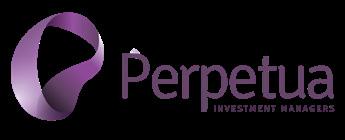
Perpetua Investment Managers (Pty) Ltd
Kevin Dantu
Tel: +27 21 674 4274
Cell: +27 82 801 4877
Email: clients@perpetua.co.za www.perpetua.co.za
Mastering insightful investing.

Robeco Africa
Thabo Tembo, Head of Africa Distribution 30 Fenchurch Street, Part Level 8, London
EC3M 3BD, United Kingdom
Tel: +44 779 964 7896
Email: africa@robeco.com robeco.com/za
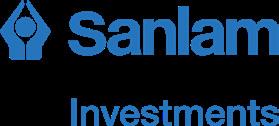
Sanlam Investments
Tino Mtemeri
Email: TinoM@sanlaminvestments.com
Believe in it, invest in it

Mokgadi Skwambane, Head: Corp Business Development
Cell: +27 81 462 2116 • Tel: +27 11 809 7781
Email: mokgadi.skwambane@sasfin.com
Bhekabantu Ngubane, Head: Inst Business Development
Tel: +27 11 809 7781
Email: bhekabantu.ngubane@sasfin.com
Appropriate risks at the appropriate times.

Terebinth Capital
Andzile Ntabeni, Head of Institutional Business
Tel: +27 21 943 4804 | Mobile: +27 72 877 3774
Email: andzile.ntabeni@terebinthcapital.com www.terebinthcapital.com
Strategic. Structural. Tactical. Solutions for long-term sustainable growth.
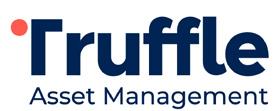
Truffle Asset Management
Email: institutional@truffle.co.za | info@truffle.co.za www.truffle.co.za
Invest in the value of experience.
The Annual Retirement Fund Survey 2024 is the product of Don Andrews and the Survey team on behalf of Alexforbes.
Through research within the industry and comprehensive quantitative analysis of asset manager data, the team produced a complete analysis of performance over 2024.
The Survey team would like to thank the following people for their contribution to this publication in service of the asset management industry of South Africa:
Thank you to all the asset managers who participated in the AI and ML survey.
A special thank you to the asset management industry for supplying Alexforbes with the necessary data and information in order for the publication to be produced. Thank you!
Your aspirations today are the seeds for tomorrow’s impact. At Alexforbes, we believe that the goals you set, whether personal or business, define the kind of impact you want to make. Our insights and advice are designed to connect your dreams to tangible outcomes. Let us be your partner in turning aspirations into impactful reality.

www.alexforbes.com